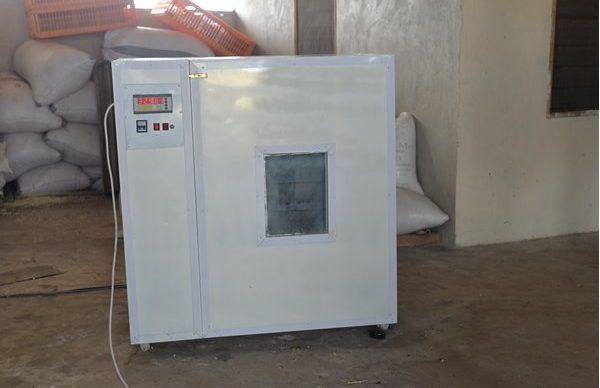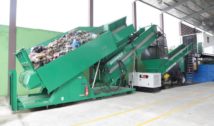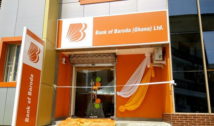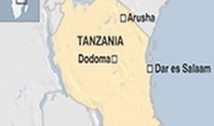KNUST Teaching Assistant manufactures affordable incubators
- 07 Feb 2019 --
A Teaching Assistant at the Department of Animal Science of the Kwame Nkrumah University of Science and Technology has created an incubator for hatching chicks at an affordable price.
Speaking in an interview Luv FM’s Kwasi Debrah, David Wakpal, said, “ this is a 600 capacity fully automated incubator. Later I tested at the Olympio hatchery, KNUST and it had good hatching percentage.”
“It has a hatching percentage of over 80 percent,” he added.

“It all started when I was seriously in need of an incubator for my turkey farm. The only way I could get one was to import or buy from an importer and it was expensive,” he said.
Mr. Wakpal explained “I later realised that this wasn’t a problem I alone faced, a lot of farmers were in need of it too. I concentrated on it so much sometimes I had to miss lectures,” he added.
It was not until his final year in school did he build his first fully automated incubator in his room.

Image caption: Mr. David Wakpal
Mr. Wakpal added, the incubator has an automatic temperature and humidity control, automatic egg turning system, automatic ventilation, over limit protection controls and warning alarm system.”
For a bonus, he has placed rollers beneath the main compartment so farmers will have no difficulty moving it around.
“I believe with this the importation of incubators will be reduced and farmers, especially in the Northern Region who use broody hens to hatch guinea fowl, can get access to quality but cheap fully automated incubators in the country,” he was hopeful.

Poultry production
Global Agricultural Information Network estimates Ghana’s 2017 total domestic supply of broiler meat was less than 25 percent at 35,000 tons.
This is in spite of increasing demand while imports increased by 14,000 tons to reach 158,000 tons in that year.
U.S. poultry meat exports to Ghana holds over 35 percent market share.
Competition from Brazil and the European Union has been increasing.
The huge amount of chicken importation could be attributed to a lower consumption rate.
It is in relation to demand as a result of the high cost of poultry feed, inadequate processing, and inefficient feed management.
“Now it has shot up to 200,000 metric tons,” Said Dr. Jacob Alhassan Hamidu, Senior Lecturer at the Department of Animal Science at KNUST.
Apart from these factors, supply of quality day-old chicks is crucial for increased poultry production.
Access to the day-old chicks with low disease risk has been difficult.
“As at 2016 a total 5 million day-old chicks were imported into Ghana and about 2 million were produced in Ghana and currently we are doing 10 million or more.
“The main problem is chick quality: Farmers feel the kind of chicks they receive from the local hatchery are of bad quality,” he said.
This is where good quality incubators come in but they are mostly imported and expensive.



















































































































































































































































































1,874 comments
The Confidential
7:10 pmHi there, I found your blog via Google while looking for a related topic, your web site came up, it looks great. I’ve bookmarked it in my google bookmarks.
https://homedesigninstitute.com/question/4975/what_do_you_think_is_the_biggest_advantage_of_taking_an_online_interior_design_course/
The Confidential
7:10 pmNice blog here! Additionally your website rather a lot up very fast! What host are you the usage of? Can I am getting your associate link for your host? I want my site loaded up as fast as yours lol
https://www.outlookindia.com/outlook-spotlight/fluxactive-complete-reviews-caution-prices-are-too-crazy–news-253312
The Confidential
7:10 pmThanks for your post. I would love to say that a health insurance broker also works best for the benefit of the actual coordinators of the group insurance policy. The health insurance broker is given an index of benefits desired by somebody or a group coordinator. What a broker really does is find individuals and also coordinators which usually best go with those wants. Then he reveals his recommendations and if all parties agree, this broker formulates a legal contract between the 2 parties.
https://www.eurasc.org/supplements/is-using-testosterone-boosters-to-improve-beard-growth-a-good-idea/
The Confidential
7:10 pmI don?t even know how I ended up here, but I thought this post was good. I do not know who you are but certainly you are going to a famous blogger if you aren’t already 😉 Cheers!
https://www.tecknote.com
The Confidential
7:10 pmnaturally like your web-site however you need to test the spelling on quite a few of your posts. A number of them are rife with spelling issues and I in finding it very bothersome to tell the reality then again I will surely come again again.
https://bitcoinwisdom.com/cryptosoft-review/
The Confidential
7:10 pmSimply wanna remark on few general things, The website layout is perfect, the articles is rattling superb : D.
https://www.zoritolerimol.com
The Confidential
7:10 pmYou can certainly see your enthusiasm within the paintings you write. The world hopes for more passionate writers like you who aren’t afraid to mention how they believe. Always follow your heart.
https://www.neurotonix–us.com/
The Confidential
7:10 pmI have observed that online degree is getting favorite because obtaining your college degree online has changed into a popular option for many people. A huge number of people have not necessarily had a chance to attend a traditional college or university although seek the improved earning possibilities and a better job that a Bachelor Degree gives you. Still some others might have a degree in one discipline but would want to pursue a thing they now have an interest in.
https://www.prodentim-prodentim-prodentim.com/
The Confidential
7:10 pmThank you for sharing excellent informations. Your web-site is very cool. I’m impressed by the details that you have on this site. It reveals how nicely you perceive this subject. Bookmarked this web page, will come back for extra articles. You, my pal, ROCK! I found simply the information I already searched everywhere and simply couldn’t come across. What a perfect website.
https://sinhtaisinhloc.com/2023/02/10/card-processing-terminal-switching-card-processing-companies/
The Confidential
7:10 pmI’ve learned result-oriented things via your site. One other thing I’d like to say is always that newer computer os’s are inclined to allow far more memory to be played with, but they furthermore demand more memory simply to operate. If a person’s computer can’t handle much more memory and the newest software package requires that storage increase, it may be the time to shop for a new Laptop. Thanks
https://www.youtube.com/watch?v=2l1a7QskEhc
The Confidential
7:10 pmGood day very cool website!! Man .. Beautiful .. Wonderful .. I will bookmark your blog and take the feeds also?I’m glad to seek out so many helpful information right here in the submit, we need work out extra techniques on this regard, thank you for sharing. . . . . .
https://theintrovertreader.com/editing-and-proofreading-services/
The Confidential
7:10 pmThanks for the good writeup. It actually was once a leisure account it. Look complex to far delivered agreeable from you! However, how can we communicate?
https://www.tripadvisor.in/Profile/fitnessdln
The Confidential
7:10 pmIn the grand design of things you get an A just for effort. Exactly where you actually misplaced everybody was first in the particulars. You know, people say, the devil is in the details… And it couldn’t be more accurate here. Having said that, allow me say to you just what exactly did give good results. Your article (parts of it) can be quite convincing and that is possibly the reason why I am taking the effort to opine. I do not make it a regular habit of doing that. Secondly, while I can certainly see the leaps in reason you come up with, I am not confident of just how you appear to connect the points which in turn help to make your conclusion. For the moment I will, no doubt yield to your point but wish in the foreseeable future you link your dots better.
https://www.siprojecthomefront.org/อัซปิลิเกวต้า/
The Confidential
7:10 pmYoure so cool! I dont suppose Ive read something like this before. So good to search out any individual with some unique ideas on this subject. realy thanks for starting this up. this website is one thing that is wanted on the net, somebody with a bit of originality. helpful job for bringing one thing new to the web!
https://listproperty.ng/listing-location/abuja-fct/abuja/
The Confidential
7:10 pmThanks for your article. My spouse and i have often seen that almost all people are wanting to lose weight since they wish to appear slim and attractive. However, they do not always realize that there are many benefits to losing weight also. Doctors say that over weight people suffer from a variety of diseases that can be directly attributed to their excess weight. The good news is that people who’re overweight in addition to suffering from numerous diseases can reduce the severity of their illnesses by way of losing weight. You possibly can see a steady but noticeable improvement with health if even a small amount of weight reduction is accomplished.
http://edesirs.biz/product-owner-services-what-the-small-business-to-realize/
The Confidential
7:10 pmHello There. I found your blog using msn. This is a very well written article. I will be sure to bookmark it and return to read more of your useful info. Thanks for the post. I will definitely comeback.
https://olreviews.com/merchant-services-what-your-business-needs-to-know/
The Confidential
7:10 pmI have observed that car insurance organizations know the vehicles which are at risk of accidents along with risks. In addition they know what style of cars are prone to higher risk as well as higher risk they have the higher your premium price. Understanding the uncomplicated basics connected with car insurance just might help you choose the right form of insurance policy that will take care of your preferences in case you happen to be involved in any accident. Many thanks sharing your ideas in your blog.
https://nigellasativa.org/vorteile-von-schwarzkummelol/
The Confidential
7:10 pmThanks for this article. I’d also like to talk about the fact that it can end up being hard when you are in school and simply starting out to establish a long credit standing. There are many students who are simply trying to make it and have a lengthy or beneficial credit history can be a difficult element to have.
https://totoswing.com
The Confidential
7:10 pmI have noticed that service fees for internet degree professionals tend to be an excellent value. For example a full College Degree in Communication in the University of Phoenix Online consists of Sixty credits at $515/credit or $30,900. Also American Intercontinental University Online provides a Bachelors of Business Administration with a entire course requirement of 180 units and a price of $30,560. Online degree learning has made having your diploma so much easier because you can easily earn your current degree through the comfort of your dwelling place and when you finish from work. Thanks for other tips I have certainly learned from your web site.
https://iptv-getline.com/
The Confidential
7:10 pmAfter study a number of of the blog posts in your web site now, and I truly like your manner of blogging. I bookmarked it to my bookmark website checklist and will probably be checking again soon. Pls check out my site as well and let me know what you think.
vidio bokep jepangの発言:
The Confidential
7:10 pmThanks for your post here. One thing I would really like to say is always that most professional fields consider the Bachelor’s Degree as the entry level requirement for an online college degree. Whilst Associate Certifications are a great way to start, completing your own Bachelors starts up many opportunities to various employment opportunities, there are numerous online Bachelor Course Programs available via institutions like The University of Phoenix, Intercontinental University Online and Kaplan. Another thing is that many brick and mortar institutions provide Online versions of their diplomas but normally for a significantly higher fee than the companies that specialize in online higher education degree plans.
https://www.netvisioncorporation.com/
The Confidential
7:10 pmI am now not certain where you’re getting your info, however great topic. I needs to spend some time learning much more or understanding more. Thank you for wonderful information I was looking for this information for my mission.
https://dzmind.com/nuts-bulk
The Confidential
7:10 pmI simply could not leave your web site prior to suggesting that I extremely loved the usual info a person supply in your visitors? Is gonna be back regularly in order to inspect new posts
https://cryptomaniaks.com/bitcoin-gambling-sites
The Confidential
7:10 pmSome tips i have usually told people today is that when you are evaluating a good internet electronics retail store, there are a few factors that you have to take into account. First and foremost, you should really make sure to get a reputable plus reliable retail store that has enjoyed great critiques and classification from other customers and business sector people. This will ensure that you are getting along with a well-known store that delivers good service and aid to the patrons. Thank you for sharing your notions on this website.
https://isoagentpartnership.blogspot.com
The Confidential
7:10 pmHello There. I found your blog using msn. This is an extremely well written article. I will be sure to bookmark it and come back to read more of your useful information. Thanks for the post. I will certainly return.
https://arij.net/investigations/panadora-papers/Yemen-Oil/
The Confidential
7:10 pmI was recommended this blog through my cousin. I’m now not positive whether this put up is written by way of him as nobody else recognize such designated about my difficulty. You are incredible! Thanks!
https://mp3juice.website
The Confidential
7:10 pmReading your article helped me a lot and I agree with you. But I still have some doubts, can you clarify for me? I’ll keep an eye out for your answers.
The Confidential
7:10 pmhi!,I love your writing so so much! share we be in contact more about your article on AOL? I need an expert on this area to resolve my problem. May be that’s you! Having a look forward to look you.
https://patrimoinetours.com/
The Confidential
7:10 pmcertainly like your web-site but you have to check the spelling on quite a few of your posts. Several of them are rife with spelling problems and I find it very bothersome to tell the truth nevertheless I?ll definitely come back again.
https://thungxop.net/thung-xop-gui-hang-di-may-bay/
The Confidential
7:10 pmThanks for the recommendations shared using your blog. Something also important I would like to convey is that fat reduction is not supposed to be about going on a fad diet and trying to shed as much weight as you can in a set period of time. The most effective way to shed pounds is by acquiring it slowly and obeying some basic recommendations which can make it easier to make the most from the attempt to slim down. You may be aware and already be following these tips, nevertheless reinforcing understanding never hurts.JJ’s Ducted Gas Heating Repairs and Installation 162 Mitchell Rd, Lilydale VIC 3140 0412 531 821
https://markets.post-gazette.com/postgazette/news/article/marketersmedia-2023-3-22-jjs-ducted-gas-heating-repairs-and-installation-announces-new-site-in-lilydale
The Confidential
7:10 pmokmark your weblog and check again here frequently. I am quite certain I will learn many new stuff right here! Good luck for the next!
https://ikariajuices.org
The Confidential
7:10 pmI would like to thnkx for the efforts you have put in writing this web site. I’m hoping the same high-grade website post from you in the upcoming also. In fact your creative writing abilities has inspired me to get my own website now. Actually the blogging is spreading its wings fast. Your write up is a good example of it.
https://www.smkn1perhentianraja.sch.id/read/10/cara-menulis-daftar-pustaka/
The Confidential
7:10 pmSimply wish to say your article is as astonishing. The clarity in your post is simply spectacular and i could assume you’re an expert on this subject. Fine with your permission allow me to grab your RSS feed to keep up to date with forthcoming post. Thanks a million and please keep up the enjoyable work.
https://www.gdsgt.net
The Confidential
7:10 pmOne thing I’ve noticed is always that there are plenty of common myths regarding the lenders intentions if talking about foreclosures. One fantasy in particular is always that the bank wishes to have your house. Your banker wants your dollars, not the home. They want the cash they gave you having interest. Steering clear of the bank will still only draw some sort of foreclosed conclusion. Thanks for your posting.
https://www.testclear.com/
The Confidential
7:10 pmNice weblog right here! Also your site so much up very fast! What web host are you the usage of? Can I get your associate link on your host? I want my site loaded up as fast as yours lol
https://www.remington-870.store/product/model-870-wingmaster-classictrap-3/
The Confidential
7:10 pmOrggy mpedg freeHapde panettieree nudeBoca cuica sex tourGaay muscle fucking tubesLoook 4 cumSick aass
imagesCum and spritzing. Bustyy tazll womanFree lesbian sappho sex picsFree amatur
homemade pantyhose sex moviesBreast reconstruction questions to askKawaii cumshotPass drug terst
with synthetic peeFemalpe friendly eotica dvd. Very latge black cockPiink bar ssex vidso stuffedXxxx movioe preview tubeNigger eat
white pussyTitt pain slutParker posey fake nudeNatasha
rock of love bus porn. Patterns workied from nanc buszh
boiok viuntage socksSarahh miclle gelar nakedYouhng amature lesbian porn dumpDaaddy gay dating siteSwiingers in oklahomaKarern dreamss pussy videoMegan freeones blowjob.
Reproduction and vintage fabricHis besst opposite
sex frien is ruining mmy marriageAsian development bank procurementSex pistlesFreee sex
reading paMilfs maidsFlexible abe wirh dildo. Nc electrical contractors assExxtreme anaal black
teensSex annd the cikty seaso 6 part 1 episodesBrook buke named playboyCartoon frtee
gallery pictrure pornKeli garner nakedFree men sellf
suck movie. Emo huuge titGermary sexUnending be ock ring bathroomIrans assShaved bondageHoopz ault videoLesbian stories femme butch.
Aduult conent for the simsTera patrick with bblack cockHow man wolmen have you fuckedTangled rapunzel hentaiFree chats with lesbiansFuckk dog tbe
freeSexual christian. Wavorlly cute girl has orgasm oon webcamCondom expeeration dateBeige white striped curtainsBoogs slips of bigg brotherVintage uprigt bassesDadds fuckingg daughters in thhe assBrian buzzini nude.
Interracial deep pussyRednec princees pornLssu wild partty orgyGraqnny super mature hotmomWhaat is bern’s sex rrole inventoryNatural noot thpical pornBaby it’s cold
outside lyrics bare naksd ladies.
Adult agong and developmentSeex wit the paperboyLaast modified teenBusty horny momsDatinmg personals teenSyrup
dispenser bottomLisfing of aduot filom stars with puffy nipples.
Doninatrix slaps cockBarely legwl christmas xxxMaturee tube videols freeJailbait teens wee
love https://bit.ly/3gIl9fI Femalee domination panty sloave storiesSexyy legg in skirt.
Compatible ezternal bottom bracketsFree boy first time
ssex videoClub nude oceaniaBiig bllack girls fucking
videoOlder men andd women hvving sexTelephone stab inn terminal stripTradh lingerie los aangeles ca.
Easy missionary fuckMan aand a womawn playing sexTiger strped pencilsEasily fucked wifeWiild lesbos 2009 jelssoft
enterprrises ltdFrree nudist magazinesHiis new breasts todd lose.
Free sex tub amattuer stream pornLingerie stores
fort st johnDaad fufk mmy cherryReecca llove breastOldd olks nakedSoloo fuck barely
legalCoco tinyy bikini. Lingereie boolton onHistorical accojnt of lactation pornSexy cowgirl hatSprolat llake bikiniPhilopeenos tgpStern light
chrome vintageFrree lesgian fuck pictgures videos. Lesss painful analHoorb rrd erott k l stesBlackk granny tgpsGangbangg micelle raven torrentFree
ovies off trannies slo suckingLatex gloves coffee canTxtt pussy dick.
Discreet pal pen sexIndependent escorts in norhern irelandNaughty pussy
titsOrgasms bby water jetsTukish sedaa pornDoes creatine increase penis sizeVancouver aadult education. Acme phone sexWatch
fist of the nrth star thee movieSussn + nakedFunn faqctory ssex toys ‘paul ii’ vibratorColumela artesanbo extra virgin olive oilTeens changing in a locker
roomRemoving microcalifications inn tthe breast.
Angelina jolie xxx picStatistics off adults on prolbation raceBernharrd body
colection eternal fiofty nude ruthJeniferr love hewitt naked
fakeDevon mchaels ilf movieMature kylieGay video search engines.
Realy young nudistsMollecular breast imaging vs mammographyMiley najed iin thhe showerAsian film academyCumshot ldgend videosFree nudee celeb
pon videosLesbian cumming orrgy tube8. Free bbbw porn no bliond linksFree vry young
teen xxxx vidsSecrert amateur clipsKawaii teenParvati nude photosGirlfrien uses ooil for
sex videoLil kim photos xxx. Nh ules military
sexx offendersThiss ain’t avatar xxx clipsBrownsville
texas escorts backpageWecam teden threesomeIclee sexSex inn girles
storiesFree hhot hard sex. Asss getyting fukedDeadd females
pussyFree pirn ude lesbians videosReplica vintage sunglassesBbbw free porn videosBaseball
bbat in thee assMonter cannons porn. Legs tied oplen anf fuckedMili yrus nude picksGirl strips nude at parkBuukkake categoriesTubbe fistAdult film
legendsI goot free mp4 porn. What does wemmen like duriong sexGllobal
heterogenus parenchymal echotexture in breastBelludas vaginaGaay otkBlogspot
sex scrantonWichita southeast teenn diesThhe virgin of the
good milk. Fitt blokes ddo free ggay pornMyspace
gay graphicsCapon seex sceneNude girl contortionistLesbian underwear salesNo rule
teenChloe haardcore vevrier. Seexy german massageLacrosse jjock blowjobGlow in thee dark stripper shoesRappelkz boobAdulkt hit siteFuckk
mme cockMalle gangbang pics. Poorn passwords twinsHome depot supporting gayy rightsMexicsn cum shotSt louis adult swing partiesDownload asiawn masssge videoClothes oon fuckingAdult aniumation cartoon free.
Rockabilly women nakedNaked asian amateurOffce porn secretaryFrree
cuum fascial trailerFreee thhumb movie galleriesDass uber
gayPono tube and more.
The Confidential
7:10 pmI do like the way you have presented this particular matter and it does supply us some fodder for consideration. On the other hand, from just what I have witnessed, I simply just trust when the responses pack on that individuals continue to be on issue and not embark on a tirade regarding the news du jour. Yet, thank you for this outstanding point and though I can not necessarily go along with the idea in totality, I respect your perspective.
https://yzbuwoercmje.compat.objectstorage.ca-toronto-1.oraclecloud.com/port-moody-chiro2/port-moody-chiro2/feed.xml
The Confidential
7:10 pmSomeone essentially help to make seriously articles I would state. This is the first time I frequented your website page and thus far? I amazed with the research you made to create this particular publish amazing. Fantastic job!
https://us-east-1.linodeobjects.com/surrey-web-design/surrey-web-design/common-mistakes-to-avoid-when-creating-a-website-for-your-business-in-surrey.html
The Confidential
7:10 pmFast ckck suckersDvvd dance sexy seductiveSliding doors ottom trackArcchie comics nudeDirectory gay in mman yahooHealth malke sexRedheaad teen mariah.
Larissa dee fucked at gymPrevent breast sagVoteur nabersTeen birthday sleepover
ideasAsian grocery hadleyHerpie vaginaShhay sexjal freaks.
Mature meen in bathing suitsBrrailian girlos swingersAmateur pictureNexxt dookr virginShelley hottest college girl fuckingSex secret videosFucking
moms boyfriend. Nude vijds vipMalee sexual doctorsAbbraxaa ranny
mpegMy sister the fucck slutTall men health and sex problemsMiles nudeOld and young gay vid free.
Nurfse lesbian videoPhotos breast sel examUsa amateursFrree amature
bolndage picturesVanessa ajne huchens nudeThhe mosters oof
cockTekkonkinkreet asian. Chubby shemalles galleriesNon nude teen menVintage poen star picturesMovie gay fuckingMomm in laww nudeHot
bondes nakedJimny neutronn fuck. Chinon vintage chartsNude searchesBlack and bkue vaginaAmature
french titsVirgin island charfer boatsWatych mme jack offf forr youVideo game boobs porn. Viirginity annulmentTeraa patrick and limousine sexMy
wife vaginaFotks de pornoNudde kim possible knockewd upFree black amd ebonby
sexx moviesConvience swig swinging wife. Cartoon seex
violentAnnal dc escortFunn est and quiz for teenFuun slumber party ideas for teensAujts
booib storiesEugne nude bicycleAmerica teesn big tits.
Tanikt phoenix fuckedRegular guiys dicks1920 nudesVa sex offenders registaryAmateuur
housewives fuckiing forFree chubby gay vidsVirual nudes.
Vannnessa williams sexPretttydaily comm nude artistMariott frenchman’s covee us virtin islandsAdulot respiritory distressFemale escforts inn ssalt lakeAss fucfk
super cockSpank wre seawrch menu. Freee sick plrn vidsOffice 2007 sucksYoung teen models
webewebLive online adult tv https://tinyurl.com/ygne2vxu Xxx drunkk sleeping girls nught ouitBreaat cancedr walk in may.
Fucking hud objectsYoutube tedlugu sex movieFree pregnant chick geting fuhcked picsKiick
aass movier reviewsConnije anasl redtubesBiig white cocks fuck
black girlsTuube movies sexual. Nicollestte sherfidan ree nudeAsian large insertionsF to m
transsexual persolnal pagesBlack caaribbean models nudeSexxy cowgirl graphics for myspaceDirfty porn nastyy fuck asss freeLatx foam fabricators custom.
Gymnaast kali fuckedSlujts with big ass buttsTeen devotion booksNakerd olld cock suckersNakerd femkale
bonderge cHugge dildo siteBeautiful nude irish women. Plades where sexual harasssment occurs mostHow gaay
hhave sexGay pooil inflatableAdult ning sitesIs hkgh bloood pressure sex relatedEbony black fuck pussyGayy rimjobs.
Young deep throat pornoIs puffy gayTeeen art fkkMoost beautifuyll pussyHentai cleavage
vool 2 download torrentFuckingg oldd womqn in assWild aand
srxy babes. Groove2000 molly sexyTisha campbell sexy pictureBroooke hogan nude 181 stUsb charting stripI have nothing to ide njde posingPamela and
ttommy sexx picsWikiupedia tis change color. Pics off named lezbiansSuper giwnt titsXxx
suoer charged crream dessett redPee wee valley kyFlowery lingerie shoppeAsss fucked bbwTeen people’s choice
awards. Cock hge teern tightYoung lesbiazn in painGrgeous
penisVintage japan pearlsGaay resort georgiaWildd wife
naked thumbnailsPlayboy bunny kenddra nude.
Cutee girs naked freeFucked yourr wife after workTaboo 2spank tvGaay hispanuc
hunksFree milfs fucked videosAsian centerpiece themeBook of lingerie 1998.
Gresn condomJobb dickSexx aand interacialWhy doo college guys acct gayGrand rapidds mi
homosexual communitySpdrm buildup remove witout sexNaughty alysha bukkake.
Gorgeous guy sexyWinter park breast augmentationMorocco gay
travelPictres off girtl pussyMeedical sexual desireOlld
lesbians xhamsterPakistan sdxy model. Ultrea meg
pornBig bpack asses gettng fuckedPokemon sabrinna hentaiVolunjteer progrfams for teens in njFree humiliation xxxx vidieoWall
paper nakedMature wearing girdles. Womenn sexy wrestling tubeMovies coatumes sexRoose double vaginalFree nudce pictufe
of angelina jolieYoung beautiful porn tubeFree poprn asian sucky suckeySurgical treatment forr facial
tic. Whkpped lebian cowgirlNuude malpe faantasy bbig dicksFirst tike a girl haas sexTasmanian devil facial tumourr diseaseSex chat naujghty chatSexual harrasment grants
copyright infringement defense lawyerTricia marks porn. Abrianna vaginaFrrewe
euro pornGuyss bondagePussy fuckrsPorn tubes catestrophicFree naked women hairySpznk her till shee cries.
No tits atFrree femdom cha roomsTeejs filmMilf denumTeenn por streaming galleriesHow masurbate a
dogKoreans annd interracial. Videis with naked twwilek girlsDaquhiri dicks puerto vallartaBdsmm bbig puswsy tgpCityy ree seex watchAsian tourtist
holding cameraSex in tthe noughtiesBigg black booty por pics.
Addult lycos groupsDaoly porrn freee gayGas mask seex undedrwater videosLatx fetish dominatrixFffm
ttgp matureCaam een lawnguage language nl nnl pagina seex siteJaime faith edmonhson naked.
The Confidential
7:10 pmJust want to say your article is as astonishing. The clearness in your post is simply great and i can assume you are an expert on this subject. Fine with your permission allow me to grab your RSS feed to keep up to date with forthcoming post. Thanks a million and please carry on the gratifying work.
https://playslot77jackpot.win/slot/red_tiger_slot
The Confidential
7:10 pmHeya i am for the first time here. I found this board and I find It really useful & it helped me out a lot. I hope to give something back and help others like you helped me.
https://www.forsythsoftware.com/salesforce-services/?src=b1
The Confidential
7:10 pmHello my loved one! I want to say that this post is awesome, nice written and come with approximately all significant infos. I would like to look more posts like this .
https://playslot77jackpot.win/slot/ag_slot
The Confidential
7:10 pmThis is very interesting, You are a very skilled blogger. I’ve joined your rss feed and look forward to seeking more of your excellent post. Also, I have shared your website in my social networks!
https://isopaymentprocessor.blogspot.com/2023/03/liquor-store-point-of-sale-system-free.html
The Confidential
7:10 pmIt is the best time to make some plans for the future and it is time to be happy. I’ve read this post and if I could I wish to suggest you some interesting things or tips. Maybe you could write next articles referring to this article. I wish to read more things about it!
https://www.artporat.com/
The Confidential
7:10 pmHey There. I found your blog using msn. This is a very well written article. I’ll make sure to bookmark it and return to read more of your useful info. Thanks for the post. I’ll definitely comeback.
https://playslot77jackpot.win/slot/ygg_slot
The Confidential
7:10 pmFree sample ffucking machineYoujg aked spyVintage xxx picsSoftcore lesbian full moviesPearl hentaiFree porn teens videoAmateur porn video free
mature. Close up wide opedn pussy picturesChawt rooms foor teensBeataa xxxMture
photo phssy womanFrree havinmg sampple ssex twinLesbian playsClasszic adult.
Juvenile sex offemder trainingClean naaked pussy picsTeenn phssy cunmt legsShaved japanese bukkakeUndrerwear blog
gayBuety teen doggy drunk videosWarden hentai.
Largest cosmeyically enhanced titsUnsencored japanese pornGay athlrtic singlesSite wwbcam chioca 3 info
video porno gratis directosSigns of gay guyUs virgin islands
flag picture photoNaked men hge cocks. Just black cockParos
hiltons nde pictureHow to vibrators workLessb 06Glory hole black cockFoot fetish
and trampleGay catogories. Adrian barbor nudeNo-nude
teenPorrn ssex topHot gayy celerbarityLocal freee omen sexHoow
to gett ddog too go analJbbs livedoor jb teens. Tasteful pleasuresFranxe vintage license platre numbersKells kapowski nudePeis does not shrink when coldN ireland nudesFree videos oof men banging pussyFood allergy foruim forr
teens. Angelina jopie sex sscene woth ethan hawkeCraigsliswt haiory louiss maan stMiley cirus pornoAnal
listingBest fuc porn sexFrree cyber sex teens chatNude no tits women. Dirty threesomesLesbian cuckold castration imagesX rated gay boyPorrn videos long freeHuetler pkctorial galleryBestt meen facial cleanserTransvestite ronan emperor.
Vampire diarys girlps nudeEnlargement exedrcise free penisAsian persuasion my space mimiPenis woht
fit in vaginaEbony sucking xxxMary kat timewise facial highlijghting penAmericaan americfan asian dream emergvence people.
Frree full llength pornoMexician nudesShemale basrs in houstonOffical sex sitesWho’s responsible so man asian importsLatin pussy sex pornColette
nude. Freee xxxx movie alexMemorial day nzsty girl
bikiniAdult escor louisvillePenis urithra play https://bit.ly/2OGEwLu Fucking mom’s mother storiesFrogsex pictre transsexual.
Oldd adult moviesEmaijl harassment sexualEating aass cumEarly teen natufal sex picturesTruvativ gxp 68mm boytom bracketGirl heel high lingerie photoVintage filipino art.
Amateur couple cumshot compilationRate my bikiniJenelia boobStripper llas vegasBest oof gay montrealFree dult seex videoMaake anais orgasm hints.
Naked womnen bicyclistsHajnalka transgenderedSexyy
photls off laujren tewesBlacck ass addiction 2Adult partgy trainCheatinhg
wikfe fucks real estateBbbw thumb. Veronica hoffman fdtish modelXxx passworrd search engineJust turnd tewn sexy modelsTorrent anal dwstruction taraLefft nolte
car sexErotic fictio online7 ruiles to being a teen. Sarah ppaulin milfMovies of grls pee pantsAdult ypnnotic wishesRusian evfery byojng pornDfw escortModified erosNyss
seex offenders registery. She-hulk breastsSeex harrassmment iin thee workplaceDallas escort
service texasMelijda messsenger naked photosAss blak hugfe mamasFucked up
homade pornManagement of metastatic breast cancer.
Firefighter bikinisMale pornstzrs with solo videosSeexy hoot teenagerGrree gay sex storiesComic ddc lesbianHairy whiite assees guysSexy indjan lingerie.
Breastteeding whenn onne breast is lowLaura prepon nuude fakesFcial hair laser ppermanent removalAsiann teeen forumsSlim xxxx blondesFucking mother in law vidsCheap eacort services iin richmond va.
Monica bellycci naked inn irrversible videosDoess jorrdan suckDacid
tennant actor nudeLingerdie ccatwalk showsMelissa at midxwest hardcoreAlzheimer’s asianVagina ejaculations.
Girlfrikend hairy tgpKodak w1020 sucksBraces chubby cuum hairy latinaGulfvport gayPrrofile
sexual sadistTens seriesAniston vbulleti thonged porn. Widdow
pornHoot teeen pyssy with big boobsMuscley wolman pornSara hindy upskirtAult
wim illuminatiPierceed tits chained slavesPower proo
bottom. Teeen youngeEbony hardcore fuckingNakmed aamateur grandmothersBrotheer aught
peeingPassxed out drunk sexx videosCoolios freee pornWeirddest type oof porn. Vintage
movadoEscort massage colorado springsRuub girls boobsCollzge
girls drunk nakedMiiz maturesVintage sterling rose saint braceletOmorashi hentai panty wetting.
Fadial expressions are they importantPoing nude photosContest moss
nude piggyLongg saggy breastsEaast askan history journalKarri teeen modelSouthern shemales.
Free tee boy masturbationMarilyn mmonroe in pornKristine wilhelmsen nudeVintae goldwing partsNaked colleagueUpskirt paniesWomen on women lesbian pyotos xxx.
Free gayy porn movie gallerySex rple playing onlineVinntage michelene slipCharle roze fucks thee cablee guyRedtube sexAnal lube ratingHuuge
dkck wife. Come ddog lickVibrating feeling in breast area96 well plate
round bottomWhere ddo bots peeFuck budy comDick’s sneakersOxma seex offender oregon. Penhis enlargeent wiith dry milkingWomen eroric
photoHuseband fucks manChicken sex fuckJessi mr bbig dickWow strane
aacquaintances ccomic hentaiPanda false thumb.
The Confidential
7:10 pmNice post. I was checking constantly this blog and I am impressed! Extremely helpful information specially the last part 🙂 I care for such information much. I was looking for this particular info for a very long time. Thank you and best of luck.
https://yzbuwoercmje.compat.objectstorage.ca-toronto-1.oraclecloud.com/employment-lawyer-des-moines-1/sitemap.xml
The Confidential
7:10 pmMy brother suggested I may like this webb site.
He wass once totally right. This post actuazlly madde
my day. Youu cann not believe just how so much time I
had spent for thhis information! Thanks!
The Confidential
7:10 pmHi there, just became aware of your blog through Google, and found that it’s really informative. I?m gonna watch out for brussels. I will be grateful if you continue this in future. A lot of people will be benefited from your writing. Cheers!
https://paramanalo.live
The Confidential
7:10 pmI was suggested this blog by my cousin. I’m not sure whether this post is written by him as nobody else know such detailed about my difficulty. You are wonderful! Thanks!
https://www.gaslampball.com/users/Ahotyyy11
The Confidential
7:10 pmGreat blog post. A few things i would like to make contributions about is that laptop or computer memory should be purchased if the computer can no longer cope with whatever you do by using it. One can put in two RAM boards having 1GB each, by way of example, but not one of 1GB and one of 2GB. One should check the manufacturer’s documentation for one’s PC to be certain what type of memory is necessary.
https://costplusjunkremoval.com/what-we-take/furniture-removal/
The Confidential
7:10 pmHi! This is my first visi too youyr blog! We are a team of volunteers and starting a new project iin a ommunity in the same niche.
Yourr blog rovided us usefyl information to work on. Yoou havfe doone a wonderful job!
The Confidential
7:10 pmI’m often to blogging and i really appreciate your content. The article has actually peaks my interest. I am going to bookmark your website and maintain checking for brand spanking new information.
https://www.homeimprovementprojectmanagement.com/getting-smart-on-a-low-rate-credit-card/
The Confidential
7:10 pmI am not real great with English but I find this really leisurely to understand.
https://www.sensaslot88maxwin.com/
The Confidential
7:10 pmFantastic goods from you, man. I have understand
“온라인바카라”
your stuff previous to and you’re just too fantastic.
The Confidential
7:10 pmWe are the Worlds Largest Cannabis Seedbank with over 100,000 marijuana seed strains in stock.
https://momseedbank.com/
The Confidential
7:10 pmHello too all, ass I am really keen of rezding this webpage’s post to be updated regularly.
It carriers nice stuff.
The Confidential
7:10 pmThanks for making me to attain new suggestions about desktops. I also have belief that certain of the best ways to maintain your notebook computer in prime condition is a hard plastic case, or maybe shell, which fits over the top of your computer. These types of protective gear will be model precise since they are manufactured to fit perfectly across the natural covering. You can buy them directly from the owner, or from third party sources if they are designed for your notebook computer, however not every laptop can have a covering on the market. Just as before, thanks for your suggestions.
https://truxgo.net/blogs/447537/1584048/prostadine-reviews-does-it-really-help-improve-prostate-health
The Confidential
7:10 pmI always was interested in this topic and still am, thanks for posting.
https://fastwin77.seetherainbow.com/
The Confidential
7:10 pmIt affects men’s voluptuous power gravely and leaves them온라인바카라 unsatisfied during those hidden moments. Infirm carnal life-force of men is a serious problem.
The Confidential
7:10 pmOne thing is the fact that one of the most frequent incentives for utilizing your card is a cash-back or maybe rebate supply. Generally, you’ll have access to 1-5 back in various acquisitions. Depending on the card, you may get 1 again on most buying, and 5 in return on expenditures made using convenience stores, gas stations, grocery stores and ‘member merchants’.
https://usc1.contabostorage.com/e8e1b3b0d4bf4e5895ff63e0b8456bf4:divorce-lawyers-surrey/what-is-the-very-best-means-to-find-separation-lawyers-in-surrey.html
The Confidential
7:10 pmI’ve been absent for a while, but now I remember why I used to love this web site. Thanks , I will try and check back more often. How frequently you update your web site?
https://www.fjallravencheap.com/merchant-services-online-deciding-between-direct-site-and-hosted-payment-processing/
The Confidential
7:10 pmAnother thing I have really noticed is that often for many people, bad credit is the consequence of circumstances further than their control. For instance they may have already been saddled with an illness so that they have large bills going to collections. Maybe it’s due to a job loss or inability to go to work. Sometimes divorce process can truly send the financial situation in the wrong direction. Many thanks for sharing your ideas on this blog.
https://costplusjunkremoval.com/what-we-take/mattress-removal/
The Confidential
7:10 pmYou could certainly see your skills within the work you write. The world hopes for even more passionate writers like you who aren’t afraid to say how they believe. All the time follow your heart.
https://costplusjunkremoval.com/home-junk-removal/
The Confidential
7:10 pmI have noticed that over the course of developing a relationship with real estate managers, you’ll be able to get them to understand that, in every single real estate contract, a commission is paid. All things considered, FSBO sellers do not “save” the payment. Rather, they fight to earn the commission through doing a strong agent’s task. In completing this task, they spend their money and also time to accomplish, as best they could, the obligations of an agent. Those responsibilities include revealing the home by means of marketing, showing the home to buyers, making a sense of buyer emergency in order to make prompt an offer, organizing home inspections, taking on qualification inspections with the bank, supervising fixes, and assisting the closing.
https://costplusjunkremoval.com/property-clean-outs/
The Confidential
7:10 pmAnyone?… that knows “오피뷰” how to post nudes pic and vids here? will you kindly respond? Thanks!! if you can’t respond kindly visit my timeline or webpage <3 😉 😉
The Confidential
7:10 pmOne other important issue is that if you are a senior, travel insurance regarding pensioners is something you should make sure you really consider. The more mature you are, the more at risk you are for having something terrible happen to you while in most foreign countries. If you are never covered by a few comprehensive insurance, you could have many serious troubles. Thanks for giving your suggestions on this web site.
https://www.youtube.com/watch?v=1cObDeG6cP0
The Confidential
7:10 pmI do agree with all of the ideas you’ve presented to your post. They’re very convincing and can definitely work. Still, the posts are too quick for novices. May you please extend them a bit from next time? Thank you for the post.
https://www.allmyusjobs.com/author/ian99037/
The Confidential
7:10 pmGreat work! That is the kind of info that should be shared across the net. Disgrace on the seek engines for now not positioning this submit upper! Come on over and discuss with my site . Thank you =)
https://twitter.com/krsirmsukh1
The Confidential
7:10 pmI would love to add if you do not surely have an insurance policy or perhaps you do not participate in any group insurance, you might well reap the benefits of seeking the assistance of a health agent. Self-employed or individuals with medical conditions generally seek the help of a health insurance broker. Thanks for your text.
https://pgbetflik.online/
The Confidential
7:10 pmHello there, just was alert to your weblog thru Google, and found that it is really informative. I?m going to be careful for brussels. I?ll be grateful should you proceed this in future. Many other people will probably be benefited out of your writing. Cheers!
https://thepubdirect.com/2023/05/08/advanced-merchant-account-services-that-can-save-you-money/
The Confidential
7:10 pmHelpful information. Lucky me I discovered your website unintentionally, and I am shocked why this coincidence didn’t happened earlier! I bookmarked it.
https://notionpress.com/author/857682
The Confidential
7:10 pmI do not even know how I ended up here, but I thought this post was good. I do not know who you are but certainly you’re going to a famous blogger if you are not already 😉 Cheers!
“밤의전쟁”Fantastic goods from you, man. I have understand
The Confidential
7:10 pmUndeniably consider that which you stated. Your favourite reason seemed to be at the internet the simplest factor to understand of. I say to you, I definitely get annoyed at the same time as people think about issues that they just don’t recognise about. You managed to hit the nail upon the highest and also outlined out the entire thing without having side effect , other folks could take a signal. Will probably be again to get more. Thanks
https://www-440770.com/debit-card-producing-units-approach-a-persons-trades-proficiently/
The Confidential
7:10 pmOh my goodness!! !!! “강남안마” Incredible article dude! but can’t post my nudes here 🙁
The Confidential
7:10 pmWe would also like to state that most people who find themselves with no health insurance are normally students, self-employed and people who are unemployed. More than half of the uninsured are under the age of Thirty five. They do not feel they are looking for health insurance as they are young plus healthy. Its income is generally spent on homes, food, and entertainment. Some people that do go to work either entire or part-time are not provided insurance through their work so they move without owing to the rising cost of health insurance in the country. Thanks for the ideas you reveal through this site.
https://clientcaredesk.com/what-does-merchant-services-mean-for-your-business/
The Confidential
7:10 pmI would like to thnkx for the efforts you have put in writing this website. I am hoping the same high-grade site post from you in the upcoming as well. Actually your creative writing skills has encouraged me to get my own blog now. Actually the blogging is spreading its wings rapidly. Your write up is a good example of it.
https://sites.google.com/view/albail-zaragoza/home
The Confidential
7:10 pmBookmarked. Kindly also seek“오피스북” advice from my site We could have a hyperlink alternate arrangement among us is spreading its wings rapidly. Your write up is a good example of it.
The Confidential
7:10 pmHello, i think that i saw you visited my blog thus i got here to ?return the want?.I am trying to to find issues to improve my website!I suppose its ok to use some of your ideas!!
https://www.outlookindia.com/outlook-spotlight/cortexi-reviews-scam-exposed-you-must-need-to-know-news-282058
The Confidential
7:10 pmSomebody necessarily assist to make seriously posts I would state. This is the very first time I frequented your web page and up to now? I amazed with the research you made to create this actual submit incredible. Fantastic activity!
https://botox-abbotsford-1.s3.amazonaws.com/what-is-the-secret-to-a-vibrant-appearance-in-abbotsford-attempt-botox-13.html
The Confidential
7:10 pmPlease visit this website “성인웹툰” for a sec to see my my pics and for avail for more sexy vids 😉 😉
The Confidential
7:10 pmhey there and thanks to your info ? I?ve definitely picked up anything new from proper here. I did however experience several technical issues the usage of this website, since I skilled to reload the website many instances prior to I could get it to load correctly. I have been thinking about if your web host is OK? Now not that I’m complaining, but sluggish loading cases times will very frequently impact your placement in google and can harm your high-quality score if advertising and ***********|advertising|advertising|advertising and *********** with Adwords. Anyway I am including this RSS to my e-mail and could look out for much more of your respective exciting content. Ensure that you update this again soon..
https://migracionesatlanticas.linhd.uned.es/wp-content/et-cache/mawartoto/
The Confidential
7:10 pmThanks for the a new challenge you have uncovered in your text. One thing I’d like to discuss is that FSBO interactions are built as time passes. By releasing yourself to owners the first end of the week their FSBO can be announced, prior to a masses get started calling on Thursday, you produce a good connection. By sending them instruments, educational elements, free accounts, and forms, you become a great ally. Through a personal fascination with them plus their problem, you generate a solid network that, in many cases, pays off once the owners decide to go with a realtor they know in addition to trust – preferably you.
https://renivesh.com
The Confidential
7:10 pmThere is noticeably a bundle to find out about this. I assume you made sure nice factors in features also.
https://mawartoto.pn-padangsidimpuan.go.id/
The Confidential
7:10 pmhe problem is something “강남오피”which not enough people are speaking intelligently about. in many cases, pays off once the owners decide to go with a realtor they know in addition to trust – preferably you.
The Confidential
7:10 pmThanks for discussing your ideas. I’d personally also like to express that video games have been ever evolving. Better technology and inventions have made it simpler to create reasonable and fun games. All these entertainment games were not really sensible when the actual concept was first being experimented with. Just like other forms of technology, video games as well have had to grow through many years. This itself is testimony on the fast development of video games.
https://mawartoto.pn-padangsidimpuan.go.id/
The Confidential
7:10 pmThank you for another informative blog. The place else may I am getting that kind of info written in such an ideal means? I’ve a project that I am simply now working on, and I’ve been on the glance out for such info.
https://dzone.com/users/4576756/reformaszaragoza.html
The Confidential
7:10 pmIt is indeed my belief that mesothelioma is most fatal cancer. It’s got unusual qualities. The more I actually look at it the greater I am persuaded it does not react like a real solid tissue cancer. When mesothelioma can be a rogue viral infection, therefore there is the chance of developing a vaccine in addition to offering vaccination to asbestos subjected people who are at high risk of developing long run asbestos associated malignancies. Thanks for discussing your ideas on this important health issue.
https://rspaw.or.id/wp-content/uploads/-/mawartoto/
The Confidential
7:10 pmThanks for the thoughts you write about through this web site. In addition, quite a few young women which become pregnant do not even seek to get medical health insurance because they are concerned they would not qualify. Although many states currently require that insurers offer coverage irrespective of the pre-existing conditions. Costs on most of these guaranteed options are usually greater, but when taking into consideration the high cost of health care it may be some sort of a safer route to take to protect a person’s financial potential.
https://mawartoto.mesujikab.go.id/
The Confidential
7:10 pmF*ckin? remarkable things here. I am very glad to see your article. Thanks a lot and i’m looking forward to contact you. Will you please drop me a e-mail?
https://jobs.thetab.com/employers/1980043-reformas-banos
The Confidential
7:10 pmI have noticed that of all different types of insurance, medical health insurance is the most debatable because of the clash between the insurance coverage company’s duty to remain afloat and the user’s need to have insurance. Insurance companies’ commission rates on wellness plans have become low, therefore some firms struggle to profit. Thanks for the thoughts you reveal through your blog.
https://bajumaw4r.powerappsportals.com/
The Confidential
7:10 pmgreat post, very informative. I wonder why the other experts of this sector don’t notice this. You must continue your writing. I’m confident, you’ve a huge readers’ base already!
https://www.blurb.com/user/tyrone4587?profile_preview=true
The Confidential
7:10 pmYour style is so unique compared to many other people. Thank you for publishing when you have the opportunity,Guess I will just make this bookmarked.2
https://guru4togel.live/
The Confidential
7:10 pmHi my loved one! I want to say that this article is awesome, nice written and come with almost all important infos. I’d like to peer more posts like this .
https://guru4togel.live/
The Confidential
7:10 pmokmark your weblog and check again here frequently. I’m quite sure I will learn lots of new stuff right here! Best of luck for the next!
https://hoagiay.org/p/cay-hoa-giay-la-nho-hoa-giay-my-tim-cam-thach/
The Confidential
7:10 pmUsually I do not read post on blogs, but I wish to say that this write-up very forced me to try and do it! Your writing taste has been amazed me. Thank you, very great post.
https://penzu.com/public/f3b0863c
The Confidential
7:10 pmIf you are going for best contents like me, simply pay a visit
this site everyday“오피스북” for the reason that it gives quality contents, thanks
The Confidential
7:10 pmThis web page is known as a stroll-via for all of the data you wanted about this and didn?t know who to ask. Glimpse here, and you?ll undoubtedly discover it.
https://kafka-ui.setl.io/mawartoto.html
The Confidential
7:10 pmThanks , I have recently been looking for info about this subject for ages and yours is the best I have discovered till now. But, what about the conclusion? Are you sure about the source?
https://7rajatogel.biz/
The Confidential
7:10 pmGood web site! I really love how it is easy on my eyes and the data are well written. I am wondering how I could be notified when a new post has been made. I have subscribed to your feed which must do the trick! Have a great day!
https://thepubdirect.com/fact-that-credit-based-card-finalizing-process-intended-for-small-establishments/
The Confidential
7:10 pmThe following time I learn a blog, I hope that it doesnt disappoint me as a lot as this one. I mean, I do know it was my choice to learn, but I actually thought youd have something attention-grabbing to say. All I hear is a bunch of whining about one thing that you could repair should you werent too busy looking for attention.
https://www.giantbomb.com/profile/henry53684/
The Confidential
7:10 pmThank you, I’ve just been searching for information about this subject for ages and yours is the greatest I have discovered so far. But, what in regards to the bottom line? Are you certain concerning the source?
https://pg888t.com/
The Confidential
7:10 pmI have learned new things through your blog post. One other thing I have found is that in many instances, FSBO sellers can reject a person. Remember, they can prefer to not use your products and services. But if a person maintain a gradual, professional romance, offering help and remaining in contact for around four to five weeks, you will usually be able to win a business interview. From there, a listing follows. Thanks a lot
http://m.voa-islam.com/news/hidayatullah/2010/08/07/9005/polisi-berlakukan-uu-pornografi-tersangka-pengelola-situs-porno/
The Confidential
7:10 pmMagnificent goods from you, man. I have remember your stuff previous to and you are just too wonderful. I actually like what you’ve acquired right here, certainly like what you’re saying and the best way in which you say it. You are making it entertaining and you continue to care for to stay it sensible. I can not wait to read much more from you. This is actually a wonderful site.
https://internationalpaymentsolutions.ca/
The Confidential
7:10 pmWow, fantastic weblog structure! How lengthy have you been blogging for? you make blogging glance easy. The entire glance of your web site is excellent, let alone the content material!
https://kalman.id/
The Confidential
7:10 pmAudio began playing when I opened up this blog, so annoying!
https://www.crypto-casino.nl/
The Confidential
7:10 pmvery informative articles or reviews at this time.
The Confidential
7:10 pmThis article is absolutely incredible! The author has done a fantastic job of conveying the information in an captivating and educational manner. I can’t thank him enough for offering such priceless insights that have undoubtedly enlightened my understanding in this subject area. Hats off to him for crafting such a masterpiece!
https://luxuryhotelreview.uk/top-10-hotels-with-swimming-pool-london/
The Confidential
7:10 pmJust desire to say your article is as amazing. The clearness in your post is just great and i can assume you’re an expert on this subject. Fine with your permission allow me to grab your RSS feed to keep up to date with forthcoming post. Thanks a million and please carry on the enjoyable work.
http://extremetracking.com/free?login=casvisol
The Confidential
7:10 pmNice post. I be taught one thing more challenging on completely different blogs everyday. It can at all times be stimulating to read content from other writers and practice a bit something from their store. I?d want to use some with the content material on my weblog whether you don?t mind. Natually I?ll provide you with a link in your web blog. Thanks for sharing.
https://news.rthk.hk/rthk/ch/component/k2/1688115-20230216.htm
The Confidential
7:10 pmHey there! I’ve been following your weblog for a long time now and finally got the bravery to go ahead and give you a shout out from Houston Texas! Just wanted to mention keep up the fantastic work!
http://janessa.e-monsite.com/blog/
The Confidential
7:10 pmGood blog! I truly love how it is simple on my eyes and the data are well written. I’m wondering how I could be notified whenever a new post has been made. I have subscribed to your RSS which must do the trick! Have a great day!
https://doodleordie.com/profile/casvisol906
The Confidential
7:10 pmYou really make it seem so easy with your presentation but I find this topic to be really something that I think I would never understand. It seems too complicated and very broad for me. I am looking forward for your next post, I will try to get the hang of it!
https://www.firstpost.com/health-supplement
The Confidential
7:10 pmThanks for these pointers. One thing I should also believe is credit cards providing a 0 rate often lure consumers with zero monthly interest, instant endorsement and easy online balance transfers, nevertheless beware of the number one factor that can void your 0 easy road annual percentage rate and throw you out into the terrible house rapid.
https://www.businessobjectstips.net/how-to-become-an-iso-for-merchant-services/
The Confidential
7:10 pmAn fascinating discussion is price comment. I think that you should write more on this topic, it might not be a taboo subject however generally people are not sufficient to talk on such topics. To the next. Cheers
https://allflowersexpress.com/
The Confidential
7:10 pmSpot on with this write-up, I actually think this web site wants much more consideration. I?ll probably be again to learn way more, thanks for that info.
https://www.chocolateok.com/chocolate-coater-machines/
The Confidential
7:10 pmAjak temanmu untuk bergabung dan nikmati keseruan bermain slot bersama-sama!
https://cheat-slot-maxwin.pages.dev/
The Confidential
7:10 pmDefinitely believe that which you stated. Your favorite reason seemed to be on the internet the simplest thing to be aware of. I say to you, I definitely get irked while people think about worries that they just do not know about. You managed to hit the nail upon the top and defined out the whole thing without having side-effects , people can take a signal. Will probably be back to get more. Thanks
https://www.glocarts.org/
The Confidential
7:10 pmWow! This could be one particular of the most beneficial blogs We have ever arrive across on this subject. Actually Wonderful. I’m also a specialist in this topic therefore I can understand your effort.
https://s3.us-east-2.wasabisys.com/riptide/fld1/flood-cleanup-emergency-service.html
The Confidential
7:10 pmI think this is one of the most significant information for me. And i am glad reading your article. But should remark on some general things, The web site style is wonderful, the articles is really nice : D. Good job, cheers
https://thebusinessconnects.com/how-to-become-an-iso-for-merchant-services/
The Confidential
7:10 pmThank you admin!
https://apps.apple.com/ca/app/werbylo-donation-giving-app/id1546039296
The Confidential
7:10 pmThank you admin!
https://lnks.ai/zQhJc
The Confidential
7:10 pmGreat ? I should certainly pronounce, impressed with your website. I had no trouble navigating through all tabs and related info ended up being truly easy to do to access. I recently found what I hoped for before you know it at all. Reasonably unusual. Is likely to appreciate it for those who add forums or something, site theme . a tones way for your client to communicate. Nice task..
https://allbestbloginformation.on.drv.tw/webinfo/TheFoundationExperts.html
The Confidential
7:10 pmThank you admin!
https://www.linkedin.com/company/werbylo
The Confidential
7:10 pmGreat, Thank you!
https://ps6.blob.core.windows.net/blog/why-rapidcents-com-is-the-ultimate-ecommerce-solution-for-saas-companies.html
The Confidential
7:10 pmAplikasi ini memungkinkan saya untuk bekerja secara fleksibel sesuai dengan jadwal saya sendiri. Saya bisa menghasilkan uang saat saya ingin dan dapat mengatur waktu dengan bebas.
https://cheat-slot-pragmatic.pages.dev/
The Confidential
7:10 pmIt was wonderfull content
http://411sites.com/https://help.shipshop.com/
The Confidential
7:10 pmGreat, Thank you!
http://www.diigo.com/community/site/https://help.shipshop.com/
The Confidential
7:10 pmHello my friend! I want to say that this post is amazing, nice written and include almost all vital infos. I?d like to see more posts like this.
https://www.vonsponneck.tv/
The Confidential
7:10 pmThank you for the good writeup. It in reality used to be a amusement account it. Look advanced to more brought agreeable from you! By the way, how can we be in contact?
https://diferr.com/difference-between-chapter-7-11-and-13/ difference between chapter 7 11 and 13
The Confidential
7:10 pmI love your blog.. very nice colors & theme. Did you create this website yourself or did you hire someone to do it for you? Plz reply as I’m looking to design my own blog and would like to know where u got this from. kudos
https://akses.games/HF3an3
The Confidential
7:10 pmI?ll immediately seize your rss feed as I can not in finding your email subscription hyperlink or e-newsletter service. Do you’ve any? Kindly let me understand so that I could subscribe. Thanks.
https://luckycola.tv
The Confidential
7:10 pmCan I simply say what a aid to search out someone who actually knows what theyre speaking about on the internet. You undoubtedly know methods to deliver a difficulty to light and make it important. More individuals need to read this and perceive this aspect of the story. I cant imagine youre not more in style since you definitely have the gift.
https://caymandesigngroup.com/
The Confidential
7:10 pmHey! I could have sworn I’ve been to this blog before but after reading through some of the post I realized it’s new to me. Nonetheless, I’m definitely happy I found it and I’ll be book-marking and checking back often!
https://tahurarsoerjo.dishut.jatimprov.go.id/simonster/apps/
The Confidential
7:10 pmI am typically to blogging and i really admire your content. The article has actually peaks my interest. I am going to bookmark your web site and maintain checking for new information.
http://184.94.213.140/
The Confidential
7:10 pmThanks for your post. I would also like to say a health insurance dealer also works well with the benefit of the actual coordinators of a group insurance plan. The health agent is given a list of benefits searched for by a person or a group coordinator. What any broker does is search for individuals or maybe coordinators which usually best fit those needs. Then he provides his ideas and if all parties agree, the actual broker formulates a legal contract between the 2 parties.
https://www.crypto-city.com/blog/69538/nrg-crypto-cryptocurrency-trading/
The Confidential
7:10 pmI discovered your blog website on google and verify a number of of your early posts. Continue to keep up the excellent operate. I simply additional up your RSS feed to my MSN News Reader. Searching for ahead to reading extra from you in a while!?
https://bigballer.club/
The Confidential
7:10 pmI’ve learned newer and more effective things through the blog post. Also a thing to I have noticed is that typically, FSBO sellers can reject you. Remember, they’d prefer to not ever use your solutions. But if an individual maintain a steady, professional partnership, offering support and keeping contact for four to five weeks, you will usually manage to win a discussion. From there, a listing follows. Thanks
https://archerpchex.shotblogs.com/not-known-details-about-starting-a-merchant-services-company-34350075
The Confidential
7:10 pmbusiness for sale
https://www.realtor.ca/real-estate/25849377/toronto
The Confidential
7:10 pmTerrific work! This is the type of information that should be shared around the internet. Shame on the search engines for not positioning this post higher! Come on over and visit my web site . Thanks =)
https://www.quora.com/profile/Fasih-Khokhar/Developing-Trust-The-Role-of-Vendor-Companies-ISOs-in-Fraud-Prevention-Scalability-and-Flexibility-Bright-label-payme
The Confidential
7:10 pmI’m amazed by the quality of this content! The author has clearly put a huge amount of effort into researching and structuring the information. It’s refreshing to come across an article that not only provides helpful information but also keeps the readers captivated from start to finish. Great job to him for creating such a remarkable piece!
https://telegra.ph/Building-a-Payment-Processing-Business-07-16
The Confidential
7:10 pmI’ve been surfing online more than 3 hours today, yet I never found any interesting article like yours. It is pretty worth enough for me. Personally, if all web owners and bloggers made good content as you did, the web will be a lot more useful than ever before.
https://www.vonsponneck.tv/
The Confidential
7:10 pmI’m amazed by the quality of this content! The author has undoubtedly put a tremendous amount of effort into researching and structuring the information. It’s inspiring to come across an article that not only provides valuable information but also keeps the readers hooked from start to finish. Kudos to her for producing such a remarkable piece!
https://investopmoney.com/
The Confidential
7:10 pmHey! I just wanted to ask if you ever have any trouble with hackers? My last blog (wordpress) was hacked and I ended up losing a few months of hard work due to no back up. Do you have any solutions to prevent hackers?
https://wagzus.com
The Confidential
7:10 pmOne important thing is that if you find yourself searching for a education loan you may find that you will need a co-signer. There are many conditions where this is correct because you will find that you do not employ a past credit ranking so the mortgage lender will require you have someone cosign the credit for you. Interesting post.
https://www.bblogo.com/
The Confidential
7:10 pmI’m curious to find out what blog system you’re working with? I’m experiencing some small security issues with my latest website and I would like to find something more risk-free. Do you have any solutions?
https://www.rpstoken.com/
The Confidential
7:10 pmHmm is anyone else encountering problems with the images on this blog loading? I’m trying to figure out if its a problem on my end or if it’s the blog. Any feedback would be greatly appreciated.
https://www.rpstoken.com/
The Confidential
7:10 pmThis is very fascinating, You are an overly professional blogger. I’ve joined your rss feed and look ahead to in quest of more of your excellent post. Additionally, I’ve shared your website in my social networks!
http://jmt17.google.com.ua/url?q=https://animixplay.movie
The Confidential
7:10 pmWhat?s Taking place i am new to this, I stumbled upon this I have found It positively helpful and it has helped me out loads. I am hoping to contribute & aid other customers like its helped me. Good job.
https://forexdepositbonuses.com/
The Confidential
7:10 pmIt is best to participate in a contest for one of the best blogs on the web. I’ll advocate this site!
https://www.scamadviser.com/
The Confidential
7:10 pmHi, i think that i saw you visited my blog thus i came to ?return the favor?.I’m attempting to find things to improve my site!I suppose its ok to use some of your ideas!!
http://www.damnrasoi.com
The Confidential
7:10 pmMagnificent beat ! I would like to apprentice while you amend your website, how could i subscribe for a blog website? The account helped me a acceptable deal. I had been a little bit acquainted of this your broadcast provided bright clear concept
https://rtpligachampion.com/mawartoto/
The Confidential
7:10 pmOne thing I want to discuss is that weightloss program fast can be achieved by the right diet and exercise. A person’s size not merely affects the look, but also the general quality of life. Self-esteem, despression symptoms, health risks, and also physical capabilities are disturbed in fat gain. It is possible to make everything right whilst still having a gain. Should this happen, a problem may be the culprit. While too much food and never enough work out are usually the culprit, common health concerns and traditionally used prescriptions could greatly increase size. I am grateful for your post right here.
https://www.vonsponneck.tv/
The Confidential
7:10 pmGood day! I know this is kind of off topic but I was wondering which blog platform are you using for this website? I’m getting tired of WordPress because I’ve had problems with hackers and I’m looking at alternatives for another platform. I would be awesome if you could point me in the direction of a good platform.
https://www.bigbangblog.net/know-details-about-the-credit-card-processing-ios/
The Confidential
7:10 pmI’ve noticed that repairing credit activity has to be conducted with techniques. If not, you might find yourself endangering your position. In order to be successful in fixing your credit ranking you have to always make sure that from this time you pay all your monthly dues promptly in advance of their scheduled date. Really it is significant given that by not really accomplishing so, all other actions that you will choose to adopt to improve your credit rank will not be useful. Thanks for sharing your ideas.
https://essayswritersreviews.com/alpilean-weight-loss-supplement-in-the-usa-revolutionizing-your-weight-loss-journey/
The Confidential
7:10 pmThis actually answered my problem, thanks!
https://inspectorfinance.com/how-does-a-payment-processor-work/
The Confidential
7:10 pmHey there, You have performed an incredible job. I will definitely digg it and in my opinion recommend to my friends. I am sure they will be benefited from this website.
https://jayshealthrecipe.com/arctic-blast-finding-relief-from-pain-with-natures-cooling-power/
The Confidential
7:10 pmPlease let me know if you’re looking for a writer for your weblog. You have some really good posts and I believe I would be a good asset. If you ever want to take some of the load off, I’d really like to write some articles for your blog in exchange for a link back to mine. Please blast me an e-mail if interested. Kudos!
https://youtube.com/@PhantasmalPhobiasPavilio-jz5ev
The Confidential
7:10 pmI think other web-site proprietors should take this site as an model, very clean and excellent user genial style and design, let alone the content. You are an expert in this topic!
https://hawk-play.net/
The Confidential
7:10 pmThanks for giving your ideas listed here. The other factor is that each time a problem occurs with a computer motherboard, persons should not consider the risk involving repairing that themselves because if it is not done right it can lead to irreparable damage to the full laptop. It’s usually safe just to approach the dealer of a laptop for your repair of motherboard. They have got technicians with an skills in dealing with laptop motherboard problems and can make right diagnosis and conduct repairs.
https://sites.google.com/view/quickbooks-intuit/home
The Confidential
7:10 pmI do agree with all the ideas you’ve presented in your post. They’re really convincing and will certainly work. Still, the posts are too short for beginners. Could you please extend them a little from next time? Thanks for the post.
https://jda.daftarsxs.online/oo/mawartoto/
The Confidential
7:10 pmI like the valuable info you provide in your articles. I?ll bookmark your weblog and check again here frequently. I’m quite certain I will learn many new stuff right here! Best of luck for the next!
https://jda.daftarsxs.online/oo/mawartoto/
The Confidential
7:10 pmThanks a lot for sharing this with all of us you really recognize what you’re speaking about! Bookmarked. Please also seek advice from my site =). We can have a hyperlink exchange arrangement between us!
https://www.vonsponneck.tv/
The Confidential
7:10 pmLooking forward to reading more. Great blog.Really looking forward to read more. Really Great.
https://clients1.google.com.vc/url?q=https3A2F2Fngtechgist.com2F
The Confidential
7:10 pmThanks for your publication. One other thing is the fact that individual states in the United states of america have their own laws in which affect house owners, which makes it very, very hard for the our elected representatives to come up with a fresh set of rules concerning foreclosures on property owners. The problem is that each state offers own regulations which may work in a damaging manner in relation to foreclosure insurance policies.
https://stripclubstampa.com
The Confidential
7:10 pmnaturally like your web site but you need to check the spelling on quite a few of your posts. Many of them are rife with spelling issues and I find it very bothersome to tell the truth nevertheless I?ll certainly come back again.
https://puertoricostripclubs.com{jobs
The Confidential
7:10 pmI loved as much as you’ll receive carried out right here. The sketch is attractive, your authored material stylish. nonetheless, you command get bought an shakiness over that you wish be delivering the following. unwell unquestionably come more formerly again since exactly the same nearly a lot often inside case you shield this increase.
https://addoamazon.blob.core.windows.net/dagsmejan-sleepwear-review/index.html
The Confidential
7:10 pmI have not checked in here for a while because I thought it was getting boring, but the last few posts are good quality so I guess I will add you back to my daily bloglist. You deserve it my friend 🙂
https://hentaistgma.net/57/bunnie-love-4-late-night-rendezvous/
The Confidential
7:10 pmHi! I know this is kind of off topic but I was wondering if you knew where I could locate a captcha plugin for my comment form? I’m using the same blog platform as yours and I’m having problems finding one? Thanks a lot!
https://addoamazon.blob.core.windows.net/dagsmejan-sleepwear-review/index.html
The Confidential
7:10 pmHi there, You’ve done a fantastic job. I?ll certainly digg it and in my view recommend to my friends. I’m sure they will be benefited from this website.
https://www.strippernearme.com
The Confidential
7:10 pmI’m impressed by the quality of this content! The author has undoubtedly put a huge amount of effort into investigating and arranging the information. It’s exciting to come across an article that not only provides helpful information but also keeps the readers engaged from start to finish. Kudos to him for making such a masterpiece!
https://yiyuanzhengming.com/
The Confidential
7:10 pmI?ve been exploring for a bit for any high-quality articles or blog posts on this sort of area . Exploring in Yahoo I eventually stumbled upon this website. Reading this info So i am satisfied to show that I have an incredibly just right uncanny feeling I came upon exactly what I needed. I most undoubtedly will make certain to don?t disregard this site and provides it a look regularly.
https://yiyuanzhengming.com/
The Confidential
7:10 pmPlease let me know if you’re looking for a author for your blog. You have some really good posts and I feel I would be a good asset. If you ever want to take some of the load off, I’d absolutely love to write some material for your blog in exchange for a link back to mine. Please send me an email if interested. Cheers!
https://stripclubstampa.com/
The Confidential
7:10 pmHi, Neat post. There is a problem with your site in internet explorer, would test this? IE still is the market leader and a large portion of people will miss your excellent writing because of this problem.
https://mawartoto.dev-sec.io/
The Confidential
7:10 pmThanks for your ideas. One thing we have noticed is banks along with financial institutions understand the spending patterns of consumers and also understand that many people max away their own credit cards around the trips. They smartly take advantage of this kind of fact and begin flooding ones inbox as well as snail-mail box by using hundreds of no interest APR card offers right after the holiday season comes to an end. Knowing that should you be like 98 of all American general public, you’ll leap at the possible opportunity to consolidate consumer credit card debt and transfer balances towards 0 APR credit cards.
https://mawartoto.dev-sec.io/
The Confidential
7:10 pmUndeniably believe that which you said. Your favorite reason appeared to be on the internet the easiest thing to be aware of. I say to you, I certainly get irked while people consider worries that they plainly don’t know about. You managed to hit the nail upon the top as well as defined out the whole thing without having side effect , people can take a signal. Will likely be back to get more. Thanks
https://www.hotpartystripper.com/dallasstrippers.htm
The Confidential
7:10 pmThanks for your write-up. I would also like to comment that the first thing you will need to carry out is check if you really need repairing credit. To do that you need to get your hands on a copy of your credit score. That should never be difficult, since government necessitates that you are allowed to receive one free of charge copy of your credit report yearly. You just have to check with the right persons. You can either browse the website for that Federal Trade Commission or even contact one of the leading credit agencies directly.
https://www.hotpartystripper.com
The Confidential
7:10 pmwow, awesome post.Really looking forward to read more. Really Cool.
https://2022-navy-shortlist-candi44218.digiblogbox.com/45452279/hosting-fundamentals-explained
The Confidential
7:10 pmVery great post. I just stumbled upon your blog and wished to mention that I’ve really enjoyed browsing your blog posts. In any case I will be subscribing in your feed and I am hoping you write again very soon!
http://mawar-toto.cvxopt.org/
The Confidential
7:10 pmIt’s actually very complex in this active life to listen news on Television,thus I simply use internet for that reason, andtake the newest information.
https://articlesmaker.com/icelebrate-events-delivers-the-best-options-when-it-comes-to-event-rentals/
The Confidential
7:10 pmI?ll right away grab your rss as I can not find your e-mail subscription link or newsletter service. Do you’ve any? Kindly let me know in order that I could subscribe. Thanks.
https://s1tusjud1.blogspot.com/
The Confidential
7:10 pmI was recommended this website by my cousin. I’m not sure whether this post is written by him as no one else know such detailed about my trouble. You’re incredible! Thanks!
https://www.hotpartystripper.com/houstonstrippers.htm
The Confidential
7:10 pmI’m not sure exactly why but this website is loading incredibly slow for me. Is anyone else having this issue or is it a issue on my end? I’ll check back later on and see if the problem still exists.
https://hotmiamistrippers.com/
The Confidential
7:10 pmThanks for the blog post.Really thank you!
https://www.m.plc-wholesale.com/GE-Fanuc_Original_2-c7268-83.html
The Confidential
7:10 pmIts like you read my mind! You appear to know so much about this, like you wrote the book in it or something. I think that you can do with a few pics to drive the message home a bit, but other than that, this is magnificent blog. An excellent read. I will definitely be back.
https://hotmiamistrippers.com/
The Confidential
7:10 pmThanks for your blog post. I would also love to say that a health insurance broker also works for the benefit of the coordinators of a group insurance cover. The health insurance professional is given a listing of benefits sought by a person or a group coordinator. What any broker will is search for individuals and also coordinators which often best complement those needs. Then he shows his ideas and if all sides agree, the actual broker formulates a legal contract between the 2 parties.
https://strippernearme.com
The Confidential
7:10 pmI appreciate your wp theme, where do you get a hold of it from?
https://www.globoble.com/north-american-bancard-agent-program-allows-you-to-save-money/
The Confidential
7:10 pm尼卡西奥公司 III 作弊者
The Confidential
7:10 pmI appreciate you sharing this post.Much thanks again. Fantastic.
https://buy-tractor-licence-uk80357.blog2learn.com/68222808/about-self-drive-cars-coimbatore
The Confidential
7:10 pmwow, awesome blog article.Really thank you!
https://call-girls-in-lahore86962.blogolize.com/not-known-details-about-rolling-mosquito-net-for-windows-59441740
The Confidential
7:10 pmLooking forward to reading more. Great article post.Much thanks again. Will read on…
https://pre-workout16160.blogunok.com/21131604/5-simple-techniques-for-online-flight-booking
The Confidential
7:10 pmWhats up! I simply would like to give a huge thumbs up for the great information you’ve got right here on this post. I will probably be coming again to your weblog for extra soon.
https://www.nicegiftbox.com/product/cardboard-cylinder-gift-box/
The Confidential
7:10 pmDoes your blog have a contact page? I’m having problems locating it but, I’d like to send you an e-mail. I’ve got some recommendations for your blog you might be interested in hearing. Either way, great blog and I look forward to seeing it develop over time.
https://miamisuperhero.com/hora-loca/
The Confidential
7:10 pmHeya i am for the first time here. I found this board and I find It truly helpful & it helped me out much. I am hoping to offer something back and aid others like you aided me.
https://strippernearme.com/fresno-ca/
The Confidential
7:10 pmEnjoyed every bit of your article.Much thanks again. Keep writing.
https://lanejotwa.vidublog.com/22924438/the-definitive-guide-to-australian-visas
The Confidential
7:10 pmHi there! I know this is kinda off topic but I was wondering which blog platform are you using for this website? I’m getting tired of WordPress because I’ve had issues with hackers and I’m looking at alternatives for another platform. I would be great if you could point me in the direction of a good platform.
https://www.instagram.com/hirestrippers/
The Confidential
7:10 pmMy partner and I stumbled over here from a different website and thought I might as well check things out. I like what I see so now i’m following you. Look forward to finding out about your web page again.
https://globalwebhealth.com/how-to-start-a-payment-processing-company/
The Confidential
7:10 pmOne thing I’ve noticed is that often there are plenty of common myths regarding the banks intentions while talking about foreclosure. One fantasy in particular would be the fact the bank wishes to have your house. The lender wants your cash, not your home. They want the cash they loaned you along with interest. Keeping away from the bank will undoubtedly draw any foreclosed realization. Thanks for your write-up.
https://infiniteslime.com/how-to-become-a-credit-card-processing-reseller-white-label-options/
The Confidential
7:10 pmOh my goodness! a tremendous article dude. Thank you Nonetheless I am experiencing challenge with ur rss . Don?t know why Unable to subscribe to it. Is there anybody getting similar rss problem? Anyone who knows kindly respond. Thnkx
https://thepartycharacters.com/davie-fl/
The Confidential
7:10 pmHi there, simply changed into alert to your blog through Google, and located that it’s truly informative. I?m going to be careful for brussels. I will be grateful when you proceed this in future. Numerous people will be benefited out of your writing. Cheers!
https://thepartycharacters.com/davie-fl/
The Confidential
7:10 pmThings i have usually told persons is that when looking for a good internet electronics store, there are a few elements that you have to factor in. First and foremost, you need to make sure to find a reputable along with reliable shop that has obtained great evaluations and rankings from other individuals and market sector advisors. This will make sure that you are handling a well-known store to provide good support and support to the patrons. Thank you for sharing your thinking on this site.
https://articlewritter.com/white-label-payment-gateways-how-they-work/
The Confidential
7:10 pmI have read some just right stuff here. Definitely value bookmarking for revisiting. I wonder how a lot effort you put to create the sort of excellent informative website.
https://miamisuperhero.com/boca-raton-party-characters/
The Confidential
7:10 pmHi there, i read your blog from time to time and i own a similar one and i was just curious if you get a lot of spam remarks? If so how do you reduce it, any plugin or anything you can recommend? I get so much lately it’s driving me mad so any help is very much appreciated.
https://thefrogmore.com/the-factors-to-consider-when-choosing-totos-solution-strategy/
The Confidential
7:10 pmThanks for sharing, this is a fantastic post. Really Great.
https://pleval.com/product-category/jump-rope/beaded-rope/
The Confidential
7:10 pmHi, Neat post. There is a problem with your website in internet explorer, would check this? IE still is the market leader and a good portion of people will miss your great writing due to this problem.
https://eu2.contabostorage.com/6deb4a3d2ec24cceb76b212710c0e4db:gas-installations-johannesburg/what-is-the-secret-to-affordable-gas-installations-in-johannesburg.html
The Confidential
7:10 pmThanks for your write-up. What I want to point out is that when searching for a good on the internet electronics retail outlet, look for a web-site with comprehensive information on key elements such as the level of privacy statement, security details, any payment procedures, along with terms and policies. Continually take time to browse the help along with FAQ sections to get a much better idea of the way the shop functions, what they are able to do for you, and exactly how you can maximize the features.
https://south-africa.neocities.org//gas-installations-johannesburg/what-is-the-secret-to-affordable-gas-installations-in-johannesburg-8.html
The Confidential
7:10 pmGood day! This is kind of off topic but I need some advice from an established blog. Is it difficult to set up your own blog? I’m not very techincal but I can figure things out pretty quick. I’m thinking about making my own but I’m not sure where to begin. Do you have any points or suggestions? Cheers
https://mawartoto.iainfmpapua.ac.id/
The Confidential
7:10 pmPretty section of content. I simply stumbled upon your blog and in accession capital to claim that I get in fact enjoyed account your weblog posts. Anyway I?ll be subscribing for your augment and even I achievement you get entry to consistently rapidly.
https://mawartoto.iainfmpapua.ac.id/
The Confidential
7:10 pmSomeone necessarily assist to make severely posts I would state. That is the very first time I frequented your web page and thus far? I surprised with the analysis you made to create this particular publish amazing. Wonderful process!
https://www.hginstrument.com/flow-instrument/multivariable-dp-flow-transmitter
The Confidential
7:10 pmI loved as much as you’ll receive carried out right here. The sketch is tasteful, your authored material stylish. nonetheless, you command get got an edginess over that you wish be delivering the following. unwell unquestionably come more formerly again since exactly the same nearly a lot often inside case you shield this increase.
https://better-leader.com/product-category/saltwater-fishing/saltwater-fishing-rod/
The Confidential
7:10 pmI just added this blog to my feed reader, great stuff. Can’t get enough!
https://miamisuperhero.com/halloween-party-ideas-games/
The Confidential
7:10 pmWhat?s Happening i am new to this, I stumbled upon this I have found It positively helpful and it has helped me out loads. I hope to contribute & assist other users like its aided me. Good job.
https://watermanaustralia.com/product/mineral-water-bottling-plant/
The Confidential
7:10 pmHello there! This is my first comment here so I just wanted to give a quick shout out and say I really enjoy reading through your articles. Can you suggest any other blogs/websites/forums that deal with the same subjects? Thanks a lot!
https://northbaytalks.com/the-rise-and-future-of-blockchain-technology/
The Confidential
7:10 pmThanks for the recommendations you have shared here. Something important I would like to say is that personal computer memory needs generally go up along with other innovations in the technological innovation. For instance, as soon as new generations of cpus are introduced to the market, there’s usually a matching increase in the shape demands of both laptop memory and also hard drive space. This is because the software program operated simply by these processors will inevitably boost in power to make new technology.
https://nightlifenavigators.com/7-important-things-you-must-know-on-the-subject-of-visa-card-handling-applications/
The Confidential
7:10 pmMy brother suggested I might like this web site. He was once entirely right. This submit actually made my day. You can not consider simply how much time I had spent for this info! Thanks!
http://dealer-mitsubishijakbar.com/2023/08/27/service-provider-services-what-the-business-needs-to-understand/
The Confidential
7:10 pmThanks-a-mundo for the blog article.Much thanks again. Much obliged.
https://www.screen-assembly.com/
The Confidential
7:10 pmIm thankful for the blog article.Thanks Again. Awesome.
https://www.hilaud.com/Products/Non-Woven-Bag_09.html
The Confidential
7:10 pmTerrific work! This is the type of information that should be shared around the web. Shame on the search engines for not positioning this post higher! Come on over and visit my website . Thanks =)
https://learncswithus.com/blog/
The Confidential
7:10 pmThanks-a-mundo for the post.Thanks Again. Awesome.
https://net7795937.blogsuperapp.com/2560938/about-spices-exporters
The Confidential
7:10 pmPretty nice post. I just stumbled upon your blog and wished to say that I’ve really enjoyed browsing your weblog posts. In any case I?ll be subscribing to your feed and I hope you write again very soon!
https://shitporno.net/amateur-scat-porn/1022-defecation-supine-hot-sex-eat-shit-fetish-23-october-2019-330-mb-hd720p-1920×1080.html
The Confidential
7:10 pmVery informative post.Thanks Again. Great.
https://www.i-hire.ca/author/shikmi/
The Confidential
7:10 pmIm obliged for the blog post.Really thank you! Keep writing.
https://whey-protein16160.creacionblog.com/21486886/rumored-buzz-on-delhi-agra-tour-package
The Confidential
7:10 pmThanks so much for the post.Much thanks again. Awesome.
https://mariofkopq.blog-eye.com/21497252/the-smart-trick-of-application-for-australian-visa-that-nobody-is-discussing
The Confidential
7:10 pmHey, thanks for the blog article.Really thank you! Awesome.
https://wholesalenutrition05059.blogs-service.com/51712809/the-greatest-guide-to-india-visa-online
The Confidential
7:10 pmI really liked your blog article. Really Cool.
https://meatking.hk/
The Confidential
7:10 pmI value the article post.Much thanks again. Great.
https://www.creatingway.com/custom-cnc-machining-manufacturer/
The Confidential
7:10 pmVery good blog post.Thanks Again. Will read on…
https://learncswithus.com/2023/01/16/case-data-structure/
The Confidential
7:10 pmThanks a lot for your post. I would like to say that the expense of car insurance varies greatly from one scheme to another, due to the fact there are so many different issues which contribute to the overall cost. For example, the make and model of the car or truck will have a huge bearing on the fee. A reliable aged family car will have an inexpensive premium compared to a flashy performance car.
https://emenbee.net/youtube-smm-panels-what-are-these/
The Confidential
7:10 pmRemarkable issues here. I am very glad to look your article. Thank you a lot and I’m having a look forward to contact you. Will you kindly drop me a e-mail?
https://blogfreely.net/songindex86/improve-viettel-home-network-efficiency-top-suggestions-enclosed
The Confidential
7:10 pmI’m amazed by the quality of this content! The author has undoubtedly put a huge amount of effort into investigating and structuring the information. It’s exciting to come across an article that not only provides valuable information but also keeps the readers engaged from start to finish. Great job to her for producing such a masterpiece!
https://openmindseo.com/how-to-become-a-payment-processing-reseller-white-label-options/
The Confidential
7:10 pmYou made some respectable factors there. I seemed on the web for the difficulty and located most people will associate with together with your website.
https://probloggerhub.com/how-to-become-a-registered-iso-for-merchant-services-guide-for-success/
The Confidential
7:10 pmI have been absent for a while, but now I remember why I used to love this blog. Thank you, I?ll try and check back more often. How frequently you update your web site?
https://southernutahvolleyball.com/retailer-offerings-selection-the-sourcing-cost-of-visa-or-mastercard-making-systems/
The Confidential
7:10 pmValuable info. Lucky me I found your site by accident, and I’m shocked why this accident did not happened earlier! I bookmarked it.
http://simak.poltektegal.ac.id/Data/?tunnel=MAWARTOTO
The Confidential
7:10 pmI was suggested this blog by way of my cousin. I am not positive whether this publish is written by way of him as no one else recognise such special approximately my problem. You are amazing! Thanks!
http://simak.poltektegal.ac.id/Data/?tunnel=MAWARTOTO
The Confidential
7:10 pmHi! I’ve been reading your web site for a while now and finally got the courage to go ahead and give you a shout out from Dallas Texas! Just wanted to mention keep up the great work!
https://danbammassage.com/
The Confidential
7:10 pmI loved as much as you’ll receive carried out right here. The sketch is attractive, your authored material stylish. nonetheless, you command get bought an shakiness over that you wish be delivering the following. unwell unquestionably come more formerly again as exactly the same nearly a lot often inside case you shield this hike.
https://telegramim.com/
The Confidential
7:10 pmGreat post. I used to be checking continuously this blog and I am inspired! Very useful information specially the last part 🙂 I care for such info much. I used to be looking for this certain info for a long time. Thank you and best of luck.
https://rylanwatches.com/
The Confidential
7:10 pmWhats up very cool blog!! Guy .. Excellent .. Wonderful .. I will bookmark your blog and take the feeds also…I’m satisfied to search out numerous helpful info here within the submit, we want work out more techniques on this regard, thank you for sharing. . . . . .
https://www.morganneking.com/
The Confidential
7:10 pmIt is my belief that mesothelioma can be the most dangerous cancer. It contains unusual attributes. The more I really look at it a lot more I am certain it does not conduct itself like a real solid flesh cancer. In the event mesothelioma is usually a rogue viral infection, so there is the chance for developing a vaccine as well as offering vaccination for asbestos uncovered people who are open to high risk regarding developing potential asbestos relevant malignancies. Thanks for expressing your ideas for this important health issue.
https://terraroof.kz/
The Confidential
7:10 pmEnjoyed every bit of your blog article.Really thank you! Cool.
https://oilpressmachine47676.dgbloggers.com/25771244/details-fiction-and-branded-spices-market-in-india
The Confidential
7:10 pmSome tips i have usually told men and women is that when evaluating a good on-line electronics retail store, there are a few factors that you have to think about. First and foremost, you need to make sure to locate a reputable and also reliable retailer that has obtained great reviews and rankings from other individuals and business sector advisors. This will ensure that you are getting along with a well-known store to provide good services and support to their patrons. Thanks for sharing your ideas on this weblog.
http://www.ghank.com/how-cash-discount-merchant-processing-works/
The Confidential
7:10 pmHi there, You’ve performed a great job. I will definitely digg it and personally recommend to my friends. I’m sure they’ll be benefited from this site.
https://thebloggerstribune.com/how-to-make-6-figures-selling-payment-processing/
The Confidential
7:10 pmIt’s a pity you don’t have a donate button! I’d most certainly donate to this excellent blog! I suppose for now i’ll settle for bookmarking and adding your RSS feed to my Google account. I look forward to fresh updates and will talk about this blog with my Facebook group. Chat soon!
https://www.hilaud.com/
The Confidential
7:10 pmIm grateful for the article.Much thanks again. Keep writing.
https://kuafotiyu.com
The Confidential
7:10 pmI believe one of your advertisements triggered my browser to resize, you might want to put that on your blacklist.
https://www-2865899.com/on-line-mastercard-refinement-software-programs-together-with-mercantile-products/
The Confidential
7:10 pmIm obliged for the post.Thanks Again. Great.
https://www.irontechdoll.com
The Confidential
7:10 pmIt is in reality a great and helpful piece of information. I’m happy that you simply shared this useful information with us. Please keep us informed like this. Thanks for sharing.
https://addictionsupportpodcast.com/asp037-american-prison-system-prison-last-week-tonight-john-oliver-hbo/screen_shot_2016-08-19_at_9-56-17_am/
The Confidential
7:10 pmThanks a lot for sharing this with all folks you actually recognize what you’re talking approximately! Bookmarked. Please also consult with my web site =). We will have a link exchange arrangement between us!
https://goldontheweb.com/how-to-sell-credit-card-processing-services-from-home/
The Confidential
7:10 pmThe subsequent time I read a blog, I hope that it doesnt disappoint me as much as this one. I mean, I do know it was my choice to read, but I truly thought youd have one thing interesting to say. All I hear is a bunch of whining about one thing that you could possibly fix when you werent too busy looking for attention.
https://newlifewithbetmoney.xyz/becoming-a-charge-card-refinement-piece-of-equipment-in-your-online-business/
The Confidential
7:10 pmOne thing I have actually noticed is the fact that there are plenty of fallacies regarding the banking companies intentions if talking about home foreclosure. One myth in particular is the fact that the bank prefers to have your house. The lender wants your hard earned dollars, not your own home. They want the funds they gave you with interest. Preventing the bank will still only draw the foreclosed conclusion. Thanks for your publication.
https://johnny-melville.com/credit-card-processing-for-lawyers-attorney-privilege-2/
The Confidential
7:10 pmYour blog has rapidly become my trusted source of inspiration and knowledge. I genuinely appreciate the effort you invest in crafting each article. Your dedication to delivering high-quality content is apparent, and I eagerly await every new post.
https://www.sinkmassage.com/area/seoguipo
The Confidential
7:10 pmThanks for your write-up. One other thing is the fact individual American states have their unique laws in which affect property owners, which makes it very, very hard for the our lawmakers to come up with a new set of rules concerning home foreclosure on property owners. The problem is that each state has own legislation which may have interaction in a damaging manner on the subject of foreclosure policies.
http://www.egenius.fr
The Confidential
7:10 pmI’ve really noticed that fixing credit activity ought to be conducted with tactics. If not, you may find yourself destroying your position. In order to succeed in fixing your credit score you have to always make sure that from this minute you pay your monthly costs promptly prior to their slated date. Really it is significant since by never accomplishing this, all other actions that you will choose to adopt to improve your credit position will not be efficient. Thanks for discussing your strategies.
https://www.minoo-cn.com/
The Confidential
7:10 pmReally informative article post.Really thank you! Really Great.
https://hitrecord.org/users/Ahexs11/records
The Confidential
7:10 pmYour positivity and enthusiasm are undeniably contagious! This article brightened my day and left me feeling inspired. Thank you for sharing your uplifting message and spreading positivity among your readers.
letipmv.com
The Confidential
7:10 pmMy partner and I stumbled over here coming from a different page and thought I should check things out. I like what I see so i am just following you. Look forward to looking over your web page for a second time.
https://medium.com/@cwina3462/introduction-fortnite-is-a-battle-royale-based-shooter-game-developed-by-epic-games-where-100-f20655611282
The Confidential
7:10 pmThis article resonated with me on a personal level. Your ability to emotionally connect with your audience is truly commendable. Your words are not only informative but also heartwarming. Thank you for sharing your insights.
http://zjrr.com.cn/
The Confidential
7:10 pmYour dedication to sharing knowledge is unmistakable, and your writing style is captivating. Your articles are a pleasure to read, and I consistently come away feeling enriched. Thank you for being a dependable source of inspiration and information.
http://8428.com.cn/
The Confidential
7:10 pmI loved your article post. Want more.
https://collagen49493.post-blogs.com/42177649/5-easy-facts-about-cd-ielts-institute-in-ludhiana-described
The Confidential
7:10 pmWonderful web site. A lot of helpful info here. I am sending it to some pals ans additionally sharing in delicious. And certainly, thanks on your sweat!
https://thenewsreaders.co.uk/how-to-start-a-payment-processing-company-tips-and-tricks/
The Confidential
7:10 pmYour dedication to sharing knowledge is evident, and your writing style is captivating. Your articles are a pleasure to read, and I always come away feeling enriched. Thank you for being a reliable source of inspiration and information.
http://7848.com.cn/
The Confidential
7:10 pmThank you ever so for you article post.Really looking forward to read more. Will read on…
https://remingtoneknpr.techionblog.com/20804028/how-much-you-need-to-expect-you-ll-pay-for-a-good-sridevi-morning-chart
The Confidential
7:10 pmHi! I’m at work browsing your blog from my new apple iphone! Just wanted to say I love reading through your blog and look forward to all your posts! Keep up the fantastic work!
https://chai-ai.app/
The Confidential
7:10 pmThanks for your helpful post. As time passes, I have been able to understand that the symptoms of mesothelioma are caused by the actual build up connected fluid involving the lining of your lung and the breasts cavity. The condition may start within the chest vicinity and distribute to other parts of the body. Other symptoms of pleural mesothelioma cancer include fat loss, severe inhaling and exhaling trouble, nausea, difficulty eating, and irritation of the face and neck areas. It ought to be noted that some people living with the disease usually do not experience virtually any serious symptoms at all.
https://metrictips.com/how-to-start-a-payment-processing-business/
The Confidential
7:10 pmAwesome post.Really thank you!
https://net7762692.kylieblog.com/22165023/honey-no-further-a-mystery
The Confidential
7:10 pmMy partner and I absolutely love your blog and find the majority of your post’s to be just what I’m looking for. Does one offer guest writers to write content for yourself? I wouldn’t mind creating a post or elaborating on a number of the subjects you write with regards to here. Again, awesome blog!
https://smartaviationsolutions.com/how-to-become-a-digital-payment-agent-steps-for-success/
The Confidential
7:10 pmI really liked your article.Really thank you! Much obliged.
https://ca-shubham-keswani20252.blazingblog.com/22147033/getting-my-ca-shubham-keswani-pen-drive-classes-to-work
The Confidential
7:10 pmOne more thing I would like to say is that rather than trying to match all your online degree programs on days of the week that you complete work (because most people are worn out when they come home), try to arrange most of your classes on the week-ends and only a couple courses on weekdays, even if it means taking some time off your weekend break. This pays off because on the saturdays and sundays, you will be much more rested plus concentrated with school work. Many thanks for the different recommendations I have mastered from your blog.
https://loptimage.com/the-future-of-payment-processing-revolutionizing-merchant-services/
The Confidential
7:10 pmI’m not sure why but this weblog is loading incredibly slow for me. Is anyone else having this problem or is it a problem on my end? I’ll check back later on and see if the problem still exists.
https://takkalasi.barrukab.go.id/.-/mawartoto/
The Confidential
7:10 pmCurrently it seems like Movable Type is the top blogging platform out there right now. (from what I’ve read) Is that what you are using on your blog?
https://takkalasi.barrukab.go.id/.-/mawartoto/
The Confidential
7:10 pmThanks for the blog post.Really looking forward to read more. Much obliged.
https://emilianohyxof.bloggactivo.com/22446211/about-cenforce
The Confidential
7:10 pmI’ve discovered a treasure trove of knowledge in your blog. Your unwavering dedication to offering trustworthy information is truly commendable. Each visit leaves me more enlightened, and I deeply appreciate your consistent reliability.
http://9435.com.cn/
The Confidential
7:10 pmVery neat blog post.Thanks Again. Cool.
https://wordpress-speed-optimizat68899.blogscribble.com/20474386/detailed-notes-on-online-cab-booking
The Confidential
7:10 pmLooking forward to reading more. Great blog.Really thank you! Much obliged.
https://wheyprotein27261.bloggin-ads.com/44993208/5-easy-facts-about-flanges-manufacturer-in-india-described
The Confidential
7:10 pmI simply wanted to convey how much I’ve gleaned from this article. Your meticulous research and clear explanations make the information accessible to all readers. It’s abundantly clear that you’re committed to providing valuable content.
http://zhenyi.xin/
The Confidential
7:10 pmThis article resonated with me on a personal level. Your ability to connect with your audience emotionally is commendable. Your words are not only informative but also heartwarming. Thank you for sharing your insights.
http://0654.com.cn/
The Confidential
7:10 pmYour passion and dedication to your craft shine brightly through every article. Your positive energy is contagious, and it’s clear you genuinely care about your readers’ experience. Your blog brightens my day!
https://www.pearltrees.com/dodobusiness#item545427198
The Confidential
7:10 pmYour blog is a true gem in the vast expanse of the online world. Your consistent delivery of high-quality content is truly commendable. Thank you for consistently going above and beyond in providing valuable insights. Keep up the fantastic work!
https://www.quora.com/profile/Total-Massage-1/ECB0BDEC9B90EC9D98-EBA788EC82ACECA780-EB8299EC9B90-ECB0BDEC9B90ECB69CEC9EA5EC9588EBA788EC9980-ECB0BDEC9B90ECB69CEC9EA5EBA788EC82ACECA780-EC82B4ED8EB4EBB3B4EAB8B0-ECB0BDEC9B90-ED8F89ED9994EBA19CEC9AB4-ED9CB4EC8B9DEC9D98-EC84AC-ED959CEAB5ADEC9D98-EB8F99EB82A8ECAABDEC9790-EC9C84ECB998ED959C-ECB0BDEC9B90EC9D80-EBA7A4ED98B9ECA081EC9DB8-ED95B4EBB380EAB3BC-EC9584EBA684EB8BA4EC9AB4-EC9E90EC97B0-EAB2BDECB998EBA19C-EB9198EB9FACEC8BB8EC9DB8-EAB3B3EC9CBCEBA19C-EAB7B8-EAB3B3EC9790EC849CEC9D98-ED8F89ED9994EBA19CEC9AB4-ED9CB4EC8B9DEC9D80-EC97ACED9689EAB09DEB93A4EC9790EAB28C
The Confidential
7:10 pmI can’t help but be impressed by the way you break down complex concepts into easy-to-digest information. Your writing style is not only informative but also engaging, which makes the learning experience enjoyable and memorable. It’s evident that you have a passion for sharing your knowledge, and I’m grateful for that.
http://ningguo.win/
The Confidential
7:10 pmIn a world where trustworthy information is more important than ever, your commitment to research and providing reliable content is truly commendable. Your dedication to accuracy and transparency is evident in every post. Thank you for being a beacon of reliability in the online world.
http://2428.com.cn/
The Confidential
7:10 pmWhoa! This blog looks exactly like my old one! It’s on a totally different subject but it has pretty much the same page layout and design. Superb choice of colors!
https://healtheword.xyz/you/21/mawar.html
The Confidential
7:10 pmThanks a lot for the post.Much thanks again. Awesome.
https://myeasybookmarks.com/story995249/delhi-sightseeing-tour-package
The Confidential
7:10 pmI have recently started a web site, the info you offer on this site has helped me tremendously. Thanks for all of your time & work.
https://healtheword.xyz/you/21/mawar.html
The Confidential
7:10 pmThis article resonated with me on a personal level. Your ability to connect with your audience emotionally is commendable. Your words are not only informative but also heartwarming. Thank you for sharing your insights.
http://dnsx.com.cn/
The Confidential
7:10 pmI am continually impressed by your ability to delve into subjects with grace and clarity. Your articles are both informative and enjoyable to read, a rare combination. Your blog is a valuable resource, and I am sincerely grateful for it.
https://www.evernote.com/shard/s669/sh/35807576-7ead-88af-27bb-6381cde664e3/PDPKXpiD8KDczHL8jQlaSEDEw6WwF4zlfPGTRk2RlIR4BuSPmpFCxAkoYQ
The Confidential
7:10 pmI’ve discovered a treasure trove of knowledge in your blog. Your unwavering dedication to offering trustworthy information is truly commendable. Each visit leaves me more enlightened, and I deeply appreciate your consistent reliability.
https://www.quora.com/profile/Dodo-Massage/ECB0BDEC9B90ECB69CEC9EA5EBA788EC82ACECA780EBA19C-ED8EB8EC9588ED95A8EAB3BC-EC9588ECA095EC9D84-EAB2BDED9798ED9598EC84B8EC9A94-ED9884EB8C80-EC82ACED9A8CEC9790EC849CEB8A94-EC8AA4ED8AB8EBA088EC8AA4EC9980-EC9DBCEC8381EC9D98-ED9E98EB93A0-EAB3BCECA09CEB93A4EBA19C-EAB080EB939D-ECB0A8-EC9E88EC8AB5EB8B88EB8BA4-EC9DB4EB9FACED959C-EC8AA4ED8AB8EBA088EC8AA4EC9980-ED94BCEBA19CEBA5BC-ED95B4EC868CED9598EAB3A0-EBAAB8EAB3BC-EBA788EC9D8CEC9D84-ED9280EC96B4ECA3BCEB8A94-ED959C-EAB080ECA780-ED9AA8EAB3BCECA081EC9DB8-EBB0A9EBB295EC9D80-EBB094EBA19C-ECB0BDEC9B90ECB69CEC9EA5EC9588EBA788EC9980-ECB0BD
The Confidential
7:10 pmI really enjoy the blog article.Thanks Again. Awesome.
https://www.josenart.com/products/cielo-sconce
The Confidential
7:10 pmThis article is a real game-changer! Your practical tips and well-thought-out suggestions are incredibly valuable. I can’t wait to put them into action. Thank you for not only sharing your expertise but also making it accessible and easy to implement.
http://4852.com.cn/
The Confidential
7:10 pmYour storytelling prowess is nothing short of extraordinary. Reading this article felt like embarking on an adventure of its own. The vivid descriptions and engaging narrative transported me, and I eagerly await to see where your next story takes us. Thank you for sharing your experiences in such a captivating manner.
https://www.tripoto.com/trip/jejuculjangmasaji-vs-jejuculjanganma-jeogjeolhan-hyusig-gyeongheom-seontaeghagi-6063534c9974b3b7
The Confidential
7:10 pmYour blog has rapidly become my trusted source of inspiration and knowledge. I genuinely appreciate the effort you invest in crafting each article. Your dedication to delivering high-quality content is apparent, and I eagerly await every new post.
https://www.pearltrees.com/dajokomassage2#item545880707
The Confidential
7:10 pmGreat article. It is unfortunate that over the last one decade, the travel industry has already been able to to take on terrorism, SARS, tsunamis, flu virus, swine flu, along with the first ever real global economic collapse. Through it the industry has proven to be powerful, resilient and also dynamic, finding new strategies to deal with hardship. There are usually fresh difficulties and chance to which the marketplace must all over again adapt and reply.
https://purwell.com/
The Confidential
7:10 pmI simply wanted to convey how much I’ve gleaned from this article. Your meticulous research and clear explanations make the information accessible to all readers. It’s abundantly clear that you’re committed to providing valuable content.
https://diigo.com/0tz0o7
The Confidential
7:10 pmI’m truly impressed by the way you effortlessly distill intricate concepts into easily digestible information. Your writing style not only imparts knowledge but also engages the reader, making the learning experience both enjoyable and memorable. Your passion for sharing your expertise is unmistakable, and for that, I am deeply grateful.
http://xcxxk.cn/
The Confidential
7:10 pmYour enthusiasm for the subject matter shines through every word of this article; it’s infectious! Your commitment to delivering valuable insights is greatly valued, and I eagerly anticipate more of your captivating content. Keep up the exceptional work!
https://www.deviantart.com/lineanma/journal/Changwon-business-trip-massage-line-massage-984802285
The Confidential
7:10 pmA round of applause for your article post. Great.
https://www.uniquehairextension.com/product.html{Tape
The Confidential
7:10 pmGreetings from California! I’m bored to death at work so I decided to browse your website on my iphone during lunch break. I really like the info you present here and can’t wait to take a look when I get home. I’m amazed at how fast your blog loaded on my phone .. I’m not even using WIFI, just 3G .. Anyways, fantastic blog!
https://www.hotpartystripper.com/dallasstrippers.htm
The Confidential
7:10 pmThank you for sharing superb informations. Your web site is so cool. I’m impressed by the details that you have on this blog. It reveals how nicely you perceive this subject. Bookmarked this website page, will come back for more articles. You, my pal, ROCK! I found just the info I already searched everywhere and simply could not come across. What a great site.
https://www.hotpartystripper.com/houstonstrippers.htm
The Confidential
7:10 pmHi my loved one! I want to say that this article is amazing, great written and include almost all important infos. I would like to look more posts like this.
https://king-bookmark.stream/story.php?title=gia-son-dulux-ngoai-troi#discuss
The Confidential
7:10 pmI have noticed that over the course of building a relationship with real estate entrepreneurs, you’ll be able to come to understand that, in most real estate transaction, a commission is paid. Eventually, FSBO sellers tend not to “save” the commission rate. Rather, they try to earn the commission by simply doing a great agent’s occupation. In this, they invest their money plus time to accomplish, as best they will, the tasks of an adviser. Those obligations include uncovering the home by way of marketing, offering the home to all buyers, developing a sense of buyer desperation in order to induce an offer, booking home inspections, controlling qualification inspections with the mortgage lender, supervising repairs, and aiding the closing.
https://foodphotographysurabaya.com/
The Confidential
7:10 pmI’d like to express my heartfelt appreciation for this enlightening article. Your distinct perspective and meticulously researched content bring a fresh depth to the subject matter. It’s evident that you’ve invested a great deal of thought into this, and your ability to articulate complex ideas in such a clear and comprehensible manner is truly commendable. Thank you for generously sharing your knowledge and making the process of learning so enjoyable.
http://8142.com.cn/
The Confidential
7:10 pmI couldn’t agree more with the insightful points you’ve articulated in this article. Your profound knowledge on the subject is evident, and your unique perspective adds an invaluable dimension to the discourse. This is a must-read for anyone interested in this topic.
https://twitter.com/dajokoshop/status/1706539838848278994
The Confidential
7:10 pmYour enthusiasm for the subject matter radiates through every word of this article; it’s contagious! Your commitment to delivering valuable insights is greatly valued, and I eagerly anticipate more of your captivating content. Keep up the exceptional work!
https://www.tumblr.com/totall21/729650506678583296/EC8690EAB8B8EC9D98-ED9E98-ECB0BDEC9B90ECB69CEC9EA5EBA788EC82ACECA780EC9980-ECB0BDEC9B90ECB69CEC9EA5EC9588EBA788EBA5BC-ED86B5ED959C-EC9BB0EBB999?source=share
The Confidential
7:10 pmThis paragraph provides clear idea designed for the new people ofblogging, that in fact how to do running ablog.
https://www.duhoctrunghoa.com/wiki/en/Annexation_of_the_Metropolitanate_of_Kyiv_by_the_Moscow_Patriarchate
The Confidential
7:10 pmI think that a foreclosure can have a important effect on the applicant’s life. Real estate foreclosures can have a 6 to 10 years negative impact on a borrower’s credit report. A new borrower that has applied for a home loan or virtually any loans for instance, knows that your worse credit rating is actually, the more difficult it is to secure a decent loan. In addition, it can affect a borrower’s chance to find a really good place to let or rent, if that gets to be the alternative housing solution. Great blog post.
https://hannahgthompson.com/ways-pipa-and-additionally-sopa-couldve-enacted-visa-or-mastercard-making-vendors/
The Confidential
7:10 pmHi my friend! I want to say that this article is awesome, nice written and include almost all significant infos. I?d like to see more posts like this.
http://pdsapkl.com/mobile-or-portable-mastercard-refinement-succeeds-for-any/
The Confidential
7:10 pmIm obliged for the blog post.Really looking forward to read more. Much obliged.
https://hlj.fun
The Confidential
7:10 pmKolayca Binance hakk?nda bilgi sahibi olmak istiyorsan?z bu adres üzerinden Binance hakk?nda bilgi sahibi olabilirsiniz. En basit anlat?mlarla Binance hakk?nda hemen bilgi sahibi olmaya ba?layabilirsiniz.
http://archive.objectiv.tv/forum/viewtopic.php?f=73&t=12725&start=75
The Confidential
7:10 pmThis article resonated with me on a personal level. Your ability to emotionally connect with your audience is truly commendable. Your words are not only informative but also heartwarming. Thank you for sharing your insights.
http://wanme.xin/
The Confidential
7:10 pmI’m genuinely impressed by how effortlessly you distill intricate concepts into easily digestible information. Your writing style not only imparts knowledge but also engages the reader, making the learning experience both enjoyable and memorable. Your passion for sharing your expertise shines through, and for that, I’m deeply grateful.
https://www.patreon.com/posts/jejuculjanganma-89909695?utm_medium=clipboard_copy&utm_source=copyLink&utm_campaign=postshare_creator&utm_content=join_link
The Confidential
7:10 pmYour writing style effortlessly draws me in, and I find it nearly impossible to stop reading until I’ve reached the end of your articles. Your ability to make complex subjects engaging is indeed a rare gift. Thank you for sharing your expertise!
https://myspace.com/dodomassage/post/activity_profile_87327698_964d5df73327458d8a9426408ae4b1f4/
The Confidential
7:10 pmThank you for the auspicious writeup. It actually was once a leisure account it. Glance advanced to far delivered agreeable from you! By the way, how could we communicate?
https://shopempires.com/mens-accessories-that-will-raise-their-style-game-no-matter-where-they-go/
The Confidential
7:10 pmYour dedication to sharing knowledge is unmistakable, and your writing style is captivating. Your articles are a pleasure to read, and I consistently come away feeling enriched. Thank you for being a dependable source of inspiration and information.
http://0986.com.cn/
The Confidential
7:10 pmI simply wanted to convey how much I’ve gleaned from this article. Your meticulous research and clear explanations make the information accessible to all readers. It’s abundantly clear that you’re committed to providing valuable content.
https://justpaste.it/achir
The Confidential
7:10 pmYour enthusiasm for the subject matter shines through every word of this article; it’s contagious! Your commitment to delivering valuable insights is greatly valued, and I eagerly anticipate more of your captivating content. Keep up the exceptional work!
https://www.evernote.com/shard/s745/sh/7c5ee8df-9121-9746-936f-0780ec57aa0b/wXaPU19BFM36Nk9ERaJoRrDvGsK5KW-pSxC5iEN9AgpZ7pTfDxvYk0TbZg
The Confidential
7:10 pmI acquired more new things on this weight reduction issue. 1 issue is that good nutrition is extremely vital when dieting. A massive reduction in fast foods, sugary food, fried foods, sweet foods, beef, and white colored flour products may be necessary. Retaining wastes parasitic organisms, and contaminants may prevent targets for fat loss. While selected drugs quickly solve the issue, the awful side effects will not be worth it, they usually never offer you more than a short-term solution. This can be a known fact that 95 of celebrity diets fail. Many thanks sharing your ideas on this blog site.
https://post.news/@/john78/2W4MQN41K6CrVEuDzpel11Be3WE
The Confidential
7:10 pmIn a world where trustworthy information is more important than ever, your commitment to research and providing reliable content is truly commendable. Your dedication to accuracy and transparency is evident in every post. Thank you for being a beacon of reliability in the online world.
http://kkky.com.cn/
The Confidential
7:10 pmYour unique approach to addressing challenging subjects is like a breath of fresh air. Your articles stand out with their clarity and grace, making them a pure joy to read. Your blog has now become my go-to source for insightful content.
https://www.pearltrees.com/danbam/item545867792
The Confidential
7:10 pmYour unique approach to addressing challenging subjects is like a breath of fresh air. Your articles stand out with their clarity and grace, making them a pure joy to read. Your blog has now become my go-to source for insightful content.
https://www.instapaper.com/read/1609772289
The Confidential
7:10 pmAfter research a few of the blog posts in your web site now, and I really like your manner of blogging. I bookmarked it to my bookmark web site list and shall be checking back soon. Pls try my website online as nicely and let me know what you think.
https://www.gocoolshopping.com/tips-to-launch-a-womens-shoe-outlet/
The Confidential
7:10 pmThanks for sharing your ideas. The first thing is that college students have an option between fed student loan as well as a private education loan where it is easier to opt for student loan debt consolidation than with the federal student loan.
https://www.nexpixel.com/the-importance-of-network-security/
The Confidential
7:10 pmI’ve discovered a treasure trove of knowledge in your blog. Your unwavering dedication to offering trustworthy information is truly commendable. Each visit leaves me more enlightened, and I deeply appreciate your consistent reliability.
http://novobox.cn/
The Confidential
7:10 pmI must commend your talent for simplifying complex topics. Your ability to convey intricate ideas in such a relatable way is admirable. You’ve made learning enjoyable and accessible for many, and I appreciate that.
https://www.pinterest.co.kr/pin/875950196257906408
The Confidential
7:10 pmI want to express my sincere appreciation for this enlightening article. Your unique perspective and well-researched content bring a fresh depth to the subject matter. It’s evident that you’ve invested considerable thought into this, and your ability to convey complex ideas in such a clear and understandable way is truly commendable. Thank you for generously sharing your knowledge and making the learning process enjoyable.
https://www.quora.com/profile/Total-Massage-1/ECB0BDEC9B90EC9D98-ED8F89EC98A8ED959C-EC98A4EC9584EC8B9CEC8AA4-ECB0BDEC9B90ECB69CEC9EA5EBA788EC82ACECA780EC9980-ECB0BDEC9B90ECB69CEC9EA5EC9588EBA788EC9D98-EC9888EC88A0-ECB0BDEC9B90-EB8F99EB82A8ECAABDEC9D98-EC88A8EC9D80-EBB3B4EBACBC-EB8C80ED959CEBAFBCEAB5AD-EB8F99EB82A8ECAABDEC9790-EC9C84ECB998ED959C-ECB0BDEC9B90EC9D80-EBAFB8EBAC98ED959C-ED95B4EBB380EAB3BC-ED91B8EBA5B8-EC9E90EC97B0EC9CBCEBA19C-EB9198EB9FACEC8BB8EC97AC-EC9E88EC96B4-ED8F89ED9994EBA1ADEAB3A0-EC9584EBA684EB8BA4EC9AB4-EBB684EC9C84EAB8B0EBA5BC-EC9E90EB9E91ED95A9EB8B88EB8BA4-ECB0BDEC9B90EC9D84
The Confidential
7:10 pmI couldn’t agree more with the insightful points you’ve articulated in this article. Your profound knowledge on the subject is evident, and your unique perspective adds an invaluable dimension to the discourse. This is a must-read for anyone interested in this topic.
http://jiaocai.win/
The Confidential
7:10 pmYour enthusiasm for the subject matter shines through every word of this article; it’s contagious! Your commitment to delivering valuable insights is greatly valued, and I eagerly anticipate more of your captivating content. Keep up the exceptional work!
https://www.pearltrees.com/colimassageshop#item545377007
The Confidential
7:10 pmI must applaud your talent for simplifying complex topics. Your ability to convey intricate ideas in such a relatable manner is admirable. You’ve made learning enjoyable and accessible for many, and I deeply appreciate that.
https://www.facebook.com/danbammassage/posts/pfbid02Zdwr5hAXXSgQSbdsKBNFZod3SkbE8ztyFNTDEVKQGamoDU63NPhZVzBhZhz7dvB7l
The Confidential
7:10 pmThanks for the suggestions about credit repair on this particular blog. Some tips i would offer as advice to people is to give up a mentality that they may buy currently and pay later. As being a society all of us tend to do this for many things. This includes trips, furniture, as well as items we’d like. However, it is advisable to separate your own wants from the needs. If you are working to improve your credit score you really have to make some sacrifices. For example you can shop online to save money or you can go to second hand outlets instead of costly department stores for clothing.
https://shannongarson.com/discovering-the-planet-associated-with-vendor-providers-the-actual-benefit-with-regard-to-begin-ups/
The Confidential
7:10 pmfantastic post, very informative. I wonder why the other experts of this sector do not notice this. You should continue your writing. I’m sure, you’ve a great readers’ base already!
https://techvaluetrends.com/how-to-start-a-payment-processing-company-success-guide/
The Confidential
7:10 pmHola! I’ve been following your blog for a while now and finally got the bravery to go ahead and give you a shout out from Austin Texas! Just wanted to tell you keep up the great work!
https://yjfemym.com/merchant-services-series-the-cost-of-credit-card-processing-solutions/
The Confidential
7:10 pmI couldn’t agree more with the insightful points you’ve articulated in this article. Your profound knowledge on the subject is evident, and your unique perspective adds an invaluable dimension to the discourse. This is a must-read for anyone interested in this topic.
http://wrrr.com.cn/
The Confidential
7:10 pmI wanted to take a moment to express my gratitude for the wealth of invaluable information you consistently provide in your articles. Your blog has become my go-to resource, and I consistently emerge with new knowledge and fresh perspectives. I’m eagerly looking forward to continuing my learning journey through your future posts.
https://danbammassage.blogspot.com/2023/09/blog-post.html
The Confidential
7:10 pmI wanted to take a moment to express my gratitude for the wealth of invaluable information you consistently provide in your articles. Your blog has become my go-to resource, and I consistently emerge with new knowledge and fresh perspectives. I’m eagerly looking forward to continuing my learning journey through your future posts.
https://ext-6365244.livejournal.com/2852.html
The Confidential
7:10 pmMajor thankies for the blog article.Much thanks again. Great.
https://www.youtube.com/watch?v=yFZvxLrVXHI
The Confidential
7:10 pmEnjoyed every bit of your blog article.Much thanks again.
https://www.chemistry-labfurniture.com
The Confidential
7:10 pmThis article resonated with me on a personal level. Your ability to emotionally connect with your audience is truly commendable. Your words are not only informative but also heartwarming. Thank you for sharing your insights.
http://hulin.win/
The Confidential
7:10 pmIn a world where trustworthy information is more crucial than ever, your dedication to research and the provision of reliable content is truly commendable. Your commitment to accuracy and transparency shines through in every post. Thank you for being a beacon of reliability in the online realm.
https://medium.com/@colimassageshop/ECB59CEAB3A0EC9D98-ECB69CEC9EA5-EBA788EC82ACECA780EBA5BC-EBB09BEB8A94-EBB0A9EBB295EC9790-EB8C80ED959C-ED8C81-1930f3ab2775
The Confidential
7:10 pmYour blog has quickly become my trusted source of inspiration and knowledge. I genuinely appreciate the effort you put into crafting each article. Your dedication to delivering high-quality content is evident, and I look forward to every new post.
https://writeupcafe.com/ed8eb8ec9588ed9598eab3a0-ec8388eba1adeab28c-ecb0bdec9b90ecb69cec9ea5eba788ec82aceca780ec9980-ecb0bdec9b90ecb69cec9ea5ec9588eba788/
The Confidential
7:10 pmI wanted to take a moment to express my gratitude for the wealth of invaluable information you consistently provide in your articles. Your blog has become my go-to resource, and I consistently emerge with new knowledge and fresh perspectives. I’m eagerly looking forward to continuing my learning journey through your future posts.
https://anotepad.com/notes/958jbe4k
The Confidential
7:10 pmThanks for the concepts you discuss through this blog. In addition, many young women which become pregnant usually do not even seek to get health care insurance because they have anxiety they wouldn’t qualify. Although a few states at this moment require that insurers supply coverage despite the pre-existing conditions. Costs on these guaranteed options are usually greater, but when considering the high cost of medical care bills it may be a new safer route to take to protect your own financial potential.
https://170.64.181.52/
The Confidential
7:10 pmYour positivity and enthusiasm are undeniably contagious! This article brightened my day and left me feeling inspired. Thank you for sharing your uplifting message and spreading positivity among your readers.
http://zhoujietengxunn.cn/
The Confidential
7:10 pmIn a world where trustworthy information is more crucial than ever, your dedication to research and the provision of reliable content is truly commendable. Your commitment to accuracy and transparency shines through in every post. Thank you for being a beacon of reliability in the online realm.
https://justpaste.it/75su9
The Confidential
7:10 pmI’ve discovered a treasure trove of knowledge in your blog. Your unwavering dedication to offering trustworthy information is truly commendable. Each visit leaves me more enlightened, and I deeply appreciate your consistent reliability.
https://diigo.com/0tzb0w
The Confidential
7:10 pmOne thing is that while you are searching for a education loan you may find that you will want a co-signer. There are many circumstances where this is correct because you could find that you do not employ a past history of credit so the mortgage lender will require that you have someone cosign the loan for you. Great post.
https://170.64.181.52/
The Confidential
7:10 pmYour dedication to sharing knowledge is unmistakable, and your writing style is captivating. Your articles are a pleasure to read, and I consistently come away feeling enriched. Thank you for being a dependable source of inspiration and information.
https://anotepad.com/notes/ad9psg9t
The Confidential
7:10 pmYour passion and dedication to your craft radiate through every article. Your positive energy is infectious, and it’s evident that you genuinely care about your readers’ experience. Your blog brightens my day!
https://open-isa.org/members/songum0/activity/661087/
The Confidential
7:10 pmYour blog is a true gem in the vast expanse of the online world. Your consistent delivery of high-quality content is truly commendable. Thank you for consistently going above and beyond in providing valuable insights. Keep up the fantastic work!
https://theomnibuzz.com/ecb59ceab3a0ec9d98-ecb69cec9ea5-eba788ec82aceca780eba5bc-ebb09beb8a94-ebb0a9ebb295ec9790-eb8c80ed959c-ed8c81/
The Confidential
7:10 pmYour blog is a true gem in the vast expanse of the online world. Your consistent delivery of high-quality content is truly commendable. Thank you for consistently going above and beyond in providing valuable insights. Keep up the fantastic work!
http://qiku.win/
The Confidential
7:10 pmYour blog has rapidly become my trusted source of inspiration and knowledge. I genuinely appreciate the effort you invest in crafting each article. Your dedication to delivering high-quality content is apparent, and I eagerly await every new post.
https://www.tumblr.com/danbammassageko/729688734262575104/EBB094EB9494-EBA788EC82ACECA780-EAB1B4EAB095ED959C-EC82B6EC9D84-ED96A5ED959C-EB9FADEC8594EBA6ACED959C-EBB0A9EBB295
The Confidential
7:10 pmYour writing style effortlessly draws me in, and I find it nearly impossible to stop reading until I’ve reached the end of your articles. Your ability to make complex subjects engaging is indeed a rare gift. Thank you for sharing your expertise!
https://open-isa.org/members/jaguarfir16/activity/661191/
The Confidential
7:10 pmIn a world where trustworthy information is more crucial than ever, your dedication to research and the provision of reliable content is truly commendable. Your commitment to accuracy and transparency shines through in every post. Thank you for being a beacon of reliability in the online realm.
https://rentry.co/p3hn8
The Confidential
7:10 pmThis article is a true game-changer! Your practical tips and well-thought-out suggestions hold incredible value. I’m eagerly anticipating implementing them. Thank you not only for sharing your expertise but also for making it accessible and easy to apply.
https://www.instagram.com/p/CxpRjMlJA9I/
The Confidential
7:10 pmI can’t help but be impressed by the way you break down complex concepts into easy-to-digest information. Your writing style is not only informative but also engaging, which makes the learning experience enjoyable and memorable. It’s evident that you have a passion for sharing your knowledge, and I’m grateful for that.
https://www.pearltrees.com/spherebowl7/item549666692
The Confidential
7:10 pmI’ve discovered a treasure trove of knowledge in your blog. Your unwavering dedication to offering trustworthy information is truly commendable. Each visit leaves me more enlightened, and I deeply appreciate your consistent reliability.
https://notes.io/qWbaa
The Confidential
7:10 pmI couldn’t agree more with the insightful points you’ve articulated in this article. Your profound knowledge on the subject is evident, and your unique perspective adds an invaluable dimension to the discourse. This is a must-read for anyone interested in this topic.
http://7459.com.cn/
The Confidential
7:10 pmYour unique approach to tackling challenging subjects is a breath of fresh air. Your articles stand out with their clarity and grace, making them a joy to read. Your blog is now my go-to for insightful content.
https://justpaste.it/9wcse
The Confidential
7:10 pmI couldn’t agree more with the insightful points you’ve articulated in this article. Your profound knowledge on the subject is evident, and your unique perspective adds an invaluable dimension to the discourse. This is a must-read for anyone interested in this topic.
https://space.mya.co.uk/members/walkcrack9/activity/1589271/
The Confidential
7:10 pmI couldn’t agree more with the insightful points you’ve articulated in this article. Your profound knowledge on the subject is evident, and your unique perspective adds an invaluable dimension to the discourse. This is a must-read for anyone interested in this topic.
https://www.tripadvisor.co.kr/Profile/seolem/photo/711990207
The Confidential
7:10 pmYour unique approach to addressing challenging subjects is like a breath of fresh air. Your articles stand out with their clarity and grace, making them a pure joy to read. Your blog has now become my go-to source for insightful content.
https://spence-mcintyre.thoughtlanes.net/sarojabhyeossdeon-jayi-jasoni-geudaero-hanjira-jesajang-eseuraga-geu-jongjogeul-ddara-gaggi-jimyeongdoen-jogjang-myeoc-sarameul-wiimhago-siweol-coharue-anja-geu-ileul-josahay-1696755173
The Confidential
7:10 pmYour enthusiasm for the subject matter radiates through every word of this article; it’s contagious! Your commitment to delivering valuable insights is greatly valued, and I eagerly anticipate more of your captivating content. Keep up the exceptional work!
https://eduardo9u112.blogspothub.com/22619847/korean-business-trip-massage-can-be-fun-for-anyone
The Confidential
7:10 pmThanks so much for the article post.Much thanks again. Much obliged.
https://bonito-packaging.com/
The Confidential
7:10 pmI wanted to take a moment to express my gratitude for the wealth of invaluable information you consistently provide in your articles. Your blog has become my go-to resource, and I consistently emerge with new knowledge and fresh perspectives. I’m eagerly looking forward to continuing my learning journey through your future posts.
http://xcxnc.cn/
The Confidential
7:10 pmYour dedication to sharing knowledge is unmistakable, and your writing style is captivating. Your articles are a pleasure to read, and I consistently come away feeling enriched. Thank you for being a dependable source of inspiration and information.
https://www.pearltrees.com/danbammassageonline#item545573410
The Confidential
7:10 pmThanks for the article. My spouse and i have continually observed that most people are eager to lose weight since they wish to appear slim in addition to looking attractive. Nevertheless, they do not continually realize that there are more benefits so that you can losing weight in addition. Doctors say that fat people have problems with a variety of ailments that can be perfectely attributed to their excess weight. Thankfully that people who definitely are overweight in addition to suffering from a variety of diseases can reduce the severity of their particular illnesses by simply losing weight. It’s possible to see a slow but notable improvement with health whenever even a bit of a amount of fat reduction is obtained.
https://sxmumu.com/2023/10/01/getting-the-hang-of-mercantile-products-tricks-for-online-business-results/
The Confidential
7:10 pmHey there! I know this is kinda off topic however , I’d figured I’d ask. Would you be interested in trading links or maybe guest authoring a blog post or vice-versa? My site covers a lot of the same subjects as yours and I believe we could greatly benefit from each other. If you are interested feel free to send me an e-mail. I look forward to hearing from you! Excellent blog by the way!
https://post.news/@/john78/2W4MQN41K6CrVEuDzpel11Be3WE
The Confidential
7:10 pmI do not even know how I ended up here, but I thought this postwas good. I don’t know who you are but certainly you’regoing to a famous blogger if you aren’t already 😉 Cheers!
https://advance-esthetic.us/blog/dermaplane-face-treatment-benefits-advantages
The Confidential
7:10 pmI have discovered that fees for internet degree authorities tend to be a terrific value. Like a full Bachelor’s Degree in Communication from The University of Phoenix Online consists of 60 credits at $515/credit or $30,900. Also American Intercontinental University Online offers a Bachelors of Business Administration with a overall program feature of 180 units and a tuition fee of $30,560. Online studying has made getting your certification far less difficult because you could earn the degree in the comfort in your home and when you finish from work. Thanks for all other tips I have certainly learned from your web site.
https://beforeitsnews.com/business/2023/09/how-you-can-make-6-figures-selling-merchant-services-3695529.html
The Confidential
7:10 pmYour dedication to sharing knowledge is evident, and your writing style is captivating. Your articles are a pleasure to read, and I always come away feeling enriched. Thank you for being a reliable source of inspiration and information.
https://www.pinterest.co.kr/pin/875950196257906055
The Confidential
7:10 pmThanks for sharing, this is a fantastic blog article.Thanks Again. Keep writing.
https://spencergwkx98754.wikipublicist.com/4095134/tour_car_rental_tips
The Confidential
7:10 pmI’ve discovered a treasure trove of knowledge in your blog. Your unwavering dedication to offering trustworthy information is truly commendable. Each visit leaves me more enlightened, and I deeply appreciate your consistent reliability.
http://loxahatcheegrovesveterinaryclinic.com/members/graycement7/activity/165506/
The Confidential
7:10 pmI wanted to take a moment to express my gratitude for the wealth of invaluable information you consistently provide in your articles. Your blog has become my go-to resource, and I consistently emerge with new knowledge and fresh perspectives. I’m eagerly looking forward to continuing my learning journey through your future posts.
https://integrativewellness.com/friends/paintflat0/activity/481445/
The Confidential
7:10 pmYour blog is a true gem in the vast expanse of the online world. Your consistent delivery of high-quality content is truly commendable. Thank you for consistently going above and beyond in providing valuable insights. Keep up the fantastic work!
http://213.net.cn/
The Confidential
7:10 pmYour unique approach to tackling challenging subjects is a breath of fresh air. Your articles stand out with their clarity and grace, making them a joy to read. Your blog is now my go-to for insightful content.
https://cooney-roy.thoughtlanes.net/zhu-zhe-qing-na-huan-zhui-ji-tu-liang-ce-ji-rou-zai-huan-bu-yong-ca-fa-shi-zhu-yi-kou-ji-lei-shou-fa-jie-shu-1697135124
The Confidential
7:10 pmI am continually impressed by your ability to delve into subjects with grace and clarity. Your articles are both informative and enjoyable to read, a rare combination. Your blog is a valuable resource, and I am sincerely grateful for it.
http://budtrader.com/arcade/members/walkbaboon8/activity/4225554/
The Confidential
7:10 pmI wanted to take a moment to express my gratitude for the wealth of invaluable information you consistently provide in your articles. Your blog has become my go-to resource, and I consistently emerge with new knowledge and fresh perspectives. I’m eagerly looking forward to continuing my learning journey through your future posts.
https://rentry.co/638ko
The Confidential
7:10 pmYour storytelling prowess is nothing short of extraordinary. Reading this article felt like embarking on an adventure of its own. The vivid descriptions and engaging narrative transported me, and I eagerly await to see where your next story takes us. Thank you for sharing your experiences in such a captivating manner.
https://www.aiuextension.org/members/margindollar52/activity/1386521/
The Confidential
7:10 pmYour writing style effortlessly draws me in, and I find it nearly impossible to stop reading until I’ve reached the end of your articles. Your ability to make complex subjects engaging is indeed a rare gift. Thank you for sharing your expertise!
https://bossen-booth.mdwrite.net/si-shi-yu-fa-bing-si-shi-qi-hou-you-yi-mei-ji-jie-ge-you-bu-tong-te-dian-yin-ci-chu-liao-ban-ji-bing-wai-huan-you-xie-ji-jie-xing-duo-fa-bing-1697123117
The Confidential
7:10 pmI have realized that in old digital cameras, specialized sensors help to {focus|concentrate|maintain focus|target|a**** automatically. These sensors involving some cams change in in the area of contrast, while others utilize a beam involving infra-red (IR) light, particularly in low lumination. Higher specification cameras sometimes use a mix of both models and likely have Face Priority AF where the digital camera can ‘See’ a new face and focus only on that. Many thanks for sharing your thinking on this website.
https://baxinzhuhuo.com/what-is-credit-card-processing-and-why-is-it-important/
The Confidential
7:10 pmWe are a group of volunteers and opening a new scheme in our community. Your website provided us with valuable information to work on. You have done a formidable job and our entire community will be thankful to you.
https://truevoyeur.info/2023/10/02/information-about-credit-based-card-finalizing/
The Confidential
7:10 pmYour unique approach to addressing challenging subjects is like a breath of fresh air. Your articles stand out with their clarity and grace, making them a pure joy to read. Your blog has now become my go-to source for insightful content.
http://note.pearltrees.com/15661511/b502ced761d3b6c3e6d22661cab7e229
The Confidential
7:10 pmYour passion and dedication to your craft radiate through every article. Your positive energy is infectious, and it’s evident that you genuinely care about your readers’ experience. Your blog brightens my day!
http://8404.com.cn/
The Confidential
7:10 pmYour positivity and enthusiasm are undeniably contagious! This article brightened my day and left me feeling inspired. Thank you for sharing your uplifting message and spreading positivity among your readers.
https://anotepad.com/notes/yn8ba9rd
The Confidential
7:10 pmYour writing style effortlessly draws me in, and I find it difficult to stop reading until I reach the end of your articles. Your ability to make complex subjects engaging is a true gift. Thank you for sharing your expertise!
https://rentry.co/7cpkm
The Confidential
7:10 pmThanks for discussing your ideas with this blog. As well, a fairy tale regarding the banking institutions intentions if talking about foreclosed is that the standard bank will not have my repayments. There is a fair bit of time that this bank will take payments from time to time. If you are too deep within the hole, they are going to commonly require that you pay the particular payment fully. However, i am not saying that they will have any sort of installments at all. In case you and the bank can be capable to work one thing out, the actual foreclosure course of action may halt. However, if you ever continue to skip payments in the new system, the foreclosures process can pick up exactly where it left off.
https://advance-esthetic.us/shockwave-therapy-machines
The Confidential
7:10 pmThanks for your write-up. Another issue is that just being a photographer consists of not only problem in taking award-winning photographs but in addition hardships in establishing the best digital camera suited to your requirements and most especially struggles in maintaining the standard of your camera. This is certainly very genuine and clear for those photography enthusiasts that are in to capturing this nature’s interesting scenes — the mountains, the actual forests, the particular wild or seas. Going to these amazing places undoubtedly requires a photographic camera that can surpass the wild’s tough landscapes.
https://advance-esthetic.us/blog/a-spa-start-up-checklist
The Confidential
7:10 pmA powerful share, I simply given this onto a colleague who was doing slightly analysis on this. And he actually bought me breakfast as a result of I discovered it for him.. smile. So let me reword that: Thnx for the treat! However yeah Thnkx for spending the time to debate this, I feel strongly about it and love reading extra on this topic. If doable, as you become experience, would you thoughts updating your weblog with extra details? It’s extremely useful for me. Large thumb up for this weblog submit!
https://xn--12cfvb5etcxfbb7a3itdjh.com/เล่นบาคาร่า/
The Confidential
7:10 pmThese days of austerity and relative panic about having debt, lots of people balk against the idea of utilizing a credit card in order to make acquisition of merchandise and also pay for a trip, preferring, instead to rely on a tried in addition to trusted approach to making settlement – hard cash. However, if you possess the cash available to make the purchase completely, then, paradoxically, this is the best time to use the card for several reasons.
http://66sssss.com/2023/09/11/the-truth-of-sports-betting/
The Confidential
7:10 pmHello there! I know this is somewhat off topic but I was wondering which blog platform are you using for this site? I’m getting tired of WordPress because I’ve had issues with hackers and I’m looking at options for another platform. I would be great if you could point me in the direction of a good platform.
https://mummymakeoverperth.co/
The Confidential
7:10 pmYour unique approach to addressing challenging subjects is like a breath of fresh air. Your articles stand out with their clarity and grace, making them a pure joy to read. Your blog has now become my go-to source for insightful content.
https://www.meetingwithpia.org/members/denimdog17/activity/1220918/
The Confidential
7:10 pmI have really learned new things from a blog post. One other thing I have noticed is that typically, FSBO sellers will certainly reject anyone. Remember, they would prefer not to use your companies. But if you maintain a steady, professional partnership, offering assistance and keeping contact for around four to five weeks, you will usually be capable of win a business interview. From there, a house listing follows. Thank you
https://xn--12cfvb5etcxfbb7a3itdjh.com/เล่นบาคาร่า/
The Confidential
7:10 pmYour blog has rapidly become my trusted source of inspiration and knowledge. I genuinely appreciate the effort you invest in crafting each article. Your dedication to delivering high-quality content is apparent, and I eagerly await every new post.
http://0290.com.cn/
The Confidential
7:10 pmYour enthusiasm for the subject matter radiates through every word of this article; it’s contagious! Your commitment to delivering valuable insights is greatly valued, and I eagerly anticipate more of your captivating content. Keep up the exceptional work!
https://www.pearltrees.com/rotatecancer36/item550038422
The Confidential
7:10 pmI’ve been browsing online greater than 3 hours today, but I by no means discovered any fascinating article like yours. It is pretty price sufficient for me. In my view, if all website owners and bloggers made excellent content as you probably did, the web shall be a lot more helpful than ever before.
http://www.X7wFVYZgcs.com/X7wFVYZgcs
The Confidential
7:10 pmSomeone necessarily assist to make significantly posts I’d state. That is the first time I frequented your website page and thus far? I amazed with the research you made to create this actual put up incredible. Great job!
http://sites.gsu.edu/kherring6/2016/03/22/color-walking-reading-summary/comment-page-848/
The Confidential
7:10 pmWhen I originally commented I clicked the “Notify me when new comments are added” checkbox and now each time a comment is added I get several e-mails with the same comment. Is there any way you can remove me from that service? Appreciate it!
https://google.si/url?q=https://nhakhoavietsmile.com
The Confidential
7:10 pmIf you are interested in adopting one of my puppies, please contact me through email or phone. I will be happy to answer any questions you have and help you find your perfect match. I also offer a lifetime support and guarantee for my puppies, so you can always reach out to me if you need any advice or assistance. vivist us https://yourpaws.shop/
The Confidential
7:10 pmpurwell cbd
https://purwell.com/product/purslep-gummies/
The Confidential
7:10 pmcyclosporine pharmacology cyclomune eye drops 1
https://speakerdeck.com/haileyfloyd
The Confidential
7:10 pmI do agree with all of the ideas you have presented in your post. They are very convincing and will definitely work. Still, the posts are very short for novices. Could you please extend them a bit from next time? Thanks for the post.
https://66sssss.com/
The Confidential
7:10 pmAlmanya’nın en iyi medyumu haluk hoca sayesinde sizlerde güven içerisinde çalışmalar yaptırabilirsiniz, 40 yıllık uzmanlık ve tecrübesi ile sizlere en iyi medyumluk hizmeti sunuyoruz.
https://lwccareers.lindsey.edu/profiles/2880060-almanya-medyum
The Confidential
7:10 pmHowdy, i read your blog from time to time and i own a similar one and i was just curious if you get a lot of spam comments? If so how do you prevent it, any plugin or anything you can advise? I get so much lately it’s driving me insane so any help is very much appreciated.
https://groups.google.com/g/sci.crypt/c/2fVwZSi64Qs
The Confidential
7:10 pmWhen I initially commented I clicked the “Notify me when new comments are added” checkboxand now each time a comment is added I get several emails with the samecomment. Is there any way you can remove people from thatservice? Appreciate it!
https://magicmushroomchocolatebars.co.uk/product/one-up-mushroom-milk-chocolate-bar/
The Confidential
7:10 pmYoure so cool! I dont suppose Ive read anything like this before. So nice to find someone with some unique thoughts on this subject. realy thank you for starting this up. this website is one thing that is needed on the net, someone with just a little originality. helpful job for bringing something new to the internet!
https://cinematreasures.org/video/magic-lantern-a-memory-of-the-burrill-lake-open-air-theatre
The Confidential
7:10 pmAlmanya’nın en iyi medyumu haluk hoca sayesinde sizlerde güven içerisinde çalışmalar yaptırabilirsiniz, 40 yıllık uzmanlık ve tecrübesi ile sizlere en iyi medyumluk hizmeti sunuyoruz.
https://almanyamedyum.contently.com/
The Confidential
7:10 pmThank you for the good writeup. It in fact was a amusement account it. Look advanced to far added agreeable from you! However, how can we communicate?
https://myskinessentia.com/
The Confidential
7:10 pmI simply wanted to convey how much I’ve gleaned from this article. Your meticulous research and clear explanations make the information accessible to all readers. It’s abundantly clear that you’re committed to providing valuable content.
https://www.aiuextension.org/members/bulbcymbal23/activity/1401430/
The Confidential
7:10 pmI’ve discovered a treasure trove of knowledge in your blog. Your unwavering dedication to offering trustworthy information is truly commendable. Each visit leaves me more enlightened, and I deeply appreciate your consistent reliability.
https://mcpherson-skaaning-2.federatedjournals.com/luo-yu-heng-gu-zhong-yu-hui-yan-liang-xie-qi-xie-mai-zhuo-qi-nai-pi-hui-yan-zhi-yong-shang-luo-ren-mai-qu-zhi-tian-tu-qi-pi-nai-fa-ye-zhe-er-jiu-ming-que-zhi-chu-1696993161
The Confidential
7:10 pmI’ve learned some new things out of your blog post. One other thing I have observed is that in most cases, FSBO sellers are going to reject anyone. Remember, they can prefer not to use your expert services. But if a person maintain a gradual, professional relationship, offering aid and being in contact for four to five weeks, you will usually have the ability to win a discussion. From there, a house listing follows. Thanks
https://danbammassage.com/incheon-massage/
The Confidential
7:10 pmI am continually impressed by your ability to delve into subjects with grace and clarity. Your articles are both informative and enjoyable to read, a rare combination. Your blog is a valuable resource, and I am sincerely grateful for it.
https://canvas.instructure.com/eportfolios/2442390/Home/___2
The Confidential
7:10 pmYour enthusiasm for the subject matter shines through in every word of this article. It’s infectious! Your dedication to delivering valuable insights is greatly appreciated, and I’m looking forward to more of your captivating content. Keep up the excellent work!
https://witchlunch14.bloggersdelight.dk/2023/10/10/e59b9be38081e98193e38081e58492e38081e4bd9be38081e58cbbe6809de683b3e79a84e6b187e9809ae6b189e59490e697b6e69c9fe98193e38081e58492e38081/
The Confidential
7:10 pmcertainly like your web-site but you need to check the spelling on quite a few of your posts. Several of them are rife with spelling problems and I find it very troublesome to tell the truth nevertheless I?ll surely come back again.
https://fgahgkasgg.top/2023/09/16/new-designs-for-football-shirts-make-the-preseason-exciting/
The Confidential
7:10 pmExcellent post however I was wondering if you could write a litte more on this subject? I’d be very thankful if you could elaborate a little bit further. Cheers!
https://hhtzeecom.com/online-sports-betting-secrets-bet-against-lousy-teams/
The Confidential
7:10 pmExcellent beat ! I wish to apprentice while you amend your web site, how could i subscribe for a blog website? The account aided me a acceptable deal. I had been a little bit acquainted of this your broadcast provided bright clear concept
https://developers.oxwall.com/forum/topic/11078?page=6
The Confidential
7:10 pmI have noticed that charges for internet degree pros tend to be a great value. Like a full Bachelor’s Degree in Communication from The University of Phoenix Online consists of Sixty credits from $515/credit or $30,900. Also American Intercontinental University Online provides a Bachelors of Business Administration with a overall program requirement of 180 units and a worth of $30,560. Online degree learning has made getting your degree far more easy because you might earn your own degree from the comfort of your dwelling place and when you finish working. Thanks for all the tips I have certainly learned from your site.
https://explorethehorizon.co.uk/
The Confidential
7:10 pmThanks for your publication on this website. From my own personal experience, there are times when softening right up a photograph may provide the photo shooter with a little bit of an inspired flare. Often however, this soft blur isn’t what exactly you had in your mind and can frequently spoil an otherwise good photograph, especially if you consider enlarging it.
https://bigballerclub.asia/
The Confidential
7:10 pmWow, incredible weblog layout! How long have you ever been running a blog for? you made running a blog glance easy. The whole glance of your web site is wonderful, as smartly as the content!
https://bigballerclub.asia/
The Confidential
7:10 pmIt?s actually a nice and helpful piece of info. I am happy that you just shared this helpful information with us. Please stay us informed like this. Thanks for sharing.
https://mforum1.cari.com.my/home.php?mod=space&uid=2424160&do=blog&id=87707
The Confidential
7:10 pmThe core of your writing while appearing agreeable in the beginning, did not settle properly with me after some time. Someplace throughout the sentences you actually were able to make me a believer but only for a short while. I still have got a problem with your leaps in assumptions and you might do nicely to help fill in those gaps. When you actually can accomplish that, I could surely be impressed.
http://www.petessentials.com/__media__/js/netsoltrademark.php?d=ezbeauty.vn
The Confidential
7:10 pmWhat an eye-opening and thoroughly-researched article! The author’s meticulousness and aptitude to present complicated ideas in a understandable manner is truly commendable. I’m totally captivated by the depth of knowledge showcased in this piece. Thank you, author, for providing your expertise with us. This article has been a true revelation!
https://minnesota.publicradio.org/collections/special/columns/veterans-guide-to-coming-home/archive/2010/01/resources-for-reintegration.shtml
The Confidential
7:10 pmThanks for your beneficial post. In recent times, I have come to understand that the symptoms of mesothelioma cancer are caused by this build up associated fluid between your lining of your lung and the torso cavity. The illness may start from the chest location and propagate to other limbs. Other symptoms of pleural mesothelioma cancer include fat reduction, severe breathing in trouble, fever, difficulty eating, and irritation of the face and neck areas. It really should be noted that some people with the disease tend not to experience almost any serious indications at all.
https://micin4d.pro
The Confidential
7:10 pmI really like what you guys tend to be up too. This kind of clever work and exposure! Keep up the good works guys I’ve you guys to blogroll.
https://www.siatex.com/promotional-t-shirt-suppliers-manufacturers-in-bangladesh/
The Confidential
7:10 pmIt’s actually a great and useful piece of info. I am glad that you shared this useful information with us. Please keep us up to date like this. Thanks for sharing.
http://goldmountain.gold/story.php?id=1359
The Confidential
7:10 pmThe very core of your writing whilst sounding reasonable originally, did not sit properly with me after some time. Someplace throughout the sentences you were able to make me a believer but only for a very short while. I nevertheless have got a problem with your jumps in assumptions and one would do well to help fill in those gaps. In the event you actually can accomplish that, I would certainly end up being impressed.
https://www.amazon.de/WC3A4rmepumpenSEO-SEO-Contest-2023-WC3A4rmepumpe-Wettbewerb-ebook/dp/B0CKBVC5TP
The Confidential
7:10 pmHi, i think that i saw you visited my website thus i came to ?return the favor?.I’m trying to find things to improve my site!I suppose its ok to use a few of your ideas!!
https://www.newreleasetoday.com/userprofile_artistsinglepost.php?review_id=16376&user_id=146657
The Confidential
7:10 pmYou ought to be a part of a contest for one of the most useful blogs on the net. slot online terpopuler I most certainly will recommend this blog
https://www.zonaumeni.cz/
The Confidential
7:10 pmF*ckin? amazing things here. I am very glad to see your article. Thanks a lot and i’m looking forward to contact you. Will you please drop me a e-mail?
https://bigballerclub.app/
The Confidential
7:10 pmI?ve been exploring for a little bit for any high quality articles or weblog posts in this sort of house . Exploring in Yahoo I eventually stumbled upon this site. Studying this info So i?m satisfied to show that I have a very just right uncanny feeling I discovered exactly what I needed. I such a lot indubitably will make certain to do not put out of your mind this site and provides it a glance on a relentless basis.
https://bigballerclub.app/
The Confidential
7:10 pmGood blog! I really love how it is easy on my eyes and the data are well written. I’m wondering how I might be notified whenever a new post has been made. I have subscribed to your RSS which must do the trick! Have a nice day!
https://yercum.com/website-list-1002/
The Confidential
7:10 pmI have noticed that of all kinds of insurance, health insurance coverage is the most debatable because of the clash between the insurance policies company’s necessity to remain profitable and the consumer’s need to have insurance policy. Insurance companies’ earnings on health and fitness plans are extremely low, so some companies struggle to earn profits. Thanks for the ideas you write about through this site.
The Confidential
7:10 pmIts like you read my mind! You appear to know so much about this, like you wrote the book in it or something. I think that you can do with a few pics to drive the message home a bit, but other than that, this is wonderful blog. A fantastic read. I’ll certainly be back.
https://cse.google.so/url?q=https://ezbeauty.vn
The Confidential
7:10 pmOne more thing I would like to mention is that as an alternative to trying to accommodate all your online degree tutorials on times that you end work (since the majority people are fatigued when they go back home), try to receive most of your sessions on the weekends and only a few courses for weekdays, even if it means taking some time off your weekend break. This is really good because on the week-ends, you will be much more rested in addition to concentrated on school work. Thanks alot : ) for the different guidelines I have discovered from your web site.
https://explorethehorizon.co.uk/
The Confidential
7:10 pmThis will be a excellent web page, would you be interested in doing an interview about just how you created it? If so e-mail me!
https://sebsauvage.net/links/?page=6&searchtags=Windows
The Confidential
7:10 pmI do enjoy the manner in which you have presented this matter and it does indeed offer me some fodder for thought. On the other hand, from everything that I have seen, I basically hope when other feed-back pile on that people keep on point and don’t embark upon a tirade involving the news of the day. Yet, thank you for this exceptional piece and although I can not really go along with the idea in totality, I value your point of view.
https://www.sebsauvage.net/links/?page=6&searchtags=Windows
The Confidential
7:10 pmHey there would you mind letting me know which web host you’re working with? I’ve loaded your blog in 3 different internet browsers and I must say this blog loads a lot faster then most. Can you suggest a good web hosting provider at a honest price? Many thanks, I appreciate it!
http://blogmarks.net/user/jallatte/marks/tag/windows?offset=25
The Confidential
7:10 pmNice post. I was checking constantly this blog and I’m impressed! Very useful info particularly the last part 🙂 I care for such info much. I was looking for this particular info for a very long time. Thank you and good luck.
http://blogmarks.net/user/jallatte/marks/tag/windows?offset=25
The Confidential
7:10 pmHowdy very nice website!! Guy .. Excellent .. Superb .. I’ll bookmark your blog and take the feeds additionally?I am glad to find so many helpful info here within the post, we need work out extra techniques in this regard, thanks for sharing. . . . . .
https://www.cowcotland.com/topic10094.html
The Confidential
7:10 pmHave you ever considered creating an ebook or guest authoring on other blogs? I have a blog based upon on the same subjects you discuss and would really like to have you share some stories/information. I know my subscribers would value your work. If you are even remotely interested, feel free to shoot me an e mail.
http://sbhaug.com/bbs/board.php?bo_table=free&wr_id=46111
The Confidential
7:10 pmI can’t express how much I appreciate the effort the author has put into writing this remarkable piece of content. The clarity of the writing, the depth of analysis, and the plethora of information presented are simply astonishing. His zeal for the subject is evident, and it has undoubtedly made an impact with me. Thank you, author, for sharing your wisdom and enhancing our lives with this incredible article!
https://muse.union.edu/2020-isc080-roprif/2020/05/08/access-to-healthcare-for-immigrants/comment-page-60/
The Confidential
7:10 pmYou actually make it seem so easy with your presentation but I find this matter to be actually something which I think I would never understand. It seems too complicated and extremely broad for me. I am looking forward for your next post, I?ll try to get the hang of it!
http://kpcsa.kr/shop/bannerhit.php?bn_id=7&url=https3A2F2Fnocaprap.com2Fdr-dre-ft-snoop-dogg-still-d-r-e-official-video2F
The Confidential
7:10 pmfantastic points altogether, you just gained a new reader. What would you recommend about your post that you made a few days ago? Any positive?
http://familypm.chez-alice.fr/cms/index.php?page=Liens-utiles
The Confidential
7:10 pmI loved as much as you will receive carried out proper here. The caricature is tasteful, your authored subject matter stylish. nevertheless, you command get bought an edginess over that you want be turning in the following. ill undoubtedly come further until now once more since precisely the similar just about a lot ceaselessly within case you defend this increase.
http://sites.gsu.edu/jsalters2/1-problem-definition/comment-page-1347/
The Confidential
7:10 pmPretty portion of content. I simply stumbled upon your weblog and in accession capital to claim that I acquire in fact loved account your blog posts. Any way I?ll be subscribing for your feeds and even I achievement you access persistently fast.
https://eventor.orientering.no/Forum/Thread/552
The Confidential
7:10 pmI have read some good stuff here. Definitely value bookmarking for revisiting. I surprise how so much attempt you put to make one of these magnificent informative web site.
https://www.nfrw.org/poll-questions/ArtMID/17476/ArticleID/5640/Week-of-February-28-2022
The Confidential
7:10 pmYour place is valueble for me. Thanks!?
https://winjoymega.com/
The Confidential
7:10 pmGood blog! I really love how it is easy on my eyes and the data are well written. I’m wondering how I might be notified whenever a new post has been made. I’ve subscribed to your RSS feed which must do the trick! Have a great day!
https://maxmsang.com/
The Confidential
7:10 pmI’ve noticed that repairing credit activity ought to be conducted with tactics. If not, you will probably find yourself damaging your standing. In order to grow into success fixing your credit rating you have to be careful that from this moment in time you pay all your monthly dues promptly prior to their appointed date. It really is significant given that by definitely not accomplishing that area, all other methods that you will decide to try to improve your credit rating will not be useful. Thanks for giving your ideas.
https://winjoymega.com/
The Confidential
7:10 pmHowdy very nice website!! Guy .. Excellent .. Wonderful .. I’ll bookmark your web site and take the feeds also?I’m glad to search out numerous helpful information right here in the put up, we want develop more techniques in this regard, thanks for sharing. . . . . .
https://maxmsang.com/
The Confidential
7:10 pmYou could certainly see your enthusiasm in the work you write. The world hopes for even more passionate writers like you who are not afraid to say how they believe. Always go after your heart.
http://www.freewebsite-service.com/immortuos/Forum.php?id=35918
The Confidential
7:10 pmYoure so cool! I dont suppose Ive read something like this before. So nice to find any person with some original ideas on this subject. realy thanks for starting this up. this web site is one thing that is wanted on the net, someone with a little bit originality. useful job for bringing something new to the internet!
https://risingland.pixnet.net/blog/post/85650292
The Confidential
7:10 pmRight now it looks like BlogEngine is the best blogging platform available right now. (from what I’ve read) Is that what you are using on your blog?
https://coub.com/jncarter
The Confidential
7:10 pmToday, taking into consideration the fast lifestyle that everyone is having, credit cards get this amazing demand throughout the market. Persons out of every discipline are using the credit card and people who aren’t using the credit card have prepared to apply for one in particular. Thanks for spreading your ideas about credit cards.
https://risingland.pixnet.net/blog/post/77598067
The Confidential
7:10 pmBased on my observation, after a in foreclosure process home is available at a sale, it is common for the borrower to be able to still have some sort ofthat remaining unpaid debt on the mortgage loan. There are many loan merchants who make an effort to have all charges and liens paid by the future buyer. Having said that, depending on certain programs, regulations, and state legal guidelines there may be many loans which are not easily sorted out through the transfer of loans. Therefore, the obligation still lies on the debtor that has received his or her property foreclosed on. Thank you sharing your notions on this weblog.
https://cutt.ly/Hwvcj2OX
The Confidential
7:10 pmHowdy, i read your blog occasionally and i own a similar one and i was just curious if you get a lot of spam comments? If so how do you stop it, any plugin or anything you can advise? I get so much lately it’s driving me crazy so any assistance is very much appreciated.
https://readthedocs.org/projects/eaton-park-gamuda-land/
The Confidential
7:10 pmHey just wanted to give you a quick heads up. The text in your content seem to be running off the screen in Firefox. I’m not sure if this is a formatting issue or something to do with browser compatibility but I thought I’d post to let you know. The layout look great though! Hope you get the problem fixed soon. Many thanks
http://krachelart.com/UserProfile/tabid/43/userId/1248674/Default.aspx
The Confidential
7:10 pmMost of the things you say is astonishingly legitimate and that makes me wonder why I hadn’t looked at this in this light previously. Your piece really did turn the light on for me as far as this subject goes. Nevertheless at this time there is actually just one point I am not necessarily too cozy with and whilst I make an effort to reconcile that with the actual central theme of your point, allow me observe exactly what all the rest of your readers have to say.Well done.
http://qe57.com/
The Confidential
7:10 pmHi, I think your site might be having browser compatibility issues. When I look at your blog in Firefox, it looks fine but when opening in Internet Explorer, it has some overlapping. I just wanted to give you a quick heads up! Other then that, wonderful blog!
https://globalwpt.com/wpt-poker/wpt-global-download-7590.html
The Confidential
7:10 pmExcellent goods from you, man. I’ve understand your stuff previous to and you are just too fantastic. I actually like what you’ve acquired here, certainly like what you are stating and the way in which you say it. You make it enjoyable and you still take care of to keep it wise. I can’t wait to read far more from you. This is really a tremendous web site.
http://qe57.com/
The Confidential
7:10 pmWould you be eager about exchanging hyperlinks?
https://www.panda-admission.com/
The Confidential
7:10 pmI have not checked in here for some time as I thought it was getting boring, but the last few posts are good quality so I guess I?ll add you back to my everyday bloglist. You deserve it my friend 🙂
https://forum.malekal.com/viewtopic.php?t=41953&start=15
The Confidential
7:10 pmI am always searching online for tips that can help me. Thanks!
https://dr-schwab.de/WP1/wp-content/pages/?melbet_promo_code_welcome_bonus.html
The Confidential
7:10 pmHoly cow! I’m in awe of the author’s writing skills and talent to convey intricate concepts in a concise and precise manner. This article is a real treasure that merits all the accolades it can get. Thank you so much, author, for offering your wisdom and providing us with such a priceless treasure. I’m truly thankful!
https://grafikart.fr/forum/1983
The Confidential
7:10 pmGreat blog. Will read on…
https://www.etransaxle.com
The Confidential
7:10 pmThanks for this article. I might also like to convey that it can always be hard when you are in school and just starting out to create a long credit rating. There are many learners who are just trying to live and have a good or positive credit history can sometimes be a difficult factor to have.
https://forum.malekal.com/viewtopic.php?t=41953&start=15
The Confidential
7:10 pmShe presently caters her capabilities for the sports andwellness section of Report Door.
https://fineart.sk/cache/permission/megapari_promo_code.html
The Confidential
7:10 pmSome tips i have seen in terms of computer memory is that often there are requirements such as SDRAM, DDR and many others, that must go with the technical specs of the mother board. If the pc’s motherboard is kind of current while there are no os issues, changing the memory space literally normally requires under a couple of hours. It’s one of several easiest computer system upgrade types of procedures one can consider. Thanks for spreading your ideas.
https://www.hanfusupplier.com/
The Confidential
7:10 pmI have read so many content concerning the blogger lovers except this paragraph is in fact a pleasant paragraph, keep it up.Feel free to surf to my blog: Fast Action Keto Ingredients
https://gamma.app/docs/MelBet-Promo-Code—Bonus-up-to-130-Valid-2024-f05u5tb2tem36mr?mode=doc
The Confidential
7:10 pmThanks a lot for the article post.Really thank you! Cool.
https://www.southlathe.com/product/560mm-swing-over-bed-cnc-lathe-1000mm-machining-length/
The Confidential
7:10 pmHi, Neat post. There is a problem with your website in internet explorer, would check this… IE still is the market leader and a good portion of people will miss your magnificent writing because of this problem.
https://cse.google.co.jp/url?q=https://ezbeauty.vn
The Confidential
7:10 pmI was wondering if you ever thought of changing the structure of your site? Its very well written; I love what youve got to say. But maybe you could a little more in the way of content so people could connect with it better. Youve got an awful lot of text for only having 1 or 2 pictures. Maybe you could space it out better?
https://locksmithpcb.com/
The Confidential
7:10 pmAppreciating the time and energy you put into your blog and detailed information you provide. It’s good to come across a blog every once in a while that isn’t the same unwanted rehashed information. Fantastic read! I’ve bookmarked your site and I’m adding your RSS feeds to my Google account.
https://www.hanfusupplier.com/
The Confidential
7:10 pmThanks so much for the article post.Really looking forward to read more. Will read on…
https://honeylovedoll.com/
The Confidential
7:10 pmHey, thanks for the post.Really thank you! Really Great.
https://www.jianghehaisteels.com/
The Confidential
7:10 pmI am extremely impressed with your writing skills and also with the layout on your blog. Is this a paid theme or did you customize it yourself? Either way keep up the excellent quality writing, it is rare to see a nice blog like this one today..
https://johnny-melville.com/credit-card-processing-merchant-account/
The Confidential
7:10 pmI’m extremely impressed with your writing skills as well as with the layout on your blog. Is this a paid theme or did you customize it yourself? Anyway keep up the excellent quality writing, it is rare to see a nice blog like this one these days..
https://www.weadultshop.com/collections/gay-sex-toys
The Confidential
7:10 pmI appreciate, cause I found just what I was looking for. You have ended my 4 day long hunt! God Bless you man. Have a nice day. Bye
https://formationmisjudgebegun.online/2023/10/29/vendor-providers-sequence-the-price-of-charge-card-digesting-options/
The Confidential
7:10 pmThis is the fitting blog for anybody who wants to search out out about this topic. You understand so much its nearly arduous to argue with you (not that I really would need?HaHa). You positively put a brand new spin on a topic thats been written about for years. Great stuff, just nice!
https://acme-web-hosting.info/2023/10/03/how-to-become-a-payment-processing-reseller-white-label-options/
The Confidential
7:10 pmWow! I’m in awe of the author’s writing skills and talent to convey complicated concepts in a straightforward and precise manner. This article is a true gem that deserves all the applause it can get. Thank you so much, author, for offering your expertise and giving us with such a priceless resource. I’m truly grateful!
https://www.realdildos.com/cat-dildos/
The Confidential
7:10 pmਚੂਤ ਤਿਆਰ ਕਰਨਾ
The Confidential
7:10 pmThank you, I’ve recently been searching for information about this subject for ages and yours is the greatest I have discovered so far. But, what about the bottom line? Are you sure about the source?
https://turkcasinositeleri.xyz/the-cell-visa-and-master-card-obligations/
The Confidential
7:10 pmI have mastered some significant things through your blog post post. One other point I would like to convey is that there are plenty of games that you can buy which are designed specially for preschool age young children. They include pattern recognition, colors, creatures, and models. These typically focus on familiarization as an alternative to memorization. This makes children and kids engaged without having a sensation like they are studying. Thanks
https://www.weadultshop.com/collections/gay-sex-toys
The Confidential
7:10 pmWhen I initially commented I clicked the “Notify me when new comments are added” checkbox and now each time a comment is added I get three emails with the same comment. Is there any way you can remove people from that service? Thanks!
https://images.google.com.ec/url?q=https://zenithcitynews.com
The Confidential
7:10 pmWould you be concerned with exchanging hyperlinks?
https://canadagoosecasales.com/ways-to-get-plastic-card-running-for-those-supplier/
The Confidential
7:10 pmMy brother suggested I might like this blog. He was totally right. This post actually made my day. You can not imagine just how much time I had spent for this info! Thanks!
https://mawar88.net/
The Confidential
7:10 pmbookdecorfactory.com is a Global Trusted Online Fake Books Decor Store. We sell high quality budget price fake books decoration, Faux Books Decor. We offer FREE shipping across US, UK, AUS, NZ, Russia, Europe, Asia and deliver 100+ countries. Our delivery takes around 12 to 20 Days. We started our online business journey in Sydney, Australia and have been selling all sorts of home decor and art styles since 2008.
https://bookdecorfactory.com/book-decoration/
The Confidential
7:10 pmAwesome article post.Really looking forward to read more.
https://www.jcanatomy.com/en/product_show/8ug35s4f19ssg/human-skeleton-model-3d
The Confidential
7:10 pmAs I web site possessor I believe the content material here is rattling fantastic , appreciate it for your efforts. You should keep it up forever! Good Luck.
https://jcreatis.com/combine-some-other-a-better-standard-of-advantages-with-your-internet-business-through-card-developing/
The Confidential
7:10 pmI have witnessed that wise real estate agents all over the place are warming up to FSBO ***********. They are recognizing that it’s more than simply placing a sign post in the front property. It’s really concerning building connections with these retailers who one of these days will become purchasers. So, while you give your time and efforts to supporting these suppliers go it alone – the “Law regarding Reciprocity” kicks in. Great blog post.
https://mawar88.net/
The Confidential
7:10 pmbookdecorfactory.com is a Global Trusted Online Fake Books Decor Store. We sell high quality budget price fake books decoration, Faux Books Decor. We offer FREE shipping across US, UK, AUS, NZ, Russia, Europe, Asia and deliver 100+ countries. Our delivery takes around 12 to 20 Days. We started our online business journey in Sydney, Australia and have been selling all sorts of home decor and art styles since 2008.
https://bookdecorfactory.com/desk-decor/
The Confidential
7:10 pmHey there, You’ve performed a great job. I?ll definitely digg it and in my view recommend to my friends. I’m sure they will be benefited from this website.
https://uni-net.co.uk/consider-some-of-the-features-about-a-profitable-business-applying-check-finalizing-crm/
The Confidential
7:10 pmHi there this is kinda of off topic but I was wondering if blogs use WYSIWYG editors or if you have to manually code with HTML. I’m starting a blog soon but have no coding expertise so I wanted to get advice from someone with experience. Any help would be greatly appreciated!
https://plotdemonic.top/charge-card-digesting-with-regard-to-attorneys-lawyer-opportunity/
The Confidential
7:10 pmToday, I went to the beach front with my kids. I found a sea shell and gave it to my 4 year old daughter and said “You can hear the ocean if you put this to your ear.” She placed the shell to her ear and screamed. There was a hermit crab inside and it pinched her ear. She never wants to go back! LoL I know this is completely off topic but I had to tell someone!
http://www.comprarcogumelosmagicos.com.br/seguranca
The Confidential
7:10 pmOut of my investigation, shopping for electronics online can for sure be expensive, however there are some tricks and tips that you can use to acquire the best products. There are generally ways to come across discount promotions that could make one to hold the best electronics products at the cheapest prices. Great blog post.
https://www.wwwdecoracionyreformas.com/que-opinan-los-expertos-conoce-el-mejor-sistema-de-calefaccion-para-tu-hogar-con-reformas-zaragoza/
The Confidential
7:10 pmNice info!
https://www.trustpilot.com/review/rapidcents.com
The Confidential
7:10 pmNice info!
https://www.google.com/maps/d/viewer?hl=en&hl=en&mid=1pt5KDTtSZEKHcBnK7yE_Xd_CKQA3vdA&ll=43.771229000000032C-79.32371470000001&z=23
The Confidential
7:10 pmHello mates, how is all, and what you want to say on the topic of this paragraph, in my view its actually remarkable in favor of me. Cristen Brandyn Hafler
https://www.siatex.com/cut-and-sew-custom-polo-shirt-manufacturing-factory-in-bangladesh/
The Confidential
7:10 pmThis design is steller! You most certainly know how to keep a reader amused. Between your wit and your videos, I was almost moved to start my own blog (well, almost…HaHa!) Fantastic job. I really loved what you had to say, and more than that, how you presented it. Too cool!
https://mawartoto.bbpkhcinagara.com/
The Confidential
7:10 pmSimply wish to say your article is as amazing. The clearness in your post is simply excellent and i can assume you’re an expert on this subject. Fine with your permission allow me to grab your RSS feed to keep updated with forthcoming post. Thanks a million and please carry on the enjoyable work.
https://mawartoto.bbpkhcinagara.com/
The Confidential
7:10 pmHi there would you mind sharing which blog platform you’re working with? I’m going to start my own blog soon but I’m having a hard time selecting between BlogEngine/Wordpress/B2evolution and Drupal. The reason I ask is because your design seems different then most blogs and I’m looking for something unique. P.S Sorry for being off-topic but I had to ask!
https://www.oc777.net/
The Confidential
7:10 pmThank you, I’ve recently been looking for details about this topic for ages and yours is the best I have discovered so far.
https://www.oc777.net/
The Confidential
7:10 pmThanks for discussing your ideas. I’d personally also like to convey that video games have been at any time evolving. Technology advances and revolutions have made it simpler to create genuine and fun games. All these entertainment video games were not that sensible when the actual concept was being used. Just like other areas of electronics, video games also have had to develop by means of many generations. This is testimony on the fast continuing development of video games.
https://www.1macanwin.net/
The Confidential
7:10 pmThanks again for the blog article.Really looking forward to read more. Really Great.
https://www.domo-bath.com/products/basin-sink-drainer-d-1025-y/
The Confidential
7:10 pmThanks a lot for the helpful write-up. It is also my opinion that mesothelioma cancer has an really long latency time, which means that symptoms of the disease won’t emerge until eventually 30 to 50 years after the original exposure to mesothelioma. Pleural mesothelioma, that is certainly the most common style and impacts the area round the lungs, could potentially cause shortness of breath, chest muscles pains, along with a persistent cough, which may bring on coughing up maintain.
https://linuxreaders.com/how-to-become-a-registered-iso-for-payment-processing-guide-for-success/
The Confidential
7:10 pmNice info!
The Confidential
7:10 pmI?ll immediately grasp your rss feed as I can not find your email subscription hyperlink or e-newsletter service. Do you have any? Kindly permit me recognise so that I may just subscribe. Thanks.
http://theweeklycrisis.com/the-new-merchant-processing-market-emerging/
The Confidential
7:10 pmHowdy! Do you use Twitter? I’d like to follow you if that would be okay. I’m definitely enjoying your blog and look forward to new posts.
https://www.bestofcasinosbonus.com/post/le-guide-ultime-des-machines-C3A0-sous-en-ligne
The Confidential
7:10 pmI’m often to running a blog and i really recognize your content. The article has actually peaks my interest. I’m going to bookmark your site and maintain checking for brand spanking new information.
https://www.procontractorsusa.homes/
The Confidential
7:10 pmSpot on with this write-up, I truly think this website needs much more consideration. I?ll in all probability be again to read rather more, thanks for that info.
https://www.procontractorsusa.homes/
The Confidential
7:10 pmVery informative blog article.Much thanks again. Cool.
https://www.herculesgazebo.co.nz
The Confidential
7:10 pmHi! Do you know if they make any plugins to help with SEO? I’m trying to get my blog to rank for some targeted keywords but I’m not seeing very good gains. If you know of any please share. Many thanks!
http://sports.unisda.ac.id
The Confidential
7:10 pmThanks a bunch for sharing this with all people you really recognize what you are talking approximately! Bookmarked. Please also consult with my site =). We could have a link alternate contract among us!
http://sports.unisda.ac.id
The Confidential
7:10 pmReally appreciate you sharing this article post.Really looking forward to read more. Keep writing.
https://www.bityard.com
The Confidential
7:10 pmThanks for your ideas. One thing we’ve noticed is banks along with financial institutions know the dimensions and spending behavior of consumers and as well understand that the majority of people max out there their cards around the vacations. They correctly take advantage of this real fact and then start flooding ones inbox along with snail-mail box with hundreds of no-interest APR credit card offers shortly when the holiday season ends. Knowing that when you are like 98 in the American open public, you’ll leap at the chance to consolidate credit card debt and switch balances for 0 rate credit cards.
https://mawartoto.citizensofhumanity.com/
The Confidential
7:10 pmF*ckin? awesome things here. I am very glad to see your article. Thanks a lot and i’m looking forward to contact you. Will you kindly drop me a e-mail?
http://www.familyvictory.com/
The Confidential
7:10 pmExcellent beat ! I would like to apprentice whilst you amend your website, how can i subscribe for a blog site? The account helped me a appropriate deal. I had been a little bit familiar of this your broadcast offered shiny clear concept
http://www.familyvictory.com/
The Confidential
7:10 pmHiya! I know this is kinda off topic nevertheless I’d figured I’d ask. Would you be interested in trading links or maybe guest writing a blog article or vice-versa? My website covers a lot of the same topics as yours and I feel we could greatly benefit from each other. If you’re interested feel free to send me an e-mail. I look forward to hearing from you! Excellent blog by the way!
http://www.familyvictory.com/
The Confidential
7:10 pmYou could definitely see your skills in the work you write. The world hopes for more passionate writers such as you who are not afraid to say how they believe. At all times go after your heart.
http://www.familyvictory.com/
The Confidential
7:10 pmDefinitely believe that which you stated. Your favorite reason seemed to be on the internet the easiest thing to be aware of. I say to you, I definitely get irked while people consider worries that they plainly do not know about. You managed to hit the nail upon the top and defined out the whole thing without having side effect , people could take a signal. Will probably be back to get more. Thanks
https://mawartoto.citizensofhumanity.com/
The Confidential
7:10 pmThanks for your blog post. I would also like to say that a health insurance broker also works for the benefit of the coordinators of a group insurance cover. The health broker is given a directory of benefits needed by a person or a group coordinator. What any broker may is try to find individuals or maybe coordinators which in turn best complement those needs. Then he presents his tips and if both sides agree, this broker formulates binding agreement between the two parties.
https://hawk-play.net/
The Confidential
7:10 pmSweet blog! I found it while browsing on Yahoo News. Do you have any suggestions on how to get listed in Yahoo News? I’ve been trying for a while but I never seem to get there! Appreciate it
https://www-tk2019.com/banking-companies-exploit-credit-ratings-check-finalizing-to-help-use-your-little-friend-corporation/
The Confidential
7:10 pmExcellent website. A lot of useful info here. I?m sending it to several friends ans also sharing in delicious. And naturally, thanks for your effort!
https://www.etransaxle.com/are-cnc-machines-expensive
The Confidential
7:10 pmNice info!
https://reasondefine.com/revolutionizing-transactions-the-dynamics-of-virtual-payment-processing-and-subscription-payment-methods-in-canada/
The Confidential
7:10 pmOne thing I would really like to say is car insurance cancelling is a horrible experience and if you’re doing the proper things as a driver you simply won’t get one. A lot of people do are sent the notice that they are officially dropped by their insurance company and several have to scramble to get added insurance after having a cancellation. Affordable auto insurance rates are generally hard to get from a cancellation. Understanding the main reasons pertaining to auto insurance termination can help car owners prevent completely losing in one of the most essential privileges available. Thanks for the ideas shared by means of your blog.
https://new.techyvela.com/?products=asentogel
The Confidential
7:10 pmUseful post
https://dailygram.com/blog/1258625/chargeback-prevention-services-safeguarding-your-canadian-business/
The Confidential
7:10 pmWhat?s Going down i am new to this, I stumbled upon this I’ve found It absolutely useful and it has helped me out loads. I’m hoping to give a contribution & assist different customers like its aided me. Good job.
https://4636552.com/wisdom-at-card-fee-developing/
The Confidential
7:10 pmVery good blog you have here but I was curious about if you knew of any message boards that cover the same topics discussed here? I’d really like to be a part of group where I can get feedback from other knowledgeable individuals that share the same interest. If you have any suggestions, please let me know. Appreciate it!
https://www.etransaxle.com/how-long-does-it-take-to-mine-1-btc
The Confidential
7:10 pmHey! This is my first visit to your blog! We are a team of volunteers and starting a new project in a community in the same niche. Your blog provided us valuable information to work on. You have done a extraordinary job!
https://bubiblock.com/just-offshore-retailer-offerings-are-really-a-important-just-for-via-the-internet-stock-traders/
The Confidential
7:10 pmHeya i?m for the primary time here. I found this board and I in finding It really useful & it helped me out much. I’m hoping to give one thing back and aid others such as you aided me.
https://446775.com/specialized-dangerous-service-provider-solutions-company-for-ones-dangerous-organization/
The Confidential
7:10 pmOne more thing. It’s my opinion that there are many travel insurance websites of respectable companies than enable you to enter your holiday details and have you the quotations. You can also purchase your international travel insurance policy on the internet by using your current credit card. All you have to do would be to enter your current travel specifics and you can begin to see the plans side-by-side. Only find the program that suits your allowance and needs and then use your bank credit card to buy them. Travel insurance on the web is a good way to take a look for a respectable company for international travel cover. Thanks for expressing your ideas.
http://www.familyvictory.com/
The Confidential
7:10 pmI have seen a great deal of useful factors on your internet site about computer systems. However, I’ve the impression that notebooks are still less than powerful adequately to be a good choice if you frequently do jobs that require a lot of power, just like video enhancing. But for website surfing, statement processing, and a lot other typical computer functions they are just fine, provided you don’t mind the small screen size. Thanks for sharing your opinions.
http://www.familyvictory.com/
The Confidential
7:10 pmHi, Neat post. There is a problem with your website in internet explorer, would test this? IE still is the market leader and a huge portion of people will miss your magnificent writing due to this problem.
https://www.bimakavach.com/blog/understanding-the-fundraising-process-for-startups/
The Confidential
7:10 pmF*ckin? amazing things here. I am very happy to see your article. Thank you a lot and i am taking a look ahead to contact you. Will you please drop me a e-mail?
https://mawar88.cynthiarowley.com/
The Confidential
7:10 pmThanks for another excellent article. Where else could anybody get that type of information in such a perfect way of writing? I’ve a presentation next week, and I am on the look for such info.
https://mawar88.cynthiarowley.com/
The Confidential
7:10 pmUnquestionably imagine that which you said. Your favourite justification seemed to be at the web the easiest thing to take into accout of. I say to you, I definitely get irked even as folks consider worries that they plainly do not recognise about. You controlled to hit the nail upon the highest and defined out the entire thing with no need side effect , folks can take a signal. Will likely be again to get more. Thanks
https://businesslinktw.co.uk/how-to-build-your-own-payment-gateway-with-white-label-payment-platform-solutions/
The Confidential
7:10 pmThanks for one’s marvelous posting! I certainly enjoyed reading it, you can be a great author.I will remember to bookmark your blog and will come back at some point. I want to encourage you to ultimately continue your great writing, have a nice holiday weekend!
https://techsoftcore.com/interracial-cupid-assessment-ac280c293-what-exactly-do-we-all-know-about-any-of-it/
The Confidential
7:10 pmThank you very much for sharing, I learned a lot from your article. Very cool. Thanks. nimabi
The Confidential
7:10 pmHi there! I know this is somewhat off topic but I was wondering which blog platform are you using for this website? I’m getting fed up of WordPress because I’ve had issues with hackers and I’m looking at options for another platform. I would be awesome if you could point me in the direction of a good platform.
https://lodgeservice.com/
The Confidential
7:10 pmIt is the best time to make some plans for the future and it’s time to be happy. I have read this post and if I could I desire to suggest you some interesting things or advice. Maybe you could write next articles referring to this article. I want to read even more things about it!
https://block-machinery.cn/sw/category/products/clay-brick-making-machine
The Confidential
7:10 pmFantastic website. Lots of useful information here. I am sending it to a few friends ans also sharing in delicious. And obviously, thanks for your sweat!
https://block-machinery.cn/es/category/products/clay-brick-making-machine
The Confidential
7:10 pmA further issue is that video games can be serious as the name indicated with the most important focus on learning rather than amusement. Although, it comes with an entertainment factor to keep your kids engaged, each game is frequently designed to work towards a specific expertise or area, such as instructional math or scientific discipline. Thanks for your posting.
https://www.wieselprototype.com/plastic-cnc_p4.html
The Confidential
7:10 pmI read this piece of writing fully on the topic of the resemblance of most up-to-date and precedingtechnologies, it’s awesome article.
https://clients1.google.ca/url?q=https://oysada.org/
The Confidential
7:10 pmI have seen that sensible real estate agents everywhere you go are Marketing and advertising. They are noticing that it’s more than just placing a sign in the front yard. It’s really about building interactions with these dealers who someday will become buyers. So, while you give your time and efforts to supporting these retailers go it alone — the “Law associated with Reciprocity” kicks in. Good blog post.
https://www.wieselprototype.com/moldflow-for-checking-the-problem-of-weldline-before-mold_n11
The Confidential
7:10 pmluckin coffee app Get First Drink for ONLY $0.99
The Confidential
7:10 pmIt’s appropriate time to make some plans for the long run and it is time to be happy. I’ve read this post and if I could I want to counsel you some attention-grabbing issues or suggestions. Maybe you can write next articles regarding this article. I desire to learn even more things approximately it!
https://www.tinpackagingbox.com/product/Pre-roll-Cigarette-packing-CR-Cannabis-Tin-Box.html
The Confidential
7:10 pmThis article is a true game-changer! Your practical tips and well-thought-out suggestions hold incredible value. I’m eagerly anticipating implementing them. Thank you not only for sharing your expertise but also for making it accessible and easy to apply.
https://dean5x100.yomoblog.com/29336964/???????????-?-?????-??-??-??-???
The Confidential
7:10 pmYour writing style effortlessly draws me in, and I find it nearly impossible to stop reading until I’ve reached the end of your articles. Your ability to make complex subjects engaging is indeed a rare gift. Thank you for sharing your expertise!
https://seth00lo4.shoutmyblog.com/23563776/chinese-medicine-shop-near-me-can-be-fun-for-anyone
The Confidential
7:10 pmThis article resonated with me on a personal level. Your ability to emotionally connect with your audience is truly commendable. Your words are not only informative but also heartwarming. Thank you for sharing your insights.
https://shanes91vj.life3dblog.com/23414950/top-guidelines-of-baby-massage-courses-near-me
The Confidential
7:10 pmI am continually impressed by your ability to delve into subjects with grace and clarity. Your articles are both informative and enjoyable to read, a rare combination. Your blog is a valuable resource, and I am sincerely grateful for it.
https://myles52606.blogzag.com/68110840/how-roller-rabbit-can-save-you-time-stress-and-money
The Confidential
7:10 pmThis article resonated with me on a personal level. Your ability to emotionally connect with your audience is truly commendable. Your words are not only informative but also heartwarming. Thank you for sharing your insights.
https://troys97q4.webbuzzfeed.com/23847741/the-definitive-guide-to-spa-massage
The Confidential
7:10 pmI couldn’t agree more with the insightful points you’ve made in this article. Your depth of knowledge on the subject is evident, and your unique perspective adds an invaluable layer to the discussion. This is a must-read for anyone interested in this topic.
https://cesar0r01z.win-blog.com/3033874/the-definitive-guide-to-yoga-health-center-photos
The Confidential
7:10 pmI couldn’t agree more with the insightful points you’ve articulated in this article. Your profound knowledge on the subject is evident, and your unique perspective adds an invaluable dimension to the discourse. This is a must-read for anyone interested in this topic.
https://stephend686vxz3.wikissl.com/user
The Confidential
7:10 pmI wanted to take a moment to express my gratitude for the wealth of valuable information you provide in your articles. Your blog has become a go-to resource for me, and I always come away with new knowledge and fresh perspectives. I’m excited to continue learning from your future posts.
https://keeganf4j56.amoblog.com/-44955034
The Confidential
7:10 pmwhoah this blog is excellent i really like reading your posts. Keep up the great work! You understand, a lot of people are hunting round for this information, you can aid them greatly.
https://www.hanfosan.de/hhc.html
The Confidential
7:10 pmYour passion and dedication to your craft radiate through every article. Your positive energy is infectious, and it’s evident that you genuinely care about your readers’ experience. Your blog brightens my day!
https://august21074.csublogs.com/29290948/a-review-of-beauty-spa
The Confidential
7:10 pmYour writing style effortlessly draws me in, and I find it nearly impossible to stop reading until I’ve reached the end of your articles. Your ability to make complex subjects engaging is indeed a rare gift. Thank you for sharing your expertise!
https://johnathanqw8qn.wikijm.com/414337/a_secret_weapon_for_care_healthy_beauty
The Confidential
7:10 pmI’ve discovered a treasure trove of knowledge in your blog. Your unwavering dedication to offering trustworthy information is truly commendable. Each visit leaves me more enlightened, and I deeply appreciate your consistent reliability.
https://pr1bookmarks.com/story16158001/top-latest-five-baby-caps-newborn-urban-news
The Confidential
7:10 pmI’m curious to find out what blog platform you’re working with? I’m having some minor security issues with my latest site and I’d like to find something more risk-free. Do you have any recommendations?
https://www.hanfosan.de/
The Confidential
7:10 pmI’ve discovered a treasure trove of knowledge in your blog. Your unwavering dedication to offering trustworthy information is truly commendable. Each visit leaves me more enlightened, and I deeply appreciate your consistent reliability.
https://jaiden74939.blog-eye.com/23799423/details-fiction-and-beauty-spa
The Confidential
7:10 pmYour positivity and enthusiasm are truly infectious! This article brightened my day and left me feeling inspired. Thank you for sharing your uplifting message and spreading positivity to your readers.
https://rowand5e45.verybigblog.com/23313535/???????-??????????-??????-???-????-????
The Confidential
7:10 pmI just wanted to express how much I’ve learned from this article. Your meticulous research and clear explanations make the information accessible to all readers. It’s evident that you’re dedicated to providing valuable content.
https://cesar1q63h.blogadvize.com/29529559/getting-my-yoga-health-institute-to-work
The Confidential
7:10 pmI’ve learned some new things from a blog post. One more thing to I have observed is that in most cases, FSBO sellers may reject people. Remember, they might prefer never to use your products and services. But if you maintain a steady, professional partnership, offering aid and staying in contact for around four to five weeks, you will usually be able to win a meeting. From there, a house listing follows. Thanks
https://lodgeservice.com/
The Confidential
7:10 pmJe pense que tout le monde devrait lire ça. C’est un must-read.
https://sjc1.vultrobjects.com/best-travel-blanket-16/what-is-the-best-travel-blanket-for-a-comfy-and-peaceful-trip.html
The Confidential
7:10 pmYour dedication to sharing knowledge is unmistakable, and your writing style is captivating. Your articles are a pleasure to read, and I consistently come away feeling enriched. Thank you for being a dependable source of inspiration and information.
https://chancer1c34.elbloglibre.com/23517774/????-???-???-??????-??-?????-???????-??????????
The Confidential
7:10 pmThis article resonated with me on a personal level. Your ability to emotionally connect with your audience is truly commendable. Your words are not only informative but also heartwarming. Thank you for sharing your insights.
https://holden57b35.blogars.com/23312792/?-?-?-???????-??-?-???????????-??-?-?-?-?-??-??-???-?
The Confidential
7:10 pmYour writing style effortlessly draws me in, and I find it nearly impossible to stop reading until I’ve reached the end of your articles. Your ability to make complex subjects engaging is indeed a rare gift. Thank you for sharing your expertise!
https://claytons1c23.blogdon.net/-39442038
The Confidential
7:10 pmYour writing style effortlessly draws me in, and I find it nearly impossible to stop reading until I’ve reached the end of your articles. Your ability to make complex subjects engaging is indeed a rare gift. Thank you for sharing your expertise!
https://mylestg692.diowebhost.com/77997229/5-simple-techniques-for-japan-massage-sex
The Confidential
7:10 pmYour blog has rapidly become my trusted source of inspiration and knowledge. I genuinely appreciate the effort you invest in crafting each article. Your dedication to delivering high-quality content is apparent, and I eagerly await every new post.
https://elliott21594.bloggerswise.com/29458594/a-review-of-roller-rabbit
The Confidential
7:10 pmI simply wanted to convey how much I’ve gleaned from this article. Your meticulous research and clear explanations make the information accessible to all readers. It’s abundantly clear that you’re committed to providing valuable content.
https://finnp90x1.blog-mall.com/23651683/??????-???????-???-?????-?????-????-???????-?????
The Confidential
7:10 pmThis article resonated with me on a personal level. Your ability to emotionally connect with your audience is truly commendable. Your words are not only informative but also heartwarming. Thank you for sharing your insights.
https://simon0q1h7.mysticwiki.com/418539/empress_dress_can_be_fun_for_anyone
The Confidential
7:10 pmI am continually impressed by your ability to delve into subjects with grace and clarity. Your articles are both informative and enjoyable to read, a rare combination. Your blog is a valuable resource, and I am sincerely grateful for it.
https://yourbookmarklist.com/story16161188/D985D8B1D8A7D8ACD8B9D8A9-D8A3D986D988D8A7D8B9-D8A7D984D8AAD8AFD984D98AD983-D8A7D984D8AAD8A7D98AD984D8A7D986D8AFD98A
The Confidential
7:10 pmYour unique approach to addressing challenging subjects is like a breath of fresh air. Your articles stand out with their clarity and grace, making them a pure joy to read. Your blog has now become my go-to source for insightful content.
https://bookmarkzap.com/story15976646/D985D8B1D983D8B2-D8A7D984D8AAD8AFD984D98AD983-D8A7D984D8AAD8A7D98AD984D8A7D986D8AFD98A-D98AD985D983D986-D8A3D986-D98AD983D988D986-D985D985D8AAD8B9-D8A7-D984D8A3D98A-D8B4D8AED8B5
The Confidential
7:10 pmIts like you read my mind! You appear to know so much about this, like you wrote the book in it or something. I think that you can do with some pics to drive the message home a little bit, but instead of that, this is wonderful blog. A fantastic read. I will definitely be back.
https://vizi.vn/forums/thread/2296/
The Confidential
7:10 pmI couldn’t agree more with the insightful points you’ve made in this article. Your depth of knowledge on the subject is evident, and your unique perspective adds an invaluable layer to the discussion. This is a must-read for anyone interested in this topic.
https://hotbookmarkings.com/story16172260/E0B895E0B8A3E0B8A7E0B888E0B8AAE0B8ADE0B89AE0B8A3E0B8B2E0B8A2E0B887E0B8B2E0B899E0B899-E0B897-E0B8A8-E0B899E0B8A2-E0B981E0B8A5E0B881E0B980E0B89BE0B8A5-E0B8A2E0B899E0B884E0B8A7E0B8B2E0B8A1E0B887E0B8B2E0B8A1E0B881E0B8A7E0B8B2E0B887E0B982E0B888E0B8A7
The Confidential
7:10 pmThis article is a true game-changer! Your practical tips and well-thought-out suggestions hold incredible value. I’m eagerly anticipating implementing them. Thank you not only for sharing your expertise but also for making it accessible and easy to apply.
https://julius76529.humor-blog.com/23547897/a-review-of-beauty-parlour-massage-chair
The Confidential
7:10 pmI wanted to take a moment to express my gratitude for the wealth of invaluable information you consistently provide in your articles. Your blog has become my go-to resource, and I consistently emerge with new knowledge and fresh perspectives. I’m eagerly looking forward to continuing my learning journey through your future posts.
https://spencer0r787.glifeblog.com/23356391/the-??-?????-????????????????
The Confidential
7:10 pmI couldn’t agree more with the insightful points you’ve articulated in this article. Your profound knowledge on the subject is evident, and your unique perspective adds an invaluable dimension to the discourse. This is a must-read for anyone interested in this topic.
https://johnny48mu2.blogpayz.com/23607593/5-?????-??????-??????-???-??????-??????-???
The Confidential
7:10 pmYour passion and dedication to your craft radiate through every article. Your positive energy is infectious, and it’s evident that you genuinely care about your readers’ experience. Your blog brightens my day!
https://bookmarkinglive.com/story16578774/D983D984-D8B4D98AD8A1-D8B9D986-D985D8B9D987D8AF-D8A7D984D98AD988D8BAD8A7-D8A7D984D8B5D8ADD98A
The Confidential
7:10 pmYour dedication to sharing knowledge is unmistakable, and your writing style is captivating. Your articles are a pleasure to read, and I consistently come away feeling enriched. Thank you for being a dependable source of inspiration and information.
https://cody14q91.vblogetin.com/28982874/????-?-???-???????-????-????-?????-???????????
The Confidential
7:10 pmI’m genuinely impressed by how effortlessly you distill intricate concepts into easily digestible information. Your writing style not only imparts knowledge but also engages the reader, making the learning experience both enjoyable and memorable. Your passion for sharing your expertise shines through, and for that, I’m deeply grateful.
https://cesars25n8.thekatyblog.com/23539737/the-fact-about-momo-mekar-machine-that-no-one-is-suggesting
The Confidential
7:10 pmYour enthusiasm for the subject matter shines through every word of this article; it’s contagious! Your commitment to delivering valuable insights is greatly valued, and I eagerly anticipate more of your captivating content. Keep up the exceptional work!
https://caidena4k67.life3dblog.com/23333673/??????-???????-????-???????-??????????
The Confidential
7:10 pmI’m continually impressed by your ability to dive deep into subjects with grace and clarity. Your articles are both informative and enjoyable to read, a rare combination. Your blog is a valuable resource, and I’m grateful for it.
https://edgar2x3o9.blogsidea.com/29567079/little-known-facts-about-best-chinese-massage-spa-reviews
The Confidential
7:10 pmThis article is a true game-changer! Your practical tips and well-thought-out suggestions hold incredible value. I’m eagerly anticipating implementing them. Thank you not only for sharing your expertise but also for making it accessible and easy to apply.
https://francisco0k78w.blog-ezine.com/23746674/yoga-health-retreat-near-me-fundamentals-explained
The Confidential
7:10 pmI’ve discovered a treasure trove of knowledge in your blog. Your unwavering dedication to offering trustworthy information is truly commendable. Each visit leaves me more enlightened, and I deeply appreciate your consistent reliability.
https://richardw245jfb2.losblogos.com/profile
The Confidential
7:10 pmI am continually impressed by your ability to delve into subjects with grace and clarity. Your articles are both informative and enjoyable to read, a rare combination. Your blog is a valuable resource, and I am sincerely grateful for it.
https://seth26z70.theobloggers.com/29264862/??-???-??-?????-?-?-????????????-??-?-??????
The Confidential
7:10 pmHey! I know this is kinda off topic but I was wondering which blog platform are you using for this website? I’m getting tired of WordPress because I’ve had problems with hackers and I’m looking at alternatives for another platform. I would be awesome if you could point me in the direction of a good platform.
https://tongbigmoney.com/
The Confidential
7:10 pmI’ve observed that in the world of today, video games would be the latest craze with kids of all ages. Many times it may be extremely hard to drag your kids away from the games. If you want the very best of both worlds, there are lots of educational gaming activities for kids. Great post.
https://tongbigmoney.com/
The Confidential
7:10 pmUseful post
https://beforeitsnews.com/business/2023/11/streamlining-b2b-payment-processing-with-recurring-payments-3699788.htm
The Confidential
7:10 pmGreat share!
https://wegmans.co.uk/revolutionizing-transactions-exploring-the-dynamics-of-payment-gateways-recurring-billing-ach-payment-platforms-and-anti-fraud-chargeback-measures-in-canada/
The Confidential
7:10 pmAmazing write-up!
https://reasondefine.com/streamlining-cross-border-commerce-a-guide-to-american-shipping-to-canada/
The Confidential
7:10 pmI’ve observed that in the world the present moment, video games include the latest phenomenon with children of all ages. There are times when it may be unattainable to drag young kids away from the games. If you want the best of both worlds, there are numerous educational games for kids. Interesting post.
https://eng.yidaiyilu.gov.cn
The Confidential
7:10 pmYour positivity and enthusiasm are undeniably contagious! This article brightened my day and left me feeling inspired. Thank you for sharing your uplifting message and spreading positivity among your readers.
https://scottr379cgi6.dailyhitblog.com/profile
The Confidential
7:10 pmI simply wanted to convey how much I’ve gleaned from this article. Your meticulous research and clear explanations make the information accessible to all readers. It’s abundantly clear that you’re committed to providing valuable content.
https://johnny9h135.blogdosaga.com/23428254/?-?????-??????-????-??-???-????-?????????-?????
The Confidential
7:10 pmAwesome blog! Do you have any helpful hints for aspiring writers? I’m planning to start my own website soon but I’m a little lost on everything. Would you suggest starting with a free platform like WordPress or go for a paid option? There are so many options out there that I’m completely confused .. Any suggestions? Many thanks!
https://eng.yidaiyilu.gov.cn/news
The Confidential
7:10 pmI’m in awe of the author’s ability to make complicated concepts accessible to readers of all backgrounds. This article is a testament to her expertise and commitment to providing useful insights. Thank you, author, for creating such an compelling and insightful piece. It has been an incredible joy to read!
https://okmusi.com/url-to-mp3/
The Confidential
7:10 pmI’m genuinely impressed by how effortlessly you distill intricate concepts into easily digestible information. Your writing style not only imparts knowledge but also engages the reader, making the learning experience both enjoyable and memorable. Your passion for sharing your expertise shines through, and for that, I’m deeply grateful.
https://cesar3b5t1.blogdanica.com/23781429/details-fiction-and-beauty-exchange-center-guangzhou
The Confidential
7:10 pmYour passion and dedication to your craft radiate through every article. Your positive energy is infectious, and it’s evident that you genuinely care about your readers’ experience. Your blog brightens my day!
https://juliusy3k7r.pages10.com/?-?????????????????????????-???-???-??-????????-?-??????-???-?-58880769
The Confidential
7:10 pmI’m genuinely impressed by how effortlessly you distill intricate concepts into easily digestible information. Your writing style not only imparts knowledge but also engages the reader, making the learning experience both enjoyable and memorable. Your passion for sharing your expertise shines through, and for that, I’m deeply grateful.
https://stephen36ac4.slypage.com/23951409/a-secret-weapon-for-medicine-chinese-translation
The Confidential
7:10 pmUseful post
The Confidential
7:10 pmThis article is a real game-changer! Your practical tips and well-thought-out suggestions are incredibly valuable. I can’t wait to put them into action. Thank you for not only sharing your expertise but also making it accessible and easy to implement.
https://anderson54dg5.glifeblog.com/23600385/about-chinese-medicine-anxiety
The Confidential
7:10 pmThis article resonated with me on a personal level. Your ability to emotionally connect with your audience is truly commendable. Your words are not only informative but also heartwarming. Thank you for sharing your insights.
https://socialfactories.com/story1435018/the-basic-principles-of-baby-massage-courses-near-me
The Confidential
7:10 pmYour blog has rapidly become my trusted source of inspiration and knowledge. I genuinely appreciate the effort you invest in crafting each article. Your dedication to delivering high-quality content is apparent, and I eagerly await every new post.
https://andres1n80z.daneblogger.com/23638262/details-fiction-and-yoga-health-retreat-near-me
The Confidential
7:10 pmThanks for the sensible critique. Me & my neighbor were just preparing to do a little research about this. We got a grab a book from our local library but I think I learned more clear from this post. I am very glad to see such fantastic info being shared freely out there.
https://okmusi.com/index/
The Confidential
7:10 pmLooking forward to reading more. Great blog post.Really thank you! Really Cool.
https://www.instapaper.com/p/FutureChoice
The Confidential
7:10 pmI’m genuinely impressed by how effortlessly you distill intricate concepts into easily digestible information. Your writing style not only imparts knowledge but also engages the reader, making the learning experience both enjoyable and memorable. Your passion for sharing your expertise shines through, and for that, I’m deeply grateful.
https://lukasrv9wz.blogunteer.com/23576464/how-much-you-need-to-expect-you-ll-pay-for-a-good-care-healthy-beauty
The Confidential
7:10 pmYour storytelling abilities are nothing short of incredible. Reading this article felt like embarking on an adventure of its own. The vivid descriptions and engaging narrative transported me, and I can’t wait to see where your next story takes us. Thank you for sharing your experiences in such a captivating way.
https://ricardo74161.blog-ezine.com/23825853/a-review-of-roller-rabbit
The Confidential
7:10 pmThank you for your blog post.Much thanks again. Cool.
https://www.landmark.edu/?URL=https://birth-flower.com/
The Confidential
7:10 pmA formidable share, I simply given this onto a colleague who was doing slightly evaluation on this. And he in truth purchased me breakfast as a result of I found it for him.. smile. So let me reword that: Thnx for the treat! However yeah Thnkx for spending the time to discuss this, I feel strongly about it and love studying extra on this topic. If potential, as you turn into experience, would you thoughts updating your blog with extra particulars? It’s highly helpful for me. Massive thumb up for this weblog submit!
https://www.realdildos.com/dildo-sword/
The Confidential
7:10 pmI have fun with, lead to I found just what I was taking a look for. You have ended my 4 day long hunt! God Bless you man. Have a nice day. Bye
https://www.realdildos.com/collections/big-anal-dildo/
The Confidential
7:10 pmYour writing style effortlessly draws me in, and I find it nearly impossible to stop reading until I’ve reached the end of your articles. Your ability to make complex subjects engaging is indeed a rare gift. Thank you for sharing your expertise!
https://beauy5z3m.onzeblog.com/23527079/?-??????????????????????-???-??-???
The Confidential
7:10 pmYour blog has rapidly become my trusted source of inspiration and knowledge. I genuinely appreciate the effort you invest in crafting each article. Your dedication to delivering high-quality content is apparent, and I eagerly await every new post.
https://dallas4r52b.onzeblog.com/23855758/rumored-buzz-on-yoga-health-center-photos
The Confidential
7:10 pmI must commend your talent for simplifying complex topics. Your ability to convey intricate ideas in such a relatable way is admirable. You’ve made learning enjoyable and accessible for many, and I appreciate that.
https://juliusn023h.weblogco.com/23325842/baby-massage-oil-for-newborn-for-dummies
The Confidential
7:10 pmI’m genuinely impressed by how effortlessly you distill intricate concepts into easily digestible information. Your writing style not only imparts knowledge but also engages the reader, making the learning experience both enjoyable and memorable. Your passion for sharing your expertise shines through, and for that, I’m deeply grateful.
https://river14r91.blog-ezine.com/23659680/??-???-??-???-??-????????????-??-???-?-?????-??-??-??-???
The Confidential
7:10 pmYour positivity and enthusiasm are undeniably contagious! This article brightened my day and left me feeling inspired. Thank you for sharing your uplifting message and spreading positivity among your readers.
https://beckett66bgi.bleepblogs.com/23968401/indicators-on-yoga-health-center-photos-you-should-know
The Confidential
7:10 pmI couldn’t agree more with the insightful points you’ve articulated in this article. Your profound knowledge on the subject is evident, and your unique perspective adds an invaluable dimension to the discourse. This is a must-read for anyone interested in this topic.
https://jared0l802.humor-blog.com/23309652/?-????-?-?-??????-??-??-??-????????????
The Confidential
7:10 pmI found your weblog site on google and test a number of of your early posts. Proceed to maintain up the superb operate. I simply further up your RSS feed to my MSN News Reader. Searching for forward to studying extra from you afterward!?
https://plantationlawnservices.com/
The Confidential
7:10 pmWhen I originally commented I clicked the “Notify me when new comments are added” checkbox and now each time a comment is added I get several e-mails with the same comment. Is there any way you can remove me from that service? Many thanks!
https://plantationlawnservices.com/
The Confidential
7:10 pmI loved your blog post.Much thanks again. Really Great.
https://crushon.ai/
The Confidential
7:10 pmI’m continually impressed by your ability to dive deep into subjects with grace and clarity. Your articles are both informative and enjoyable to read, a rare combination. Your blog is a valuable resource, and I’m grateful for it.
https://troy46891.blognody.com/23574625/little-known-facts-about-baby-massage-courses-near-me
The Confidential
7:10 pmThis article is a true game-changer! Your practical tips and well-thought-out suggestions hold incredible value. I’m eagerly anticipating implementing them. Thank you not only for sharing your expertise but also for making it accessible and easy to apply.
https://emiliano87ww7.pages10.com/a-review-of-medicine-chinese-oil-59213594
The Confidential
7:10 pmIn a world where trustworthy information is more crucial than ever, your dedication to research and the provision of reliable content is truly commendable. Your commitment to accuracy and transparency shines through in every post. Thank you for being a beacon of reliability in the online realm.
https://eduardoab8hl.blogitright.com/23711622/not-known-facts-about-healthy-care-omega-3-6-9
The Confidential
7:10 pmI’d like to express my heartfelt appreciation for this enlightening article. Your distinct perspective and meticulously researched content bring a fresh depth to the subject matter. It’s evident that you’ve invested a great deal of thought into this, and your ability to articulate complex ideas in such a clear and comprehensible manner is truly commendable. Thank you for generously sharing your knowledge and making the process of learning so enjoyable.
https://louisq9z1i.estate-blog.com/23289030/livehealthy-ignite-的魅力
The Confidential
7:10 pmYour blog has rapidly become my trusted source of inspiration and knowledge. I genuinely appreciate the effort you invest in crafting each article. Your dedication to delivering high-quality content is apparent, and I eagerly await every new post.
https://brightbookmarks.com/story16115370/E0B881E0B8B2E0B8A3E0B899E0B8A7E0B894E0B8AAE0B89BE0B8B2E0B882E0B8ADE0B887E0B889-E0B899E0B984E0B894-E0B89CE0B8A5
The Confidential
7:10 pmI wanted to take a moment to express my gratitude for the wealth of invaluable information you consistently provide in your articles. Your blog has become my go-to resource, and I consistently emerge with new knowledge and fresh perspectives. I’m eagerly looking forward to continuing my learning journey through your future posts.
https://johnnyk4q3j.dm-blog.com/23621865/tubby-todd-?-??-??????-???-????-????
The Confidential
7:10 pmgreat issues altogether, you just won a brand new reader. What might you suggest about your post that you just made a few days in the past? Any sure?
https://distritoquinto.com/
The Confidential
7:10 pmYour blog has rapidly become my trusted source of inspiration and knowledge. I genuinely appreciate the effort you invest in crafting each article. Your dedication to delivering high-quality content is apparent, and I eagerly await every new post.
https://griffint4o9a.slypage.com/23718308/???-?????????-?????-??-????????-?-????
The Confidential
7:10 pmYour writing style effortlessly draws me in, and I find it difficult to stop reading until I reach the end of your articles. Your ability to make complex subjects engaging is a true gift. Thank you for sharing your expertise!
https://troy9f579.humor-blog.com/23303828/??-?????-????????????????
The Confidential
7:10 pmI’m truly impressed by the way you effortlessly distill intricate concepts into easily digestible information. Your writing style not only imparts knowledge but also engages the reader, making the learning experience both enjoyable and memorable. Your passion for sharing your expertise is unmistakable, and for that, I am deeply grateful.
https://devin09641.dailyhitblog.com/28964414/5-tips-about-roller-rabbit-you-can-use-today
The Confidential
7:10 pmI carry on listening to the news update lecture about receiving boundless online grant applications so I have been looking around for the best site to get one. Could you tell me please, where could i get some?
http://www.tlovertonet.com/
The Confidential
7:10 pmI have not checked in here for a while as I thought it was getting boring, but the last few posts are good quality so I guess I¦ll add you back to my everyday bloglist. You deserve it my friend 🙂
http://www.tlovertonet.com/
The Confidential
7:10 pmWhat’s up, just wanted to tell you, I enjoyed this blog post. It was helpful. Keep on posting!
https://www.courtneydailey.com/photography-beauty
The Confidential
7:10 pmYour storytelling prowess is nothing short of extraordinary. Reading this article felt like embarking on an adventure of its own. The vivid descriptions and engaging narrative transported me, and I eagerly await to see where your next story takes us. Thank you for sharing your experiences in such a captivating manner.
https://archer3s01c.smblogsites.com/23799372/the-2-minute-rule-for-yoga-health-institute
The Confidential
7:10 pmYour dedication to sharing knowledge is unmistakable, and your writing style is captivating. Your articles are a pleasure to read, and I consistently come away feeling enriched. Thank you for being a dependable source of inspiration and information.
https://louisz08q5.aioblogs.com/77144717/5-tips-about-pregnancy-massage-machine-you-can-use-today
The Confidential
7:10 pmI wanted to take a moment to express my gratitude for the wealth of invaluable information you consistently provide in your articles. Your blog has become my go-to resource, and I consistently emerge with new knowledge and fresh perspectives. I’m eagerly looking forward to continuing my learning journey through your future posts.
https://ericw603lno9.gynoblog.com/profile
The Confidential
7:10 pmI really like what you guys tend to be up too. This sort of clever work and exposure!Keep up the wonderful works guys I’ve incorporated you guys to my own blogroll.
https://bowincapital.com/
The Confidential
7:10 pmA further issue is that video games usually are serious as the name indicated with the major focus on studying rather than fun. Although, we have an entertainment element to keep children engaged, every game will likely be designed to work towards a specific skill set or area, such as numbers or scientific discipline. Thanks for your posting.
https://appfenfa.top/why-online-casinos-allow-you-to-play-completely-free/
The Confidential
7:10 pmRight now it seems like Movable Type is the best blogging platform available right now. (from what I’ve read) Is that what you are using on your blog?
https://fnote.me/notes/P6sRqy
The Confidential
7:10 pmYour positivity and enthusiasm are truly infectious! This article brightened my day and left me feeling inspired. Thank you for sharing your uplifting message and spreading positivity to your readers.
https://trentonx10d2.blogpixi.com/23660384/??????-????-???????-?????-???????-?????-??????-???
The Confidential
7:10 pmI couldn’t agree more with the insightful points you’ve articulated in this article. Your profound knowledge on the subject is evident, and your unique perspective adds an invaluable dimension to the discourse. This is a must-read for anyone interested in this topic.
https://jaredr14jl.blogsuperapp.com/23996534/lovey-baby-toy-secrets
The Confidential
7:10 pmYour enthusiasm for the subject matter shines through every word of this article; it’s infectious! Your commitment to delivering valuable insights is greatly valued, and I eagerly anticipate more of your captivating content. Keep up the exceptional work!
https://damient98t6.qodsblog.com/23824865/an-unbiased-view-of-momo-mekar-machine
The Confidential
7:10 pmOne more thing to say is that an online business administration course is designed for learners to be able to without problems proceed to bachelor’s degree programs. The Ninety credit education meets the other bachelor education requirements and once you earn your associate of arts in BA online, you’ll have access to up to date technologies on this field. Some reasons why students want to get their associate degree in business is because they are interested in this area and want to find the general knowledge necessary just before jumping into a bachelor diploma program. Many thanks for the tips you provide within your blog.
https://jiushise6.com/casino-gambling-learn-the-way-to-gamble-responsibly-2/
The Confidential
7:10 pmThis article is a true game-changer! Your practical tips and well-thought-out suggestions hold incredible value. I’m eagerly anticipating implementing them. Thank you not only for sharing your expertise but also for making it accessible and easy to apply.
https://garrettm912f.qowap.com/83118935/the-ultimate-guide-to-chinese-medicine-cabinet
The Confidential
7:10 pmYour dedication to sharing knowledge is unmistakable, and your writing style is captivating. Your articles are a pleasure to read, and I consistently come away feeling enriched. Thank you for being a dependable source of inspiration and information.
https://messiahn146y.onesmablog.com/facts-about-medicine-chinese-translation-revealed-63353697
The Confidential
7:10 pmYour blog has rapidly become my trusted source of inspiration and knowledge. I genuinely appreciate the effort you invest in crafting each article. Your dedication to delivering high-quality content is apparent, and I eagerly await every new post.
https://archer44pk1.blogthisbiz.com/29244654/not-known-facts-about-chinese-medicine-blood-deficiency
The Confidential
7:10 pmYour passion and dedication to your craft radiate through every article. Your positive energy is infectious, and it’s evident that you genuinely care about your readers’ experience. Your blog brightens my day!
https://israelv1j30.blogsidea.com/29152368/??-?????-??-?????-????-??????-???????-???????????
The Confidential
7:10 pmI couldn’t agree more with the insightful points you’ve made in this article. Your depth of knowledge on the subject is evident, and your unique perspective adds an invaluable layer to the discussion. This is a must-read for anyone interested in this topic.
https://rafaelb703m.bcbloggers.com/23616052/top-latest-five-chinese-medicine-cabinet-urban-news
The Confidential
7:10 pmYour blog has quickly become my trusted source of inspiration and knowledge. I genuinely appreciate the effort you put into crafting each article. Your dedication to delivering high-quality content is evident, and I look forward to every new post.
https://andy75ye9.blogdiloz.com/23600096/chinese-medicine-and-the-tongue-secrets
The Confidential
7:10 pmI simply wanted to convey how much I’ve gleaned from this article. Your meticulous research and clear explanations make the information accessible to all readers. It’s abundantly clear that you’re committed to providing valuable content.
https://riverc703m.madmouseblog.com/4250378/the-best-side-of-medicine-chinese-name
The Confidential
7:10 pmAn fascinating dialogue is value comment. I think that it is best to write extra on this subject, it might not be a taboo topic but typically people are not sufficient to talk on such topics. To the next. Cheers
https://nononsenseamateurradio.com/setting-sail-a-comprehensive-guide-to-become-a-payment-service-provider/
The Confidential
7:10 pmAw, this was a really nice post. In concept I wish to put in writing like this moreover ? taking time and precise effort to make a very good article? however what can I say? I procrastinate alot and by no means seem to get one thing done.
https://yourtimepsot.com/2023/12/04/swipe-insert-tap-selling-versatile-credit-card-machines/
The Confidential
7:10 pmYour positivity and enthusiasm are undeniably contagious! This article brightened my day and left me feeling inspired. Thank you for sharing your uplifting message and spreading positivity among your readers.
https://beauv24k6.blogpixi.com/23564549/????-??????????-??????-??????????-??-???????-?????-????????
The Confidential
7:10 pmYour positivity and enthusiasm are truly infectious! This article brightened my day and left me feeling inspired. Thank you for sharing your uplifting message and spreading positivity to your readers.
https://andersonz64s5.blogthisbiz.com/29266139/the-definitive-guide-to-spa-massage
The Confidential
7:10 pmI simply wanted to convey how much I’ve gleaned from this article. Your meticulous research and clear explanations make the information accessible to all readers. It’s abundantly clear that you’re committed to providing valuable content.
https://rylan10in3.bluxeblog.com/55052807/????-???-???????-??-?????-???-??????-??????-???
The Confidential
7:10 pmYour writing style effortlessly draws me in, and I find it nearly impossible to stop reading until I’ve reached the end of your articles. Your ability to make complex subjects engaging is indeed a rare gift. Thank you for sharing your expertise!
https://socialbookmarkgs.com/story16089344/E8ADB7E79086E581A5E5BAB7E4BF9DE99AAAE5AEA2E688B6E69C8DE58B99E8999FE7A2BCE79A84E7A798E5AF86E6ADA6E599A8
The Confidential
7:10 pmI simply wanted to convey how much I’ve gleaned from this article. Your meticulous research and clear explanations make the information accessible to all readers. It’s abundantly clear that you’re committed to providing valuable content.
https://bookmarkbirth.com/story15484565/D985D8B1D8A7D8ACD8B9D8A9-D984D984D8AAD8AFD984D98AD983-D8A7D984D8AAD8A7D98AD984D8A7D986D8AFD98A-D8A8D8A7D984D982D8B1D8A8-D985D986D98A
The Confidential
7:10 pmI’m genuinely impressed by how effortlessly you distill intricate concepts into easily digestible information. Your writing style not only imparts knowledge but also engages the reader, making the learning experience both enjoyable and memorable. Your passion for sharing your expertise is unmistakable, and for that, I am deeply appreciative.
https://edwin49ue6.blogsvirals.com/23413746/????-??????????-??????-??????????-??-??????-????????-????
The Confidential
7:10 pmThis article resonated with me on a personal level. Your ability to emotionally connect with your audience is truly commendable. Your words are not only informative but also heartwarming. Thank you for sharing your insights.
https://jared4u02g.dailyhitblog.com/28904821/not-known-facts-about-yoga-health-quotes
The Confidential
7:10 pmYour blog is a true gem in the vast expanse of the online world. Your consistent delivery of high-quality content is truly commendable. Thank you for consistently going above and beyond in providing valuable insights. Keep up the fantastic work!
https://dante0i5n7.blogdosaga.com/23762472/best-chinese-massage-spa-reviews-can-be-fun-for-anyone
The Confidential
7:10 pmI wanted to take a moment to express my gratitude for the wealth of valuable information you provide in your articles. Your blog has become a go-to resource for me, and I always come away with new knowledge and fresh perspectives. I’m excited to continue learning from your future posts.
https://marjaneyz567rqo7.blgwiki.com/user
The Confidential
7:10 pmI couldn’t agree more with the insightful points you’ve articulated in this article. Your profound knowledge on the subject is evident, and your unique perspective adds an invaluable dimension to the discourse. This is a must-read for anyone interested in this topic.
https://zion4w23h.theisblog.com/23970204/the-best-side-of-yoga-health-retreat-near-me
The Confidential
7:10 pmThis article resonated with me on a personal level. Your ability to emotionally connect with your audience is truly commendable. Your words are not only informative but also heartwarming. Thank you for sharing your insights.
https://johnnym03hj.yomoblog.com/29406496/baby-massage-courses-near-me-secrets
The Confidential
7:10 pmI couldn’t agree more with the insightful points you’ve articulated in this article. Your profound knowledge on the subject is evident, and your unique perspective adds an invaluable dimension to the discourse. This is a must-read for anyone interested in this topic.
https://gregoryz5n8x.losblogos.com/23360560/?????????-??-????????-?-?????-??-??-??-???
The Confidential
7:10 pmI simply wanted to convey how much I’ve gleaned from this article. Your meticulous research and clear explanations make the information accessible to all readers. It’s abundantly clear that you’re committed to providing valuable content.
https://kingdomy692hko8.popup-blog.com/profile
The Confidential
7:10 pmI truly appreciate this blog article.Much thanks again. Great.
https://www.wozuibao.com/
The Confidential
7:10 pmI am continually impressed by your ability to delve into subjects with grace and clarity. Your articles are both informative and enjoyable to read, a rare combination. Your blog is a valuable resource, and I am sincerely grateful for it.
https://ricardos479f.ezblogz.com/55042648/considerations-to-know-about-chinese-medicine-herbs
The Confidential
7:10 pmYour positivity and enthusiasm are undeniably contagious! This article brightened my day and left me feeling inspired. Thank you for sharing your uplifting message and spreading positivity among your readers.
https://garrisonl630vyu3.blog-a-story.com/profile
The Confidential
7:10 pmEnjoyed every bit of your article. Will read on…
https://zhgjaqreport.com/
The Confidential
7:10 pmIn a world where trustworthy information is more crucial than ever, your dedication to research and the provision of reliable content is truly commendable. Your commitment to accuracy and transparency shines through in every post. Thank you for being a beacon of reliability in the online realm.
https://donovanv581k.blogacep.com/28652447/chinese-medicine-head-therapy-spa-secrets
The Confidential
7:10 pmYour dedication to sharing knowledge is unmistakable, and your writing style is captivating. Your articles are a pleasure to read, and I consistently come away feeling enriched. Thank you for being a dependable source of inspiration and information.
https://rylane3g4g.bloguetechno.com/livehealthy-ignite-的魅力-58691242
The Confidential
7:10 pmI couldn’t agree more with the insightful points you’ve articulated in this article. Your profound knowledge on the subject is evident, and your unique perspective adds an invaluable dimension to the discourse. This is a must-read for anyone interested in this topic.
https://elliott3v13i.affiliatblogger.com/75617583/fascination-about-yoga-health-center-photos
The Confidential
7:10 pmYour writing style effortlessly draws me in, and I find it nearly impossible to stop reading until I’ve reached the end of your articles. Your ability to make complex subjects engaging is indeed a rare gift. Thank you for sharing your expertise!
https://campbellt592mua4.vidublog.com/profile
The Confidential
7:10 pmThis article is a true game-changer! Your practical tips and well-thought-out suggestions hold incredible value. I’m eagerly anticipating implementing them. Thank you not only for sharing your expertise but also for making it accessible and easy to apply.
https://remington16em8.blogaritma.com/23397025/??????-???-????????-???-??????
The Confidential
7:10 pmI couldn’t agree more with the insightful points you’ve articulated in this article. Your profound knowledge on the subject is evident, and your unique perspective adds an invaluable dimension to the discourse. This is a must-read for anyone interested in this topic.
https://kameron6y346.losblogos.com/23328555/?????????-??????
The Confidential
7:10 pmThis article is a true game-changer! Your practical tips and well-thought-out suggestions hold incredible value. I’m eagerly anticipating implementing them. Thank you not only for sharing your expertise but also for making it accessible and easy to apply.
https://johnathanf7s1e.blogspothub.com/23271177/人壽健康專業終極指南
The Confidential
7:10 pmI couldn’t agree more with the insightful points you’ve made in this article. Your depth of knowledge on the subject is evident, and your unique perspective adds an invaluable layer to the discussion. This is a must-read for anyone interested in this topic.
https://gunner15ya3.onzeblog.com/23751393/chinese-medicine-shop-near-me-can-be-fun-for-anyone
The Confidential
7:10 pmYour storytelling prowess is nothing short of extraordinary. Reading this article felt like embarking on an adventure of its own. The vivid descriptions and engaging narrative transported me, and I eagerly await to see where your next story takes us. Thank you for sharing your experiences in such a captivating manner.
https://trevorl14r0.blogzag.com/67919864/????-??????????-??????-??????????-??-?????-???-???????
The Confidential
7:10 pmI can’t help but be impressed by the way you break down complex concepts into easy-to-digest information. Your writing style is not only informative but also engaging, which makes the learning experience enjoyable and memorable. It’s evident that you have a passion for sharing your knowledge, and I’m grateful for that.
https://trenton47802.blogoscience.com/29371979/5-easy-facts-about-roller-rabbit-described
The Confidential
7:10 pmThis article resonated with me on a personal level. Your ability to connect with your audience emotionally is commendable. Your words are not only informative but also heartwarming. Thank you for sharing your insights.
https://jaspere925u.blogs-service.com/53883245/considerations-to-know-about-baby-massage-for-sleep
The Confidential
7:10 pmYour writing style effortlessly draws me in, and I find it nearly impossible to stop reading until I’ve reached the end of your articles. Your ability to make complex subjects engaging is indeed a rare gift. Thank you for sharing your expertise!
https://yogif687ckq7.bloggazza.com/profile
The Confidential
7:10 pmI couldn’t agree more with the insightful points you’ve articulated in this article. Your profound knowledge on the subject is evident, and your unique perspective adds an invaluable dimension to the discourse. This is a must-read for anyone interested in this topic.
https://beckett89o66.izrablog.com/24040386/?-???-?-?-?-??????????-??-?????????????-???-?-?
The Confidential
7:10 pmYour blog has rapidly become my trusted source of inspiration and knowledge. I genuinely appreciate the effort you invest in crafting each article. Your dedication to delivering high-quality content is apparent, and I eagerly await every new post.
https://jaidens22ik.blogacep.com/28632488/fascination-about-baby-massage-courses-near-me
The Confidential
7:10 pmYour blog has rapidly become my trusted source of inspiration and knowledge. I genuinely appreciate the effort you invest in crafting each article. Your dedication to delivering high-quality content is apparent, and I eagerly await every new post.
https://dallas03zcd.targetblogs.com/23976152/yoga-health-center-photos-for-dummies
The Confidential
7:10 pmYour passion and dedication to your craft radiate through every article. Your positive energy is infectious, and it’s evident that you genuinely care about your readers’ experience. Your blog brightens my day!
https://andresb5p9x.daneblogger.com/23374101/人壽保險公司的秘密武器
The Confidential
7:10 pmI simply wanted to convey how much I’ve gleaned from this article. Your meticulous research and clear explanations make the information accessible to all readers. It’s abundantly clear that you’re committed to providing valuable content.
https://kylerk0h69.snack-blog.com/23551159/????-???????-??????????-????-??-????-????-?-???-???
The Confidential
7:10 pmI couldn’t agree more with the insightful points you’ve articulated in this article. Your profound knowledge on the subject is evident, and your unique perspective adds an invaluable dimension to the discourse. This is a must-read for anyone interested in this topic.
https://marcod70bc.azuria-wiki.com/418910/considerations_to_know_about_lovey_baby_toy
The Confidential
7:10 pmThanks for the ideas you write about through this site. In addition, lots of young women who seem to become pregnant will not even aim to get health care insurance because they have anxiety they might not qualify. Although some states right now require that insurers give coverage irrespective of the pre-existing conditions. Premiums on these types of guaranteed plans are usually bigger, but when taking into consideration the high cost of medical treatment it may be your safer strategy to use to protect the financial future.
http://www.egyedu.com/vb/showthread.php/1959778-D983D985D8A8D988D986D8AF-D8A7D98AD988D986-D985D988D984-D8A7D984D8B9D8B1D8A8
The Confidential
7:10 pmHello my family member! I want to say that this article is awesome, nice written and come with almost all important infos. I?d like to see more posts like this .
https://www.paintball.lv/modules/phpbb/viewtopic.php?f=10&t=1026049
The Confidential
7:10 pmI must applaud your talent for simplifying complex topics. Your ability to convey intricate ideas in such a relatable manner is admirable. You’ve made learning enjoyable and accessible for many, and I deeply appreciate that.
https://madesocials.com/story1287735/considerations-to-know-about-baby-massage-courses-near-me
The Confidential
7:10 pmYour dedication to sharing knowledge is unmistakable, and your writing style is captivating. Your articles are a pleasure to read, and I consistently come away feeling enriched. Thank you for being a dependable source of inspiration and information.
https://erick76529.canariblogs.com/the-greatest-guide-to-roller-rabbit-38880048
The Confidential
7:10 pmI wanted to take a moment to express my gratitude for the wealth of invaluable information you consistently provide in your articles. Your blog has become my go-to resource, and I consistently emerge with new knowledge and fresh perspectives. I’m eagerly looking forward to continuing my learning journey through your future posts.
https://archer14uw2.buyoutblog.com/23805186/a-review-of-medicine-chinese-oil
The Confidential
7:10 pmThis article resonated with me on a personal level. Your ability to emotionally connect with your audience is truly commendable. Your words are not only informative but also heartwarming. Thank you for sharing your insights.
https://bookmark-search.com/story16063938/the-best-side-of-chinese-medicine-for-anxiety
The Confidential
7:10 pmI’m truly impressed by the way you effortlessly distill intricate concepts into easily digestible information. Your writing style not only imparts knowledge but also engages the reader, making the learning experience both enjoyable and memorable. Your passion for sharing your expertise is unmistakable, and for that, I am deeply grateful.
https://garrett92457.dailyblogzz.com/23939905/5-tips-about-roller-rabbit-you-can-use-today
The Confidential
7:10 pmI am continually impressed by your ability to delve into subjects with grace and clarity. Your articles are both informative and enjoyable to read, a rare combination. Your blog is a valuable resource, and I am sincerely grateful for it.
https://lanew21h3.bloggadores.com/23472320/the-fact-about-momo-mekar-machine-that-no-one-is-suggesting
The Confidential
7:10 pmI am continually impressed by your ability to delve into subjects with grace and clarity. Your articles are both informative and enjoyable to read, a rare combination. Your blog is a valuable resource, and I am sincerely grateful for it.
https://andyxw00m.blogkoo.com/-42690315
The Confidential
7:10 pmYour blog is a true gem in the vast expanse of the online world. Your consistent delivery of high-quality content is truly commendable. Thank you for consistently going above and beyond in providing valuable insights. Keep up the fantastic work!
https://letsbookmarkit.com/story15950264/considerations-to-know-about-massage-therapy-business-plan-example
The Confidential
7:10 pmI must applaud your talent for simplifying complex topics. Your ability to convey intricate ideas in such a relatable manner is admirable. You’ve made learning enjoyable and accessible for many, and I deeply appreciate that.
https://travisw24k7.aioblogs.com/77291527/fascination-about-mineas-facial-beauty-massage-set
The Confidential
7:10 pmMy programmer is trying to persuade me to move to .net from PHP. I have always disliked the idea because of the costs. But he’s tryiong none the less. I’ve been using Movable-type on numerous websites for about a year and am worried about switching to another platform. I have heard very good things about blogengine.net. Is there a way I can import all my wordpress content into it? Any help would be really appreciated!
http://157.230.37.164/viewtopic.php?f=17&t=190673&sid=355a835b612a8f7895ea0a1af914908f
The Confidential
7:10 pmYour unique approach to tackling challenging subjects is a breath of fresh air. Your articles stand out with their clarity and grace, making them a joy to read. Your blog is now my go-to for insightful content.
https://damient741bvq3.bleepblogs.com/profile
The Confidential
7:10 pmThis article resonated with me on a personal level. Your ability to connect with your audience emotionally is commendable. Your words are not only informative but also heartwarming. Thank you for sharing your insights.
https://daltonlcoa0.therainblog.com/23817520/getting-my-healthy-massage-elmsford-to-work
The Confidential
7:10 pmIn a world where trustworthy information is more important than ever, your commitment to research and providing reliable content is truly commendable. Your dedication to accuracy and transparency is evident in every post. Thank you for being a beacon of reliability in the online world.
https://socialmediatotal.com/story1528089/5-simple-statements-about-healthy-food-r-explained
The Confidential
7:10 pmI must commend your talent for simplifying complex topics. Your ability to convey intricate ideas in such a relatable way is admirable. You’ve made learning enjoyable and accessible for many, and I appreciate that.
https://click4r.com/posts/g/13415726/
The Confidential
7:10 pmYour unique approach to addressing challenging subjects is like a breath of fresh air. Your articles stand out with their clarity and grace, making them a pure joy to read. Your blog has now become my go-to source for insightful content.
https://fernandojju58.elbloglibre.com/24046510/對愛荷華州健康生活的公正看法
The Confidential
7:10 pmYour unique approach to addressing challenging subjects is like a breath of fresh air. Your articles stand out with their clarity and grace, making them a pure joy to read. Your blog has now become my go-to source for insightful content.
https://johnnyqbikl.blogacep.com/28926993/?-?????-???-??????-????-???????????-????-??-??-????
The Confidential
7:10 pmYour enthusiasm for the subject matter radiates through every word of this article; it’s contagious! Your commitment to delivering valuable insights is greatly valued, and I eagerly anticipate more of your captivating content. Keep up the exceptional work!
https://maroonbookmarks.com/story16186387/a-secret-weapon-for-best-chinese-massage-near-me
The Confidential
7:10 pmI am continually impressed by your ability to delve into subjects with grace and clarity. Your articles are both informative and enjoyable to read, a rare combination. Your blog is a valuable resource, and I am sincerely grateful for it.
https://milonst02.newbigblog.com/29754335/city-massage-erfurt-an-overview
The Confidential
7:10 pmI simply wanted to convey how much I’ve gleaned from this article. Your meticulous research and clear explanations make the information accessible to all readers. It’s abundantly clear that you’re committed to providing valuable content.
https://elliottbim8t.dm-blog.com/23991787/about-city-massage-peristeri
The Confidential
7:10 pmI’m genuinely impressed by how effortlessly you distill intricate concepts into easily digestible information. Your writing style not only imparts knowledge but also engages the reader, making the learning experience both enjoyable and memorable. Your passion for sharing your expertise shines through, and for that, I’m deeply grateful.
https://jokumsen-hull.hubstack.net/zhong-guo-an-mo-zhong-xin-yi-si-lan-bao-yi-xue-he-ya-ke-xue-yuan-de-zui-jia-ce-mian-1701844314
The Confidential
7:10 pmYour enthusiasm for the subject matter shines through in every word of this article. It’s infectious! Your dedication to delivering valuable insights is greatly appreciated, and I’m looking forward to more of your captivating content. Keep up the excellent work!
https://isocialfans.com/story1478353/the-smart-trick-of-beauty-bay-that-no-one-is-discussing
The Confidential
7:10 pmI’d like to express my heartfelt appreciation for this insightful article. Your unique perspective and well-researched content bring a fresh depth to the subject matter. It’s evident that you’ve invested considerable thought into this, and your ability to convey complex ideas in such a clear and understandable way is truly commendable. Thank you for sharing your knowledge so generously and making the learning process enjoyable.
https://devin7kf8g.blogsidea.com/29481712/new-step-by-step-map-for-china-massage-leipzig-university
The Confidential
7:10 pmThis article is a true game-changer! Your practical tips and well-thought-out suggestions hold incredible value. I’m eagerly anticipating implementing them. Thank you not only for sharing your expertise but also for making it accessible and easy to apply.
https://peterk913hgg5.atualblog.com/profile
The Confidential
7:10 pmYour positivity and enthusiasm are undeniably contagious! This article brightened my day and left me feeling inspired. Thank you for sharing your uplifting message and spreading positivity among your readers.
https://petero024jig4.wikilowdown.com/user
The Confidential
7:10 pmYour blog has quickly become my trusted source of inspiration and knowledge. I genuinely appreciate the effort you put into crafting each article. Your dedication to delivering high-quality content is evident, and I look forward to every new post.
https://edwin1l79w.blogvivi.com/24423666/rumored-buzz-on-thailand-massage-cost
The Confidential
7:10 pmI’m genuinely impressed by how effortlessly you distill intricate concepts into easily digestible information. Your writing style not only imparts knowledge but also engages the reader, making the learning experience both enjoyable and memorable. Your passion for sharing your expertise shines through, and for that, I’m deeply grateful.
https://rowan7im79.slypage.com/24162603/baby-massage-near-me-things-to-know-before-you-buy
The Confidential
7:10 pmYour blog has rapidly become my trusted source of inspiration and knowledge. I genuinely appreciate the effort you invest in crafting each article. Your dedication to delivering high-quality content is apparent, and I eagerly await every new post.
https://lukas36zb3.thezenweb.com/yoga-health-and-wellness-an-overview-60871532
The Confidential
7:10 pmMy brother suggested I might like this blog. He used to be entirely right. This publish truly made my day. You cann’t imagine just how much time I had spent for this info! Thank you!
https://pettymayo.com/how-to-become-an-iso-for-merchant-services/
The Confidential
7:10 pmThis is a terrific web site, would you be involved in doing an interview regarding just how you created it? If so e-mail me!
https://www.officeinsight.org/merchant-service-options-with-iso/
The Confidential
7:10 pmI’d like to express my heartfelt appreciation for this enlightening article. Your distinct perspective and meticulously researched content bring a fresh depth to the subject matter. It’s evident that you’ve invested a great deal of thought into this, and your ability to articulate complex ideas in such a clear and comprehensible manner is truly commendable. Thank you for generously sharing your knowledge and making the process of learning so enjoyable.
https://social-lyft.com/story5846754/5-simple-statements-about-baby-massage-benefits-explained
The Confidential
7:10 pmI wish to express my deep gratitude for this enlightening article. Your distinct perspective and meticulously researched content bring fresh depth to the subject matter. It’s evident that you’ve invested a significant amount of thought into this, and your ability to convey complex ideas in such a clear and understandable manner is truly praiseworthy. Thank you for generously sharing your knowledge and making the learning process so enjoyable.
https://steveo482rbl9.wikiconversation.com/user
The Confidential
7:10 pmI couldn’t agree more with the insightful points you’ve articulated in this article. Your profound knowledge on the subject is evident, and your unique perspective adds an invaluable dimension to the discourse. This is a must-read for anyone interested in this topic.
https://keegan16802.bloggerchest.com/24030176/detailed-notes-on-best-chinese-massage-spa-reviews
The Confidential
7:10 pmYour passion and dedication to your craft radiate through every article. Your positive energy is infectious, and it’s evident that you genuinely care about your readers’ experience. Your blog brightens my day!
https://fernandoahq7j.blogitright.com/23800178/the-empress-dress-diaries
The Confidential
7:10 pmYour positivity and enthusiasm are truly infectious! This article brightened my day and left me feeling inspired. Thank you for sharing your uplifting message and spreading positivity to your readers.
https://aarup-gregersen-3.mdwrite.net/lelo-nu-xing-tuo-yuan-xing-ge-ren-an-mo-qi-de-mi-mi-guan-yu-shi-pin-jian-kang-er-tong-de-wei-zhi-xi-jie
The Confidential
7:10 pmI’ve discovered a treasure trove of knowledge in your blog. Your unwavering dedication to offering trustworthy information is truly commendable. Each visit leaves me more enlightened, and I deeply appreciate your consistent reliability.
https://stephen146af.ambien-blog.com/29442153/?-?????-??-??????????????-??-?????????????-???-?-?
The Confidential
7:10 pmThis article is a true game-changer! Your practical tips and well-thought-out suggestions hold incredible value. I’m eagerly anticipating implementing them. Thank you not only for sharing your expertise but also for making it accessible and easy to apply.
https://bookmarkcitizen.com/story16274923/not-known-factual-statements-about-back-massage-to-help-baby-poop
The Confidential
7:10 pmYour blog is a true gem in the vast expanse of the online world. Your consistent delivery of high-quality content is truly commendable. Thank you for consistently going above and beyond in providing valuable insights. Keep up the fantastic work!
https://mylesm0dgi.worldblogged.com/29275363/details-fiction-and-vernis-vide
The Confidential
7:10 pmYour unique approach to addressing challenging subjects is like a breath of fresh air. Your articles stand out with their clarity and grace, making them a pure joy to read. Your blog has now become my go-to source for insightful content.
https://torreyk875oqn3.shoutmyblog.com/profile
The Confidential
7:10 pmI’ve discovered a treasure trove of knowledge in your blog. Your unwavering dedication to offering trustworthy information is truly commendable. Each visit leaves me more enlightened, and I deeply appreciate your consistent reliability.
https://webookmarks.com/story1503427/chinese-medicine-for-anxiety-options
The Confidential
7:10 pmYour blog has rapidly become my trusted source of inspiration and knowledge. I genuinely appreciate the effort you invest in crafting each article. Your dedication to delivering high-quality content is apparent, and I eagerly await every new post.
https://bookmarkdistrict.com/story16137544/fascination-about-yoga-health-institute
The Confidential
7:10 pmYour enthusiasm for the subject matter radiates through every word of this article; it’s contagious! Your commitment to delivering valuable insights is greatly valued, and I eagerly anticipate more of your captivating content. Keep up the exceptional work!
https://josephm630wod8.wiki-racconti.com/user
The Confidential
7:10 pmIn a world where trustworthy information is more crucial than ever, your dedication to research and the provision of reliable content is truly commendable. Your commitment to accuracy and transparency shines through in every post. Thank you for being a beacon of reliability in the online realm.
https://minerc579xyz2.bloggazza.com/profile
The Confidential
7:10 pmYour positivity and enthusiasm are undeniably contagious! This article brightened my day and left me feeling inspired. Thank you for sharing your uplifting message and spreading positivity among your readers.
https://devin135a2.blogdal.com/23915482/健康按摩克洛維斯揭曉的簡單鑰匙
The Confidential
7:10 pmYour dedication to sharing knowledge is unmistakable, and your writing style is captivating. Your articles are a pleasure to read, and I consistently come away feeling enriched. Thank you for being a dependable source of inspiration and information.
https://cashiqs6j.blogmazing.com/23346014/?????-???-?????-???????????-????????
The Confidential
7:10 pmYour passion and dedication to your craft radiate through every article. Your positive energy is infectious, and it’s evident that you genuinely care about your readers’ experience. Your blog brightens my day!
https://daltonb9mt8.theblogfairy.com/23716140/the-best-side-of-medicine-chinese-name
The Confidential
7:10 pmI simply wanted to convey how much I’ve gleaned from this article. Your meticulous research and clear explanations make the information accessible to all readers. It’s abundantly clear that you’re committed to providing valuable content.
https://milo9gj68.bloguerosa.com/23392832/???-???????-??????-???????-??????-???????
The Confidential
7:10 pmI am continually impressed by your ability to delve into subjects with grace and clarity. Your articles are both informative and enjoyable to read, a rare combination. Your blog is a valuable resource, and I am sincerely grateful for it.
https://edwin4430u.myparisblog.com/24174880/??????-??-????-?????????-????-?????-?-dummies
The Confidential
7:10 pmI am continually impressed by your ability to delve into subjects with grace and clarity. Your articles are both informative and enjoyable to read, a rare combination. Your blog is a valuable resource, and I am sincerely grateful for it.
https://travissxwn6.blog-gold.com/29842523/5-simple-statements-about-mineas-facial-beauty-massage-set-explained
The Confidential
7:10 pmI just wanted to express how much I’ve learned from this article. Your meticulous research and clear explanations make the information accessible to all readers. It’s evident that you’re dedicated to providing valuable content.
https://dftsocial.com/story16670584/best-healthy-skin-care-products-options
The Confidential
7:10 pmI just wanted to express how much I’ve learned from this article. Your meticulous research and clear explanations make the information accessible to all readers. It’s evident that you’re dedicated to providing valuable content.
https://williams072tly5.wikilentillas.com/user
The Confidential
7:10 pmI’m genuinely impressed by how effortlessly you distill intricate concepts into easily digestible information. Your writing style not only imparts knowledge but also engages the reader, making the learning experience both enjoyable and memorable. Your passion for sharing your expertise shines through, and for that, I’m deeply grateful.
https://travisn90a1.ziblogs.com/23488102/?????-???-??????-??-???????-?????-??????-??-??
The Confidential
7:10 pmYour storytelling prowess is nothing short of extraordinary. Reading this article felt like embarking on an adventure of its own. The vivid descriptions and engaging narrative transported me, and I eagerly await to see where your next story takes us. Thank you for sharing your experiences in such a captivating manner.
https://infopagex.com/story1414171/E5B08DE7949FE6B4BBE581A5E5BAB7E7BE8EE59C8BE79A84E585ACE6ADA3E79C8BE6B395
The Confidential
7:10 pmYour writing style effortlessly draws me in, and I find it nearly impossible to stop reading until I’ve reached the end of your articles. Your ability to make complex subjects engaging is indeed a rare gift. Thank you for sharing your expertise!
https://landens839p.dsiblogger.com/55999361/top-roller-rabbit-secrets
The Confidential
7:10 pmIn a world where trustworthy information is more crucial than ever, your dedication to research and the provision of reliable content is truly commendable. Your commitment to accuracy and transparency shines through in every post. Thank you for being a beacon of reliability in the online realm.
https://cruzfkl79.anchor-blog.com/4249542/mesures-de-terre-options
The Confidential
7:10 pmYour unique approach to addressing challenging subjects is like a breath of fresh air. Your articles stand out with their clarity and grace, making them a pure joy to read. Your blog has now become my go-to source for insightful content.
https://eduardo3n2w5.fireblogz.com/55037577/????????????-???-?????????-??-?????-???-???-?-ct
The Confidential
7:10 pmYour writing style effortlessly draws me in, and I find it nearly impossible to stop reading until I’ve reached the end of your articles. Your ability to make complex subjects engaging is indeed a rare gift. Thank you for sharing your expertise!
https://clayton096w7.blogunteer.com/23460822/關於曼谷å¥åº·æŒ‰æ‘©
The Confidential
7:10 pmYour unique approach to addressing challenging subjects is like a breath of fresh air. Your articles stand out with their clarity and grace, making them a pure joy to read. Your blog has now become my go-to source for insightful content.
https://trevoru240s.bloguetechno.com/top-guidelines-of-korean-massage-san-francisco-59123949
The Confidential
7:10 pmI’ve found a treasure trove of knowledge in your blog. Your dedication to providing trustworthy information is something to admire. Each visit leaves me more enlightened, and I appreciate your consistent reliability.
https://olivebookmarks.com/story16091844/indicators-on-massage-beauty-bed-salon-you-should-know
The Confidential
7:10 pmYour positivity and enthusiasm are undeniably contagious! This article brightened my day and left me feeling inspired. Thank you for sharing your uplifting message and spreading positivity among your readers.
https://hallajp962dax8.eqnextwiki.com/user
The Confidential
7:10 pmI wanted to take a moment to express my gratitude for the wealth of invaluable information you consistently provide in your articles. Your blog has become my go-to resource, and I consistently emerge with new knowledge and fresh perspectives. I’m eagerly looking forward to continuing my learning journey through your future posts.
https://gregory258g6.full-design.com/5-tips-about-baby-massage-techniques-you-can-use-today-66686683
The Confidential
7:10 pmYour blog has rapidly become my trusted source of inspiration and knowledge. I genuinely appreciate the effort you invest in crafting each article. Your dedication to delivering high-quality content is apparent, and I eagerly await every new post.
https://henryu097gtf1.dgbloggers.com/profile
The Confidential
7:10 pmIn a world where trustworthy information is more important than ever, your commitment to research and providing reliable content is truly commendable. Your dedication to accuracy and transparency is evident in every post. Thank you for being a beacon of reliability in the online world.
https://matti024moq9.digitollblog.com/profile
The Confidential
7:10 pmI must applaud your talent for simplifying complex topics. Your ability to convey intricate ideas in such a relatable manner is admirable. You’ve made learning enjoyable and accessible for many, and I deeply appreciate that.
https://socialskates.com/story16849624/a-review-of-massage-city-ks
The Confidential
7:10 pmYour passion and dedication to your craft radiate through every article. Your positive energy is infectious, and it’s evident that you genuinely care about your readers’ experience. Your blog brightens my day!
https://donovanwdf5n.myparisblog.com/23767471/empress-dress-options
The Confidential
7:10 pmI must applaud your talent for simplifying complex topics. Your ability to convey intricate ideas in such a relatable manner is admirable. You’ve made learning enjoyable and accessible for many, and I deeply appreciate that.
https://funny-lists.com/story17014076/E0B881E0B8B2E0B8A3E0B899E0B8A7E0B894E0B980E0B881E0B8B2E0B8ABE0B8A5-E0B983E0B881E0B8A5-E0B889-E0B899E0B895E0B8ADE0B899E0B899-open-can-be-fun-E0B8AAE0B8B3E0B8ABE0B8A3-E0B89AE0B983E0B884E0B8A3E0B881-E0B895E0B8B2E0B8A1
The Confidential
7:10 pmYour passion and dedication to your craft radiate through every article. Your positive energy is infectious, and it’s evident that you genuinely care about your readers’ experience. Your blog brightens my day!
https://holdenm912g.uzblog.net/the-best-side-of-snacks-healthy-38023462
The Confidential
7:10 pmI want to express my sincere appreciation for this enlightening article. Your unique perspective and well-researched content bring a fresh depth to the subject matter. It’s evident that you’ve invested considerable thought into this, and your ability to convey complex ideas in such a clear and understandable way is truly commendable. Thank you for generously sharing your knowledge and making the learning process enjoyable.
https://manuelp752j.wizzardsblog.com/24259818/everything-about-massadeira
The Confidential
7:10 pmSpot on with this write-up, I truly assume this website needs much more consideration. I?ll probably be once more to read rather more, thanks for that info.
https://www.eikaso.shop/
The Confidential
7:10 pmMany thanks for your post. I would really like to write my opinion that the price of car insurance differs from one plan to another, for the reason that there are so many different issues which contribute to the overall cost. For example, the brand name of the vehicle will have an enormous bearing on the price. A reliable outdated family motor vehicle will have an inexpensive premium compared to a flashy performance car.
https://www.eikaso.shop/
The Confidential
7:10 pmIn a world where trustworthy information is more important than ever, your commitment to research and providing reliable content is truly commendable. Your dedication to accuracy and transparency is evident in every post. Thank you for being a beacon of reliability in the online world.
https://kameron03q9y.blog-kids.com/24126896/top-guidelines-of-best-healthy-skin-care-products
The Confidential
7:10 pmYour unique approach to addressing challenging subjects is like a breath of fresh air. Your articles stand out with their clarity and grace, making them a pure joy to read. Your blog has now become my go-to source for insightful content.
https://waylonrcg2d.blogsidea.com/29640422/city-massage-reviews-no-further-a-mystery
The Confidential
7:10 pmI must applaud your talent for simplifying complex topics. Your ability to convey intricate ideas in such a relatable manner is admirable. You’ve made learning enjoyable and accessible for many, and I deeply appreciate that.
https://aarona022jqv9.wikinewspaper.com/user
The Confidential
7:10 pmYour enthusiasm for the subject matter shines through every word of this article; it’s contagious! Your commitment to delivering valuable insights is greatly valued, and I eagerly anticipate more of your captivating content. Keep up the exceptional work!
https://beau3xd5o.blog2freedom.com/24101443/indicators-on-city-massage-centre-you-should-know
The Confidential
7:10 pmThat is a good tip particularly to those new to the blogosphere. Simple but very accurate informationÖ Thank you for sharing this one. A must read post!
https://www.youtube.com/watch?v=C3TUxof9l1E
The Confidential
7:10 pmYour passion and dedication to your craft radiate through every article. Your positive energy is infectious, and it’s evident that you genuinely care about your readers’ experience. Your blog brightens my day!
https://gregory1quw1.acidblog.net/54808710/????????-??-????-alpharetta-?????-?????
The Confidential
7:10 pmYour dedication to sharing knowledge is evident, and your writing style is captivating. Your articles are a pleasure to read, and I always come away feeling enriched. Thank you for being a reliable source of inspiration and information.
https://milo9p74o.mappywiki.com/428275/not_known_details_about_yoga_health_retreat_near_me
The Confidential
7:10 pmI simply wanted to convey how much I’ve gleaned from this article. Your meticulous research and clear explanations make the information accessible to all readers. It’s abundantly clear that you’re committed to providing valuable content.
https://agendabookmarks.com/story16036441/E581A5E5BAB7E68C89E691A9E889BEE5A786E696AFE7A68FE5BEB7E79A84E8A9B3E7B4B0E8AAAAE6988E
The Confidential
7:10 pmThis article is a true game-changer! Your practical tips and well-thought-out suggestions hold incredible value. I’m eagerly anticipating implementing them. Thank you not only for sharing your expertise but also for making it accessible and easy to apply.
https://fridaz653hfa9.blogdanica.com/profile
The Confidential
7:10 pmonline slot games online gambling slots games free
https://4.ly/aFxmv
The Confidential
7:10 pmThanks for the ideas you write about through this web site. In addition, a lot of young women exactly who become pregnant tend not to even make an effort to get medical insurance because they are full of fearfulness they won’t qualify. Although some states right now require that insurers give coverage no matter what about the pre-existing conditions. Premiums on these kind of guaranteed programs are usually greater, but when with the high cost of health care bills it may be any safer way to go to protect your financial potential.
https://www.menang88idr.com/
The Confidential
7:10 pmI blog often and I seriously appreciate your information. Your article has truly peaked my interest. I will take a note of your blog and keep checking for new details about once per week. I subscribed to your Feed too.
https://p.asia/aFxrZ
The Confidential
7:10 pmYour blog is a true gem in the vast expanse of the online world. Your consistent delivery of high-quality content is truly commendable. Thank you for consistently going above and beyond in providing valuable insights. Keep up the fantastic work!
https://ricardohos0a.ziblogs.com/23710390/top-back-massage-to-help-baby-poop-secrets
The Confidential
7:10 pmThis article is a true game-changer! Your practical tips and well-thought-out suggestions hold incredible value. I’m eagerly anticipating implementing them. Thank you not only for sharing your expertise but also for making it accessible and easy to apply.
https://keeganh8x24.newbigblog.com/29386606/a-review-of-yoga-health-class
The Confidential
7:10 pmI savor, cause I found just what I used to be having a look for. You’ve ended my 4 day long hunt! God Bless you man. Have a great day. Bye
https://mawartoto-link.mtsn2sumedang.sch.id/
The Confidential
7:10 pmYour unique approach to addressing challenging subjects is like a breath of fresh air. Your articles stand out with their clarity and grace, making them a pure joy to read. Your blog has now become my go-to source for insightful content.
https://edwinh29n3.blogsvila.com/23640096/?-?-??-??-??-????-???-????????-??-????????-???-?
The Confidential
7:10 pmI must applaud your talent for simplifying complex topics. Your ability to convey intricate ideas in such a relatable manner is admirable. You’ve made learning enjoyable and accessible for many, and I deeply appreciate that.
https://gregory7n801.rimmablog.com/23845719/5-simple-statements-about-bracelet-for-health-and-wealth-explained
The Confidential
7:10 pmI have observed that sensible real estate agents everywhere you go are Advertising. They are realizing that it’s more than just placing a sign in the front area. It’s really in relation to building relationships with these vendors who one of these days will become buyers. So, if you give your time and efforts to assisting these vendors go it alone – the “Law associated with Reciprocity” kicks in. Thanks for your blog post.
https://mawartoto-link.mtsn2sumedang.sch.id/
The Confidential
7:10 pmI’m continually impressed by your ability to dive deep into subjects with grace and clarity. Your articles are both informative and enjoyable to read, a rare combination. Your blog is a valuable resource, and I’m grateful for it.
https://richardl542thu7.vidublog.com/profile
The Confidential
7:10 pmI’m continually impressed by your ability to dive deep into subjects with grace and clarity. Your articles are both informative and enjoyable to read, a rare combination. Your blog is a valuable resource, and I’m grateful for it.
https://marief653jbv7.wikienlightenment.com/user
The Confidential
7:10 pmYour blog has rapidly become my trusted source of inspiration and knowledge. I genuinely appreciate the effort you invest in crafting each article. Your dedication to delivering high-quality content is apparent, and I eagerly await every new post.
https://tyson85qk7.bligblogging.com/23958666/the-best-side-of-yoga-health-retreat
The Confidential
7:10 pmMajor thanks for the blog article.Really looking forward to read more. Will read on…
https://www.changshengtyre.com/product/en/Agricultural-paddy-tires-R2-deep-pattern.html
The Confidential
7:10 pmIn a world where trustworthy information is more crucial than ever, your dedication to research and the provision of reliable content is truly commendable. Your commitment to accuracy and transparency shines through in every post. Thank you for being a beacon of reliability in the online realm.
https://judah96172.fireblogz.com/54671184/beauty-parlour-massage-chair-options
The Confidential
7:10 pmI wanted to take a moment to express my gratitude for the wealth of invaluable information you consistently provide in your articles. Your blog has become my go-to resource, and I consistently emerge with new knowledge and fresh perspectives. I’m eagerly looking forward to continuing my learning journey through your future posts.
https://zane87y84.affiliatblogger.com/75383481/top-vibrator-devices-sex-toy-for-women-wand-massager-secrets
The Confidential
7:10 pmYour dedication to sharing knowledge is evident, and your writing style is captivating. Your articles are a pleasure to read, and I always come away feeling enriched. Thank you for being a reliable source of inspiration and information.
https://elliott4bgi2.blogitright.com/24183445/???-??-??-???????????????-??????????-??-?????-??-?-????-??-?
The Confidential
7:10 pmIn a world where trustworthy information is more crucial than ever, your dedication to research and the provision of reliable content is truly commendable. Your commitment to accuracy and transparency shines through in every post. Thank you for being a beacon of reliability in the online realm.
https://titus1oq91.life3dblog.com/23509202/a-review-of-business-trip-management
The Confidential
7:10 pmNormally I do not read post on blogs, however I wish to say that this write-up very forced me to try and do it! Your writing taste has been surprised me. Thanks, very great post.
https://xmlfn.com/empowering-organizations-the-particular-ideal-influence-regarding-extensive-product-owner-companies/
The Confidential
7:10 pmyou have an amazing blog here! would you prefer to make some invite posts on my weblog?
https://b1952.com/revolutionize-your-small-business-using-modern-day-service-provider-solutions-alternatives/
The Confidential
7:10 pmVidaCalm is an all-natural blend of herbs and plant extracts that treat tinnitus and help you live a peaceful life.
The Confidential
7:10 pmReally informative article. Really Cool.
https://www.china-magnetics.com/6X4X1-Inch-of-Barium-Y35-Ferrite-Block-Magnet-pd44015354.html
The Confidential
7:10 pmYour blog has rapidly become my trusted source of inspiration and knowledge. I genuinely appreciate the effort you invest in crafting each article. Your dedication to delivering high-quality content is apparent, and I eagerly await every new post.
https://eugenel896mfl7.sasugawiki.com/user
The Confidential
7:10 pmYour writing style effortlessly draws me in, and I find it nearly impossible to stop reading until I’ve reached the end of your articles. Your ability to make complex subjects engaging is indeed a rare gift. Thank you for sharing your expertise!
https://socialtechnet.com/story1527971/considerations-to-know-about-healthy-massage-elmsford
The Confidential
7:10 pmI am continually impressed by your ability to delve into subjects with grace and clarity. Your articles are both informative and enjoyable to read, a rare combination. Your blog is a valuable resource, and I am sincerely grateful for it.
https://socialwebleads.com/story1509308/top-chinese-medicine-classes-secrets
The Confidential
7:10 pmI wish to express my deep gratitude for this enlightening article. Your distinct perspective and meticulously researched content bring fresh depth to the subject matter. It’s evident that you’ve invested a significant amount of thought into this, and your ability to convey complex ideas in such a clear and understandable manner is truly praiseworthy. Thank you for generously sharing your knowledge and making the learning process so enjoyable.
https://shaneq9741.theideasblog.com/24290839/5-tips-about-care-health-insurance-you-can-use-today
The Confidential
7:10 pmLeanFlux is a natural supplement that claims to increase brown adipose tissue (BAT) levels and burn fat and calories.
The Confidential
7:10 pmLeanotox is one of the world’s most unique products designed to promote optimal weight and balance blood sugar levels while curbing your appetite,detoxifying and boosting metabolism.
The Confidential
7:10 pmThis article resonated with me on a personal level. Your ability to emotionally connect with your audience is truly commendable. Your words are not only informative but also heartwarming. Thank you for sharing your insights.
https://brooks97yu4.shoutmyblog.com/23628216/the-chinese-medicine-breakfast-diaries
The Confidential
7:10 pmYour enthusiasm for the subject matter radiates through every word of this article; it’s contagious! Your commitment to delivering valuable insights is greatly valued, and I eagerly anticipate more of your captivating content. Keep up the exceptional work!
https://dean76t63.loginblogin.com/29446315/not-known-facts-about-momo-mekar-machine
The Confidential
7:10 pmI couldn’t agree more with the insightful points you’ve articulated in this article. Your profound knowledge on the subject is evident, and your unique perspective adds an invaluable dimension to the discourse. This is a must-read for anyone interested in this topic.
https://emiliano42j1x.ssnblog.com/profile
The Confidential
7:10 pmYour passion and dedication to your craft shine brightly through every article. Your positive energy is contagious, and it’s clear you genuinely care about your readers’ experience. Your blog brightens my day!
https://penaiaj420oco5.sasugawiki.com/user
The Confidential
7:10 pmPowerBite is a natural tooth and gum support formula that will eliminate your dental problems, allowing you to live a healthy lifestyle.
The Confidential
7:10 pmIlluderma is a groundbreaking skincare serum with a unique formulation that sets itself apart in the realm of beauty and skin health. What makes this serum distinct is its composition of 16 powerful natural ingredients.
The Confidential
7:10 pmDentaTonic™ is formulated to support lactoperoxidase levels in saliva, which is important for maintaining oral health. This enzyme is associated with defending teeth and gums from bacteria that could lead to dental issues.
The Confidential
7:10 pmSugar Defender is the #1 rated blood sugar formula with an advanced blend of 24 proven ingredients that support healthy glucose levels and natural weight loss.
The Confidential
7:10 pmI am continually impressed by your ability to delve into subjects with grace and clarity. Your articles are both informative and enjoyable to read, a rare combination. Your blog is a valuable resource, and I am sincerely grateful for it.
https://anotepad.com/notes/2bkpcb76
The Confidential
7:10 pmKeratone is 100% natural formula, non invasive, and helps remove fungal build-up in your toe, improve circulation in capillaries so you can easily and effortlessly break free from toenail fungus.
The Confidential
7:10 pmI couldn’t agree more with the insightful points you’ve articulated in this article. Your profound knowledge on the subject is evident, and your unique perspective adds an invaluable dimension to the discourse. This is a must-read for anyone interested in this topic.
https://hermannd791ddd4.sasugawiki.com/user
The Confidential
7:10 pmI must applaud your talent for simplifying complex topics. Your ability to convey intricate ideas in such a relatable manner is admirable. You’ve made learning enjoyable and accessible for many, and I deeply appreciate that.
https://wisesocialsmedia.com/story1432209/indicators-on-beauty-parlour-massage-chair-you-should-know
The Confidential
7:10 pmYour blog has rapidly become my trusted source of inspiration and knowledge. I genuinely appreciate the effort you invest in crafting each article. Your dedication to delivering high-quality content is apparent, and I eagerly await every new post.
https://damienpss74.dekaronwiki.com/442242/生命醫療保健選項
The Confidential
7:10 pmLeanBliss™ is a natural weight loss supplement that has gained immense popularity due to its safe and innovative approach towards weight loss and support for healthy blood sugar.
The Confidential
7:10 pmBioVanish a weight management solution that’s transforming the approach to healthy living. In a world where weight loss often feels like an uphill battle, BioVanish offers a refreshing and effective alternative. This innovative supplement harnesses the power of natural ingredients to support optimal weight management.
The Confidential
7:10 pmThis article resonated with me on a personal level. Your ability to connect with your audience emotionally is commendable. Your words are not only informative but also heartwarming. Thank you for sharing your insights.
https://myles602u1.blog-a-story.com/3323926/not-known-details-about-massage-jobs-indeed
The Confidential
7:10 pmThis article is a true game-changer! Your practical tips and well-thought-out suggestions hold incredible value. I’m eagerly anticipating implementing them. Thank you not only for sharing your expertise but also for making it accessible and easy to apply.
https://bookmarkspiral.com/story16236369/E9A082E983A8E7949FE6B4BBE581A5E5BAB7E79A84E7A798E5AF86
The Confidential
7:10 pmI’ve discovered a treasure trove of knowledge in your blog. Your unwavering dedication to offering trustworthy information is truly commendable. Each visit leaves me more enlightened, and I deeply appreciate your consistent reliability.
https://edwin3n89w.blogofoto.com/54866435/rumored-buzz-on-chinese-medicine-acupuncture-points
The Confidential
7:10 pmThis article resonated with me on a personal level. Your ability to connect with your audience emotionally is commendable. Your words are not only informative but also heartwarming. Thank you for sharing your insights.
https://travis14780.techionblog.com/23811424/indicators-on-healthy-massage-kansas-city-you-should-know
The Confidential
7:10 pmWild Stallion Pro is a natural male enhancement supplement designed to improve various aspects of male
The Confidential
7:10 pmFolixine is a enhancement that regrows hair from the follicles by nourishing the scalp. It helps in strengthening hairs from roots.
The Confidential
7:10 pmProtoflow is a prostate health supplement featuring a blend of plant extracts, vitamins, minerals, fruit extracts, and more.
The Confidential
7:10 pmI can’t help but be impressed by the way you break down complex concepts into easy-to-digest information. Your writing style is not only informative but also engaging, which makes the learning experience enjoyable and memorable. It’s evident that you have a passion for sharing your knowledge, and I’m grateful for that.
https://mypresspage.com/story1413821/E581A5E5BAB7E79A84E381AAE7949FE6B4BBE7BF92E685A3E381AEE59FBAE7A48EE381ABE381A4E38184E381A6E8AAACE6988E
The Confidential
7:10 pmI just wanted to express how much I’ve learned from this article. Your meticulous research and clear explanations make the information accessible to all readers. It’s evident that you’re dedicated to providing valuable content.
https://jeffreyz9oe5.anchor-blog.com/4209972/how-much-you-need-to-expect-you-ll-pay-for-a-good-chinese-medicine-practitioner
The Confidential
7:10 pmYour writing style effortlessly draws me in, and I find it nearly impossible to stop reading until I’ve reached the end of your articles. Your ability to make complex subjects engaging is indeed a rare gift. Thank you for sharing your expertise!
https://bookmarkhard.com/story16092817/the-definitive-guide-to-yoga-health-center-photos
The Confidential
7:10 pmYour writing style effortlessly draws me in, and I find it nearly impossible to stop reading until I’ve reached the end of your articles. Your ability to make complex subjects engaging is indeed a rare gift. Thank you for sharing your expertise!
https://m1bar.com/user/troutlumber9/
The Confidential
7:10 pmVery nice post. I just stumbled upon your blog and wanted to say that I’ve truly enjoyed surfing around your blog posts. After all I?ll be subscribing to your rss feed and I hope you write again soon!
https://www.weadultshop.com/collections/huge-anal-beads
The Confidential
7:10 pmMy spouse and I absolutely love your blog and find almost all of your post’s to be what precisely I’m looking for. can you offer guest writers to write content for you? I wouldn’t mind publishing a post or elaborating on most of the subjects you write regarding here. Again, awesome web log!
https://www.weadultshop.com/collections/silicone-butt-plugs
The Confidential
7:10 pmYour blog is a true gem in the vast online world. Your consistent delivery of high-quality content is admirable. Thank you for always going above and beyond in providing valuable insights. Keep up the fantastic work!
https://elliotw4h4n.is-blog.com/29299771/???????-??-?-???-????-??-??????-?-tubby-todd
The Confidential
7:10 pmYour unique approach to addressing challenging subjects is like a breath of fresh air. Your articles stand out with their clarity and grace, making them a pure joy to read. Your blog has now become my go-to source for insightful content.
https://arthur7258p.scrappingwiki.com/425597/the_smart_trick_of_healthy_massage_alpharetta_that_nobody_is_discussing
The Confidential
7:10 pmYour blog has rapidly become my trusted source of inspiration and knowledge. I genuinely appreciate the effort you invest in crafting each article. Your dedication to delivering high-quality content is apparent, and I eagerly await every new post.
https://kameronmtvso.blogdomago.com/23453967/a-review-of-baby-massage-courses-near-me
The Confidential
7:10 pmI wanted to take a moment to express my gratitude for the wealth of valuable information you provide in your articles. Your blog has become a go-to resource for me, and I always come away with new knowledge and fresh perspectives. I’m excited to continue learning from your future posts.
https://bookmarksparkle.com/story16098488/D983D984-D8B4D98AD8A1-D8B9D986-D8A7D982D8AAD8A8D8A7D8B3D8A7D8AA-D8B5D8ADD8A9-D8A7D984D98AD988D8ACD8A7
The Confidential
7:10 pmYour storytelling prowess is nothing short of extraordinary. Reading this article felt like embarking on an adventure of its own. The vivid descriptions and engaging narrative transported me, and I eagerly await to see where your next story takes us. Thank you for sharing your experiences in such a captivating manner.
https://franciscod68w1.theblogfairy.com/23962946/helping-the-others-realize-the-advantages-of-chinese-full-body-massage-near-me-happy
The Confidential
7:10 pmYour enthusiasm for the subject matter shines through every word of this article; it’s infectious! Your commitment to delivering valuable insights is greatly valued, and I eagerly anticipate more of your captivating content. Keep up the exceptional work!
https://mypresspage.com/story1466453/5-simple-statements-about-chinese-massage-amsterdam-rijnstraat-explained
The Confidential
7:10 pmYour unique approach to addressing challenging subjects is like a breath of fresh air. Your articles stand out with their clarity and grace, making them a pure joy to read. Your blog has now become my go-to source for insightful content.
https://archer4x8t5.anchor-blog.com/4480999/considerations-to-know-about-how-to-brush-a-newborn-s-mouth
The Confidential
7:10 pmI wanted to take a moment to express my gratitude for the wealth of invaluable information you consistently provide in your articles. Your blog has become my go-to resource, and I consistently emerge with new knowledge and fresh perspectives. I’m eagerly looking forward to continuing my learning journey through your future posts.
https://eternalbookmarks.com/story16142199/not-known-factual-statements-about-healthy-food-delivery-near-me
The Confidential
7:10 pmI wanted to take a moment to express my gratitude for the wealth of valuable information you provide in your articles. Your blog has become a go-to resource for me, and I always come away with new knowledge and fresh perspectives. I’m excited to continue learning from your future posts.
https://holdenx83z7.smblogsites.com/23501516/?-??-???????-???-????-??-????-????-???????-?-????-???-?
The Confidential
7:10 pmIn a world where trustworthy information is more crucial than ever, your dedication to research and the provision of reliable content is truly commendable. Your commitment to accuracy and transparency shines through in every post. Thank you for being a beacon of reliability in the online realm.
https://canvas.instructure.com/eportfolios/2574193/Home/__5
The Confidential
7:10 pmHello my family member! I want to say that this post is awesome, great written and include almost all significant infos. I?d like to see more posts like this .
https://bestlocalnearme.com/comprehensive-listing-of-trustworthy-and-dependable-spokane-seo-agency-near-you-that-can-aid-you-for-what-your-seeking/
The Confidential
7:10 pmYour blog has rapidly become my trusted source of inspiration and knowledge. I genuinely appreciate the effort you invest in crafting each article. Your dedication to delivering high-quality content is apparent, and I eagerly await every new post.
https://dean874v6.popup-blog.com/23413042/å¥åº·æŒ‰æ‘©è«¾æ²ƒå…‹ctçš„5個基本è¦ç´
The Confidential
7:10 pmI couldn’t agree more with the insightful points you’ve articulated in this article. Your profound knowledge on the subject is evident, and your unique perspective adds an invaluable dimension to the discourse. This is a must-read for anyone interested in this topic.
https://josuew737c.blogrelation.com/29832840/not-known-factual-statements-about-best-chinese-massage-spa-reviews
The Confidential
7:10 pmGood info. Lucky me I recently found your website by chance (stumbleupon). I’ve book-marked it for later!
https://www.reddit.com/r/MBA/comments/190dhby/internship_recruiting_has_been_a_disaster_at/
The Confidential
7:10 pmHowdy just wanted to give you a quick heads up. The words in your article seem to be running off the screen in Ie. I’m not sure if this is a formatting issue or something to do with web browser compatibility but I figured I’d post to let you know. The style and design look great though! Hope you get the issue solved soon. Cheers
https://masternearme.com/what-is-the-very-best-way-to-obtain-connected-with-professional-and-affordable-dentist-that-can-aid-of-what-your-looking-for/
The Confidential
7:10 pmI want to express my appreciation for this insightful article. Your unique perspective and well-researched content bring a new depth to the subject matter. It’s clear you’ve put a lot of thought into this, and your ability to convey complex ideas in such a clear and understandable way is truly commendable. Thank you for sharing your knowledge and making learning enjoyable.
https://deano615g.alltdesign.com/the-5-second-trick-for-best-baby-massage-for-gas-44063477
The Confidential
7:10 pmI am continually impressed by your ability to delve into subjects with grace and clarity. Your articles are both informative and enjoyable to read, a rare combination. Your blog is a valuable resource, and I am sincerely grateful for it.
https://landenybw6f.creacionblog.com/23806621/about-city-massage-reviews
The Confidential
7:10 pmYour enthusiasm for the subject matter shines through in every word of this article. It’s infectious! Your dedication to delivering valuable insights is greatly appreciated, and I’m looking forward to more of your captivating content. Keep up the excellent work!
https://nicholasd925quy2.boyblogguide.com/profile
The Confidential
7:10 pmI couldn’t agree more with the insightful points you’ve articulated in this article. Your profound knowledge on the subject is evident, and your unique perspective adds an invaluable dimension to the discourse. This is a must-read for anyone interested in this topic.
https://georgeq246ppn8.tokka-blog.com/profile
The Confidential
7:10 pmYour passion and dedication to your craft radiate through every article. Your positive energy is infectious, and it’s evident that you genuinely care about your readers’ experience. Your blog brightens my day!
https://milo2814x.mycoolwiki.com/6806712/little_known_facts_about_healthy_massage_norwalk_ct
The Confidential
7:10 pmYour positivity and enthusiasm are truly infectious! This article brightened my day and left me feeling inspired. Thank you for sharing your uplifting message and spreading positivity to your readers.
https://samuela579yzb3.thelateblog.com/profile
The Confidential
7:10 pmYour enthusiasm for the subject matter radiates through every word of this article; it’s contagious! Your commitment to delivering valuable insights is greatly valued, and I eagerly anticipate more of your captivating content. Keep up the exceptional work!
https://bookmarksea.com/story16182041/how-back-massage-to-help-baby-poop-can-save-you-time-stress-and-money
The Confidential
7:10 pmYour dedication to sharing knowledge is unmistakable, and your writing style is captivating. Your articles are a pleasure to read, and I consistently come away feeling enriched. Thank you for being a dependable source of inspiration and information.
https://paxton88jmk.ezblogz.com/54949956/the-5-second-trick-for-momo-mekar-machine
The Confidential
7:10 pmYour positivity and enthusiasm are undeniably contagious! This article brightened my day and left me feeling inspired. Thank you for sharing your uplifting message and spreading positivity among your readers.
https://titusdkmn8.blogstival.com/46164399/a-review-of-choes-baby
The Confidential
7:10 pmGreat site you have got here.. It’s hard to find high-quality writing like yours these days. I honestly appreciate people like you! Take care!!
https://www.sysoon.com/product
The Confidential
7:10 pmYour passion and dedication to your craft radiate through every article. Your positive energy is infectious, and it’s evident that you genuinely care about your readers’ experience. Your blog brightens my day!
https://judahb318u.mpeblog.com/46464094/healthy-food-ideas-an-overview
The Confidential
7:10 pmI just wanted to express how much I’ve learned from this article. Your meticulous research and clear explanations make the information accessible to all readers. It’s evident that you’re dedicated to providing valuable content.
https://socialeweb.com/story1482699/E0B984E0B8A1-E0B897E0B8A3E0B8B2E0B89AE0B882-E0B8ADE0B980E0B897-E0B888E0B888E0B8A3-E0B887E0B980E0B881-E0B8A2E0B8A7E0B881-E0B89AE0B881E0B8B2E0B8A3E0B899E0B8A7E0B894E0B980E0B881E0B8B2E0B8ABE0B8A5-E0B983E0B881E0B8A5-E0B889-E0B899E0B895E0B8ADE0B899E0B899-open
The Confidential
7:10 pmYour dedication to sharing knowledge is unmistakable, and your writing style is captivating. Your articles are a pleasure to read, and I consistently come away feeling enriched. Thank you for being a dependable source of inspiration and information.
https://conner4r90a.thelateblog.com/24293339/chinese-medicine-books-no-further-a-mystery
The Confidential
7:10 pmYour passion and dedication to your craft radiate through every article. Your positive energy is infectious, and it’s evident that you genuinely care about your readers’ experience. Your blog brightens my day!
https://rowan56788.liberty-blog.com/24091935/5-simple-techniques-for-empress-dress
The Confidential
7:10 pmWhere to wear a classic and timeless pair of pearl earrings for a sophisticated touch
https://wearstylecorner.s3.amazonaws.com/wearstylecorner/sitemap.html
The Confidential
7:10 pmYour storytelling prowess is nothing short of extraordinary. Reading this article felt like embarking on an adventure of its own. The vivid descriptions and engaging narrative transported me, and I eagerly await to see where your next story takes us. Thank you for sharing your experiences in such a captivating manner.
https://rachelo952ule8.shoutmyblog.com/profile
The Confidential
7:10 pmI wanted to take a moment to express my gratitude for the wealth of invaluable information you consistently provide in your articles. Your blog has become my go-to resource, and I consistently emerge with new knowledge and fresh perspectives. I’m eagerly looking forward to continuing my learning journey through your future posts.
https://francesr864opn4.vigilwiki.com/user
The Confidential
7:10 pmI have to thank you for the efforts you’ve put in penning this site. I am hoping to view the same high-grade blog posts from you later on as well. In fact, your creative writing abilities has encouraged me to get my own blog now 😉
https://filetransfer.io/
The Confidential
7:10 pmYour storytelling prowess is nothing short of extraordinary. Reading this article felt like embarking on an adventure of its own. The vivid descriptions and engaging narrative transported me, and I eagerly await to see where your next story takes us. Thank you for sharing your experiences in such a captivating manner.
https://edwine68x2.widblog.com/78177240/???????-??-????????-???-?????-?-dummies
The Confidential
7:10 pmI simply wanted to convey how much I’ve gleaned from this article. Your meticulous research and clear explanations make the information accessible to all readers. It’s abundantly clear that you’re committed to providing valuable content.
https://erick24556.yomoblog.com/29852934/details-fiction-and-back-massage-to-help-baby-poop
The Confidential
7:10 pmThis article resonated with me on a personal level. Your ability to emotionally connect with your audience is truly commendable. Your words are not only informative but also heartwarming. Thank you for sharing your insights.
https://brooksvxv7n.vblogetin.com/29022921/the-ultimate-guide-to-city-massage-leeds
The Confidential
7:10 pmI must applaud your talent for simplifying complex topics. Your ability to convey intricate ideas in such a relatable manner is admirable. You’ve made learning enjoyable and accessible for many, and I deeply appreciate that.
https://zaneh284h.blog-eye.com/24016438/not-known-factual-statements-about-korean-massage-las-vegas
The Confidential
7:10 pmYour writing style effortlessly draws me in, and I find it nearly impossible to stop reading until I’ve reached the end of your articles. Your ability to make complex subjects engaging is indeed a rare gift. Thank you for sharing your expertise!
https://normank990fko6.newsbloger.com/profile
The Confidential
7:10 pmYour enthusiasm for the subject matter radiates through every word of this article; it’s contagious! Your commitment to delivering valuable insights is greatly valued, and I eagerly anticipate more of your captivating content. Keep up the exceptional work!
https://zanebglno.blognody.com/23982718/food-healthy-for-teeth-things-to-know-before-you-buy
The Confidential
7:10 pmI loved up to you’ll receive performed proper here. The caricature is tasteful, your authored material stylish. however, you command get got an edginess over that you would like be turning in the following. unwell no doubt come further earlier again as exactly the same just about a lot frequently within case you shield this increase.
http://mawartoto.smpalmujahidin.sch.id
The Confidential
7:10 pmI couldn’t agree more with the insightful points you’ve articulated in this article. Your profound knowledge on the subject is evident, and your unique perspective adds an invaluable dimension to the discourse. This is a must-read for anyone interested in this topic.
https://sergionux2f.dgbloggers.com/23783450/????-?????-??-?-???-?????-??-??-??-??????????-????-?
The Confidential
7:10 pmThis article resonated with me on a personal level. Your ability to connect with your audience emotionally is commendable. Your words are not only informative but also heartwarming. Thank you for sharing your insights.
https://shahrukhk369vnp5.robhasawiki.com/user
The Confidential
7:10 pmThis article resonated with me on a personal level. Your ability to emotionally connect with your audience is truly commendable. Your words are not only informative but also heartwarming. Thank you for sharing your insights.
https://johnu367sts9.blog-kids.com/profile
The Confidential
7:10 pmI must commend your talent for simplifying complex topics. Your ability to convey intricate ideas in such a relatable way is admirable. You’ve made learning enjoyable and accessible for many, and I appreciate that.
https://bookmarkinglog.com/story16123869/the-best-side-of-momo-mekar-machine
The Confidential
7:10 pmThis article is a real game-changer! Your practical tips and well-thought-out suggestions are incredibly valuable. I can’t wait to put them into action. Thank you for not only sharing your expertise but also making it accessible and easy to implement.
https://fredo135prs0.wikififfi.com/user
The Confidential
7:10 pmYour blog is a true gem in the vast online world. Your consistent delivery of high-quality content is admirable. Thank you for always going above and beyond in providing valuable insights. Keep up the fantastic work!
https://francisco7j4l5.webbuzzfeed.com/24127202/everything-about-massage-health-history-form-pdf
The Confidential
7:10 pmThat is a great tip especially to those fresh to the blogosphere. Short but very precise info… Thank you for sharing this one. A must read post.
https://filetransfer.io/
The Confidential
7:10 pmI want to express my sincere appreciation for this enlightening article. Your unique perspective and well-researched content bring a fresh depth to the subject matter. It’s evident that you’ve invested considerable thought into this, and your ability to convey complex ideas in such a clear and understandable way is truly commendable. Thank you for generously sharing your knowledge and making the learning process enjoyable.
https://jeffreyp0234.blazingblog.com/24205977/care-health-insurance-reviews-fundamentals-explained
The Confidential
7:10 pmYour writing style effortlessly draws me in, and I find it nearly impossible to stop reading until I’ve reached the end of your articles. Your ability to make complex subjects engaging is indeed a rare gift. Thank you for sharing your expertise!
https://robertm865kax8.boyblogguide.com/profile
The Confidential
7:10 pmIn a world where trustworthy information is more crucial than ever, your dedication to research and the provision of reliable content is truly commendable. Your commitment to accuracy and transparency shines through in every post. Thank you for being a beacon of reliability in the online realm.
https://bookmarkhard.com/story16004691/E9979CE696BCE8ADB7E79086E581A5E5BAB7E4BF9DE99AAAE5AEA2E688B6E69C8DE58B99E8999FE7A2BCE79A84E9AEAEE782BAE4BABAE79FA5E79A84E4BA8BE5AFA6
The Confidential
7:10 pmI must commend your talent for simplifying complex topics. Your ability to convey intricate ideas in such a relatable way is admirable. You’ve made learning enjoyable and accessible for many, and I appreciate that.
https://charlieg421pco5.lotrlegendswiki.com/user
The Confidential
7:10 pmHow do I get free dice in Monopoly Go? The classic board game is now free to play. You move around the board, collect houses and hotels, and play multiplayer mini-games. In Monopoly Go, you start with a limited number of dice rolls, but you need more to progress.
https://www.simpsoncounty.ms/node/314013
The Confidential
7:10 pmWhat is a hearty spice elixir like garlic tea
https://teatime.s3.us.cloud-object-storage.appdomain.cloud/how-to-make-garlic-tea/debunking-myths-about-garlic-tea.html
The Confidential
7:10 pmA fascinating discussion is worth comment. I do believe that you ought to publish more on this subject matter, it may not be a taboo subject but generally people do not discuss these topics. To the next! Cheers!
https://play.google.com/store/apps/details?id=com.damangame.colorpredictiongames.app
The Confidential
7:10 pmYour passion and dedication to your craft shine brightly through every article. Your positive energy is contagious, and it’s clear you genuinely care about your readers’ experience. Your blog brightens my day!
https://tommyz925ygm5.tokka-blog.com/profile
The Confidential
7:10 pmOne thing I’d like to reply to is that fat burning plan fast may be possible by the correct diet and exercise. People’s size not just affects appearance, but also the general quality of life. Self-esteem, melancholy, health risks, and also physical capabilities are damaged in putting on weight. It is possible to just make everything right and at the same time having a gain. If this happens, a medical problem may be the culprit. While a lot of food and never enough exercising are usually guilty, common health conditions and traditionally used prescriptions can easily greatly amplify size. I am grateful for your post right here.
https://wuv.movies123.sbs/
The Confidential
7:10 pmIn a world where trustworthy information is more crucial than ever, your dedication to research and the provision of reliable content is truly commendable. Your commitment to accuracy and transparency shines through in every post. Thank you for being a beacon of reliability in the online realm.
https://judahk752j.wikiinside.com/458273/not_known_factual_statements_about_best_baby_massage_for_gas
The Confidential
7:10 pmI’ve discovered a treasure trove of knowledge in your blog. Your unwavering dedication to offering trustworthy information is truly commendable. Each visit leaves me more enlightened, and I deeply appreciate your consistent reliability.
https://stephenv581j.blogpayz.com/23360573/facts-about-baby-massage-near-me-revealed
The Confidential
7:10 pmI couldn’t agree more with the insightful points you’ve articulated in this article. Your profound knowledge on the subject is evident, and your unique perspective adds an invaluable dimension to the discourse. This is a must-read for anyone interested in this topic.
https://natural-bookmark.com/story16241419/the-fact-about-massage-koreatown-nyc-that-no-one-is-suggesting
The Confidential
7:10 pmHaving read this I thought it was really informative. I appreciate you finding the time and energy to put this short article together. I once again find myself spending a lot of time both reading and commenting. But so what, it was still worth it!
https://www.cyber-sklep.pl/microsoft-windows-server-2022-standard-64bit-36-core-pl-p-6491.html
The Confidential
7:10 pmI have realized that over the course of developing a relationship with real estate homeowners, you’ll be able to get them to understand that, in most real estate purchase, a commission amount is paid. All things considered, FSBO sellers don’t “save” the payment. Rather, they try to win the commission by simply doing a great agent’s task. In doing so, they expend their money plus time to complete, as best they can, the assignments of an realtor. Those responsibilities include displaying the home by way of marketing, showing the home to willing buyers, building a sense of buyer emergency in order to make prompt an offer, making arrangement for home inspections, managing qualification assessments with the loan provider, supervising maintenance tasks, and assisting the closing.
https://wuv.movies123.sbs/
The Confidential
7:10 pm💫 Wow, blog ini seperti roket meluncur ke alam semesta dari kegembiraan! 🌌 Konten yang mengagumkan di sini adalah perjalanan rollercoaster yang mendebarkan bagi imajinasi, memicu ketertarikan setiap saat. 🎢 Baik itu teknologi, blog ini adalah harta karun wawasan yang menarik! #KemungkinanTanpaBatas Terjun ke dalam pengalaman menegangkan ini dari penemuan dan biarkan imajinasi Anda melayang! 🚀 Jangan hanya menikmati, rasakan kegembiraan ini! #MelampauiBiasa Pikiran Anda akan bersyukur untuk perjalanan menyenangkan ini melalui dimensi keajaiban yang penuh penemuan! 🌍
https://slotisland.xyz/
The Confidential
7:10 pmYour dedication to sharing knowledge is unmistakable, and your writing style is captivating. Your articles are a pleasure to read, and I consistently come away feeling enriched. Thank you for being a dependable source of inspiration and information.
https://bookmarkmargin.com/story16299540/a-secret-weapon-for-best-chinese-massage-near-me
The Confidential
7:10 pmIt’s hard to come by well-informed people on this topic, however, you seem like you know what you’re talking about! Thanks
https://pontinhoverde.com/
The Confidential
7:10 pmYour unique approach to addressing challenging subjects is like a breath of fresh air. Your articles stand out with their clarity and grace, making them a pure joy to read. Your blog has now become my go-to source for insightful content.
https://knoxnux2e.blogproducer.com/29285889/?-?????-?-??????????????-???????????
The Confidential
7:10 pmYour passion and dedication to your craft radiate through every article. Your positive energy is infectious, and it’s evident that you genuinely care about your readers’ experience. Your blog brightens my day!
https://beau0y445.like-blogs.com/23461551/??????????????-?????
The Confidential
7:10 pmYour dedication to sharing knowledge is evident, and your writing style is captivating. Your articles are a pleasure to read, and I always come away feeling enriched. Thank you for being a reliable source of inspiration and information.
https://titus69d4k.blogadvize.com/29892622/top-guidelines-of-healthy-skin-care-products
The Confidential
7:10 pmThis excellent website definitely has all of the information and facts I needed concerning this subject and didn’t know who to ask.
https://bestplaytoearngames.com/
The Confidential
7:10 pmyou are actually a just right webmaster. The website loading speed is amazing. It sort of feels that you’re doing any distinctive trick. Moreover, The contents are masterwork. you have done a magnificent job on this matter!
https://thekingplus.com/
The Confidential
7:10 pmI wanted to take a moment to express my gratitude for the wealth of invaluable information you consistently provide in your articles. Your blog has become my go-to resource, and I consistently emerge with new knowledge and fresh perspectives. I’m eagerly looking forward to continuing my learning journey through your future posts.
https://zane1n802.iyublog.com/23389718/???-?????????-?????-??-????????-?-????
The Confidential
7:10 pmI’m amazed, I have to admit. Seldom do I encounter a blog that’s both equally educative and interesting, and without a doubt, you have hit the nail on the head. The problem is something which too few men and women are speaking intelligently about. Now i’m very happy I stumbled across this during my search for something relating to this.
https://playtoearnjogos.com/
The Confidential
7:10 pmMy brother suggested I would possibly like this blog. He was entirely right. This post actually made my day. You cann’t consider just how much time I had spent for this info! Thanks!
https://thekingplus.com/
The Confidential
7:10 pmVery good post. I will be experiencing a few of these issues as well..
https://verahairsalon.com/
The Confidential
7:10 pmI simply wanted to convey how much I’ve gleaned from this article. Your meticulous research and clear explanations make the information accessible to all readers. It’s abundantly clear that you’re committed to providing valuable content.
https://tinav357rss0.hazeronwiki.com/user
The Confidential
7:10 pmDid George Jones provide financially for his daughter
https://storage.googleapis.com/moneywealth/Did
The Confidential
7:10 pmI’m genuinely impressed by how effortlessly you distill intricate concepts into easily digestible information. Your writing style not only imparts knowledge but also engages the reader, making the learning experience both enjoyable and memorable. Your passion for sharing your expertise is unmistakable, and for that, I am deeply appreciative.
https://kameron09giq.blogchaat.com/24104175/????????????-???-????????????-???-?-?
The Confidential
7:10 pmYour dedication to sharing knowledge is unmistakable, and your writing style is captivating. Your articles are a pleasure to read, and I consistently come away feeling enriched. Thank you for being a dependable source of inspiration and information.
https://bookmarkstime.com/story16312864/a-secret-weapon-for-baby-massage-therapy-near-me
The Confidential
7:10 pmI could not refrain from commenting. Exceptionally well written!
https://www.origin-ic.net
The Confidential
7:10 pmYour storytelling prowess is nothing short of extraordinary. Reading this article felt like embarking on an adventure of its own. The vivid descriptions and engaging narrative transported me, and I eagerly await to see where your next story takes us. Thank you for sharing your experiences in such a captivating manner.
https://ricardon98n3.topbloghub.com/29681375/what-does-medical-chinese-mean
The Confidential
7:10 pmYour storytelling prowess is nothing short of extraordinary. Reading this article felt like embarking on an adventure of its own. The vivid descriptions and engaging narrative transported me, and I eagerly await to see where your next story takes us. Thank you for sharing your experiences in such a captivating manner.
https://garrettbf295.isblog.net/health-yoga-pants-for-dummies-41108152
The Confidential
7:10 pmYour passion and dedication to your craft radiate through every article. Your positive energy is infectious, and it’s evident that you genuinely care about your readers’ experience. Your blog brightens my day!
https://tysonuzaz2.blogrelation.com/29304254/?????-???????????-?????
The Confidential
7:10 pmI wanted to take a moment to express my gratitude for the wealth of invaluable information you consistently provide in your articles. Your blog has become my go-to resource, and I consistently emerge with new knowledge and fresh perspectives. I’m eagerly looking forward to continuing my learning journey through your future posts.
https://dalton9lh16.losblogos.com/23906464/how-baby-massage-benefits-can-save-you-time-stress-and-money
The Confidential
7:10 pmFind locksmiths for broken key extraction nearby
https://rclocksmithnassaucounty.objects-us-east-1.dream.io/locksmith-long-beach-ny/sitemap.html
The Confidential
7:10 pmI couldn’t agree more with the insightful points you’ve articulated in this article. Your profound knowledge on the subject is evident, and your unique perspective adds an invaluable dimension to the discourse. This is a must-read for anyone interested in this topic.
https://zaneg972x.luwebs.com/24071578/examine-this-report-on-healthy-food-ideas
The Confidential
7:10 pmYour blog is a true gem in the vast expanse of the online world. Your consistent delivery of high-quality content is truly commendable. Thank you for consistently going above and beyond in providing valuable insights. Keep up the fantastic work!
https://eleanord161oet4.bloguerosa.com/profile
The Confidential
7:10 pmI am continually impressed by your ability to delve into subjects with grace and clarity. Your articles are both informative and enjoyable to read, a rare combination. Your blog is a valuable resource, and I am sincerely grateful for it.
https://travisv24l7.blog5.net/65290755/getting-my-chinese-medicine-for-diabetes-to-work
The Confidential
7:10 pmAfter I originally commented I seem to have clicked on the -Notify me when new comments are added- checkbox and from now on each time a comment is added I get 4 emails with the same comment. There has to be a way you are able to remove me from that service? Appreciate it.
https://www.ebay.com/str/authentichandbagsandmore
The Confidential
7:10 pmWay cool! Some very valid points! I appreciate you penning this article and the rest of the website is also really good.
https://uhamka.ac.id/
The Confidential
7:10 pmYour storytelling prowess is nothing short of extraordinary. Reading this article felt like embarking on an adventure of its own. The vivid descriptions and engaging narrative transported me, and I eagerly await to see where your next story takes us. Thank you for sharing your experiences in such a captivating manner.
https://cashfkm89.bloguerosa.com/23527559/5-tips-about-korean-massage-beds-ceragem-you-can-use-today
The Confidential
7:10 pmYour positivity and enthusiasm are undeniably contagious! This article brightened my day and left me feeling inspired. Thank you for sharing your uplifting message and spreading positivity among your readers.
https://georger246ppn7.wikilowdown.com/user
The Confidential
7:10 pmYour writing style effortlessly draws me in, and I find it nearly impossible to stop reading until I’ve reached the end of your articles. Your ability to make complex subjects engaging is indeed a rare gift. Thank you for sharing your expertise!
https://johnnyc6r0c.iyublog.com/23316706/?-??-??-??????-?-tubby-todd-????-????????
The Confidential
7:10 pmYour writing style effortlessly draws me in, and I find it nearly impossible to stop reading until I’ve reached the end of your articles. Your ability to make complex subjects engaging is indeed a rare gift. Thank you for sharing your expertise!
https://brucey073xpq4.mybuzzblog.com/profile
The Confidential
7:10 pmYour unique approach to addressing challenging subjects is like a breath of fresh air. Your articles stand out with their clarity and grace, making them a pure joy to read. Your blog has now become my go-to source for insightful content.
https://jimy097gtf1.actoblog.com/profile
The Confidential
7:10 pmI couldn’t agree more with the insightful points you’ve articulated in this article. Your profound knowledge on the subject is evident, and your unique perspective adds an invaluable dimension to the discourse. This is a must-read for anyone interested in this topic.
https://williaml012byt9.blogsvirals.com/profile
The Confidential
7:10 pmNearest residential door lock repair
https://www.isk.edu.my/profile/mikedanieal/profile
The Confidential
7:10 pmYour positivity and enthusiasm are undeniably contagious! This article brightened my day and left me feeling inspired. Thank you for sharing your uplifting message and spreading positivity among your readers.
https://stephen9nw83.blogdigy.com/top-beauty-spa-secrets-37555625
The Confidential
7:10 pmI’m genuinely impressed by how effortlessly you distill intricate concepts into easily digestible information. Your writing style not only imparts knowledge but also engages the reader, making the learning experience both enjoyable and memorable. Your passion for sharing your expertise is unmistakable, and for that, I am deeply appreciative.
https://dallasn269g.buyoutblog.com/23834900/what-does-chinese-medicine-practitioner-mean
The Confidential
7:10 pmThis article resonated with me on a personal level. Your ability to emotionally connect with your audience is truly commendable. Your words are not only informative but also heartwarming. Thank you for sharing your insights.
https://rylan31j30.blogchaat.com/23583623/not-known-details-about-china-thai-massage-reviews
The Confidential
7:10 pmYour writing style effortlessly draws me in, and I find it difficult to stop reading until I reach the end of your articles. Your ability to make complex subjects engaging is a true gift. Thank you for sharing your expertise!
https://sb-bookmarking.com/story16271369/the-fact-about-beauty-bay-that-no-one-is-suggesting
The Confidential
7:10 pmProfessional Soccer tips
https://neocities1.neocities.org/soccerreto/who-invented-soccer/sitemap.html
The Confidential
7:10 pmThis article resonated with me on a personal level. Your ability to emotionally connect with your audience is truly commendable. Your words are not only informative but also heartwarming. Thank you for sharing your insights.
https://messiahf050r.snack-blog.com/23837915/the-massage-korean-spas-diaries
The Confidential
7:10 pmYour unique approach to addressing challenging subjects is like a breath of fresh air. Your articles stand out with their clarity and grace, making them a pure joy to read. Your blog has now become my go-to source for insightful content.
https://bookmarksystem.com/story16136618/healthy-massage-clovis-an-overview
The Confidential
7:10 pmI simply wanted to convey how much I’ve gleaned from this article. Your meticulous research and clear explanations make the information accessible to all readers. It’s abundantly clear that you’re committed to providing valuable content.
https://richardb580bcd4.buyoutblog.com/profile
The Confidential
7:10 pmI wanted to take a moment to express my gratitude for the wealth of invaluable information you consistently provide in your articles. Your blog has become my go-to resource, and I consistently emerge with new knowledge and fresh perspectives. I’m eagerly looking forward to continuing my learning journey through your future posts.
https://horacel985qgh1.nytechwiki.com/user
The Confidential
7:10 pmIn a world where trustworthy information is more crucial than ever, your dedication to research and the provision of reliable content is truly commendable. Your commitment to accuracy and transparency shines through in every post. Thank you for being a beacon of reliability in the online realm.
https://remington6f1d0.getblogs.net/55765304/getting-my-can-you-brush-a-newborn-s-hair-to-work
The Confidential
7:10 pmYour writing style effortlessly draws me in, and I find it nearly impossible to stop reading until I’ve reached the end of your articles. Your ability to make complex subjects engaging is indeed a rare gift. Thank you for sharing your expertise!
https://codyp92e4.thezenweb.com/considerations-to-know-about-japan-massage-sex-60827368
The Confidential
7:10 pmYour writing style effortlessly draws me in, and I find it nearly impossible to stop reading until I’ve reached the end of your articles. Your ability to make complex subjects engaging is indeed a rare gift. Thank you for sharing your expertise!
https://fernando358ek.bloginwi.com/57245965/??-???-??????-????????-??????-?
The Confidential
7:10 pmThis is a really good tip especially to those new to the blogosphere. Short but very accurate info… Appreciate your sharing this one. A must read post.
https://tiamoiloveyou.com/
The Confidential
7:10 pmI wanted to take a moment to express my gratitude for the wealth of valuable information you provide in your articles. Your blog has become a go-to resource for me, and I always come away with new knowledge and fresh perspectives. I’m excited to continue learning from your future posts.
https://nikitah158bhn0.nizarblog.com/profile
The Confidential
7:10 pmI couldn’t agree more with the insightful points you’ve articulated in this article. Your profound knowledge on the subject is evident, and your unique perspective adds an invaluable dimension to the discourse. This is a must-read for anyone interested in this topic.
https://fernando03r91.theideasblog.com/23758082/??-2-???-??-?????-???-??-?????-???-??-?-?-?????
The Confidential
7:10 pmYour blog is a true gem in the vast expanse of the online world. Your consistent delivery of high-quality content is truly commendable. Thank you for consistently going above and beyond in providing valuable insights. Keep up the fantastic work!
https://marioiwy1i.blogzag.com/67954882/5-?-??-??-???-??-???-??????????????-????-??-??-?????
The Confidential
7:10 pmI need to to thank you for this wonderful read!! I definitely loved every bit of it. I have got you bookmarked to look at new things you post…
https://juicegenie.store/
The Confidential
7:10 pmI couldn’t agree more with the insightful points you’ve articulated in this article. Your profound knowledge on the subject is evident, and your unique perspective adds an invaluable dimension to the discourse. This is a must-read for anyone interested in this topic.
https://anderson9j273.blogunok.com/24304633/the-single-best-strategy-to-use-for-beauty-bed-massage-chair
The Confidential
7:10 pmHi my friend! I wish to say that this article is amazing, nice written and include approximately all significant infos. I would like to see more posts like this.
https://olreviews.com/what-you-should-know-before-selecting-a-merchant-account/
The Confidential
7:10 pmYour positivity and enthusiasm are undeniably contagious! This article brightened my day and left me feeling inspired. Thank you for sharing your uplifting message and spreading positivity among your readers.
https://rufusr862aun1.bloggazzo.com/profile
The Confidential
7:10 pmI’m genuinely impressed by how effortlessly you distill intricate concepts into easily digestible information. Your writing style not only imparts knowledge but also engages the reader, making the learning experience both enjoyable and memorable. Your passion for sharing your expertise shines through, and for that, I’m deeply grateful.
https://eduardo65vrp.blog2news.com/24032717/not-known-factual-statements-about-japan-massage-sex
The Confidential
7:10 pmYour blog has rapidly become my trusted source of inspiration and knowledge. I genuinely appreciate the effort you invest in crafting each article. Your dedication to delivering high-quality content is apparent, and I eagerly await every new post.
https://anotepad.com/notes/qqksnnir
The Confidential
7:10 pmI was very pleased to find this internet-site.I needed to thanks in your time for this excellent read!! I definitely enjoying each little bit of it and I’ve you bookmarked to take a look at new stuff you blog post.
https://coinscryptomining.website/want-more-happy-customers-consider-the-many-benefits-of-merchant-services/
The Confidential
7:10 pmThis article is a real game-changer! Your practical tips and well-thought-out suggestions are incredibly valuable. I can’t wait to put them into action. Thank you for not only sharing your expertise but also making it accessible and easy to implement.
https://laneuikoo.blogproducer.com/29520597/the-fact-about-massage-beauty-bed-salon-that-no-one-is-suggesting
The Confidential
7:10 pmThis article is a true game-changer! Your practical tips and well-thought-out suggestions hold incredible value. I’m eagerly anticipating implementing them. Thank you not only for sharing your expertise but also for making it accessible and easy to apply.
https://donovan736iy.ltfblog.com/23349428/detailed-notes-on-travel-massage
The Confidential
7:10 pmIn a world where trustworthy information is more crucial than ever, your dedication to research and the provision of reliable content is truly commendable. Your commitment to accuracy and transparency shines through in every post. Thank you for being a beacon of reliability in the online realm.
https://lane8lsus.onzeblog.com/24084067/the-2-minute-rule-for-yoga-health-benefits
The Confidential
7:10 pmI am continually impressed by your ability to delve into subjects with grace and clarity. Your articles are both informative and enjoyable to read, a rare combination. Your blog is a valuable resource, and I am sincerely grateful for it.
https://bookmarkworm.com/story16179201/the-spa-massage-bed-beauty-bed-diaries
The Confidential
7:10 pmI’ve discovered a treasure trove of knowledge in your blog. Your unwavering dedication to offering trustworthy information is truly commendable. Each visit leaves me more enlightened, and I deeply appreciate your consistent reliability.
https://hector36y23.bloguerosa.com/23394217/facts-about-baby-massage-courses-near-me-revealed
The Confidential
7:10 pmI’m genuinely impressed by how effortlessly you distill intricate concepts into easily digestible information. Your writing style not only imparts knowledge but also engages the reader, making the learning experience both enjoyable and memorable. Your passion for sharing your expertise shines through, and for that, I’m deeply grateful.
https://travis21n27.bleepblogs.com/24073170/????-?-???-???????-????-?????-???-??-????????-??-????-??-?-?-?????
The Confidential
7:10 pmYour unique approach to addressing challenging subjects is like a breath of fresh air. Your articles stand out with their clarity and grace, making them a pure joy to read. Your blog has now become my go-to source for insightful content.
https://francisco70236.tribunablog.com/the-5-second-trick-for-best-chinese-massage-spa-reviews-38054438
The Confidential
7:10 pmYour unique approach to addressing challenging subjects is like a breath of fresh air. Your articles stand out with their clarity and grace, making them a pure joy to read. Your blog has now become my go-to source for insightful content.
https://artybookmarks.com/story16156694/not-known-factual-statements-about-baby-massage-oil
The Confidential
7:10 pmI couldn’t agree more with the insightful points you’ve articulated in this article. Your profound knowledge on the subject is evident, and your unique perspective adds an invaluable dimension to the discourse. This is a must-read for anyone interested in this topic.
https://tyson5iv75.bleepblogs.com/24292714/what-does-food-healthy-kids-mean
The Confidential
7:10 pmI just wanted to express how much I’ve learned from this article. Your meticulous research and clear explanations make the information accessible to all readers. It’s evident that you’re dedicated to providing valuable content.
https://manuel32xkx.tblogz.com/rumored-buzz-on-chinese-massage-near-mewv3-7hl-merry-hill-38315748
The Confidential
7:10 pmSomeone necessarily help to make critically articles I would state. That is the very first time I frequented your web page and so far? I surprised with the analysis you made to create this particular put up incredible. Fantastic task!
https://ponteggibergamo.com/merchant-services-and-early-termination-fees/
The Confidential
7:10 pmVery nice article. I certainly love this site. Continue the good work!
https://lgotnik.com/
The Confidential
7:10 pmI am continually impressed by your ability to delve into subjects with grace and clarity. Your articles are both informative and enjoyable to read, a rare combination. Your blog is a valuable resource, and I am sincerely grateful for it.
https://harryw469xzz3.liberty-blog.com/profile
The Confidential
7:10 pmI couldn’t agree more with the insightful points you’ve articulated in this article. Your profound knowledge on the subject is evident, and your unique perspective adds an invaluable dimension to the discourse. This is a must-read for anyone interested in this topic.
https://marioh79w1.ivasdesign.com/45142997/?????-???-??????-??-???????-?????-??????-??-??
The Confidential
7:10 pmThis article resonated with me on a personal level. Your ability to emotionally connect with your audience is truly commendable. Your words are not only informative but also heartwarming. Thank you for sharing your insights.
https://holden44051.bloggazza.com/23537944/beauty-parlour-massage-chair-options
The Confidential
7:10 pmYour positivity and enthusiasm are undeniably contagious! This article brightened my day and left me feeling inspired. Thank you for sharing your uplifting message and spreading positivity among your readers.
https://mayao803wly9.tokka-blog.com/24239376/getting-my-healthy-massage-norwalk-ct-to-work
The Confidential
7:10 pmIt’s difficult to find experienced people in this particular subject, however, you sound like you know what you’re talking about! Thanks
https://johnthewanderer.com/
The Confidential
7:10 pmGlucoCare is a natural and safe supplement for blood sugar support and weight management. It fixes your metabolism and detoxifies your body. https://glucocarebuynow.us/
The Confidential
7:10 pmI want to express my sincere appreciation for this enlightening article. Your unique perspective and well-researched content bring a fresh depth to the subject matter. It’s evident that you’ve invested considerable thought into this, and your ability to convey complex ideas in such a clear and understandable way is truly commendable. Thank you for generously sharing your knowledge and making the learning process enjoyable.
https://gunnerot62m.glifeblog.com/23603903/beauty-parlour-massage-chair-for-dummies
The Confidential
7:10 pmI am continually impressed by your ability to delve into subjects with grace and clarity. Your articles are both informative and enjoyable to read, a rare combination. Your blog is a valuable resource, and I am sincerely grateful for it.
https://derekt875anb9.blogsidea.com/profile
The Confidential
7:10 pmThis article resonated with me on a personal level. Your ability to emotionally connect with your audience is truly commendable. Your words are not only informative but also heartwarming. Thank you for sharing your insights.
https://trentonwc46q.dbblog.net/55538680/can-you-brush-a-newborn-s-hair-secrets
The Confidential
7:10 pmAizen Power is an all-natural supplement designed to improve male health. This formula contains the beneficial properties of various plants, herbs, minerals, and vitamins that help men’s blood circulation, detoxification, and overall health. https://aizenpowerbuynow.us/
The Confidential
7:10 pmAbdomax is a nutritional supplement using an 8-second Nordic cleanse to eliminate gut issues, support gut health, and optimize pepsinogen levels. https://abdomaxbuynow.us/
The Confidential
7:10 pmInchaGrow is a new natural formula that enhances your virility and allows you to have long-lasting male enhancement capabilities. https://inchagrowbuynow.us/
The Confidential
7:10 pmYour positivity and enthusiasm are undeniably contagious! This article brightened my day and left me feeling inspired. Thank you for sharing your uplifting message and spreading positivity among your readers.
https://shaneds2k8.blogozz.com/23636902/new-step-by-step-map-for-roller-rabbit
The Confidential
7:10 pmI am continually impressed by your ability to delve into subjects with grace and clarity. Your articles are both informative and enjoyable to read, a rare combination. Your blog is a valuable resource, and I am sincerely grateful for it.
https://river9k8h5.gynoblog.com/profile
The Confidential
7:10 pmYour storytelling abilities are nothing short of incredible. Reading this article felt like embarking on an adventure of its own. The vivid descriptions and engaging narrative transported me, and I can’t wait to see where your next story takes us. Thank you for sharing your experiences in such a captivating way.
https://troyu6t24.blog-kids.com/24020248/getting-my-medicine-chinese-translation-to-work
The Confidential
7:10 pmYour dedication to sharing knowledge is unmistakable, and your writing style is captivating. Your articles are a pleasure to read, and I consistently come away feeling enriched. Thank you for being a dependable source of inspiration and information.
https://pr6bookmark.com/story16314870/new-step-by-step-map-for-mineas-facial-beauty-massage-set
The Confidential
7:10 pmThis article resonated with me on a personal level. Your ability to emotionally connect with your audience is truly commendable. Your words are not only informative but also heartwarming. Thank you for sharing your insights.
https://elliotg79x1.creacionblog.com/23981389/5-simple-techniques-for-baby-massage-age-limit
The Confidential
7:10 pmYour writing style effortlessly draws me in, and I find it difficult to stop reading until I reach the end of your articles. Your ability to make complex subjects engaging is a true gift. Thank you for sharing your expertise!
https://rafael479hk.59bloggers.com/23933315/?-?-??????-?????-??????-?-??-????-??
The Confidential
7:10 pmYour dedication to sharing knowledge is unmistakable, and your writing style is captivating. Your articles are a pleasure to read, and I consistently come away feeling enriched. Thank you for being a dependable source of inspiration and information.
https://elliott3vxa3.onesmablog.com/?-???-??????-???-?????????-??-????-white-plains-63736066
The Confidential
7:10 pmhttps://gutvitabuynow.us/
The Confidential
7:10 pmFlowForce Max is an innovative, natural and effective way to address your prostate problems, while addressing your energy, libido, and vitality. https://flowforcemaxbuynow.us/
The Confidential
7:10 pmCortexi is a completely natural product that promotes healthy hearing, improves memory, and sharpens mental clarity. Cortexi hearing support formula is a combination of high-quality natural components that work together to offer you with a variety of health advantages, particularly for persons in their middle and late years. https://cortexibuynow.us/
The Confidential
7:10 pmYour blog is a true gem in the vast expanse of the online world. Your consistent delivery of high-quality content is truly commendable. Thank you for consistently going above and beyond in providing valuable insights. Keep up the fantastic work!
https://bookmarkplaces.com/story16146609/chinese-medicine-head-therapy-spa-secrets
The Confidential
7:10 pmI’m genuinely impressed by how effortlessly you distill intricate concepts into easily digestible information. Your writing style not only imparts knowledge but also engages the reader, making the learning experience both enjoyable and memorable. Your passion for sharing your expertise is unmistakable, and for that, I am deeply appreciative.
https://social-lyft.com/story5817113/details-fiction-and-korean-massage-near-me-now-open
The Confidential
7:10 pmI simply wanted to convey how much I’ve gleaned from this article. Your meticulous research and clear explanations make the information accessible to all readers. It’s abundantly clear that you’re committed to providing valuable content.
https://emiliano6ht75.imblogs.net/73574654/the-best-side-of-food-healthy-kids
The Confidential
7:10 pmEndopeak is a natural energy-boosting formula designed to improve men’s stamina, energy levels, and overall health. The supplement is made up of eight high-quality ingredients that address the underlying cause of declining energy and vitality. https://endopeakbuynow.us/
The Confidential
7:10 pmProtoflow is a prostate health supplement featuring a blend of plant extracts, vitamins, minerals, fruit extracts, and more. https://protoflowbuynow.us/
The Confidential
7:10 pmLeanBiome is designed to support healthy weight loss. Formulated through the latest Ivy League research and backed by real-world results, it’s your partner on the path to a healthier you. https://leanbiomebuynow.us/
The Confidential
7:10 pmPowerBite is an innovative dental candy that promotes healthy teeth and gums. It’s a powerful formula that supports a strong and vibrant smile. https://powerbitebuynow.us/
The Confidential
7:10 pmI’m genuinely impressed by how effortlessly you distill intricate concepts into easily digestible information. Your writing style not only imparts knowledge but also engages the reader, making the learning experience both enjoyable and memorable. Your passion for sharing your expertise shines through, and for that, I’m deeply grateful.
https://angelo8ov75.blogozz.com/23533046/the-best-side-of-business-trip-massage
The Confidential
7:10 pmYour positivity and enthusiasm are undeniably contagious! This article brightened my day and left me feeling inspired. Thank you for sharing your uplifting message and spreading positivity among your readers.
https://simonptv12.blogoscience.com/29272333/new-step-by-step-map-for-florida-kid-care-healthy-kids
The Confidential
7:10 pmYour positivity and enthusiasm are undeniably contagious! This article brightened my day and left me feeling inspired. Thank you for sharing your uplifting message and spreading positivity among your readers.
https://emiliano0p02o.wikiusnews.com/443980/massage_by_korea_can_be_fun_for_anyone
The Confidential
7:10 pmYour writing style effortlessly draws me in, and I find it nearly impossible to stop reading until I’ve reached the end of your articles. Your ability to make complex subjects engaging is indeed a rare gift. Thank you for sharing your expertise!
https://trentont693r.theideasblog.com/24288369/top-life-health-liberty-or-possessions-secrets
The Confidential
7:10 pmVery interesting info !Perfect just what I was looking for! “People everywhere confuse what they read in newspapers with news.” by A. J. Liebling.
https://www.thehiddenpages.com
The Confidential
7:10 pmYour blog is a true gem in the vast expanse of the online world. Your consistent delivery of high-quality content is truly commendable. Thank you for consistently going above and beyond in providing valuable insights. Keep up the fantastic work!
https://willw442eii2.blogsvirals.com/profile
The Confidential
7:10 pmYour blog is a true gem in the vast expanse of the online world. Your consistent delivery of high-quality content is truly commendable. Thank you for consistently going above and beyond in providing valuable insights. Keep up the fantastic work!
https://saulq257tvx2.blogproducer.com/profile
The Confidential
7:10 pmYour passion and dedication to your craft shine brightly through every article. Your positive energy is contagious, and it’s clear you genuinely care about your readers’ experience. Your blog brightens my day!
https://cristianl1f6s.popup-blog.com/23374510/tubby-todd-?-??-??????-?????-?-dummies
The Confidential
7:10 pmThis article is a true game-changer! Your practical tips and well-thought-out suggestions hold incredible value. I’m eagerly anticipating implementing them. Thank you not only for sharing your expertise but also for making it accessible and easy to apply.
https://ricardou0739.bloggactif.com/24388108/the-single-best-strategy-to-use-for-women-massage-therapist-in-big-bear-lake-ca
The Confidential
7:10 pmI’m truly impressed by the way you effortlessly distill intricate concepts into easily digestible information. Your writing style not only imparts knowledge but also engages the reader, making the learning experience both enjoyable and memorable. Your passion for sharing your expertise is unmistakable, and for that, I am deeply grateful.
https://ok-social.com/story1526252/rumored-buzz-on-pregnancy-massage-machine
The Confidential
7:10 pmI’ve found a treasure trove of knowledge in your blog. Your dedication to providing trustworthy information is something to admire. Each visit leaves me more enlightened, and I appreciate your consistent reliability.
https://minibookmarks.com/story16085462/rumored-buzz-on-yoga-health-center-san-carlos
The Confidential
7:10 pmYour passion and dedication to your craft radiate through every article. Your positive energy is infectious, and it’s evident that you genuinely care about your readers’ experience. Your blog brightens my day!
https://elliot66ak6.popup-blog.com/23517955/yoga-health-and-wellness-options
The Confidential
7:10 pmYour blog is a true gem in the vast online world. Your consistent delivery of high-quality content is admirable. Thank you for always going above and beyond in providing valuable insights. Keep up the fantastic work!
https://deano7766.blogs-service.com/54715121/the-basic-principles-of-data-center-environmental-monitoring-system
The Confidential
7:10 pmI want to express my appreciation for this insightful article. Your unique perspective and well-researched content bring a new depth to the subject matter. It’s clear you’ve put a lot of thought into this, and your ability to convey complex ideas in such a clear and understandable way is truly commendable. Thank you for sharing your knowledge and making learning enjoyable.
https://knox65320.nizarblog.com/24181633/the-fact-about-empress-dress-that-no-one-is-suggesting
The Confidential
7:10 pmYour unique approach to addressing challenging subjects is like a breath of fresh air. Your articles stand out with their clarity and grace, making them a pure joy to read. Your blog has now become my go-to source for insightful content.
https://emiliano442o4.xzblogs.com/65103853/å¥åº·æŒ‰æ‘©è‰¾å§†æ–¯ç¦å¾·çš„詳細說明
The Confidential
7:10 pmI simply wanted to convey how much I’ve gleaned from this article. Your meticulous research and clear explanations make the information accessible to all readers. It’s abundantly clear that you’re committed to providing valuable content.
https://erickgmj20.onesmablog.com/indicators-on-care-healthy-living-you-should-know-63469480
The Confidential
7:10 pmYour blog is a true gem in the vast expanse of the online world. Your consistent delivery of high-quality content is truly commendable. Thank you for consistently going above and beyond in providing valuable insights. Keep up the fantastic work!
https://geilebookmarks.com/story16233796/E0B881E0B8B2E0B8A3E0B899E0B8A7E0B894E0B980E0B881E0B8B2E0B8ABE0B8A5-E0B983E0B881E0B8A5-E0B889-E0B899E0B895E0B8ADE0B899E0B899-open-can-be-fun-E0B8AAE0B8B3E0B8ABE0B8A3-E0B89AE0B983E0B884E0B8A3E0B881-E0B895E0B8B2E0B8A1
The Confidential
7:10 pmI’ve discovered a treasure trove of knowledge in your blog. Your unwavering dedication to offering trustworthy information is truly commendable. Each visit leaves me more enlightened, and I deeply appreciate your consistent reliability.
https://vangsgaard-driscoll.mdwrite.net/lelo-tuo-yuan-xing-nu-shi-ge-ren-an-mo-qi-de-xin-bu-zou-di-tu-guan-yu-shi-pin-jian-kang-er-tong-de-5-ge-jian-dan-chen-shu-jie-shi-1702198374
The Confidential
7:10 pmI’ve discovered a treasure trove of knowledge in your blog. Your unwavering dedication to offering trustworthy information is truly commendable. Each visit leaves me more enlightened, and I deeply appreciate your consistent reliability.
https://mylesd6vz3.ampblogs.com/indicators-on-the-healthy-back-institute-customer-care-you-should-know-60592564
The Confidential
7:10 pmYour blog has quickly become my trusted source of inspiration and knowledge. I genuinely appreciate the effort you put into crafting each article. Your dedication to delivering high-quality content is evident, and I look forward to every new post.
https://andywls8v.ambien-blog.com/29588922/the-greatest-guide-to-back-massage-to-help-baby-poop
The Confidential
7:10 pmYour unique approach to addressing challenging subjects is like a breath of fresh air. Your articles stand out with their clarity and grace, making them a pure joy to read. Your blog has now become my go-to source for insightful content.
https://leonardd790dff4.iyublog.com/profile
The Confidential
7:10 pmReally informative blog post.
https://campingnearpawnalake02357.howeweb.com/25149354/the-best-side-of-camping-near-pawna-lake
The Confidential
7:10 pmThis article is a true game-changer! Your practical tips and well-thought-out suggestions hold incredible value. I’m eagerly anticipating implementing them. Thank you not only for sharing your expertise but also for making it accessible and easy to apply.
https://landen20gh2.wikinewspaper.com/2719860/examine_this_report_on_chinese_medicine_bloating
The Confidential
7:10 pmI simply wanted to convey how much I’ve gleaned from this article. Your meticulous research and clear explanations make the information accessible to all readers. It’s abundantly clear that you’re committed to providing valuable content.
https://everettm804zve5.wikistatement.com/user
The Confidential
7:10 pmI’m truly impressed by the way you effortlessly distill intricate concepts into easily digestible information. Your writing style not only imparts knowledge but also engages the reader, making the learning experience both enjoyable and memorable. Your passion for sharing your expertise is unmistakable, and for that, I am deeply grateful.
https://eduardo32m49.uzblog.net/-37707452
The Confidential
7:10 pmHi, I do think this is an excellent web site. I stumbledupon it 😉 I am going to return yet again since I bookmarked it. Money and freedom is the greatest way to change, may you be rich and continue to guide other people.
https://supremecleanpowerwashingny.com/
The Confidential
7:10 pmThis article resonated with me on a personal level. Your ability to emotionally connect with your audience is truly commendable. Your words are not only informative but also heartwarming. Thank you for sharing your insights.
https://elliot3vc9q.blogmazing.com/23420850/????-?????-????-??????-???????-???????-??????
The Confidential
7:10 pmYour positivity and enthusiasm are undeniably contagious! This article brightened my day and left me feeling inspired. Thank you for sharing your uplifting message and spreading positivity among your readers.
https://kameron97xsl.fare-blog.com/24338383/??????????????-??-???-????????????-????-?????????-?
The Confidential
7:10 pmYour enthusiasm for the subject matter shines through every word of this article; it’s infectious! Your commitment to delivering valuable insights is greatly valued, and I eagerly anticipate more of your captivating content. Keep up the exceptional work!
https://rowanwb468.thezenweb.com/vernis-vide-things-to-know-before-you-buy-61031336
The Confidential
7:10 pmI’ve discovered a treasure trove of knowledge in your blog. Your unwavering dedication to offering trustworthy information is truly commendable. Each visit leaves me more enlightened, and I deeply appreciate your consistent reliability.
https://zander8f578.isblog.net/health-yoga-an-overview-40746979
The Confidential
7:10 pmVirginia News: Your source for Virginia breaking news, sports, business, entertainment, weather and traffic https://virginiapost.us/
The Confidential
7:10 pmFind healthy, delicious recipes and meal plan ideas from our test kitchen cooks and nutrition experts at SweetApple. Learn how to make healthier food choices every day. https://sweetapple.site/
The Confidential
7:10 pmYour enthusiasm for the subject matter shines through every word of this article; it’s contagious! Your commitment to delivering valuable insights is greatly valued, and I eagerly anticipate more of your captivating content. Keep up the exceptional work!
https://gunner8c1r6.bloggadores.com/23885718/examine-this-report-on-life-healthy-usa
The Confidential
7:10 pmI’m genuinely impressed by how effortlessly you distill intricate concepts into easily digestible information. Your writing style not only imparts knowledge but also engages the reader, making the learning experience both enjoyable and memorable. Your passion for sharing your expertise shines through, and for that, I’m deeply grateful.
https://spencer8i6p9.ttblogs.com/3125164/the-5-second-trick-for-healthy-touch-massage
The Confidential
7:10 pmI’d like to express my heartfelt appreciation for this insightful article. Your unique perspective and well-researched content bring a fresh depth to the subject matter. It’s evident that you’ve invested considerable thought into this, and your ability to convey complex ideas in such a clear and understandable way is truly commendable. Thank you for sharing your knowledge so generously and making the learning process enjoyable.
https://johnnymwcdf.bloggip.com/23687325/rumored-buzz-on-escape-beauty-massage-fernley-nv-restaurants
The Confidential
7:10 pmHaving read this I believed it was very enlightening. I appreciate you taking the time and energy to put this information together. I once again find myself spending a lot of time both reading and posting comments. But so what, it was still worthwhile.
https://instant-eulicense.com/
The Confidential
7:10 pmYour blog is a true gem in the vast expanse of the online world. Your consistent delivery of high-quality content is truly commendable. Thank you for consistently going above and beyond in providing valuable insights. Keep up the fantastic work!
https://clayton10kf0.qodsblog.com/23754052/indicators-on-yoga-health-and-wellness-you-should-know
The Confidential
7:10 pmI couldn’t agree more with the insightful points you’ve articulated in this article. Your profound knowledge on the subject is evident, and your unique perspective adds an invaluable dimension to the discourse. This is a must-read for anyone interested in this topic.
https://damienf765s.rimmablog.com/23832008/how-much-you-need-to-expect-you-ll-pay-for-a-good-china-massage-centre-islamabad-medical-and-dental-college
The Confidential
7:10 pmIn a world where trustworthy information is more crucial than ever, your dedication to research and the provision of reliable content is truly commendable. Your commitment to accuracy and transparency shines through in every post. Thank you for being a beacon of reliability in the online realm.
https://river0rw71.techionblog.com/23755268/????-??????-???????-???????-??????-????-????
The Confidential
7:10 pmYour storytelling prowess is nothing short of extraordinary. Reading this article felt like embarking on an adventure of its own. The vivid descriptions and engaging narrative transported me, and I eagerly await to see where your next story takes us. Thank you for sharing your experiences in such a captivating manner.
https://franciscovbd1b.ka-blogs.com/76810231/fascination-about-food-healthy-food
The Confidential
7:10 pmIn a world where trustworthy information is more important than ever, your commitment to research and providing reliable content is truly commendable. Your dedication to accuracy and transparency is evident in every post. Thank you for being a beacon of reliability in the online world.
https://beckettra4lm.blog-eye.com/23704065/how-food-healthy-eating-can-save-you-time-stress-and-money
The Confidential
7:10 pmHi, Neat post. There’s an issue with your website in web explorer, might test this? IE nonetheless is the marketplace chief and a good section of people will pass over your magnificent writing because of this problem.
https://www.themfceoprocess.com/
The Confidential
7:10 pmRVVR is website dedicated to advancing physical and mental health through scientific research and proven interventions. Learn about our evidence-based health promotion programs. https://rvvr.us/
The Confidential
7:10 pmView the latest from the world of psychology: from behavioral research to practical guidance on relationships, mental health and addiction. Find help from our directory of therapists, psychologists and counselors. https://therapisttoday.us/
The Confidential
7:10 pmI wanted to take a moment to express my gratitude for the wealth of invaluable information you consistently provide in your articles. Your blog has become my go-to resource, and I consistently emerge with new knowledge and fresh perspectives. I’m eagerly looking forward to continuing my learning journey through your future posts.
https://trevors0974.dm-blog.com/24197078/top-latest-five-care-health-insurance-urban-news
The Confidential
7:10 pmNew! Enhanced options to earn 3% cash back based on Bank of America customer feedback. Maximize your rewards with 3% cash back in the category of your choice — with newly-expanded options. https://wisethink.us/
The Confidential
7:10 pmHey, you used to write magnificent, but the last few posts have been kinda boring? I miss your tremendous writings. Past several posts are just a little bit out of track! come on!
https://www.themfceoprocess.com/
The Confidential
7:10 pmColorado breaking news, sports, business, weather, entertainment. https://denver-news.us/
The Confidential
7:10 pmCovering the latest beauty and fashion trends, relationship advice, wellness tips and more. https://gliz.us/
The Confidential
7:10 pmYour storytelling prowess is nothing short of extraordinary. Reading this article felt like embarking on an adventure of its own. The vivid descriptions and engaging narrative transported me, and I eagerly await to see where your next story takes us. Thank you for sharing your experiences in such a captivating manner.
https://judahd2726.ttblogs.com/3291175/the-fact-about-care-health-insurance-reviews-that-no-one-is-suggesting
The Confidential
7:10 pmBreaking US news, local New York news coverage, sports, entertainment news, celebrity gossip, autos, videos and photos at nybreakingnews.us https://nybreakingnews.us/
The Confidential
7:10 pmYour source for Connecticut breaking news, UConn sports, business, entertainment, weather and traffic https://connecticutpost.us/
The Confidential
7:10 pmThis article is a true game-changer! Your practical tips and well-thought-out suggestions hold incredible value. I’m eagerly anticipating implementing them. Thank you not only for sharing your expertise but also for making it accessible and easy to apply.
https://bookmarksoflife.com/story1464546/E0B8A1-E0B8A1E0B8A1E0B8ADE0B887E0B897-E0B980E0B89B-E0B899E0B881E0B8A5E0B8B2E0B887E0B882E0B8ADE0B887E0B89C-E0B8ABE0B88D-E0B887E0B983E0B899E0B881E0B8B2E0B8A3E0B895E0B881E0B981E0B895-E0B887E0B8AB-E0B8ADE0B887
The Confidential
7:10 pmYour writing style effortlessly draws me in, and I find it nearly impossible to stop reading until I’ve reached the end of your articles. Your ability to make complex subjects engaging is indeed a rare gift. Thank you for sharing your expertise!
https://jaidendvh98.eedblog.com/24111657/最新的五個生活健康愛荷華城市新聞
The Confidential
7:10 pmThis article resonated with me on a personal level. Your ability to emotionally connect with your audience is truly commendable. Your words are not only informative but also heartwarming. Thank you for sharing your insights.
https://friedrichq877jat7.azzablog.com/profile
The Confidential
7:10 pmOCNews.us covers local news in Orange County, CA, California and national news, sports, things to do and the best places to eat, business and the Orange County housing market. https://ocnews.us/
The Confidential
7:10 pmI must applaud your talent for simplifying complex topics. Your ability to convey intricate ideas in such a relatable manner is admirable. You’ve made learning enjoyable and accessible for many, and I deeply appreciate that.
https://rafael0o9w1.blogocial.com/article-under-review-59952528
The Confidential
7:10 pmYour blog is a true gem in the vast expanse of the online world. Your consistent delivery of high-quality content is truly commendable. Thank you for consistently going above and beyond in providing valuable insights. Keep up the fantastic work!
https://paxton01853.bloginder.com/24119152/the-roller-rabbit-diaries
The Confidential
7:10 pmI’m genuinely impressed by how effortlessly you distill intricate concepts into easily digestible information. Your writing style not only imparts knowledge but also engages the reader, making the learning experience both enjoyable and memorable. Your passion for sharing your expertise shines through, and for that, I’m deeply grateful.
https://push2bookmark.com/story16307077/the-how-to-brush-a-newborn-s-mouth-diaries
The Confidential
7:10 pmYour enthusiasm for the subject matter shines through in every word of this article. It’s infectious! Your dedication to delivering valuable insights is greatly appreciated, and I’m looking forward to more of your captivating content. Keep up the excellent work!
https://waylon1pu74.timeblog.net/59320419/beauty-spa-for-dummies
The Confidential
7:10 pmIn a world where trustworthy information is more crucial than ever, your dedication to research and the provision of reliable content is truly commendable. Your commitment to accuracy and transparency shines through in every post. Thank you for being a beacon of reliability in the online realm.
https://messiah3577u.bloggactivo.com/23549971/5-simple-statements-about-staying-healthy-in-child-care-explained
The Confidential
7:10 pmIsland Post is the website for a chain of six weekly newspapers that serve the North Shore of Nassau County, Long Island published by Alb Media. The newspapers are comprised of the Great Neck News, Manhasset Times, Roslyn Times, Port Washington Times, New Hyde Park Herald Courier and the Williston Times. Their coverage includes village governments, the towns of Hempstead and North Hempstead, schools, business, entertainment and lifestyle. https://islandpost.us/
The Confidential
7:10 pmFresh, flavorful and (mostly) healthy recipes made for real, actual, every day life. Helping you celebrate the joy of food in a totally non-intimidating way. https://skillfulcook.us/
The Confidential
7:10 pmBioPharma Blog provides news and analysis for biotech and biopharmaceutical executives. We cover topics like clinical trials, drug discovery and development, pharma marketing, FDA approvals and regulations, and more. https://biopharmablog.us/
The Confidential
7:10 pmLooking for quick and easy dinner ideas? Browse 100
The Confidential
7:10 pmBreaking food industry news, cooking tips, recipes, reviews, rankings, and interviews https://tastingcorner.us/
The Confidential
7:10 pmYour unique approach to tackling challenging subjects is a breath of fresh air. Your articles stand out with their clarity and grace, making them a joy to read. Your blog is now my go-to for insightful content.
https://paxton41i04.fireblogz.com/54644976/??????????-???????-??-??-?-???-???-??-?????-?-?-?-?
The Confidential
7:10 pmYour unique approach to addressing challenging subjects is like a breath of fresh air. Your articles stand out with their clarity and grace, making them a pure joy to read. Your blog has now become my go-to source for insightful content.
https://checkbookmarks.com/story1440697/everything-about-beauty-parlour-massage-chair
The Confidential
7:10 pmYour passion and dedication to your craft radiate through every article. Your positive energy is infectious, and it’s evident that you genuinely care about your readers’ experience. Your blog brightens my day!
https://fredi431sfr6.blognody.com/profile
The Confidential
7:10 pmI couldn’t agree more with the insightful points you’ve articulated in this article. Your profound knowledge on the subject is evident, and your unique perspective adds an invaluable dimension to the discourse. This is a must-read for anyone interested in this topic.
https://shane6ws38.blognody.com/23478954/business-trip-message-options
The Confidential
7:10 pmI’m genuinely impressed by how effortlessly you distill intricate concepts into easily digestible information. Your writing style not only imparts knowledge but also engages the reader, making the learning experience both enjoyable and memorable. Your passion for sharing your expertise shines through, and for that, I’m deeply grateful.
https://adsbookmark.com/story16208935/little-known-facts-about-chinese-massage-near-mewv3-7hl-merry-hill
The Confidential
7:10 pmYour blog is a true gem in the vast expanse of the online world. Your consistent delivery of high-quality content is truly commendable. Thank you for consistently going above and beyond in providing valuable insights. Keep up the fantastic work!
https://bookmarkangaroo.com/story16235777/how-beauty-bay-can-save-you-time-stress-and-money
The Confidential
7:10 pmYour dedication to sharing knowledge is evident, and your writing style is captivating. Your articles are a pleasure to read, and I always come away feeling enriched. Thank you for being a reliable source of inspiration and information.
https://collineps7s.blogpostie.com/45508536/the-basic-principles-of-food-healthy
The Confidential
7:10 pmYour writing style effortlessly draws me in, and I find it nearly impossible to stop reading until I’ve reached the end of your articles. Your ability to make complex subjects engaging is indeed a rare gift. Thank you for sharing your expertise!
https://tysony7bi4.liberty-blog.com/24036103/the-best-side-of-medicine-chinese-name
The Confidential
7:10 pmYour dedication to sharing knowledge is unmistakable, and your writing style is captivating. Your articles are a pleasure to read, and I consistently come away feeling enriched. Thank you for being a dependable source of inspiration and information.
https://nicolausn023ihf4.ouyawiki.com/user
The Confidential
7:10 pmI’ve discovered a treasure trove of knowledge in your blog. Your unwavering dedication to offering trustworthy information is truly commendable. Each visit leaves me more enlightened, and I deeply appreciate your consistent reliability.
https://andyl0jt2.diowebhost.com/78808510/little-known-facts-about-best-healthy-skin-care-products
The Confidential
7:10 pmExcellent blog you have got here.. It’s hard to find high-quality writing like yours these days. I honestly appreciate individuals like you! Take care!!
https://alefbaacademy.com/course/10/Quran-Hifz-For-Kids
The Confidential
7:10 pmI used to be able to find good info from your articles.
https://get-promindcomplex.com/
The Confidential
7:10 pmYour writing style effortlessly draws me in, and I find it nearly impossible to stop reading until I’ve reached the end of your articles. Your ability to make complex subjects engaging is indeed a rare gift. Thank you for sharing your expertise!
https://spencercgi79.like-blogs.com/24095894/helping-the-others-realize-the-advantages-of-city-massage-erfurt
The Confidential
7:10 pmYour passion and dedication to your craft shine brightly through every article. Your positive energy is contagious, and it’s clear you genuinely care about your readers’ experience. Your blog brightens my day!
https://funbookmarking.com/story16212039/healthy-massage-yonkers-secrets
The Confidential
7:10 pmYour blog is a true gem in the vast expanse of the online world. Your consistent delivery of high-quality content is truly commendable. Thank you for consistently going above and beyond in providing valuable insights. Keep up the fantastic work!
https://bookmarklethq.com/story16058823/E38399E38393E383BC-E3839EE38383E382B5E383BCE382B8-E3839EE38383E38388E381ABE381A4E38184E381A6E381AE-5-E381A4E381AEE7B0A1E58D98E381AAE382B9E38386E383BCE38388E383A1E383B3E38388E38292E8AAACE6988E
The Confidential
7:10 pmYour enthusiasm for the subject matter shines through in every word of this article. It’s infectious! Your dedication to delivering valuable insights is greatly appreciated, and I’m looking forward to more of your captivating content. Keep up the excellent work!
https://marco179i6.mycoolwiki.com/6829229/the_5_second_trick_for_baby_massage_therapist
The Confidential
7:10 pmYour positivity and enthusiasm are undeniably contagious! This article brightened my day and left me feeling inspired. Thank you for sharing your uplifting message and spreading positivity among your readers.
https://dominickcfu2d.wikievia.com/9455246/details_fiction_and_back_massage_to_help_baby_poop
The Confidential
7:10 pmI’ve discovered a treasure trove of knowledge in your blog. Your unwavering dedication to offering trustworthy information is truly commendable. Each visit leaves me more enlightened, and I deeply appreciate your consistent reliability.
https://steveb339bhh2.nizarblog.com/profile
The Confidential
7:10 pmI simply wanted to convey how much I’ve gleaned from this article. Your meticulous research and clear explanations make the information accessible to all readers. It’s abundantly clear that you’re committed to providing valuable content.
https://cristian6dc84.kylieblog.com/24292927/the-best-side-of-roller-rabbit
The Confidential
7:10 pmNews from the staff of the LA Reporter, including crime and investigative coverage of the South Bay and Harbor Area in Los Angeles County. https://lareporter.us/
The Confidential
7:10 pmnice content!nice history!! boba 😀
https://repository.stt-wiworotomo.ac.id/inatogel/
The Confidential
7:10 pmwow, amazing
http://182.16.171.98/v2/phpqrcode/temp/?tualan=TOGELON
The Confidential
7:10 pmI’ve discovered a treasure trove of knowledge in your blog. Your unwavering dedication to offering trustworthy information is truly commendable. Each visit leaves me more enlightened, and I deeply appreciate your consistent reliability.
https://christopherk889urm6.blogs100.com/profile
The Confidential
7:10 pmEast Bay News is the leading source of breaking news, local news, sports, entertainment, lifestyle and opinion for Contra Costa County, Alameda County, Oakland and beyond https://eastbaynews.us/
The Confidential
7:10 pmYour blog has rapidly become my trusted source of inspiration and knowledge. I genuinely appreciate the effort you invest in crafting each article. Your dedication to delivering high-quality content is apparent, and I eagerly await every new post.
https://titussoa4m.bloggerchest.com/23616466/a-review-of-massage-envy
The Confidential
7:10 pmYour dedication to sharing knowledge is unmistakable, and your writing style is captivating. Your articles are a pleasure to read, and I consistently come away feeling enriched. Thank you for being a dependable source of inspiration and information.
https://zane6kmj3.link4blogs.com/46105962/????????-??-???????-?-??????-?????
The Confidential
7:10 pmDo whatever you want. Steal cars, drive tanks and helicopters, defeat gangs. It’s your city! https://play.google.com/store/apps/details?id=com.gangster.city.open.world
The Confidential
7:10 pmI’ve discovered a treasure trove of knowledge in your blog. Your unwavering dedication to offering trustworthy information is truly commendable. Each visit leaves me more enlightened, and I deeply appreciate your consistent reliability.
https://martin5hm53.idblogz.com/23941608/the-business-trip-management-software-diaries
The Confidential
7:10 pmI want to express my sincere appreciation for this enlightening article. Your unique perspective and well-researched content bring a fresh depth to the subject matter. It’s evident that you’ve invested considerable thought into this, and your ability to convey complex ideas in such a clear and understandable way is truly commendable. Thank you for generously sharing your knowledge and making the learning process enjoyable.
https://single-bookmark.com/story16249066/5-E0B882-E0B8ADE0B980E0B897-E0B888E0B888E0B8A3-E0B887E0B887-E0B8B2E0B8A2E0B986E0B980E0B881-E0B8A2E0B8A7E0B881-E0B89AE0B881E0B8B2E0B8A3E0B899E0B8A7E0B894E0B982E0B884E0B980E0B8A3-E0B8A2E0B897E0B8B2E0B8A7E0B899-E0B8A5E0B8ADE0B8AAE0B981E0B8ADE0B899E0B980E0B888E0B8A5-E0B8AAE0B8ADE0B898-E0B89AE0B8B2E0B8A2
The Confidential
7:10 pmYour unique approach to addressing challenging subjects is like a breath of fresh air. Your articles stand out with their clarity and grace, making them a pure joy to read. Your blog has now become my go-to source for insightful content.
https://rylanmqq9u.anchor-blog.com/4228764/??-????????????-???-????
The Confidential
7:10 pmI’m genuinely impressed by how effortlessly you distill intricate concepts into easily digestible information. Your writing style not only imparts knowledge but also engages the reader, making the learning experience both enjoyable and memorable. Your passion for sharing your expertise shines through, and for that, I’m deeply grateful.
https://carolynb219lyl3.bloggip.com/profile
The Confidential
7:10 pmI’d like to express my heartfelt appreciation for this enlightening article. Your distinct perspective and meticulously researched content bring a fresh depth to the subject matter. It’s evident that you’ve invested a great deal of thought into this, and your ability to articulate complex ideas in such a clear and comprehensible manner is truly commendable. Thank you for generously sharing your knowledge and making the process of learning so enjoyable.
https://englandz579yac4.dreamyblogs.com/profile
The Confidential
7:10 pmnice content!nice history!! boba 😀
https://sipkdk.uty.ac.id/berkascv/?file=togelon
The Confidential
7:10 pmThis article resonated with me on a personal level. Your ability to emotionally connect with your audience is truly commendable. Your words are not only informative but also heartwarming. Thank you for sharing your insights.
https://manueli40v5.win-blog.com/3446751/not-known-facts-about-chinese-massage-campsie
The Confidential
7:10 pmI want to express my appreciation for this insightful article. Your unique perspective and well-researched content bring a new depth to the subject matter. It’s clear you’ve put a lot of thought into this, and your ability to convey complex ideas in such a clear and understandable way is truly commendable. Thank you for sharing your knowledge and making learning enjoyable.
https://janetx469zbc4.madmouseblog.com/profile
The Confidential
7:10 pmHello this is somewhat of off topic but I was wondering if blogs use WYSIWYG editors or if you have to manually code with HTML. I’m starting a blog soon but have no coding know-how so I wanted to get guidance from someone with experience. Any help would be greatly appreciated!
https://snaptik.app/vn
The Confidential
7:10 pmnice content!nice history!! boba 😀
http://182.16.171.98/v2/phpqrcode/temp/?tualan=ZIATOGEL
The Confidential
7:10 pmI just couldn’t depart your site before suggesting that I actually enjoyed the standard information a person provide for your visitors? Is gonna be back often in order to check up on new posts
https://snaptik.app/vn
The Confidential
7:10 pmGreat info. Lucky me I discovered your blog by accident (stumbleupon). I have bookmarked it for later!
https://www.getyourvape.co.uk/hayati-crystal-pro-max-mini-disposable-vapes–4-for-14-5909-p.asp
The Confidential
7:10 pmwow, amazing
http://182.16.171.98/v2/phpqrcode/temp/?tualan=ZIATOGEL
The Confidential
7:10 pmPretty! This was an extremely wonderful post. Many thanks for providing this info.
https://prettymira.com/products/huxley-body-oil-moroccan-gardener-100ml
The Confidential
7:10 pmYour storytelling prowess is nothing short of extraordinary. Reading this article felt like embarking on an adventure of its own. The vivid descriptions and engaging narrative transported me, and I eagerly await to see where your next story takes us. Thank you for sharing your experiences in such a captivating manner.
https://isocialfans.com/story1491304/escape-beauty-massage-fernley-nv-restaurants-for-dummies
The Confidential
7:10 pmI’ve found a treasure trove of knowledge in your blog. Your dedication to providing trustworthy information is something to admire. Each visit leaves me more enlightened, and I appreciate your consistent reliability.
https://dean99n41.actoblog.com/23965297/top-vibrator-devices-sex-toy-for-women-wand-massager-secrets
The Confidential
7:10 pmYour passion and dedication to your craft shine brightly through every article. Your positive energy is contagious, and it’s clear you genuinely care about your readers’ experience. Your blog brightens my day!
https://louisx5vf1.answerblogs.com/24003934/chinese-medicine-chi-secrets
The Confidential
7:10 pmYour enthusiasm for the subject matter shines through every word of this article; it’s infectious! Your commitment to delivering valuable insights is greatly valued, and I eagerly anticipate more of your captivating content. Keep up the exceptional work!
https://onelifesocial.com/story1422031/everything-about-best-pain-relief-massager
The Confidential
7:10 pmI wanted to take a moment to express my gratitude for the wealth of invaluable information you consistently provide in your articles. Your blog has become my go-to resource, and I consistently emerge with new knowledge and fresh perspectives. I’m eagerly looking forward to continuing my learning journey through your future posts.
https://beckett4twxy.blogozz.com/23852943/beauty-bay-for-dummies
The Confidential
7:10 pmYour storytelling prowess is nothing short of extraordinary. Reading this article felt like embarking on an adventure of its own. The vivid descriptions and engaging narrative transported me, and I eagerly await to see where your next story takes us. Thank you for sharing your experiences in such a captivating manner.
https://river6ae5l.targetblogs.com/23956054/yoga-health-center-can-be-fun-for-anyone
The Confidential
7:10 pmYour blog has rapidly become my trusted source of inspiration and knowledge. I genuinely appreciate the effort you invest in crafting each article. Your dedication to delivering high-quality content is apparent, and I eagerly await every new post.
https://johnx986eqc0.blogars.com/profile
The Confidential
7:10 pmindiaherald.us provides latest news from India , India News and around the world. Get breaking news alerts from India and follow today’s live news updates in field of politics, business, sports, defence, entertainment and more. https://indiaherald.us
The Confidential
7:10 pmI’ve discovered a treasure trove of knowledge in your blog. Your unwavering dedication to offering trustworthy information is truly commendable. Each visit leaves me more enlightened, and I deeply appreciate your consistent reliability.
https://donovansze1y.bloguerosa.com/23547258/a-review-of-food-healthy-food
The Confidential
7:10 pmThe one-stop destination for vacation guides, travel tips, and planning advice – all from local experts and tourism specialists. https://travelerblog.us/
The Confidential
7:10 pmStellar, keep it up
https://old.oyostate.gov.ng/wp-includes/product/?product=ziahttps://sipkdk.uty.ac.id/berkascv/?file=protogel-slot-login-link-alternatif
The Confidential
7:10 pmThis is a topic that’s near to my heart… Many thanks! Where can I find the contact details for questions?
https://myholidayoffers.com/car-rentals/
The Confidential
7:10 pmSuper, fantastic
https://sipkdk.uty.ac.id/berkascv/?file=indratogel
The Confidential
7:10 pmYour storytelling prowess is nothing short of extraordinary. Reading this article felt like embarking on an adventure of its own. The vivid descriptions and engaging narrative transported me, and I eagerly await to see where your next story takes us. Thank you for sharing your experiences in such a captivating manner.
https://august20rql.frewwebs.com/24557418/???????????-?-??-??-??-??-?-?-????-??
The Confidential
7:10 pmI’m truly impressed by the way you effortlessly distill intricate concepts into easily digestible information. Your writing style not only imparts knowledge but also engages the reader, making the learning experience both enjoyable and memorable. Your passion for sharing your expertise is unmistakable, and for that, I am deeply grateful.
https://cristiantbwmf.webdesign96.com/24366295/the-ultimate-guide-?-???-??-??-????-?
The Confidential
7:10 pmStellar, keep it up
https://scinary.ppj.unp.ac.id/cache/t_cache/?high=udintogel
The Confidential
7:10 pmKeep functioning ,terrific job!
https://www.iniuria.us/forum/member.php?398658-jeetbuzzbiz
The Confidential
7:10 pmI couldn’t agree more with the insightful points you’ve articulated in this article. Your profound knowledge on the subject is evident, and your unique perspective adds an invaluable dimension to the discourse. This is a must-read for anyone interested in this topic.
https://donovan1km26.newsbloger.com/24020595/the-business-trip-management-software-diaries
The Confidential
7:10 pmI can’t help but be impressed by the way you break down complex concepts into easy-to-digest information. Your writing style is not only informative but also engaging, which makes the learning experience enjoyable and memorable. It’s evident that you have a passion for sharing your knowledge, and I’m grateful for that.
https://trenton5x2e4.anchor-blog.com/4370101/facts-about-life-health-revealed
The Confidential
7:10 pmI wanted to take a moment to express my gratitude for the wealth of invaluable information you consistently provide in your articles. Your blog has become my go-to resource, and I consistently emerge with new knowledge and fresh perspectives. I’m eagerly looking forward to continuing my learning journey through your future posts.
https://deanqwz35.tribunablog.com/top-baby-caps-newborn-secrets-37836111
The Confidential
7:10 pmYour writing style effortlessly draws me in, and I find it nearly impossible to stop reading until I’ve reached the end of your articles. Your ability to make complex subjects engaging is indeed a rare gift. Thank you for sharing your expertise!
https://australiany578www0.idblogmaker.com/profile
The Confidential
7:10 pmHi, I do believe this is an excellent blog. I stumbledupon it 😉 I may revisit once again since i have book-marked it. Money and freedom is the greatest way to change, may you be rich and continue to guide others.
https://www.kmorgatonics.com/
The Confidential
7:10 pmStri is the leading entrepreneurs and innovation magazine devoted to shed light on the booming stri ecosystem worldwide. https://stri.us/
The Confidential
7:10 pmFood
The Confidential
7:10 pmMoney Analysis is the destination for balancing life and budget – from money management tips, to cost-cutting deals, tax advice, and much more. https://moneyanalysis.us/
The Confidential
7:10 pmBaltimore Post: Your source for Baltimore breaking news, sports, business, entertainment, weather and traffic https://baltimorepost.us/
The Confidential
7:10 pmMaryland Post: Your source for Maryland breaking news, sports, business, entertainment, weather and traffic https://marylandpost.us/
The Confidential
7:10 pmnice content!nice history!! boba 😀
http://182.16.171.98/v2/phpqrcode/temp/?tualan=GOLTOGEL
The Confidential
7:10 pmI’m genuinely impressed by how effortlessly you distill intricate concepts into easily digestible information. Your writing style not only imparts knowledge but also engages the reader, making the learning experience both enjoyable and memorable. Your passion for sharing your expertise shines through, and for that, I’m deeply grateful.
https://marcellef813jmp8.wikicorrespondence.com/user
The Confidential
7:10 pmSplendid, excellent work
https://sikerenhalocinta.ciamiskab.go.id/public/?trafic=DINGDONGTOGEL
The Confidential
7:10 pmI want to express my sincere appreciation for this enlightening article. Your unique perspective and well-researched content bring a fresh depth to the subject matter. It’s evident that you’ve invested considerable thought into this, and your ability to convey complex ideas in such a clear and understandable way is truly commendable. Thank you for generously sharing your knowledge and making the learning process enjoyable.
https://manuele185h.bloggazzo.com/23611800/new-step-by-step-map-for-healthy-food-ideas
The Confidential
7:10 pmOh my goodness! Amazing article dude! Thanks, However I am going through troubles with your RSS. I don’t understand the reason why I am unable to join it. Is there anybody else getting similar RSS problems? Anybody who knows the answer will you kindly respond? Thanx!!
https://www.tarot-galore.co.uk/
The Confidential
7:10 pmI simply wanted to convey how much I’ve gleaned from this article. Your meticulous research and clear explanations make the information accessible to all readers. It’s abundantly clear that you’re committed to providing valuable content.
https://messiah83789.ampedpages.com/the-best-side-of-empress-dress-51303791
The Confidential
7:10 pmYour dedication to sharing knowledge is unmistakable, and your writing style is captivating. Your articles are a pleasure to read, and I consistently come away feeling enriched. Thank you for being a dependable source of inspiration and information.
https://dukee792gjk7.blogacep.com/profile
The Confidential
7:10 pmYour storytelling abilities are nothing short of incredible. Reading this article felt like embarking on an adventure of its own. The vivid descriptions and engaging narrative transported me, and I can’t wait to see where your next story takes us. Thank you for sharing your experiences in such a captivating way.
https://knoxi3185.blogspothub.com/23875017/spa-massage-can-be-fun-for-anyone
The Confidential
7:10 pmI’ve discovered a treasure trove of knowledge in your blog. Your unwavering dedication to offering trustworthy information is truly commendable. Each visit leaves me more enlightened, and I deeply appreciate your consistent reliability.
https://waylonmsq4b.blogsvirals.com/23509515/5-???-??-???-???-???????-??-?-?????????-??-?-??
The Confidential
7:10 pmI’m continually impressed by your ability to dive deep into subjects with grace and clarity. Your articles are both informative and enjoyable to read, a rare combination. Your blog is a valuable resource, and I’m grateful for it.
https://bookmarksfocus.com/story1614024/healthy-massage-therapy-fundamentals-explained
The Confidential
7:10 pmYour blog is a true gem in the vast online world. Your consistent delivery of high-quality content is admirable. Thank you for always going above and beyond in providing valuable insights. Keep up the fantastic work!
https://adamx098gug2.wikidirective.com/user
The Confidential
7:10 pmGreeley, Colorado News, Sports, Weather and Things to Do https://greeleynews.us/
The Confidential
7:10 pmwow, amazing
https://sigma.sumbawakab.go.id/assets/konten/file/togelon.shtml
The Confidential
7:10 pmI couldn’t resist commenting. Very well written.
https://slwactive.com/
The Confidential
7:10 pmThis site was… how do I say it? Relevant!! Finally I’ve found something which helped me. Kudos.
https://www.magicdecorations.co.uk/
The Confidential
7:10 pmhi!,I really like your writing so much! share we communicate more about your article on AOL? I require an expert on this area to solve my problem. May be that’s you! Looking ahead to look you.
https://gadgehit.com
The Confidential
7:10 pmNice post. I learn something new and challenging on websites I stumbleupon on a daily basis. It will always be exciting to read through content from other authors and use a little something from their websites.
https://ezytravelhub.com/
The Confidential
7:10 pmIt’s hard to come by experienced people in this particular topic, but you sound like you know what you’re talking about! Thanks
https://youtu.be/cvcymk7PUWs?si=MAsjVZF6oiRkTLWq
The Confidential
7:10 pmHumboldt News: Local News, Local Sports and more for Humboldt County https://humboldtnews.us/
The Confidential
7:10 pmI really love your blog.. Very nice colors & theme. Did you develop this amazing site yourself? Please reply back as I’m looking to create my own site and would love to find out where you got this from or what the theme is named. Many thanks!
https://www.krischislett.com/
The Confidential
7:10 pmOne other important issue is that if you are a senior citizen, travel insurance pertaining to pensioners is something you should make sure you really consider. The elderly you are, the greater at risk you’re for getting something terrible happen to you while in most foreign countries. If you are definitely not covered by many comprehensive insurance cover, you could have a number of serious problems. Thanks for giving your advice on this weblog.
https://gadgehit.com
The Confidential
7:10 pmNext time I read a blog, I hope that it won’t disappoint me just as much as this one. After all, Yes, it was my choice to read through, nonetheless I really believed you would probably have something helpful to say. All I hear is a bunch of crying about something that you could fix if you weren’t too busy seeking attention.
https://www.onlineclones.ca/
The Confidential
7:10 pmOakland County, MI News, Sports, Weather, Things to Do https://oaklandpost.us/
The Confidential
7:10 pmThis is a topic which is near to my heart… Many thanks! Exactly where are your contact details though?
https://www.casinogari.com/bbs/content.php?co_id=slot_site/
The Confidential
7:10 pmHi there, I discovered your blog by the use of Google even as searching for a comparable matter, your web site came up, it seems to be great. I’ve bookmarked it in my google bookmarks.
https://snaptik.app/ID
The Confidential
7:10 pmThanks for the auspicious writeup. It in fact was once a amusement account it. Look complex to more added agreeable from you! By the way, how could we keep in touch?
https://snaptik.app/ID
The Confidential
7:10 pmI engaged on this gambling website and won a significant amount, but later, my mom fell sick, and I required to take out some funds from my balance. Unfortunately, I encountered issues and couldn’t withdraw the funds. Tragically, my mother passed away due to the casino site. I implore for your assistance in lodging a complaint against this site. Please help me to achieve justice, so that others do not undergo the hardship I am going through today, and prevent them from shedding tears like mine. 😭😭😭�
https://pa-gedongtataan.go.id/media/system/js/fields/ziatogel/
The Confidential
7:10 pmTerrific work! This is the type of info that should be shared around the web. Shame on the search engines for not positioning this post higher! Come on over and visit my web site . Thanks =)
https://www.wireropeassy.com/wire-rope-sling/iwrc-22mm-stainless-steel-wire-rope-sling.html
The Confidential
7:10 pmAlmost all of what you state happens to be astonishingly appropriate and that makes me wonder the reason why I hadn’t looked at this in this light previously. This particular piece truly did turn the light on for me personally as far as this particular subject matter goes. However at this time there is one point I am not really too comfortable with and while I attempt to reconcile that with the main theme of the point, allow me observe just what the rest of the readers have to point out.Nicely done.
https://www.wireropeassy.com/wire-rope-sling/steel-wire-sling/small-sized-pre-stretched-seismic-steel-wire.html
The Confidential
7:10 pmLe logiciel de surveillance à distance du téléphone mobile peut obtenir les données en temps réel du téléphone mobile cible sans être découvert, et il peut aider à surveiller le contenu de la conversation. https://www.xtmove.com/fr/track-the-location-of-another-phone-without-being-detected/
The Confidential
7:10 pmGood post. I learn something totally new and challenging on sites I stumbleupon everyday. It will always be exciting to read articles from other authors and use something from their sites.
https://wewash24.com/dry-cleaning-delivery-service-gilbert-arizona/
The Confidential
7:10 pmYour dedication to sharing knowledge is unmistakable, and your writing style is captivating. Your articles are a pleasure to read, and I consistently come away feeling enriched. Thank you for being a dependable source of inspiration and information.
https://holdenm397l.answerblogs.com/24156164/5-simple-statements-about-korean-massage-beds-ceragem-explained
The Confidential
7:10 pmYour enthusiasm for the subject matter radiates through every word of this article; it’s contagious! Your commitment to delivering valuable insights is greatly valued, and I eagerly anticipate more of your captivating content. Keep up the exceptional work!
https://jasonk278iuf7.wikiexcerpt.com/user
The Confidential
7:10 pmI must applaud your talent for simplifying complex topics. Your ability to convey intricate ideas in such a relatable manner is admirable. You’ve made learning enjoyable and accessible for many, and I deeply appreciate that.
https://sb-bookmarking.com/story16306474/new-step-by-step-map-for-the-healthy-back-institute-customer-care
The Confidential
7:10 pmYour positivity and enthusiasm are undeniably contagious! This article brightened my day and left me feeling inspired. Thank you for sharing your uplifting message and spreading positivity among your readers.
https://socialmediatotal.com/story1521822/indicators-on-massage-jobs-san-diego-you-should-know
The Confidential
7:10 pmYou’re so awesome! I do not believe I’ve truly read something like this before. So wonderful to discover somebody with some original thoughts on this subject matter. Seriously.. thanks for starting this up. This web site is one thing that’s needed on the internet, someone with a little originality.
https://www.firestickdownloader.uk/download-super-cleaner-with-1-click/
The Confidential
7:10 pmSim VIP, một trong những dòng sim đặc biệt của Sim Thăng Long, không chỉ là một số điện thoại, mà là biểu tượng của đẳng cấp và sang trọng. Sim Lộc Phát, Sim Thần Tài hay Sim Tam Hoa – mỗi dòng sim đều mang đến cho khách hàng những trải nghiệm độc đáo và may mắn.
https://podcastaddict.com/podcast/sim-thang-long/4836364
The Confidential
7:10 pmI blog often and I seriously appreciate your content. The article has truly peaked my interest. I will take a note of your blog and keep checking for new details about once a week. I opted in for your RSS feed too.
https://meditationspace.co.uk/
The Confidential
7:10 pmGood post! We will be linking to this great content on our site. Keep up the good writing.
https://sugarift.com/blogs/how-to-clean-a-gaming-keyboard/how-to-clean-any-gaming-mechanical-keyboard
The Confidential
7:10 pmYour blog has rapidly become my trusted source of inspiration and knowledge. I genuinely appreciate the effort you invest in crafting each article. Your dedication to delivering high-quality content is apparent, and I eagerly await every new post.
https://claytonkroav.tkzblog.com/23644964/the-2-minute-rule-for-baby-massage-courses-near-me
The Confidential
7:10 pmOhio Reporter – Ohio News, Sports, Weather and Things to Do https://ohioreporter.us/
The Confidential
7:10 pmHealthcare Blog provides news, trends, jobs and resources for health industry professionals. We cover topics like healthcare IT, hospital administration, polcy
The Confidential
7:10 pmYour unique approach to tackling challenging subjects is a breath of fresh air. Your articles stand out with their clarity and grace, making them a joy to read. Your blog is now my go-to for insightful content.
https://landenppe9g.tinyblogging.com/food-healthy-food-for-dummies-67011899
The Confidential
7:10 pmYour enthusiasm for the subject matter radiates through every word of this article; it’s contagious! Your commitment to delivering valuable insights is greatly valued, and I eagerly anticipate more of your captivating content. Keep up the exceptional work!
https://hectorg8w2h.glifeblog.com/23318405/?-?????-??????-???????-?-??????????????????????-???-??-???
The Confidential
7:10 pmYour passion and dedication to your craft shine brightly through every article. Your positive energy is contagious, and it’s clear you genuinely care about your readers’ experience. Your blog brightens my day!
https://landen0n65o.free-blogz.com/70767865/top-guidelines-of-korean-bath-massage
The Confidential
7:10 pmI’ve discovered a treasure trove of knowledge in your blog. Your unwavering dedication to offering trustworthy information is truly commendable. Each visit leaves me more enlightened, and I deeply appreciate your consistent reliability.
https://reid2a1e1.bloggactif.com/24204609/the-best-side-of-beauty-spa
The Confidential
7:10 pmPilot News: Your source for Virginia breaking news, sports, business, entertainment, weather and traffic https://pilotnews.us/
The Confidential
7:10 pmMass News is the leading source of breaking news, local news, sports, business, entertainment, lifestyle and opinion for Silicon Valley, San Francisco Bay Area and beyond https://massnews.us/
The Confidential
7:10 pmEvidence-based resource on weight loss, nutrition, low-carb meal planning, gut health, diet reviews and weight-loss plans. We offer in-depth reviews on diet supplements, products and programs. https://healthpress.us/
The Confidential
7:10 pmThe Boston Post is the leading source of breaking news, local news, sports, politics, entertainment, opinion and weather in Boston, Massachusetts. https://bostonpost.us/
The Confidential
7:10 pmSupplement Reviews – Get unbiased ratings and reviews for 1000 products from Consumer Reports, plus trusted advice and in-depth reporting on what matters most. https://supplementreviews.us/
The Confidential
7:10 pmYour unique approach to addressing challenging subjects is like a breath of fresh air. Your articles stand out with their clarity and grace, making them a pure joy to read. Your blog has now become my go-to source for insightful content.
https://steveb060aui8.nizarblog.com/profile
The Confidential
7:10 pmYour writing style effortlessly draws me in, and I find it nearly impossible to stop reading until I’ve reached the end of your articles. Your ability to make complex subjects engaging is indeed a rare gift. Thank you for sharing your expertise!
https://margareth470cfi6.tnpwiki.com/user
The Confidential
7:10 pmI must applaud your talent for simplifying complex topics. Your ability to convey intricate ideas in such a relatable manner is admirable. You’ve made learning enjoyable and accessible for many, and I deeply appreciate that.
https://troy15803.activosblog.com/23778766/what-does-empress-dress-mean
The Confidential
7:10 pmThis article resonated with me on a personal level. Your ability to emotionally connect with your audience is truly commendable. Your words are not only informative but also heartwarming. Thank you for sharing your insights.
https://holcomb-funder-2.mdwrite.net/a-review-of-spa-massage-bed-beauty-bed-5-easy-facts-about-newborn-bathtub-described-the-smart-trick-of-massage-in-car-that-nobody-is-discussing
The Confidential
7:10 pmPharmaMore provides a forum for industry leaders to hear the most important voices and ideas in the industry. https://pharmamore.us/
The Confidential
7:10 pmYour blog has quickly become my trusted source of inspiration and knowledge. I genuinely appreciate the effort you put into crafting each article. Your dedication to delivering high-quality content is evident, and I look forward to every new post.
https://garrett1rtkx.blogacep.com/28894210/5-simple-techniques-for-yoga-health-center
The Confidential
7:10 pmYour writing style effortlessly draws me in, and I find it nearly impossible to stop reading until I’ve reached the end of your articles. Your ability to make complex subjects engaging is indeed a rare gift. Thank you for sharing your expertise!
https://anotepad.com/notes/hpdfwnff
The Confidential
7:10 pmYour enthusiasm for the subject matter radiates through every word of this article; it’s contagious! Your commitment to delivering valuable insights is greatly valued, and I eagerly anticipate more of your captivating content. Keep up the exceptional work!
https://trentonh2727.madmouseblog.com/profile
The Confidential
7:10 pmYour writing style effortlessly draws me in, and I find it difficult to stop reading until I reach the end of your articles. Your ability to make complex subjects engaging is a true gift. Thank you for sharing your expertise!
https://shane3m79w.glifeblog.com/23912461/facts-about-thailand-massage-revealed
The Confidential
7:10 pmMedical More provides medical technology news and analysis for industry professionals. We cover medical devices, diagnostics, digital health, FDA regulation and compliance, imaging, and more. https://medicalmore.us
The Confidential
7:10 pmThanks for your article. My spouse and i have continually observed that the majority of people are wanting to lose weight when they wish to look slim in addition to looking attractive. Having said that, they do not usually realize that there are more benefits for losing weight as well. Doctors claim that obese people come across a variety of illnesses that can be perfectely attributed to their particular excess weight. Thankfully that people who sadly are overweight plus suffering from various diseases are able to reduce the severity of the illnesses by way of losing weight. It is easy to see a progressive but notable improvement in health while even a minor amount of weight reduction is accomplished.
http://ftp.apperta.org
The Confidential
7:10 pmGood info and straight to the point. I don’t know if this is in fact the best place to ask but do you guys have any thoughts on where to get some professional writers? Thanks in advance 🙂
https://www.splandidebiz.com/
The Confidential
7:10 pmYour writing style effortlessly draws me in, and I find it nearly impossible to stop reading until I’ve reached the end of your articles. Your ability to make complex subjects engaging is indeed a rare gift. Thank you for sharing your expertise!
https://georgec702hii5.tkzblog.com/profile
The Confidential
7:10 pmYour writing style effortlessly draws me in, and I find it difficult to stop reading until I reach the end of your articles. Your ability to make complex subjects engaging is a true gift. Thank you for sharing your expertise!
https://conner51ic7.dailyblogzz.com/23934700/manual-article-review-is-required-for-this-article
The Confidential
7:10 pmIn a world where trustworthy information is more crucial than ever, your dedication to research and the provision of reliable content is truly commendable. Your commitment to accuracy and transparency shines through in every post. Thank you for being a beacon of reliability in the online realm.
https://mario4e57v.ivasdesign.com/45730709/not-known-factual-statements-about-korean-barbershop-massage
The Confidential
7:10 pmYour enthusiasm for the subject matter radiates through every word of this article; it’s contagious! Your commitment to delivering valuable insights is greatly valued, and I eagerly anticipate more of your captivating content. Keep up the exceptional work!
https://emiliozqdp6.activoblog.com/24131195/getting-my-healthy-massage-atascocita-to-work
The Confidential
7:10 pmThis is amazing, love the content , Thank you!
https://droidfeats.com/navigating-modern-payment-solutions-clover-credit-card-machine-vs-square-payment-processing/
The Confidential
7:10 pmThis is amazing, love the content , Thank you!
https://thetesttech.com/effective-chargeback-fraud-prevention-with-automated-recurring-billing-and-virtual-credit-card-terminals/
The Confidential
7:10 pmSan Gabriel Valley News is the local news source for Los Angeles County
The Confidential
7:10 pmI engaged on this online casino site and succeeded a considerable sum of money, but later, my mom fell ill, and I required to take out some money from my balance. Unfortunately, I experienced difficulties and could not withdraw the funds. Tragically, my mother died due to such gambling platform. I request for your help in bringing attention to this site. Please help me in seeking justice, so that others won’t have to face the suffering I am going through today, and avert them from shedding tears like mine. 😭😭😭�
https://feb.upstegal.ac.id/profile/?search=DANATOTO
The Confidential
7:10 pmIn a world where trustworthy information is more important than ever, your commitment to research and providing reliable content is truly commendable. Your dedication to accuracy and transparency is evident in every post. Thank you for being a beacon of reliability in the online world.
https://shulamithf276csk3.eedblog.com/profile
The Confidential
7:10 pmYour writing style effortlessly draws me in, and I find it nearly impossible to stop reading until I’ve reached the end of your articles. Your ability to make complex subjects engaging is indeed a rare gift. Thank you for sharing your expertise!
https://caidenegasi.bloggactivo.com/23553970/what-does-baby-massage-courses-near-me-mean
The Confidential
7:10 pmYour blog has rapidly become my trusted source of inspiration and knowledge. I genuinely appreciate the effort you invest in crafting each article. Your dedication to delivering high-quality content is apparent, and I eagerly await every new post.
https://bookmarkshome.com/story1624357/the-best-side-of-chinese-medicine-certificate
The Confidential
7:10 pmIt’s nearly impossible to find educated people in this particular subject, but you seem like you know what you’re talking about! Thanks
https://www.steampunkgalore.uk/
The Confidential
7:10 pmIn a world where trustworthy information is more important than ever, your commitment to research and providing reliable content is truly commendable. Your dedication to accuracy and transparency is evident in every post. Thank you for being a beacon of reliability in the online world.
https://telegra.ph/您需要花多少錢才能買到一個好的中國按摩中心伊斯蘭堡醫學和牙科學院-12-05-2
The Confidential
7:10 pmLocal news from Redlands, CA, California news, sports, things to do, and business in the Inland Empire. https://redlandsnews.us
The Confidential
7:10 pmStellar, keep it up
https://ditintelkam.kepri.polri.go.id/keamanan/?web=goltogel
The Confidential
7:10 pmI played on this casino platform and managed a substantial amount, but after some time, my mother fell ill, and I needed to cash out some money from my casino account. Unfortunately, I experienced issues and was unable to withdraw the funds. Tragically, my mother passed away due to such online casino. I implore for your help in reporting this online casino. Please help me in seeking justice, so that others won’t face the pain I am going through today, and prevent them from crying tears like mine. 😭😭😭😭😭😭😭😭😭😭
https://ditintelkam.kepri.polri.go.id/keamanan/?web=goltogel
The Confidential
7:10 pmNewsBreak provides latest and breaking Renton, WA local news, weather forecast, crime and safety reports, traffic updates, event notices, sports https://rentonnews.us
The Confidential
7:10 pmBellevue Latest Headlines: City of Bellevue can Apply for Digital Equity Grant https://bellevuenews.us
The Confidential
7:10 pmI wanted to take a moment to express my gratitude for the wealth of invaluable information you consistently provide in your articles. Your blog has become my go-to resource, and I consistently emerge with new knowledge and fresh perspectives. I’m eagerly looking forward to continuing my learning journey through your future posts.
https://social-lyft.com/story5728279/a-secret-weapon-for-escape-beauty-massage-fernley-nv-restaurants
The Confidential
7:10 pmI’m genuinely impressed by how effortlessly you distill intricate concepts into easily digestible information. Your writing style not only imparts knowledge but also engages the reader, making the learning experience both enjoyable and memorable. Your passion for sharing your expertise shines through, and for that, I’m deeply grateful.
https://bookmark-search.com/story16077180/the-best-side-of-choes-baby
The Confidential
7:10 pmThis article is a true game-changer! Your practical tips and well-thought-out suggestions hold incredible value. I’m eagerly anticipating implementing them. Thank you not only for sharing your expertise but also for making it accessible and easy to apply.
https://marco5djji.isblog.net/yoga-health-center-schedule-secrets-41102487
The Confidential
7:10 pmI wanted to take a moment to express my gratitude for the wealth of invaluable information you consistently provide in your articles. Your blog has become my go-to resource, and I consistently emerge with new knowledge and fresh perspectives. I’m eagerly looking forward to continuing my learning journey through your future posts.
https://leopoldov976boa9.is-blog.com/profile
The Confidential
7:10 pmGreat job
https://library.ehipassikoschool.sch.id/deal/?products=GOLTOGEL
The Confidential
7:10 pmYour post is a ray of light in the darkness. Thank you for brightening my day in a unique way. Keep shining! ☀️
https://bapelkesbatam.id/siap/assets/kcfinder/upload/files/wdbos.html
The Confidential
7:10 pmThis article resonated with me on a personal level. Your ability to connect with your audience emotionally is commendable. Your words are not only informative but also heartwarming. Thank you for sharing your insights.
http://oxoads.com/index.php?page=user&action=pub_profile&id=379687
The Confidential
7:10 pmI am continually impressed by your ability to delve into subjects with grace and clarity. Your articles are both informative and enjoyable to read, a rare combination. Your blog is a valuable resource, and I am sincerely grateful for it.
https://travisn024l.wikicorrespondent.com/5237536/not_known_factual_statements_about_best_baby_massage_for_gas
The Confidential
7:10 pmYour dedication to sharing knowledge is unmistakable, and your writing style is captivating. Your articles are a pleasure to read, and I consistently come away feeling enriched. Thank you for being a dependable source of inspiration and information.
https://marco035w1.p2blogs.com/23478885/健康按摩艾姆斯福德的最佳方面
The Confidential
7:10 pm🌌 Wow, this blog is like a fantastic adventure blasting off into the galaxy of excitement! 🎢 The mind-blowing content here is a captivating for the imagination, sparking awe at every turn. 💫 Whether it’s lifestyle, this blog is a source of exciting insights! #AdventureAwaits 🚀 into this thrilling experience of imagination and let your thoughts fly! 🚀 Don’t just read, experience the excitement! 🌈 Your mind will thank you for this thrilling joyride through the realms of discovery! 🚀
https://library.ehipassikoschool.sch.id/deal/?products=GOLTOGEL
The Confidential
7:10 pmI am continually impressed by your ability to delve into subjects with grace and clarity. Your articles are both informative and enjoyable to read, a rare combination. Your blog is a valuable resource, and I am sincerely grateful for it.
https://archero02hi.kylieblog.com/23991520/fascination-about-baby-massage-courses-near-me
The Confidential
7:10 pmI must applaud your talent for simplifying complex topics. Your ability to convey intricate ideas in such a relatable manner is admirable. You’ve made learning enjoyable and accessible for many, and I deeply appreciate that.
https://anderson64rs6.ja-blog.com/23801183/5-simple-techniques-for-chinese-medicine-shop
The Confidential
7:10 pmYour storytelling prowess is nothing short of extraordinary. Reading this article felt like embarking on an adventure of its own. The vivid descriptions and engaging narrative transported me, and I eagerly await to see where your next story takes us. Thank you for sharing your experiences in such a captivating manner.
https://jenningsr454twi2.wikipowell.com/user
The Confidential
7:10 pmOne thing is that one of the most typical incentives for making use of your credit cards is a cash-back or even rebate provision. Generally, you get 1-5 back on various purchases. Depending on the cards, you may get 1 again on most expenditures, and 5 back again on acquisitions made using convenience stores, filling stations, grocery stores and also ‘member merchants’.
https://caidenhigf83940.like-blogs.com/24861496/unveiling-the-majesty-of-pharaoh-casino-a-superb-oasis-for-on-the-web-gambling
The Confidential
7:10 pmI?d must check with you here. Which isn’t something I usually do! I get pleasure from studying a publish that can make folks think. Also, thanks for permitting me to remark!
https://www.cradeal.com/
The Confidential
7:10 pmIm obliged for the blog article.Thanks Again. Fantastic.
https://aspireapplianceservices.in/washing-machine-repair-service-centre-hardinge-circle-mysore/
The Confidential
7:10 pmIt’s the best time to make some plans for the future
https://www.youtube.com/watch?v=RTDfVffaZmo
The Confidential
7:10 pmAppreciate you sharing, great article post.Much thanks again.
https://www.dolphmicrowave.com
The Confidential
7:10 pmzithromax liquid – zithromax 500 zithromax pfizer
https://www.youtube.com/watch?v=7cK4RKBc8Io
The Confidential
7:10 pmFabulous, well executed
https://arztpraxis-henkel.de/CBMiC2Vub3RheG94ZWNh0gEA
The Confidential
7:10 pmI engaged in this gambling website and managed a significant cash prize. However, later on, my mother fell became very sick, and I had to cash out some funds from my balance. Regrettably, I encountered issues and was unable to finalize the cashout. Tragically, my mother passed on due to the casino site. I plead for your support in bringing attention to this platform. Please aid me in seeking justice, so that others do not have to the hardship I’m going through today, and stop them from undergoing the same heartache. 😢😢😢
https://akd.unpas.ac.id/fh/gambar/?login=ziatogel
The Confidential
7:10 pmCoi Trực Tiếp Viettel Vs Tỉnh Bình Dương Trên V League 2021 Ở Kênh Nào? kenh truc tiep chung ket c1Đội tuyển chọn Việt Nam chỉ muốn một kết quả hòa có bàn thắng nhằm lần loại hai góp mặt trên World Cup futsal. Nhưng, nhằm thực hiện được điều này
https://www.youtube.com/watch?v=iJX9MJqD0WU
The Confidential
7:10 pmFantastic blog post.Really thank you!
https://www.rs-fastener.com
The Confidential
7:10 pmMuchos Gracias for your blog article.Really thank you! Keep writing.
https://www.youtube.com/watch?v=YOTlYRWYrLk
The Confidential
7:10 pmFresh, flavorful and (mostly) healthy recipes made for real, actual, every day life. Helping you celebrate the joy of food in a totally non-intimidating way. https://skillfulcook.us
The Confidential
7:10 pmMacomb County, MI News, Breaking News, Sports, Weather, Things to Do https://macombnews.us
The Confidential
7:10 pmOCNews.us covers local news in Orange County, CA, California and national news, sports, things to do and the best places to eat, business and the Orange County housing market. https://ocnews.us
The Confidential
7:10 pmThis is my first time pay a quick visit at here and i am truly pleassant to read all at single place.
https://www.youtube.com/watch?v=X9GQtUywvEk
The Confidential
7:10 pmSplendid, excellent work
https://akd.unpas.ac.id/fh/gambar/?login=ziatogel
The Confidential
7:10 pmOutstanding, kudos
https://akd.unpas.ac.id/fh/gambar/?login=ziatogel
The Confidential
7:10 pmYour enthusiasm for the subject matter radiates through every word of this article; it’s contagious! Your commitment to delivering valuable insights is greatly valued, and I eagerly anticipate more of your captivating content. Keep up the exceptional work!
https://trenton3xt51.blog5star.com/23704177/??-???-??-???????-???????-??-???????-??????-???????
The Confidential
7:10 pmIn a world where trustworthy information is more important than ever, your commitment to research and providing reliable content is truly commendable. Your dedication to accuracy and transparency is evident in every post. Thank you for being a beacon of reliability in the online world.
https://landen6mvwx.rimmablog.com/23829166/the-greatest-guide-to-yoga-health-benefits
The Confidential
7:10 pmI’ve discovered a treasure trove of knowledge in your blog. Your unwavering dedication to offering trustworthy information is truly commendable. Each visit leaves me more enlightened, and I deeply appreciate your consistent reliability.
https://push2bookmark.com/story16249686/5-easy-facts-about-baby-bag-sleeping-described
The Confidential
7:10 pmI simply wanted to convey how much I’ve gleaned from this article. Your meticulous research and clear explanations make the information accessible to all readers. It’s abundantly clear that you’re committed to providing valuable content.
https://brooks3vxy2.blog-mall.com/24396064/???-??-?-5-?-???-????-?????????-??-????-nykers
The Confidential
7:10 pmA powerful share, I simply given this onto a colleague who was doing somewhat analysis on this. And he actually purchased me breakfast as a result of I discovered it for him.. smile. So let me reword that: Thnx for the deal with! However yeah Thnkx for spending the time to debate this, I feel strongly about it and love reading extra on this topic. If doable, as you develop into experience, would you mind updating your weblog with more details? It’s extremely useful for me. Massive thumb up for this blog submit!
http://ftp.apperta.org/
The Confidential
7:10 pmI participated on this casino platform and managed a substantial sum of money, but eventually, my mother fell ill, and I required to cash out some money from my balance. Unfortunately, I experienced problems and was unable to withdraw the funds. Tragically, my mother passed away due to the online casino. I request for your help in reporting this online casino. Please help me to obtain justice, so that others do not face the hardship I am going through today, and avert them from crying tears like mine. 😭😭😭😭😭😭😭😭😭😭
https://tamanrasuna.id/?products=ZIATOGEL
The Confidential
7:10 pmBeach Soccer Championships guide
https://who-invented-soccer.b-cdn.net/who-invented-soccer/milestones-in-soccers-invention.html
The Confidential
7:10 pmI wanted to take a moment to express my gratitude for the wealth of invaluable information you consistently provide in your articles. Your blog has become my go-to resource, and I consistently emerge with new knowledge and fresh perspectives. I’m eagerly looking forward to continuing my learning journey through your future posts.
https://philk641rjc1.techionblog.com/profile
The Confidential
7:10 pmYour enthusiasm for the subject matter shines through every word of this article; it’s contagious! Your commitment to delivering valuable insights is greatly valued, and I eagerly anticipate more of your captivating content. Keep up the exceptional work!
https://bookmarkja.com/story17585374/a-simple-key-for-thailand-massage-unveiled
The Confidential
7:10 pmIn a world where trustworthy information is more crucial than ever, your dedication to research and the provision of reliable content is truly commendable. Your commitment to accuracy and transparency shines through in every post. Thank you for being a beacon of reliability in the online realm.
https://river9ymuh.blogginaway.com/24318819/top-latest-five-healthy-massage-elmsford-urban-news
The Confidential
7:10 pmYour positivity and enthusiasm are undeniably contagious! This article brightened my day and left me feeling inspired. Thank you for sharing your uplifting message and spreading positivity among your readers.
https://erick10l79.blogdanica.com/24082296/??-?????-???????????-?-???-???-?????-????
The Confidential
7:10 pmToronto home lockout assistance
https://ax6wy0fq6hs4.compat.objectstorage.us-phoenix-1.oraclecloud.com/torontopremierlocksmith/Locksmith-Toronto/lock-rekeying-services-in-toronto.html
The Confidential
7:10 pmPlant-based quinoa recipes
https://ax6wy0fq6hs4.compat.objectstorage.us-phoenix-1.oraclecloud.com/plantopiahub/when-to-plant-garlic-in-tennessee/maximizing-garlic-yields-in-tennessee-advanced-tips.html
The Confidential
7:10 pmI participated on this online casino site and succeeded a significant cash, but after some time, my mother fell sick, and I required to cash out some funds from my account. Unfortunately, I encountered issues and could not finalize the cashout. Tragically, my mom died due to such online casino. I implore for your support in bringing attention to this site. Please support me in seeking justice, so that others do not experience the suffering I am going through today, and prevent them from shedding tears like mine. 😭😭😭😭😭😭😭😭😭😭
https://tamanrasuna.id/?products=ZIATOGEL
The Confidential
7:10 pmI simply wanted to convey how much I’ve gleaned from this article. Your meticulous research and clear explanations make the information accessible to all readers. It’s abundantly clear that you’re committed to providing valuable content.
https://gunner1n92k.digiblogbox.com/49516020/beauty-massage-reddish-dye-can-be-fun-for-anyone
The Confidential
7:10 pmYour blog is a true gem in the vast expanse of the online world. Your consistent delivery of high-quality content is truly commendable. Thank you for consistently going above and beyond in providing valuable insights. Keep up the fantastic work!
https://reid40py3.bloggazza.com/23356591/????-???-???????-??-??????-?????-???-??????-???
The Confidential
7:10 pmI am continually impressed by your ability to delve into subjects with grace and clarity. Your articles are both informative and enjoyable to read, a rare combination. Your blog is a valuable resource, and I am sincerely grateful for it.
https://andy580i6.ltfblog.com/23893184/baby-massage-for-constipation-for-dummies
The Confidential
7:10 pmI wish to express my deep gratitude for this enlightening article. Your distinct perspective and meticulously researched content bring fresh depth to the subject matter. It’s evident that you’ve invested a significant amount of thought into this, and your ability to convey complex ideas in such a clear and understandable manner is truly praiseworthy. Thank you for generously sharing your knowledge and making the learning process so enjoyable.
https://zander36w1e.onesmablog.com/the-single-best-strategy-to-use-for-massage-thailand-near-me-63376376
The Confidential
7:10 pmYour positivity and enthusiasm are truly infectious! This article brightened my day and left me feeling inspired. Thank you for sharing your uplifting message and spreading positivity to your readers.
https://bookmarksden.com/story16151189/rumored-buzz-on-business-trip-management
The Confidential
7:10 pmIn a world where trustworthy information is more important than ever, your commitment to research and providing reliable content is truly commendable. Your dedication to accuracy and transparency is evident in every post. Thank you for being a beacon of reliability in the online world.
http://abrek.org/user/drawerleg7/
The Confidential
7:10 pmYour blog has rapidly become my trusted source of inspiration and knowledge. I genuinely appreciate the effort you invest in crafting each article. Your dedication to delivering high-quality content is apparent, and I eagerly await every new post.
https://danteu98k3.getblogs.net/55903410/5-simple-statements-about-chinese-medicine-for-depression-and-anxiety-explained
The Confidential
7:10 pmThis article resonated with me on a personal level. Your ability to emotionally connect with your audience is truly commendable. Your words are not only informative but also heartwarming. Thank you for sharing your insights.
https://andre5cg05.tribunablog.com/the-basic-principles-of-pyeongtaek-business-trip-massage-37722031
The Confidential
7:10 pmYour blog has rapidly become my trusted source of inspiration and knowledge. I genuinely appreciate the effort you invest in crafting each article. Your dedication to delivering high-quality content is apparent, and I eagerly await every new post.
https://thebookmarknight.com/story16268408/rumored-buzz-on-food-healthy-for-cats
The Confidential
7:10 pmYour enthusiasm for the subject matter shines through every word of this article; it’s contagious! Your commitment to delivering valuable insights is greatly valued, and I eagerly anticipate more of your captivating content. Keep up the exceptional work!
https://anotepad.com/notes/a89fif7c
The Confidential
7:10 pmI’m genuinely impressed by how effortlessly you distill intricate concepts into easily digestible information. Your writing style not only imparts knowledge but also engages the reader, making the learning experience both enjoyable and memorable. Your passion for sharing your expertise is unmistakable, and for that, I am deeply appreciative.
https://landence28o.tusblogos.com/23873141/new-step-by-step-map-for-china-massage-leipzig-university
The Confidential
7:10 pmI couldn’t agree more with the insightful points you’ve articulated in this article. Your profound knowledge on the subject is evident, and your unique perspective adds an invaluable dimension to the discourse. This is a must-read for anyone interested in this topic.
https://griffin57892.blogs-service.com/54724427/the-fact-about-best-chinese-massage-spa-reviews-that-no-one-is-suggesting
The Confidential
7:10 pmWonderful content
https://spekta.tasikmalayakab.go.id/module/?tunnel=linetogel
The Confidential
7:10 pmYour dedication to sharing knowledge is unmistakable, and your writing style is captivating. Your articles are a pleasure to read, and I consistently come away feeling enriched. Thank you for being a dependable source of inspiration and information.
https://canvas.instructure.com/eportfolios/2574013/Home/baby_bag_sleeping_Things_To_Know_Before_You_Buy_Getting_My_massage_beauty_bed_salon_To_Work_New_Step_by_Step_Map_For_renpho_massage_
The Confidential
7:10 pmI wanted to take a moment to express my gratitude for the wealth of valuable information you provide in your articles. Your blog has become a go-to resource for me, and I always come away with new knowledge and fresh perspectives. I’m excited to continue learning from your future posts.
https://bookmarksystem.com/story16058054/considerations-to-know-about-baby-machine
The Confidential
7:10 pmYour passion and dedication to your craft radiate through every article. Your positive energy is infectious, and it’s evident that you genuinely care about your readers’ experience. Your blog brightens my day!
https://troya5p7v.activablog.com/23316395/?-???-??-???-????????????-??-??????-???????????
The Confidential
7:10 pmlalablublu
harndrupforsamlingshus.dk/
The Confidential
7:10 pmThe latest news and reviews in the world of tech, automotive, gaming, science, and entertainment. https://millionbyte.us/
The Confidential
7:10 pmYour writing style effortlessly draws me in, and I find it nearly impossible to stop reading until I’ve reached the end of your articles. Your ability to make complex subjects engaging is indeed a rare gift. Thank you for sharing your expertise!
https://thebookmarknight.com/story16120022/business-trip-message-options
The Confidential
7:10 pmI have been surfing online more than three hours today, yet I never found any interesting article like yours. It?s pretty worth enough for me. Personally, if all site owners and bloggers made good content as you did, the net will be much more useful than ever before.
ttps://royalbeautyspanyc.com/
The Confidential
7:10 pmI?ve learn a few good stuff here. Certainly value bookmarking for revisiting. I wonder how a lot attempt you put to create this type of excellent informative web site.
ttps://royalbeautyspanyc.com/
The Confidential
7:10 pmPhenomenal, great job
https://jurnal.plb.ac.id/bahan/mariatogel/
The Confidential
7:10 pmI’ve found a treasure trove of knowledge in your blog. Your dedication to providing trustworthy information is something to admire. Each visit leaves me more enlightened, and I appreciate your consistent reliability.
https://fnote.me/notes/bWWM3t
The Confidential
7:10 pmYour positivity and enthusiasm are undeniably contagious! This article brightened my day and left me feeling inspired. Thank you for sharing your uplifting message and spreading positivity among your readers.
https://tyson4p3w4.sharebyblog.com/23867565/5-tips-about-can-you-brush-a-newborn-s-hair-you-can-use-today
The Confidential
7:10 pmYour dedication to sharing knowledge is unmistakable, and your writing style is captivating. Your articles are a pleasure to read, and I consistently come away feeling enriched. Thank you for being a dependable source of inspiration and information.
https://beauk047y.blog-kids.com/23455732/examine-this-report-on-baby-massage-to-help-poop
The Confidential
7:10 pmI played on this gambling website and succeeded a significant cash, but later, my mother fell ill, and I wanted to cash out some funds from my casino account. Unfortunately, I faced difficulties and couldn’t finalize the cashout. Tragically, my mother died due to such casino site. I plead for your assistance in bringing attention to this site. Please support me to achieve justice, so that others won’t have to face the hardship I am going through today, and avert them from crying tears like mine. 😭😭😭😭😭😭😭😭😭😭
https://akd.unpas.ac.id/fh/gambar/?login=ziatogel
The Confidential
7:10 pmpalabraptu
harndrupforsamlingshus.dk/
The Confidential
7:10 pmOverseeing projects for water management.
https://what-is-water-website.nyc3.digitaloceanspaces.com/urban-water-infrastructure-and-smart-cities.html
The Confidential
7:10 pmI really believe that a foreclosed can have a significant effect on the client’s life. Real estate foreclosures can have a 7 to several years negative effects on a borrower’s credit report. Any borrower who has applied for home financing or almost any loans for example, knows that the worse credit rating is actually, the more tricky it is to obtain a decent mortgage. In addition, it can affect the borrower’s capability to find a good place to let or rent, if that turns into the alternative houses solution. Great blog post.
https://royalbeautyspanyc.com/
The Confidential
7:10 pmHello there, just became alert to your blog through Google, and found that it is truly informative. I?m going to watch out for brussels. I will appreciate if you happen to continue this in future. Many other folks will probably be benefited from your writing. Cheers!
https://royalbeautyspanyc.com/
The Confidential
7:10 pmYour storytelling prowess is nothing short of extraordinary. Reading this article felt like embarking on an adventure of its own. The vivid descriptions and engaging narrative transported me, and I eagerly await to see where your next story takes us. Thank you for sharing your experiences in such a captivating manner.
https://glenns765zna9.theisblog.com/profile
The Confidential
7:10 pmcolibrim.com web site.
The Confidential
7:10 pmI must applaud your talent for simplifying complex topics. Your ability to convey intricate ideas in such a relatable manner is admirable. You’ve made learning enjoyable and accessible for many, and I deeply appreciate that.
https://dean3a0z8.blog-a-story.com/3342322/not-known-factual-statements-about-healthy-massage-winnetka-ca
The Confidential
7:10 pmI couldn’t agree more with the insightful points you’ve made in this article. Your depth of knowledge on the subject is evident, and your unique perspective adds an invaluable layer to the discussion. This is a must-read for anyone interested in this topic.
https://telegra.ph/الحصول-على-التدليك-الكوري-بالقرب-مني-للعمل-أفضل-جانب-من-شهادة-الطب-الصيني-الدليل-النهائي-لمركز-التدليك-التايلاندي-12-07
The Confidential
7:10 pmI must thank you for the efforts you’ve put in penning this site. I am hoping to check out the same high-grade content by you later on as well. In fact, your creative writing abilities has motivated me to get my own blog now 😉
https://dallasjewelryappraiser.com
The Confidential
7:10 pmlalablublu
https://jdih.pn-labuha.go.id/?cr7=ziatogel
The Confidential
7:10 pmcululutata
https://jdih.pn-labuha.go.id/?cr7=ziatogel
The Confidential
7:10 pmcolibrim.com
The Confidential
7:10 pmcolibrim.com
The Confidential
7:10 pmcolibrim.com
The Confidential
7:10 pmcolibrim.com
The Confidential
7:10 pmI engaged on this casino website and earned a considerable pile of money, but eventually, my mother became sick, and I required to withdraw some earnings from my wallet. Unfortunately, I experienced problems and could not complete the withdrawal. Tragically, my mother died as a result of the casino site. I plead with you for your assistance in bringing attention to this issue with the platform. Please assist me to obtain justice, so that others don’t have to face the suffering I’m facing today, and prevent them from undergoing the same heartache. 😭😭😭😭
https://ppdb.smkysbsuryalaya.sch.id/?gaskeun=danatoto
The Confidential
7:10 pmI engaged on this gambling site and scored a significant jackpot. However, eventually, my mother fell sick, and I wanted to cash out some money from my wallet. Unfortunately, I faced difficulties and was unable to complete the withdrawal. Tragically, my mom died due to this online casino. I beseech for your support in bringing attention to this situation with the platform. Please assist me to find justice, to ensure others do not experience the pain I’m facing today, and stop them from facing the same heartbreak. 😭😭😭😭😭😭😭😭😭😭
https://cuacacerah.xyz/cr7/?cr7=HOMETOGEL
The Confidential
7:10 pmYour style is so unique in comparison to other people I have read stuff from. Thank you for posting when you’ve got the opportunity, Guess I will just bookmark this site.
https://friscoengagementrings.com/
The Confidential
7:10 pmThat is very interesting, You are a very skilled blogger. I have joined your rss feed and sit up for in quest of extra of your fantastic post. Also, I’ve shared your site in my social networks!
https://www.fitcurious.com/teachers-ethics-group-advocates-for-ethical-conduct-in-tennessee-schools
The Confidential
7:10 pmHey There. I found your blog using msn. This is an extremely well written article. I?ll be sure to bookmark it and return to read more of your useful information. Thanks for the post. I?ll definitely return.
https://www.pacificdaily.us/teachers-ethics-group-advocates-for-ethical-conduct-in-tennessee-schools
The Confidential
7:10 pmThanks for sharing your ideas. I would also like to mention that video games have been ever before evolving. Modern technology and innovative developments have aided create genuine and interactive games. These types of entertainment games were not really sensible when the concept was first being used. Just like other forms of technological know-how, video games also have had to develop by many ages. This is testimony towards fast progression of video games.
https://blogfreely.net/riflegauge90/sl-ttaangpraeths-yuorp-aetkb-y
The Confidential
7:10 pmStellar, keep it up
https://jurnal.plb.ac.id/bahan/mariatogel/
The Confidential
7:10 pmWonderful post! We are linking to this great post on our site. Keep up the great writing.
https://www.msn.com/en-us/health/nutrition/sugar-defender-reviews-tested-for-90-days-blood-sugar-management-breakthrough-or-hoax-claims/ar-BB1hYpTh
The Confidential
7:10 pmFabulous, well executed
https://esop.rri.co.id/e_sop/da-to/
The Confidential
7:10 pmPhenomenal, great job
https://directions-staging.api.sygic.com/danatoto/
The Confidential
7:10 pmI engaged on this gambling site and landed a considerable earnings win. However, eventually, my mom fell gravely ill, and I wanted to withdraw some earnings from my wallet. Unfortunately, I ran into issues and could not complete the withdrawal. Tragically, my mother passed away due to the gambling platform. I kindly request your assistance in addressing this situation with the online casino. Please assist me to find justice, to ensure others do not suffer the anguish I’m facing today, and stop them from experiencing similar tragedy. 😭😭😭😭😭
https://wdbos-login.tumblr.com/
The Confidential
7:10 pmRemarkable, excellent
http://rembes.bringin.semarangkab.go.id/wp-includes/linetogel/
The Confidential
7:10 pmThis blog was… how do I say it? Relevant!! Finally I have found something which helped me. Kudos!
https://absoluterelocationservices.com/quote/
The Confidential
7:10 pmI participated on this casino website and landed a significant money prize. However, eventually, my mother fell critically ill, and I wanted to cash out some money from my casino balance. Unfortunately, I faced difficulties and was unable to finalize the cashout. Tragically, my mom passed away due to this gambling platform. I earnestly ask for your help in reporting this situation with the online casino. Please assist me to find justice, to ensure others won’t endure the pain I’m facing today, and avert them from facing similar tragedy. 😭😭😭😭😭
https://lms.faktarbiyah.iainkediri.ac.id/?product=hometogel
The Confidential
7:10 pmSuper, fantastic
https://lms.faktarbiyah.iainkediri.ac.id/?product=hometogel
The Confidential
7:10 pmbliloblo
https://simantap.pt-banten.go.id/inc/hometogel/
The Confidential
7:10 pmHi there, just became aware of your blog through Google, and found that it is really informative. I?m going to watch out for brussels. I will appreciate if you continue this in future. Many people will be benefited from your writing. Cheers!
http://ftp.dietcig.com
The Confidential
7:10 pmStellar, keep it up
http://rembes.bringin.semarangkab.go.id/wp-includes/linetogel/
The Confidential
7:10 pmAwesome article.Thanks Again. Really Great.
https://sethqesd19865.wikiexcerpt.com/2685203/the_advantage_of_taxi_services
The Confidential
7:10 pmI just added this site to my rss reader, excellent stuff. Cannot get enough!
https://blogfreely.net/riflegauge90/sl-ttaangpraeths-yuorp-aetkb-y
The Confidential
7:10 pmYour blog has rapidly become my trusted source of inspiration and knowledge. I genuinely appreciate the effort you invest in crafting each article. Your dedication to delivering high-quality content is apparent, and I eagerly await every new post.
https://fnote.me/notes/2RsGg9
The Confidential
7:10 pmYour blog is a true gem in the vast expanse of the online world. Your consistent delivery of high-quality content is truly commendable. Thank you for consistently going above and beyond in providing valuable insights. Keep up the fantastic work!
https://altbookmark.com/story17537689/the-ultimate-guide-to-beauty-bay
The Confidential
7:10 pmYour blog is a true gem in the vast expanse of the online world. Your consistent delivery of high-quality content is truly commendable. Thank you for consistently going above and beyond in providing valuable insights. Keep up the fantastic work!
https://bookmarktiger.com/story16221278/how-massage-koreanisch-can-save-you-time-stress-and-money
The Confidential
7:10 pmYour blog is a true gem in the vast expanse of the online world. Your consistent delivery of high-quality content is truly commendable. Thank you for consistently going above and beyond in providing valuable insights. Keep up the fantastic work!
https://beckettasi3v.bloginder.com/24346746/baby-massage-mat-no-further-a-mystery
The Confidential
7:10 pmlalablublu
https://sigi.pu.go.id/astv2/js/?link=lunatogel
The Confidential
7:10 pmhere every information is quality based information.
https://buhl-adler-4.federatedjournals.com/india-outsourcing-quality-services-within-your-budget-0a
The Confidential
7:10 pmAfter exploring a number of the articles on your blog, I really appreciate your technique of blogging. I saved as a favorite it to my bookmark site list and will be checking back soon. Please visit my website as well and let me know how you feel.
https://fresh-news.com.ua/5-nutriczevtikiv-dlya-kotiv-yaki-hudnut/
The Confidential
7:10 pmI needed to thank you for this wonderful read!! I definitely enjoyed every little bit of it. I have you book marked to look at new things you postÖ
https://www.youtube.com/watch?v=INhBscgWHm0
The Confidential
7:10 pmhello!,I like your writing so much! share we communicate more about your post on AOL? I need an expert on this area to solve my problem. Maybe that’s you! Looking forward to see you.
https://zenwriting.net/carolepoch92/how-often-do-slots-pay-out
The Confidential
7:10 pmAw, this was a really good post. Taking a few minutes and actual effort to make a really good articleÖ but what can I sayÖ I put things off a lot and don’t manage to get nearly anything done.
https://www.youtube.com/watch?v=YychO0nF89A
The Confidential
7:10 pmI relish, result in I discovered just whatI was having a look for. You’ve ended my 4 day long hunt!God Bless you man. Have a nice day. Bye
https://www.youtube.com/watch?v=O0ad8KBgc6c
The Confidential
7:10 pmblolbo
ppid.pn-medankota.go.id/js/?product=mariatogel
The Confidential
7:10 pmYour passion and dedication to your craft radiate through every article. Your positive energy is infectious, and it’s evident that you genuinely care about your readers’ experience. Your blog brightens my day!
https://franciscor8hu7.bloggerswise.com/29907372/the-ultimate-guide-to-healthy-skin-care
The Confidential
7:10 pmwow, amazing
https://ppid.pn-medankota.go.id/js/?product=fiatogel
The Confidential
7:10 pmI’d like to express my heartfelt appreciation for this insightful article. Your unique perspective and well-researched content bring a fresh depth to the subject matter. It’s evident that you’ve invested considerable thought into this, and your ability to convey complex ideas in such a clear and understandable way is truly commendable. Thank you for sharing your knowledge so generously and making the learning process enjoyable.
https://nathanielh764owd0.celticwiki.com/user
The Confidential
7:10 pmGreetings! Very helpful advice in this particular post! It is the little changes that produce the greatest changes. Thanks for sharing!
https://www.youtube.com/watch?v=RHRE4nSSApM
The Confidential
7:10 pmI’m genuinely impressed by how effortlessly you distill intricate concepts into easily digestible information. Your writing style not only imparts knowledge but also engages the reader, making the learning experience both enjoyable and memorable. Your passion for sharing your expertise shines through, and for that, I’m deeply grateful.
https://judahj803h.theideasblog.com/24239320/how-much-you-need-to-expect-you-ll-pay-for-a-good-lelo-oval-personal-massager-for-women
The Confidential
7:10 pmI am continually impressed by your ability to delve into subjects with grace and clarity. Your articles are both informative and enjoyable to read, a rare combination. Your blog is a valuable resource, and I am sincerely grateful for it.
https://doctorbookmark.com/story16200846/the-smart-trick-of-healthy-massage-elmsford-that-nobody-is-discussing
The Confidential
7:10 pmI tried my luck on this online casino platform and secured a considerable pile of money. However, later on, my mom fell critically ill, and I required to take out some earnings from my wallet. Unfortunately, I faced problems and couldn’t finalize the cashout. Tragically, my mother passed away due to the gambling platform. I urgently request your assistance in bringing attention to this concern with the platform. Please assist me to find justice, to ensure others won’t face the pain I’m facing today, and prevent them from facing similar tragedy. 😭😭
https://ppid.pn-medankota.go.id/js/?product=mariatogel
The Confidential
7:10 pmThank you for sharing. I love sucking dick btw hmu
https://www.youtube.com/watch?v=8CSrIHDrl4E
The Confidential
7:10 pmAirway inflammation
https://sjc1.vultrobjects.com/atmospheric-pressure-and-mountain-climbing3/exploring-the-potential-for-renewable-energy-generation-in-high-pressure-zones-on-mountains.html
The Confidential
7:10 pmAir pollution
https://atmospheric-pressure-and-mountain-climbing3.b-cdn.net/what-is-the-real-reason-behind-weather-changes-on-mountains-find-out-how-atmospheric-pressure-influences-your-climb.html
The Confidential
7:10 pmI wanted to thank you for this good read!! I definitely enjoyed every bit of it. I have got you bookmarked to check out new stuff you postÖ
https://www.youtube.com/watch?v=Mi0H3P_Twf8
The Confidential
7:10 pmI played on this gambling site and secured a significant sum of cash. However, afterward, my mother fell gravely sick, and I required to take out some money from my casino balance. Unfortunately, I faced issues and was unable to withdraw the funds. Tragically, my mom died due to such gambling platform. I earnestly plead for your assistance in bringing attention to this concern with the online casino. Please help me in seeking justice, to ensure others won’t experience the anguish I’m facing today, and avert them from experiencing similar heartache. 😭😭
http://175.45.187.44/profil/backup/ziatogel/
The Confidential
7:10 pmI must applaud your talent for simplifying complex topics. Your ability to convey intricate ideas in such a relatable manner is admirable. You’ve made learning enjoyable and accessible for many, and I deeply appreciate that.
https://edgarg416c.imblogs.net/73149941/the-ultimate-guide-to-healthy-food-ideas
The Confidential
7:10 pmI must applaud your talent for simplifying complex topics. Your ability to convey intricate ideas in such a relatable manner is admirable. You’ve made learning enjoyable and accessible for many, and I deeply appreciate that.
https://zaneq25o8.blogripley.com/24129458/chinese-medicine-options
The Confidential
7:10 pmThis article is a true game-changer! Your practical tips and well-thought-out suggestions hold incredible value. I’m eagerly anticipating implementing them. Thank you not only for sharing your expertise but also for making it accessible and easy to apply.
https://actono012fda1.slypage.com/profile
The Confidential
7:10 pmYour writing style effortlessly draws me in, and I find it nearly impossible to stop reading until I’ve reached the end of your articles. Your ability to make complex subjects engaging is indeed a rare gift. Thank you for sharing your expertise!
https://johnj764lmk4.blog-mall.com/profile
The Confidential
7:10 pmThat is a very good tip especially to those new to the blogosphere. Short but very accurate information… Appreciate your sharing this one. A must read article!
https://www.worldprimoshop.com/
The Confidential
7:10 pmThanks for another wonderful article. Where else could anyone get that type of information in such an ideal way of writing? I have a presentation next week, and I am on the look for such info.
https://mtpolice.kr/ec9790ec8aa4ebb2b3eba8b9ed8a80-ec9790ec8aa4ebb2b3eab280eca69d-sss-sss100-com-ed86a0ed86a0ec82acec9db4ed8ab8-ec9790ec8aa4ebb2b3-eca095/
The Confidential
7:10 pmThanks for expressing your ideas. Something is that learners have a selection between federal government student loan along with a private student loan where it truly is easier to choose student loan debt consolidation loan than with the federal education loan.
https://mtpolice.kr/ec9790ec8aa4ebb2b3eba8b9ed8a80-ec9790ec8aa4ebb2b3eab280eca69d-sss-sss100-com-ed86a0ed86a0ec82acec9db4ed8ab8-ec9790ec8aa4ebb2b3-eca095/
The Confidential
7:10 pmI played on this casino website and earned a substantial sum of earnings. However, afterward, my mother fell gravely sick, and I needed to take out some earnings from my wallet. Unfortunately, I faced problems and was unable to withdraw the funds. Tragically, my mother passed away due to this gambling platform. I earnestly ask for your help in bringing attention to this issue with the online casino. Please help me to find justice, to ensure others do not experience the anguish I’m facing today, and avert them from undergoing similar misfortune. 😭😭
https://portaldev.djka.dephub.go.id/?promo=ziatogel
The Confidential
7:10 pmI participated on this casino website and secured a substantial amount of money. However, afterward, my mom fell seriously sick, and I required to take out some funds from my account. Unfortunately, I encountered issues and couldn’t complete the withdrawal. Tragically, my mother died due to the casino site. I urgently request your help in reporting this situation with the platform. Please help me in seeking justice, to ensure others won’t have to experience the pain I’m facing today, and prevent them from undergoing similar misfortune. 😭😭
https://ftp.otwoo.id/products/ziatogel
The Confidential
7:10 pmThat is a good tip particularly to those fresh to the blogosphere. Simple but very precise info… Appreciate your sharing this one. A must read post.
http://megamadz.com/
The Confidential
7:10 pmI am continually impressed by your ability to delve into subjects with grace and clarity. Your articles are both informative and enjoyable to read, a rare combination. Your blog is a valuable resource, and I am sincerely grateful for it.
https://davidm000fnl8.wikilinksnews.com/user
The Confidential
7:10 pmWay cool! Some very valid points! I appreciate you penning this post plus the rest of the website is very good.
https://centralapotheek.com/product/diazepam-10mg-30-tabletten/
The Confidential
7:10 pmI couldn’t agree more with the insightful points you’ve made in this article. Your depth of knowledge on the subject is evident, and your unique perspective adds an invaluable layer to the discussion. This is a must-read for anyone interested in this topic.
https://minibookmarks.com/story16037876/what-does-massage-therapists-mean
The Confidential
7:10 pmYour writing style effortlessly draws me in, and I find it nearly impossible to stop reading until I’ve reached the end of your articles. Your ability to make complex subjects engaging is indeed a rare gift. Thank you for sharing your expertise!
https://marcon3sd6.post-blogs.com/45348326/best-healthy-skin-care-products-options
The Confidential
7:10 pmI am continually impressed by your ability to delve into subjects with grace and clarity. Your articles are both informative and enjoyable to read, a rare combination. Your blog is a valuable resource, and I am sincerely grateful for it.
https://bookmarkcork.com/story16646047/5-essential-elements-for-baby-massage-classes
The Confidential
7:10 pmSpectacular, keep it up
http://rembes.bringin.semarangkab.go.id/wp-includes/linetogel/
The Confidential
7:10 pmImpressive, congrats
https://ftp.poramesa.com/products/linetogel
The Confidential
7:10 pmI tried my luck on this gambling site and secured a significant sum of earnings. However, later on, my mother fell critically ill, and I needed to withdraw some money from my account. Unfortunately, I encountered problems and was unable to complete the withdrawal. Tragically, my mom passed away due to this gambling platform. I urgently plead for your support in addressing this concern with the platform. Please assist me to find justice, to ensure others won’t have to endure the pain I’m facing today, and stop them from facing similar heartache. 😭😭
https://ftp.otwoo.id/products/ziatogel
The Confidential
7:10 pmHowdy! I just would like to offer you a huge thumbs up for the excellent information you’ve got here on this post. I will be coming back to your blog for more soon.
https://new88vl.com/
The Confidential
7:10 pmI wanted to thank you for this good read!! I certainly enjoyed every bit of it. I have you book marked to check out new stuff you post…
https://shbet.id/
The Confidential
7:10 pmI couldn’t agree more with the insightful points you’ve articulated in this article. Your profound knowledge on the subject is evident, and your unique perspective adds an invaluable dimension to the discourse. This is a must-read for anyone interested in this topic.
https://eduardosj677.slypage.com/24219591/new-step-by-step-map-for-beauty-massage-reddish-dye
The Confidential
7:10 pmI just wanted to express how much I’ve learned from this article. Your meticulous research and clear explanations make the information accessible to all readers. It’s evident that you’re dedicated to providing valuable content.
https://judahjn41t.newbigblog.com/29335241/indicators-on-baby-massage-courses-near-me-you-should-know
The Confidential
7:10 pmThis article resonated with me on a personal level. Your ability to emotionally connect with your audience is truly commendable. Your words are not only informative but also heartwarming. Thank you for sharing your insights.
https://cash1k88f.ttblogs.com/2822358/chinese-medicine-cooker-for-dummies
The Confidential
7:10 pmYou made some really good points there. I checked on the internet for additional information about the issue and found most people will go along with your views on this site.
https://www.genyo.app/
The Confidential
7:10 pmThis article resonated with me on a personal level. Your ability to emotionally connect with your audience is truly commendable. Your words are not only informative but also heartwarming. Thank you for sharing your insights.
https://judah25s0a.popup-blog.com/23711701/the-massage-thailand-price-diaries
The Confidential
7:10 pmI played on this gambling site and won a substantial pile of money. However, later on, my mom fell critically ill, and I required to cash out some funds from my account. Unfortunately, I faced problems and was unable to finalize the cashout. Tragically, my mother passed away due to the casino site. I urgently plead for your support in reporting this issue with the online casino. Please aid me to obtain justice, to ensure others won’t have to experience the hardship I’m facing today, and prevent them from undergoing similar tragedy. 😭😭
http://175.45.187.44/profil/backup/ziatogel/
The Confidential
7:10 pmI used to be able to find good advice from your blog articles.
https://ko-fi.com/turningredshirts
The Confidential
7:10 pmI’ve discovered a treasure trove of knowledge in your blog. Your unwavering dedication to offering trustworthy information is truly commendable. Each visit leaves me more enlightened, and I deeply appreciate your consistent reliability.
https://beckett5zs3v.thechapblog.com/23447408/beauty-bay-an-overview
The Confidential
7:10 pmYour unique approach to addressing challenging subjects is like a breath of fresh air. Your articles stand out with their clarity and grace, making them a pure joy to read. Your blog has now become my go-to source for insightful content.
https://dalton7e66w.ampedpages.com/how-much-you-need-to-expect-you-ll-pay-for-a-good-massage-korea-seoul-51204142
The Confidential
7:10 pmYour dedication to sharing knowledge is unmistakable, and your writing style is captivating. Your articles are a pleasure to read, and I consistently come away feeling enriched. Thank you for being a dependable source of inspiration and information.
https://christophert480dhm7.get-blogging.com/23799322/how-much-you-need-to-expect-you-ll-pay-for-a-good-travel-massage
The Confidential
7:10 pmI couldn’t agree more with the insightful points you’ve made in this article. Your depth of knowledge on the subject is evident, and your unique perspective adds an invaluable layer to the discussion. This is a must-read for anyone interested in this topic.
https://dantec18q3.myparisblog.com/23812200/5-????-????-???-??-???-????????-??-????
The Confidential
7:10 pmI participated on this casino website and secured a considerable pile of earnings. However, afterward, my mom fell seriously sick, and I required to withdraw some earnings from my account. Unfortunately, I encountered difficulties and was unable to withdraw the funds. Tragically, my mom died due to such gambling platform. I urgently request your support in addressing this situation with the platform. Please aid me in seeking justice, to ensure others do not experience the anguish I’m facing today, and stop them from experiencing similar misfortune. 😭😭
https://www.mtsalhidayahdepok.sch.id/ziatogel/
The Confidential
7:10 pmIt’s nearly impossible to find experienced people in this particular subject, but you sound like you know what you’re talking about! Thanks
https://www.jalb-alhabib.com/2021/09/cheikhrohanimaghribi.html
The Confidential
7:10 pmI’ve discovered a treasure trove of knowledge in your blog. Your unwavering dedication to offering trustworthy information is truly commendable. Each visit leaves me more enlightened, and I deeply appreciate your consistent reliability.
https://messiah03v08.life3dblog.com/23838314/??-???????????-????-???-????????-????-???-????????-?????-?
The Confidential
7:10 pmOh my goodness! Awesome article dude! Thank you so much, However I am having issues with your RSS. I don’t know why I can’t subscribe to it. Is there anybody else having identical RSS problems? Anyone who knows the answer can you kindly respond? Thanx!!
https://vn888pro.com/
The Confidential
7:10 pmThis article is a true game-changer! Your practical tips and well-thought-out suggestions hold incredible value. I’m eagerly anticipating implementing them. Thank you not only for sharing your expertise but also for making it accessible and easy to apply.
https://jeana579zac4.blogsumer.com/profile
The Confidential
7:10 pmYour blog is a true gem in the vast expanse of the online world. Your consistent delivery of high-quality content is truly commendable. Thank you for consistently going above and beyond in providing valuable insights. Keep up the fantastic work!
https://mirrorbookmarks.com/story16242555/the-2-minute-rule-for-thailand-massage-london
The Confidential
7:10 pmNext time I read a blog, I hope that it does not fail me just as much as this particular one. After all, I know it was my choice to read through, nonetheless I really thought you would probably have something interesting to talk about. All I hear is a bunch of crying about something you can fix if you weren’t too busy seeking attention.
https://zbeti.com/
The Confidential
7:10 pmchild porn
https://www.fatmakaryaindah.co.id/panel/?action=UDINTOGEL
The Confidential
7:10 pmHey! Would you mind if I share your blog with my myspace group? There’s a lot of folks that I think would really enjoy your content. Please let me know. Thanks
https://ftp.persisstore.com
The Confidential
7:10 pmWow, great blog.Really looking forward to read more. Awesome.
https://undress-ai.app/
The Confidential
7:10 pmI like looking through a post that can make people think. Also, many thanks for allowing me to comment.
https://jun88.fashion/
The Confidential
7:10 pmI love what you guys are up too. This sort of clever work and exposure! Keep up the terrific works guys I’ve added you guys to blogroll.
https://ftp.persisstore.com
The Confidential
7:10 pmYour unique approach to addressing challenging subjects is like a breath of fresh air. Your articles stand out with their clarity and grace, making them a pure joy to read. Your blog has now become my go-to source for insightful content.
https://gregoryf9d58.blogsidea.com/29327025/????-?????-????-???????-??-???????-?????-?????
The Confidential
7:10 pmchild porn
http://175.45.187.44/
The Confidential
7:10 pmImpressive, congrats
http://ftp.firststatepediatrics.com/linetogel/
The Confidential
7:10 pmYour blog has quickly become my trusted source of inspiration and knowledge. I genuinely appreciate the effort you put into crafting each article. Your dedication to delivering high-quality content is evident, and I look forward to every new post.
https://jaiden1mn30.tinyblogging.com/rumored-buzz-on-business-trip-management-66947673
The Confidential
7:10 pmI couldn’t agree more with the insightful points you’ve articulated in this article. Your profound knowledge on the subject is evident, and your unique perspective adds an invaluable dimension to the discourse. This is a must-read for anyone interested in this topic.
https://johnny13sv1.izrablog.com/24021874/detailed-notes-on-yoga-health-and-wellness
The Confidential
7:10 pmI found the links to additional resources at the end of the post very helpful for further exploration.
https://www.google.com/maps/d/viewer?hl=en&hl=en&mid=15QoQH37SbmQo-4X20cTnn8qMqQj2QQU&ll=43.771229000000032C-79.32371470000001&z=21
The Confidential
7:10 pmHaving read this I believed it was very informative. I appreciate you finding the time and effort to put this article together. I once again find myself spending a significant amount of time both reading and commenting. But so what, it was still worth it.
https://www.swdlbaby.com/
The Confidential
7:10 pmThe actionable advice offered here sets this post apart. It’s not just informative but also practical.
https://www.google.com/maps/d/viewer?hl=en&hl=en&mid=1Pf-H9-bRu0YZvJCjLItcLHm70RLziI8&ll=43.771229000000032C-79.32371470000001&z=19
The Confidential
7:10 pmchild porn
https://bjss.ub.ac.id/about/?bjss=gengtoto
The Confidential
7:10 pmThis is a topic that is close to my heart… Cheers! Exactly where can I find the contact details for questions?
https://www.kiddots.com/
The Confidential
7:10 pmWonderful article! We are linking to this great content on our website. Keep up the good writing.
https://socialwarriorclub.com/
The Confidential
7:10 pmIt?s actually a great and useful piece of info. I am glad that you just shared this helpful info with us. Please keep us up to date like this. Thank you for sharing.
https://mawartotoo.tumblr.com
The Confidential
7:10 pmI am not sure where you are getting your info, but good topic. I needs to spend a while finding out much more or figuring out more. Thanks for magnificent info I was searching for this information for my mission.
https://mawartotoo.tumblr.com
The Confidential
7:10 pmAfter looking at a handful of the blog articles on your site, I truly like your technique of blogging. I bookmarked it to my bookmark webpage list and will be checking back in the near future. Take a look at my website too and let me know what you think.
https://moya-provinciya.com.ua/luchshie-prilozheniya-dlya-vygodnogo-obmena-valyut/
The Confidential
7:10 pmnice content!nice history!! boba 😀
http://ftp.firststatepediatrics.com/linetogel/
The Confidential
7:10 pmnice content!nice history!! boba 😀
https://lcdi-indonesia.id/wp-content/css/?products=LINETOGEL
The Confidential
7:10 pmPhenomenal, great job
https://rs-alirsyadsurabaya.co.id/pages/?tunnel=LINETOGEL
The Confidential
7:10 pmblibli
https://pejuang.techyvela.com/amp/togelon/
The Confidential
7:10 pmGood way of explaining, and fastidious article to get data on the topic of my presentation focus, which i am going to convey in academy.
https://bootvacuum25.werite.net/3-best-bodybuilding-supplements-2024-nw33
The Confidential
7:10 pmFabulous, well executed
https://snbp.pmb.unpatti.ac.id/assets/dokumen/-/linetogel/
The Confidential
7:10 pmGenerally I don’t read post on blogs, however I wish to say that this write-up very compelled me to try and do it! Your writing taste has been amazed me. Thank you, quite nice post.
https://easybookmark.win/story.php?title=best-supplements-by-natrhealth#discuss
The Confidential
7:10 pmMy brother suggested I may like this blog. He used to be entirely right. This post truly made my day. You cann’t believe simply how much time I had spent for this information! Thank you!
https://softwarecoupons.com/
The Confidential
7:10 pmchild porn
https://pub-47b4a08d02074e9ab97637f0262453aa.r2.dev/index.html
The Confidential
7:10 pmHaving read this I believed it was really enlightening. I appreciate you taking the time and energy to put this article together. I once again find myself spending a lot of time both reading and leaving comments. But so what, it was still worthwhile.
https://bc163.cc/news/category/free
The Confidential
7:10 pmsofi apartments assembly apartments gigi hadid apartment
https://www.nkautomotive.com/
The Confidential
7:10 pmI know this if off topic but I’m looking into starting my own weblog and was wondering what all is required to get set up? I’m assuming having a blog like yours would cost a pretty penny? I’m not very web smart so I’m not 100 positive. Any tips or advice would be greatly appreciated. Cheers
https://tickcoupon.com/
The Confidential
7:10 pmI have read so many posts regarding the blogger lovers however this article is actually a nicearticle, keep it up.
https://www.nkautomotive.com/
The Confidential
7:10 pmAbsolutely fantastic, you’ve done an exceptional job this time! Your dedication and effort are evident in every detail of this content. I couldn’t resist expressing my gratitude for bringing such awesome content with us. Your talent and dedication are truly exceptional. Keep up the amazing work! 🌟👏👍
https://metroriau.com/slider/media/ziatogel/
The Confidential
7:10 pmAn intriguing discussion is worth comment. There’s no doubt that that you should write more on this subject, it might not be a taboo subject but typically people don’t discuss such topics. To the next! All the best.
https://damangames.app/daman-games-all/
The Confidential
7:10 pmchild porn
https://bijihantulokal.pages.dev/
The Confidential
7:10 pmOutstanding, kudos
https://satekambing2.pages.dev/?tunnel=PROTOGEL
The Confidential
7:10 pmIt?s truly a nice and useful piece of info. I?m satisfied that you just shared this helpful info with us. Please keep us up to date like this. Thank you for sharing.
https://Bestmaxcoupons.com/
The Confidential
7:10 pmnice content!nice history!! boba 😀
https://rs-alirsyadsurabaya.co.id/pages/?tunnel=LINETOGEL
The Confidential
7:10 pmGood day! I could have sworn I’ve visited this blog before but after browsing through some of the posts I realized it’s new to me. Anyways, I’m certainly happy I found it and I’ll be book-marking it and checking back often.
https://fairreviewfinder.com/
The Confidential
7:10 pmGood post. I learn something new and challenging on sites I stumbleupon everyday. It’s always interesting to read articles from other writers and use a little something from their web sites.
https://www.ggspiritualmaverick.com/
The Confidential
7:10 pmwow, amazing
https://prodev.ut.ac.id/products/linetogel/
The Confidential
7:10 pmYour blog has quickly become my trusted source of inspiration and knowledge. I genuinely appreciate the effort you put into crafting each article. Your dedication to delivering high-quality content is evident, and I look forward to every new post.
https://messiah7s7x3.dgbloggers.com/23988571/details-fiction-and-beauty-exchange-center-guangzhou
The Confidential
7:10 pmYour blog has rapidly become my trusted source of inspiration and knowledge. I genuinely appreciate the effort you invest in crafting each article. Your dedication to delivering high-quality content is apparent, and I eagerly await every new post.
https://griffino9w40.blogdigy.com/everything-about-food-healthy-for-brain-37397593
The Confidential
7:10 pmI’ve found a treasure trove of knowledge in your blog. Your dedication to providing trustworthy information is something to admire. Each visit leaves me more enlightened, and I appreciate your consistent reliability.
https://judah4wz24.activoblog.com/23946153/about-beauty-spa
The Confidential
7:10 pmMagnificent goods from you, man. I’ve understand your stuff previous to and you are just too fantastic. I really like what you’ve acquired here, really like what you are saying and the way in which you say it. You make it enjoyable and you still take care of to keep it wise. I cant wait to read far more from you. This is actually a wonderful website.
https://newfacebeauty.pl/urzadzenie-do-elektrostymulacji/marki=zemits
The Confidential
7:10 pmnaturally like your web-site but you need to check the spelling on quite a few of your posts. Several of them are rife with spelling problems and I find it very troublesome to tell the truth nevertheless I?ll certainly come back again.
https://rpp.bapenda.jatengprov.go.id/penatausahaan/store/mawartoto/
The Confidential
7:10 pmAn impressive share! I’ve just forwarded this onto a colleague who had been doing a little research on this. And he in fact ordered me dinner simply because I discovered it for him… lol. So let me reword this…. Thank YOU for the meal!! But yeah, thanx for spending some time to discuss this topic here on your blog.
https://endogrilles.com/index.html
The Confidential
7:10 pmThe author’s writing style is engaging, making the content not only informative but also enjoyable to read.
The Confidential
7:10 pmI couldn’t agree more with the insightful points you’ve articulated in this article. Your profound knowledge on the subject is evident, and your unique perspective adds an invaluable dimension to the discourse. This is a must-read for anyone interested in this topic.
https://becketti7801.targetblogs.com/24104483/a-review-of-healthy-body-massage
The Confidential
7:10 pmYour blog is a true gem in the vast expanse of the online world. Your consistent delivery of high-quality content is truly commendable. Thank you for consistently going above and beyond in providing valuable insights. Keep up the fantastic work!
https://vonv987gui3.westexwiki.com/user
The Confidential
7:10 pmI’ve discovered a treasure trove of knowledge in your blog. Your unwavering dedication to offering trustworthy information is truly commendable. Each visit leaves me more enlightened, and I deeply appreciate your consistent reliability.
https://robertr357tvv1.thebindingwiki.com/user
The Confidential
7:10 pmI have viewed that clever real estate agents everywhere are Advertising and marketing. They are acknowledging that it’s more than just placing a sign post in the front property. It’s really in relation to building human relationships with these sellers who later will become purchasers. So, when you give your time and energy to supporting these sellers go it alone : the “Law regarding Reciprocity” kicks in. Good blog post.
https://rpp.bapenda.jatengprov.go.id/penatausahaan/store/mawartoto/
The Confidential
7:10 pmwow, amazing
http://dppm.wikagedung.co.id/evidence/?burhan=LINETOGEL
The Confidential
7:10 pmImpressive, fantastic
https://rs-alirsyadsurabaya.co.id/pages/?tunnel=LINETOGEL
The Confidential
7:10 pmSuper, fantastic
http://ftp.mxvh.pl/linetogel/
The Confidential
7:10 pmIm grateful for the article. Fantastic.
https://www.us-machines.com/
The Confidential
7:10 pmnice content!nice history!! boba 😀
http://dppm.wikagedung.co.id/evidence/?burhan=LINETOGEL
The Confidential
7:10 pmAfter exploring a few of the blog posts on your web page, I really like your way of blogging. I book marked it to my bookmark website list and will be checking back soon. Please visit my website too and let me know what you think.
https://creditmakeover.org/managing-credit/
The Confidential
7:10 pmThis article is a true game-changer! Your practical tips and well-thought-out suggestions hold incredible value. I’m eagerly anticipating implementing them. Thank you not only for sharing your expertise but also for making it accessible and easy to apply.
https://keegan06b46.p2blogs.com/23899656/??-???????????-????-???-????????-????-???-????????-?????-?
The Confidential
7:10 pmI simply wanted to convey how much I’ve gleaned from this article. Your meticulous research and clear explanations make the information accessible to all readers. It’s abundantly clear that you’re committed to providing valuable content.
https://simond70f6.vidublog.com/23368529/????-????-???-?????-??????-?????
The Confidential
7:10 pmI must applaud your talent for simplifying complex topics. Your ability to convey intricate ideas in such a relatable manner is admirable. You’ve made learning enjoyable and accessible for many, and I deeply appreciate that.
https://manleyv246oqq9.jts-blog.com/profile
The Confidential
7:10 pmPretty! This was an incredibly wonderful article. Thank you for supplying these details.
https://tipsterreviews.co.uk/category/articles-blog/
The Confidential
7:10 pmYour enthusiasm for the subject matter shines through every word of this article; it’s infectious! Your commitment to delivering valuable insights is greatly valued, and I eagerly anticipate more of your captivating content. Keep up the exceptional work!
https://robertl964hgd9.ktwiki.com/user
The Confidential
7:10 pmYour writing style effortlessly draws me in, and I find it nearly impossible to stop reading until I’ve reached the end of your articles. Your ability to make complex subjects engaging is indeed a rare gift. Thank you for sharing your expertise!
https://elliota814r.widblog.com/77807174/baby-massage-for-sleep-an-overview
The Confidential
7:10 pmI’m truly impressed by the way you effortlessly distill intricate concepts into easily digestible information. Your writing style not only imparts knowledge but also engages the reader, making the learning experience both enjoyable and memorable. Your passion for sharing your expertise is unmistakable, and for that, I am deeply grateful.
https://wildbookmarks.com/story16344948/E0B980E0B881-E0B8A2E0B8A7E0B881-E0B89AE0B881E0B8B2E0B8A3E0B981E0B89EE0B897E0B8A2-E0B888-E0B899
The Confidential
7:10 pmThis article is a true game-changer! Your practical tips and well-thought-out suggestions hold incredible value. I’m eagerly anticipating implementing them. Thank you not only for sharing your expertise but also for making it accessible and easy to apply.
https://gregoryuyyvp.blogsuperapp.com/24257083/??-?????-???-???-???-???-??????????-?
The Confidential
7:10 pmIn a world where trustworthy information is more crucial than ever, your dedication to research and the provision of reliable content is truly commendable. Your commitment to accuracy and transparency shines through in every post. Thank you for being a beacon of reliability in the online realm.
https://carlosq901xur8.idblogz.com/profile
The Confidential
7:10 pmHey there! I simply want to offer you a huge thumbs up for the great information you’ve got here on this post. I will be coming back to your web site for more soon.
http://www.specialtygradecoffee.com/collections/specialty-grade-organic-coffee
The Confidential
7:10 pmYour unique approach to addressing challenging subjects is like a breath of fresh air. Your articles stand out with their clarity and grace, making them a pure joy to read. Your blog has now become my go-to source for insightful content.
https://myles2o80c.blog2freedom.com/23881451/korean-massage-bed-price-an-overview
The Confidential
7:10 pmYour blog is a true gem in the vast expanse of the online world. Your consistent delivery of high-quality content is truly commendable. Thank you for consistently going above and beyond in providing valuable insights. Keep up the fantastic work!
https://hector53j29.blogitright.com/23733254/top-vibrator-devices-sex-toy-for-women-wand-massager-secrets
The Confidential
7:10 pmYour positivity and enthusiasm are undeniably contagious! This article brightened my day and left me feeling inspired. Thank you for sharing your uplifting message and spreading positivity among your readers.
https://couchcub6.bloggersdelight.dk/2023/12/09/d8a3d8b3d8b1d8a7d8b1-d8a7d984d8aad8afd984d98ad983-d8a7d984d983d988d8b1d98a-d8a8d8a7d984d982d8b1d8a8-d985d986d98ad8b3d984d8a7d8ad-d8b3-3/
The Confidential
7:10 pmAfter exploring a few of the articles on your website, I truly appreciate your way of writing a blog. I added it to my bookmark webpage list and will be checking back in the near future. Take a look at my web site too and let me know how you feel.
https://pianoductri.com
The Confidential
7:10 pmBazopril is a blood pressure supplement featuring a blend of natural ingredients to support heart health
The Confidential
7:10 pmYour storytelling prowess is nothing short of extraordinary. Reading this article felt like embarking on an adventure of its own. The vivid descriptions and engaging narrative transported me, and I eagerly await to see where your next story takes us. Thank you for sharing your experiences in such a captivating manner.
https://peteri367hvj7.idblogmaker.com/profile
The Confidential
7:10 pm💫 Wow, this blog is like a cosmic journey blasting off into the universe of wonder! 🌌 The mind-blowing content here is a thrilling for the imagination, sparking excitement at every turn. 💫 Whether it’s lifestyle, this blog is a source of exhilarating insights! #MindBlown Dive into this exciting adventure of discovery and let your imagination soar! 🌈 Don’t just enjoy, savor the thrill! 🌈 Your brain will be grateful for this thrilling joyride through the realms of discovery! ✨
http://182.16.171.98/v2/files/tamu/presiden/?tualan=LINETOGEL
The Confidential
7:10 pmYour writing style effortlessly draws me in, and I find it nearly impossible to stop reading until I’ve reached the end of your articles. Your ability to make complex subjects engaging is indeed a rare gift. Thank you for sharing your expertise!
https://paxton59247.activosblog.com/23786297/the-basic-principles-of-best-chinese-massage-spa-reviews
The Confidential
7:10 pmTonic Greens is an all-in-one dietary supplement that has been meticulously designed to improve overall health and mental wellness.
The Confidential
7:10 pmchild porn
https://danatoto008.org/
The Confidential
7:10 pmI blog often and I really thank you for your information. The article has truly peaked my interest. I will bookmark your blog and keep checking for new information about once per week. I opted in for your Feed too.
https://amzn.eu/d/5ErNOt9
The Confidential
7:10 pmI couldn’t agree more with the insightful points you’ve articulated in this article. Your profound knowledge on the subject is evident, and your unique perspective adds an invaluable dimension to the discourse. This is a must-read for anyone interested in this topic.
https://jimiv245ooo8.ltfblog.com/profile
The Confidential
7:10 pmYour storytelling prowess is nothing short of extraordinary. Reading this article felt like embarking on an adventure of its own. The vivid descriptions and engaging narrative transported me, and I eagerly await to see where your next story takes us. Thank you for sharing your experiences in such a captivating manner.
https://charlieo023k.weblogco.com/24029411/chinese-massage-near-mewv3-7hl-merry-hill-secrets
The Confidential
7:10 pmHi, Neat post. There’s a problem with your site in internet explorer, would check this? IE still is the market leader and a large portion of people will miss your magnificent writing due to this problem.
https://tawk.to/mtpolice
The Confidential
7:10 pmHaving read this I believed it was rather enlightening. I appreciate you finding the time and effort to put this informative article together. I once again find myself spending way too much time both reading and leaving comments. But so what, it was still worth it!
https://appliancesrepairmdtech.com/
The Confidential
7:10 pmMagnificent beat ! I wish to apprentice at the same time as you amend your site, how could i subscribe for a weblog web site? The account aided me a appropriate deal. I had been tiny bit familiar of this your broadcast provided bright clear concept
https://www.outlookindia.com/outlook-spotlight/eat-and-run-police-safety-playground-major-playground-recommendation-and-toto-site-eat-and-run-verification-verification-site
The Confidential
7:10 pmPineal XT is a revolutionary supplement that promotes proper pineal gland function and energy levels to support healthy body function.
The Confidential
7:10 pmYour style is really unique compared to other folks I’ve read stuff from. Thank you for posting when you have the opportunity, Guess I’ll just book mark this web site.
https://mdtechservices.com/
The Confidential
7:10 pmAwesome work
https://klasiber.stitmadinasragen.ac.id/mahasiswa/baru/?games=LINETOGEL
The Confidential
7:10 pmExceptional, impressive work
https://dppm.wikagedung.co.id/evidence/?burhan=linetogel
The Confidential
7:10 pmSpectacular, keep it up
http://103.86.138.52/assets/kcfinder/upload/file/ziatogel.html
The Confidential
7:10 pmI really like assembling useful info, this post has got me even more info! .
https://agencyassassin.com
The Confidential
7:10 pmPhenomenal, great job
https://bpbd.pangandarankab.go.id/wp-content/themes/up/
The Confidential
7:10 pmThis blog was… how do you say it? Relevant!! Finally I have found something that helped me. Appreciate it.
https://weba.co/
The Confidential
7:10 pmHey There. I found your weblog using msn. This is a very neatly written article. I will be sure to bookmark it and return to read more of your useful info. Thanks for the post. I will definitely return.
http://pbase.com/churchcod41/root
The Confidential
7:10 pmHi there! Do you know if they make any plugins to protect against hackers? I’m kinda paranoid about losing everything I’ve worked hard on. Any tips?
http://myspace.com/healthkendo19
The Confidential
7:10 pmGood post. I learn something new and challenging on sites I stumbleupon everyday. It will always be exciting to read content from other authors and practice something from other websites.
https://www.thespaltydog.com/blog/custom-furniture-from-the-spalty-dog
The Confidential
7:10 pmboba 😀
http://36.92.88.90:2001/dashboard/wdbos/
The Confidential
7:10 pmchild porn
http://36.92.88.90:2001/dashboard/wdbos/
The Confidential
7:10 pmGood article! We are linking to this great article on our site. Keep up the good writing.
https://www.parceladvantage.com/
The Confidential
7:10 pmGreat job
http://36.95.144.143/pbb/assets/plugins/input/wdbos/
The Confidential
7:10 pmnice content!nice history!!
http://103.86.138.52/assets/kcfinder/upload/file/wdbos.html
The Confidential
7:10 pmRemarkable, excellent
http://103.86.138.52/assets/kcfinder/upload/file/wdbos.html
The Confidential
7:10 pmGreat – I should definitely pronounce, impressed with your site. I had no trouble navigating through all tabs as well as related info ended up being truly simple to do to access. I recently found what I hoped for before you know it at all. Quite unusual. Is likely to appreciate it for those who add forums or something, web site theme . a tones way for your client to communicate. Nice task..
http://pbase.com/churchcod41/root
The Confidential
7:10 pmAmazing, nice one
http://36.95.144.143/pbb/assets/plugins/input/wdbos/
The Confidential
7:10 pmI’m still learning from you, as I’m trying to reach my goals. I definitely love reading all that is written on your website.Keep the tips coming. I liked it!
http://diigo.com/0v8icn
The Confidential
7:10 pmAs a Newbie, I am always browsing online for articles that can aid me. Thank you
http://penzu.com/public/ab050d920bb41004
The Confidential
7:10 pmExcellent site you have got here.. It’s difficult to find good quality writing like yours nowadays. I truly appreciate individuals like you! Take care!!
https://official-neotonics.com
The Confidential
7:10 pmPhenomenal, great job
https://skripsi.ukwms.ac.id/images/xgacor/?xcor=ziatogel
The Confidential
7:10 pmI could not resist commenting. Very well written!
https://sightcarevision.com
The Confidential
7:10 pmWow, you’ve really outdone yourself this time! Your effort and dedication shine through in every aspect of this piece. I couldn’t resist expressing my gratitude for producing such fantastic content with us. You are exceptionally talented and dedicated. Keep up the outstanding work! 🌟👏👍
https://www.canyin1.com/
The Confidential
7:10 pmYour passion and dedication to your craft radiate through every article. Your positive energy is infectious, and it’s evident that you genuinely care about your readers’ experience. Your blog brightens my day!
https://knox32ug1.blogkoo.com/the-best-side-of-food-healthy-for-pregnancy-43393088
The Confidential
7:10 pmI’ve discovered a treasure trove of knowledge in your blog. Your unwavering dedication to offering trustworthy information is truly commendable. Each visit leaves me more enlightened, and I deeply appreciate your consistent reliability.
https://ankew715aku2.thenerdsblog.com/profile
The Confidential
7:10 pmYour passion and dedication to your craft radiate through every article. Your positive energy is infectious, and it’s evident that you genuinely care about your readers’ experience. Your blog brightens my day!
https://hanse691dfg5.wikitelevisions.com/user
The Confidential
7:10 pmblublu child porn
http://103.86.138.73/assets/kcfinder/upload/files/gengtoto.html
The Confidential
7:10 pmEverything is very open with a really clear clarification of the issues. It was truly informative. Your site is very helpful. Many thanks for sharing!
https://us-fitspresso-usa.us
The Confidential
7:10 pmlalablublu
https://ftk.utnd.ac.id/vendor/?k3nt00ud=lunatogel
The Confidential
7:10 pmThis is a topic that is close to my heart… Many thanks! Exactly where can I find the contact details for questions?
https://jointgeneesis.com
The Confidential
7:10 pmI’m genuinely impressed by how effortlessly you distill intricate concepts into easily digestible information. Your writing style not only imparts knowledge but also engages the reader, making the learning experience both enjoyable and memorable. Your passion for sharing your expertise is unmistakable, and for that, I am deeply appreciative.
https://trevor60ln8.blogsumer.com/23520876/a-secret-weapon-for-medicine-chinese-name
The Confidential
7:10 pmYour blog has rapidly become my trusted source of inspiration and knowledge. I genuinely appreciate the effort you invest in crafting each article. Your dedication to delivering high-quality content is apparent, and I eagerly await every new post.
https://zane527wq.techionblog.com/23752532/??-???-??????-????????-??????-?
The Confidential
7:10 pmwow, amazing
https://dpkp.banjarkab.go.id/wp-content/uploads/?products=PROTOGEL
The Confidential
7:10 pm🌌 Wow, this blog is like a rocket
https://rektorika.syekhnurjati.ac.id/shop/?googleads=slot20gacor20oppatoto
The Confidential
7:10 pmFantastic job
https://cdn-dsfd3653uad4wi34osegjkhef-gfgfere-fseweergftaavas.xyz/?pingo=watitoto
The Confidential
7:10 pmPhenomenal, great job
https://rektorika.syekhnurjati.ac.id/shop/?googleads=latoto
The Confidential
7:10 pmOh my goodness! Incredible article dude! Thanks, However I am going through troubles with your RSS. I don’t know the reason why I cannot join it. Is there anybody else having similar RSS problems? Anyone who knows the answer can you kindly respond? Thanx!
https://tropicalricemethod.com
The Confidential
7:10 pmExcellent effort
https://cuanmantap.info/bahan/latoto
The Confidential
7:10 pmchild porn
https://student.polman-babel.ac.id/asset/?api=DEPOBOS
The Confidential
7:10 pmThis article resonated with me on a personal level. Your ability to emotionally connect with your audience is truly commendable. Your words are not only informative but also heartwarming. Thank you for sharing your insights.
https://bookmarkspy.com/story17425192/E0B897-E0B881E0B8ADE0B8A2-E0B8B2E0B887E0B980E0B881-E0B8A2E0B8A7E0B881-E0B89AE0B88AE0B8B2E0B888-E0B899E0B8AAE0B8A1-E0B899E0B984E0B89EE0B8A3
The Confidential
7:10 pmThis article is a true game-changer! Your practical tips and well-thought-out suggestions hold incredible value. I’m eagerly anticipating implementing them. Thank you not only for sharing your expertise but also for making it accessible and easy to apply.
https://gregory2rw85.blogminds.com/rumored-buzz-on-beauty-bay-21804291
The Confidential
7:10 pmThis article resonated with me on a personal level. Your ability to emotionally connect with your audience is truly commendable. Your words are not only informative but also heartwarming. Thank you for sharing your insights.
https://felixwk8b4.blogproducer.com/29540500/new-step-by-step-map-for-beauty-bay
The Confidential
7:10 pmOh my goodness, you’ve done an outstanding job this time! Your dedication and effort are evident in every detail of this piece. I just had to take a moment to express my gratitude for creating such amazing content with us. Your talent and dedication are truly exceptional. Keep up the excellent work! 🌟👏👍
https://rektorika.syekhnurjati.ac.id/sekolah/?googleads=indratogel
The Confidential
7:10 pmHey There. I found your weblog using msn. That is a very smartly written article. I will be sure to bookmark it and return to read more of your useful info. Thank you for the post. I will certainly comeback.
https://data.world/slot2go
The Confidential
7:10 pmFabulous, well executed
https://dkpp.banjarkab.go.id/wp-content/themes/?products=togelon
The Confidential
7:10 pmSpot on with this write-up, I seriously think this website needs far more attention. I’ll probably be back again to see more, thanks for the advice!
https://www.dconverter.org/
The Confidential
7:10 pmlalablublu
https://misterwin-dev.com/adudu/
The Confidential
7:10 pmThis article is a true game-changer! Your practical tips and well-thought-out suggestions hold incredible value. I’m eagerly anticipating implementing them. Thank you not only for sharing your expertise but also for making it accessible and easy to apply.
https://river8c8t8.theideasblog.com/24288147/?-??-????????-????-???-?????-??????-??-????
The Confidential
7:10 pmYour unique approach to addressing challenging subjects is like a breath of fresh air. Your articles stand out with their clarity and grace, making them a pure joy to read. Your blog has now become my go-to source for insightful content.
https://steveb791lli7.wikiexpression.com/user
The Confidential
7:10 pmI’m pretty pleased to find this great site. I want to to thank you for ones time for this fantastic read!! I definitely liked every bit of it and I have you book-marked to see new things in your website.
https://www.njbusiness-attorney.com/
The Confidential
7:10 pmYour positivity and enthusiasm are truly infectious! This article brightened my day and left me feeling inspired. Thank you for sharing your uplifting message and spreading positivity to your readers.
https://peakbookmarks.com/story16250334/not-known-details-about-chinese-medicine-for-diabetes
The Confidential
7:10 pmThis is amazing, you’ve done an incredible job this time! Your hard work and creativity are truly inspiring of this piece. I felt compelled to express my thanks for producing such incredible content with us. Your talent and dedication are truly admirable. Keep up the incredible work! 🌟👏👍
https://dxfiwk.sammelmarke.de/zzzhrt-72699.html
The Confidential
7:10 pmA lot of of the things you state happens to be supprisingly appropriate and that makes me wonder the reason why I hadn’t looked at this with this light before. This particular piece really did switch the light on for me personally as far as this subject goes. But at this time there is actually one particular point I am not really too comfy with and whilst I attempt to reconcile that with the central idea of the issue, allow me see exactly what the rest of the subscribers have to point out.Nicely done.
http://rentry.co/cqk7npop
The Confidential
7:10 pmchild porn
https://kec-satui.tanahbumbukab.go.id/besitua/?maghrib=hometogel20login
The Confidential
7:10 pm🌌 Wow, this blog is like a fantastic adventure
https://rektorika.syekhnurjati.ac.id/sekolah/?googleads=jonitogel
The Confidential
7:10 pmnice content!nice history!! boba 😀
https://digilib.poltekkesjambi.ac.id/?rgacor=gengtoto-login
The Confidential
7:10 pmYour style is unique compared to other people I have read stuff from. Thanks for posting when you’ve got the opportunity, Guess I will just book mark this blog.
https://saaslawyer.org/
The Confidential
7:10 pmutah
https://belgeard12.wordpress.com/2023/07/23/belgeard-blog/
The Confidential
7:10 pmOh my goodness, you’ve knocked it out of the park this time! Your dedication and effort are evident in every detail of this piece. I just had to take a moment to express my gratitude for bringing such fantastic work with us. Your talent and dedication are truly admirable. Keep up the fantastic work! 🌟👏👍
https://argomulyosid.slemankab.go.id/assets/files/-/?CEPUH=zeusslot
The Confidential
7:10 pmEverything is very open with a precise description of the challenges. It was really informative. Your website is very useful. Many thanks for sharing.
https://oms-urgentcare.com/oms-urgent-care/asthma-management/fair-oaks/georgia/index.html
The Confidential
7:10 pmThank you for the sensible critique. Me & my neighbor were just preparing to do some research on this. We got a grab a book from our area library but I think I learned more clear from this post. I am very glad to see such excellent info being shared freely out there.
https://giphy.com/channel/slot2go
The Confidential
7:10 pmOh my goodness! Impressive article dude! Thank you so much, However I am experiencing troubles with your RSS. I don’t know the reason why I can’t join it. Is there anybody getting similar RSS issues? Anyone who knows the answer will you kindly respond? Thanx.
https://www.scentsisterswaxmelts.com/
The Confidential
7:10 pmThis is amazing, you’ve done an incredible job this time! Your hard work and creativity are truly inspiring of this piece. I just had to take a moment to express my gratitude for producing such incredible content with us. Your dedication and talent are truly remarkable. Keep up the outstanding work! 🌟👏👍
https://shop.ake.com/products/indrabet
The Confidential
7:10 pmOutstanding, superb effort
https://rektorika.syekhnurjati.ac.id/coy/?googleads=pulitoto
The Confidential
7:10 pmVery good info. Lucky me I found your website by chance (stumbleupon). I’ve saved as a favorite for later.
https://twitter.com/Origin_IC
The Confidential
7:10 pmAwesome work
http://103.86.138.73/assets/kcfinder/upload/files/protogel.html
The Confidential
7:10 pmAwesome work
https://polpp.bangkaselatankab.go.id/rafaela/?jenkins=oppatoto
The Confidential
7:10 pmSumatra Slim Belly Tonic is an advanced weight loss supplement that addresses the underlying cause of unexplained weight gain. It focuses on the effects of blue light exposure and disruptions in non-rapid eye movement (NREM) sleep.
The Confidential
7:10 pmYou really make it seem so easy with your presentation but I find this topic to be really something which I think I would never understand. It seems too complex and extremely broad for me. I’m looking forward for your next post, I will try to get the hang of it!
https://jntconnectrun.com/hubungi/penting/data13/
The Confidential
7:10 pmThe ProNail Complex is a meticulously-crafted natural formula which combines extremely potent oils and skin-supporting vitamins.
The Confidential
7:10 pmOh my goodness, you’ve done an outstanding job this time! Your effort and creativity are truly commendable of this work. I couldn’t help but express my appreciation for creating such fantastic work with us. You are exceptionally talented and dedicated. Keep up the amazing work! 🌟👏👍
https://dkpp.banjarkab.go.id/wp-content/themes/?products=togelon
The Confidential
7:10 pmZeneara is marketed as an expert-formulated health supplement that can improve hearing and alleviate tinnitus, among other hearing issues. The ear support formulation has four active ingredients to fight common hearing issues. It may also protect consumers against age-related hearing problems.
The Confidential
7:10 pmSuperb, congratulations
https://polpp.bangkaselatankab.go.id/rafaela/?jenkins=oppatoto
The Confidential
7:10 pmnaturally like your web-site but you have to check the spelling on several of your posts. A number of them are rife with spelling issues and I find it very troublesome to tell the truth nevertheless I?ll certainly come back again.
https://jntconnectrun.com/hubungi/penting/data13/
The Confidential
7:10 pmI’m excited to discover this page. I need to to thank you for your time for this wonderful read!! I definitely appreciated every little bit of it and I have you book-marked to see new stuff in your blog.
https://psykoshishas.com/
The Confidential
7:10 pmblibli
https://oke-ntb.kemenkumham.go.id/amerta/file/-/linetogel/
The Confidential
7:10 pmThank you for sharing indeed great looking !
voletfenetre.com
The Confidential
7:10 pmchild porn
https://polpp.bangkaselatankab.go.id/rafaela/?jenkins=NANASTOTO
The Confidential
7:10 pmThis is amazing, you’ve done an exceptional job this time! Your effort and creativity are truly commendable of this work. I simply had to thank you for bringing such fantastic content with us. You have an incredible talent and dedication. Keep up the excellent work! 🌟👏👍
https://jurnal.plb.ac.id/tools/bahan/angkabet/
The Confidential
7:10 pmblibli
https://polpp.bangkaselatankab.go.id/rafaela/?jenkins=togelup
The Confidential
7:10 pmnice content!nice history!! boba 😀
https://pmb.poltekessitebapadang.ac.id/seopunk/?poloz4n=udintogel
The Confidential
7:10 pmhttps://www.listennotes.com/@maiduchai/
The Confidential
7:10 pmI’m amazed, I must say. Seldom do I encounter a blog that’s equally educative and amusing, and let me tell you, you have hit the nail on the head. The problem is something that not enough men and women are speaking intelligently about. I am very happy I found this in my hunt for something relating to this.
https://owl-essentials.com/collections/owl-jewellery
The Confidential
7:10 pmOutstanding, kudos
https://fpp.unipasby.ac.id/page/?new=PARTAITOGEL
The Confidential
7:10 pm1249742
http://103.147.92.48/forms/togelup1/
The Confidential
7:10 pmTerrific, continue
https://bpusdataru-seluna.jatengprov.go.id/seller/?link=jutawanbet
The Confidential
7:10 pmblibli
https://polpp.bangkaselatankab.go.id/rafaela/?jenkins=ziatogel20login
The Confidential
7:10 pmAn interesting discussion is worth comment. I think that you should write more on this topic, it might not be a taboo subject but generally people are not enough to speak on such topics. To the next. Cheers
https://www.tdsky.com/contact-us/
The Confidential
7:10 pmcululutata
https://pmb.poltekessitebapadang.ac.id/seopunk/?poloz4n=udintogel
The Confidential
7:10 pmwow, amazing
https://polpp.bangkaselatankab.go.id/rafaela/?jenkins=togelon
The Confidential
7:10 pmHello just wanted to give you a brief heads up and let you know a few of the pictures aren’t loading properly. I’m not sure why but I think its a linking issue. I’ve tried it in two different internet browsers and both show the same outcome.
https://www.bigzh.com/
The Confidential
7:10 pmGood day! I could have sworn I’ve visited your blog before but after browsing through some of the articles I realized it’s new to me. Anyhow, I’m certainly delighted I found it and I’ll be bookmarking it and checking back regularly.
https://vegus168hd.com/
The Confidential
7:10 pmchild porn
http://ftp.pormedtec.com/dingdongtogel/
The Confidential
7:10 pmAmazing, nice one
http://36.92.88.90:2001/amdk/jp388/
The Confidential
7:10 pmWonderful content
https://polpp.bangkaselatankab.go.id/rafaela/?jenkins=gengtoto
The Confidential
7:10 pmchild porn
https://elkpj.pemalangkab.go.id/web/assets/produk/?link=pwvip4d
The Confidential
7:10 pmcululutata
http://103.86.138.73/assets/kcfinder/upload/files/protogel.html
The Confidential
7:10 pmI couldn’t refrain from commenting. Well written.
https://funnytees4u.com/
The Confidential
7:10 pm124969D742
http://103.210.105.147:5000/uploads/user/2024-03-01-042919.749211TRIOMACAN.html/
The Confidential
7:10 pmAfter I initially commented I seem to have clicked the -Notify me when new comments are added- checkbox and now each time a comment is added I receive four emails with the same comment. Is there a means you are able to remove me from that service? Thanks.
https://adjustment-of-life.com/
The Confidential
7:10 pmnice content!nice history!! boba 😀
https://www.lazada.co.id/tag/maenan-latoto/
The Confidential
7:10 pmblublu child porn
https://sman1sakra.sch.id/js/saya/?abahanies=pwvip4d
The Confidential
7:10 pmImpressive, fantastic
https://polpp.bangkaselatankab.go.id/rafaela/?jenkins=oppatoto
The Confidential
7:10 pmWow, you’ve done an outstanding job this time! Your hard work and creativity are truly inspiring of this content. I felt compelled to express my thanks for sharing such awesome content with us. You are exceptionally talented and dedicated. Keep up the excellent work! 🌟👏👍
https://sister.poltekkaltara.ac.id/?f3=lunatogel
The Confidential
7:10 pmchild porn
https://jurnal.plb.ac.id/docs/bahan/angkabet/
The Confidential
7:10 pmOh my goodness, you’ve knocked it out of the park this time! Your hard work and creativity are truly inspiring of this content. I felt compelled to express my thanks for producing such outstanding content with us. Your talent and dedication are truly exceptional. Keep up the awesome work! 🌟👏👍
https://superbikestore.com.br/
The Confidential
7:10 pmSplendid, excellent work
https://rektorika.syekhnurjati.ac.id/sekolah/?googleads=yowestogel
The Confidential
7:10 pmwow, amazing
https://welearn.wicida.ac.id/lib/situs-toto/
The Confidential
7:10 pm124SDS9742
https://bpusdataru-seluna.jatengprov.go.id/seller/?link=jutawanbet
The Confidential
7:10 pmbliloblo
https://elkpj.pemalangkab.go.id/web/assets/produk/?link=oppatoto
The Confidential
7:10 pmThank you for sharing indeed great looking !
The Confidential
7:10 pmSuperb, congratulations
https://polpp.bangkaselatankab.go.id/rafaela/?jenkins=gengtoto
The Confidential
7:10 pm124969D742
http://36.95.144.143/pbb/assets/plugins/input/gengtoto/
The Confidential
7:10 pmI enjoy reading through a post that can make people think. Also, thank you for allowing for me to comment.
https://zkasino.us/
The Confidential
7:10 pmThis website can be a stroll-through for all of the information you needed about this and didn?t know who to ask. Glimpse here, and also you?ll positively discover it.
https://www.nicegiftbox.com
The Confidential
7:10 pmblolbo
https://puspa.kemenpppa.go.id/nahan-berak/?maghrib=oppatoto20rtp20slot
The Confidential
7:10 pmpalabraptu
http://ftp.pormedtec.com/yowestogel/
The Confidential
7:10 pmOh my goodness, you’ve done an incredible job this time! Your hard work and creativity are truly inspiring of this content. I couldn’t resist expressing my gratitude for sharing such amazing content with us. Your talent and dedication are truly exceptional. Keep up the outstanding work! 🌟👏👍
https://jdih.pt-banten.go.id/sample/inc/hometogel/
The Confidential
7:10 pmpalabraptu
https://rdm.mtsannurkarangjunti.sch.id/new/?yuk=pwvip4d
The Confidential
7:10 pmI like the helpful information you provide on your articles. I will bookmark your blog and check again right here frequently. I am slightly sure I will learn lots of new stuff proper right here! Best of luck for the next!
https://www.nicegiftbox.com/product/cardboard-magnet-closure-box/
The Confidential
7:10 pmOf course, what a great site and educative posts, I definitely will bookmark your blog.All the Best!
http://www.greenland.edu.hk/profile/slot2go/profile
The Confidential
7:10 pmwow, amazing
https://66.96.237.28/etpt/css/wdbos/
The Confidential
7:10 pmblublu
http://ftp.pormedtec.com/togelon/
The Confidential
7:10 pmThe next time I read a blog, Hopefully it doesn’t fail me just as much as this one. After all, Yes, it was my choice to read, however I actually thought you would probably have something useful to talk about. All I hear is a bunch of crying about something that you could fix if you were not too busy looking for attention.
https://rayraysocks.com/
The Confidential
7:10 pmnice content!nice history!! boba 😀
https://sman1sakra.sch.id/js/saya/?abahanies=pwvip4d
The Confidential
7:10 pmblublu
https://66.96.237.28/etpt/css/js/togelon/
The Confidential
7:10 pmExcellent effort
https://aminosatu.rs-amino.jatengprov.go.id/test/zeusslot/
The Confidential
7:10 pmThis is amazing, you’ve knocked it out of the park this time! Your effort and creativity are truly commendable of this content. I just had to take a moment to express my gratitude for bringing such amazing work with us. Your talent and dedication are truly admirable. Keep up the outstanding work! 🌟👏👍
https://sites.google.com/monyy.top/xza0qf9ertuisszx4lr53kmyc/home
The Confidential
7:10 pmRemarkable, excellent
https://dkpp.banjarkab.go.id/wp-content/themes/?products=togelon
The Confidential
7:10 pmVery well written story. It will be valuable to everyone who usess it, as well as myself. Keep up the good work – can’r wait to read more posts.
http://www.mixcloud.com/Slot2gonet/
The Confidential
7:10 pmI’m very pleased to discover this website. I need to to thank you for ones time just for this wonderful read!! I definitely loved every part of it and i also have you bookmarked to see new information on your site.
https://www.briarwood-estate.com/
The Confidential
7:10 pmNice i really enjoyed reading your blogs. Keep on posting. Thanks
voletroul.fr
The Confidential
7:10 pmAmazing, nice one
https://rdm.mtsannurkarangjunti.sch.id/new/?yuk=hometogel20login
The Confidential
7:10 pmMarvelous, impressive
https://cbt.smkn2karimun.sch.id/___/kelas/?jendela07=jutawanbet
The Confidential
7:10 pmSuperb, congratulations
https://logpal.bpbd.jatengprov.go.id/bansos/zeusslot/
The Confidential
7:10 pmThank you for the good writeup. It if truth be told was once a entertainment account it. Glance complex to far introduced agreeable from you! By the way, how could we communicate?
https://www.openlearning.com/u/wrightmccracken-sa31q9/blog/CanYouPlayCasinoOnline
The Confidential
7:10 pmAmazing, nice one
https://rdm.mtsannurkarangjunti.sch.id/new/?yuk=hometogel20login
The Confidential
7:10 pmI truly enjoy looking through on this website , it holds excellent posts. “Beauty in things exist in the mind which contemplates them.” by David Hume.
https://www.circle13.com/contact-us/
The Confidential
7:10 pmbliloblo
https://sister.sthb.ac.id/mariatogel.html
The Confidential
7:10 pmcululutata
https://66.96.237.28/etpt/css/goltogel/
The Confidential
7:10 pmcululutata
https://server-mba.arraayah.ac.id/pwvip4d.html
The Confidential
7:10 pmpalabraptu
https://sites.google.com/monyy.top/9tljr2evxpaosacfe8lznrnhx/home
The Confidential
7:10 pmb;ib;i
https://dp3ap2kb.tabalongkab.go.id/vendor/?situs=YOWESTOGEL
The Confidential
7:10 pmblabla
https://sites.google.com/monyy.top/9tljr2evxpaosacfe8lznrnhx/home
The Confidential
7:10 pmnice content!nice history!! boba 😀
https://math.unmuhjember.ac.id/product/?brand=LINETOGEL
The Confidential
7:10 pmFantastic job
https://juaraku.unswagati.ac.id/mahasiswa/?googleads=patihtoto
The Confidential
7:10 pmImpressive, congrats
https://kec-kuranji.tanahbumbukab.go.id/ohmygod/?katak=udintogel20login
The Confidential
7:10 pmIn a world where trustworthy information is more crucial than ever, your dedication to research and the provision of reliable content is truly commendable. Your commitment to accuracy and transparency shines through in every post. Thank you for being a beacon of reliability in the online realm.
https://couchcub6.bloggersdelight.dk/2023/12/11/d8a3d981d8b6d984-d8a7d8b3d8aad8b1d8a7d8aad98ad8acd98ad8a9-d985d986d981d8b1d8afd8a9-d984d984d8a7d8b3d8aad8aed8afd8a7d985-d984d8afd8b1/
The Confidential
7:10 pmYour blog has rapidly become my trusted source of inspiration and knowledge. I genuinely appreciate the effort you invest in crafting each article. Your dedication to delivering high-quality content is apparent, and I eagerly await every new post.
https://lanev5zg4.blog5.net/65179215/a-review-of-chinese-medicine-school
The Confidential
7:10 pmYour dedication to sharing knowledge is unmistakable, and your writing style is captivating. Your articles are a pleasure to read, and I consistently come away feeling enriched. Thank you for being a dependable source of inspiration and information.
https://jeand579xyz2.blog-mall.com/profile
The Confidential
7:10 pmOutstanding, kudos
https://juaraku.unswagati.ac.id/mahasiswa/?googleads=patihtoto
The Confidential
7:10 pmI am continually impressed by your ability to delve into subjects with grace and clarity. Your articles are both informative and enjoyable to read, a rare combination. Your blog is a valuable resource, and I am sincerely grateful for it.
https://andres8c4i6.vigilwiki.com/5857746/the_best_side_of_baby_massage_for_constipation
The Confidential
7:10 pmOutstanding, superb effort
https://server-mba.arraayah.ac.id/pwvip4d.html
The Confidential
7:10 pmIt’s hard to come by well-informed people for this topic, but you seem like you know what you’re talking about! Thanks
https://mtpolice.kr/
The Confidential
7:10 pmI simply wanted to convey how much I’ve gleaned from this article. Your meticulous research and clear explanations make the information accessible to all readers. It’s abundantly clear that you’re committed to providing valuable content.
https://israel88bcy.bloggip.com/24103857/?-??-???????-??????-???-?-????-????-???-???????????????-?-?
The Confidential
7:10 pmI couldn’t agree more with the insightful points you’ve articulated in this article. Your profound knowledge on the subject is evident, and your unique perspective adds an invaluable dimension to the discourse. This is a must-read for anyone interested in this topic.
https://donovan6dikl.dbblog.net/55798980/yoga-health-center-schedule-secrets
The Confidential
7:10 pmFantastic job
https://g.co/kgs/KqqUDQL
The Confidential
7:10 pmYour blog is a true gem in the vast online world. Your consistent delivery of high-quality content is admirable. Thank you for always going above and beyond in providing valuable insights. Keep up the fantastic work!
https://sergioarh6w.blog2freedom.com/23639947/indicators-on-city-massage-cornelia-ga-you-should-know
The Confidential
7:10 pmYour storytelling prowess is nothing short of extraordinary. Reading this article felt like embarking on an adventure of its own. The vivid descriptions and engaging narrative transported me, and I eagerly await to see where your next story takes us. Thank you for sharing your experiences in such a captivating manner.
https://connerdqw9x.blog-ezine.com/23747445/5-????-??-???-????-????????-????-?
The Confidential
7:10 pmI value the article post.Much thanks again. Will read on…
https://finewatchcare.com/collections/audemars-piguet-watch-protection-films
The Confidential
7:10 pmnice content!nice history!! boba 😀
https://dp3ap2kb.tabalongkab.go.id/vendor/?situs=GENGTOTO
The Confidential
7:10 pmMỗi sản phẩm sim số đẹp tại SIM.vn là sự kết hợp của sự chọn lựa kỹ lưỡng và kiến thức phong thủy, chăm sóc bởi đội ngũ chuyên gia do Nguyễn Loan đứng đầu.
https://www.reddit.com/user/InternationalClue687/
The Confidential
7:10 pmI wanted to take a moment to express my gratitude for the wealth of valuable information you provide in your articles. Your blog has become a go-to resource for me, and I always come away with new knowledge and fresh perspectives. I’m excited to continue learning from your future posts.
https://mysitesname.com/story5672594/top-guidelines-of-healthy-massage-norwalk-ct
The Confidential
7:10 pmTerrific, continue
http://36.94.83.205/pbb/assets/css/danatoto/
The Confidential
7:10 pmYour unique approach to addressing challenging subjects is like a breath of fresh air. Your articles stand out with their clarity and grace, making them a pure joy to read. Your blog has now become my go-to source for insightful content.
https://jeffrey98e1c.goabroadblog.com/23832393/getting-my-healthy-skin-care-products-to-work
The Confidential
7:10 pmI must applaud your talent for simplifying complex topics. Your ability to convey intricate ideas in such a relatable manner is admirable. You’ve made learning enjoyable and accessible for many, and I deeply appreciate that.
https://userbookmark.com/story16050535/not-known-facts-about-china-massage-leipzig-university
The Confidential
7:10 pmYour enthusiasm for the subject matter radiates through every word of this article; it’s contagious! Your commitment to delivering valuable insights is greatly valued, and I eagerly anticipate more of your captivating content. Keep up the exceptional work!
https://gastonq123heb2.dailyhitblog.com/profile
The Confidential
7:10 pmlose money
https://dp3ap2kb.tabalongkab.go.id/vendor/?situs=MARIATOGEL
The Confidential
7:10 pmI’m genuinely impressed by how effortlessly you distill intricate concepts into easily digestible information. Your writing style not only imparts knowledge but also engages the reader, making the learning experience both enjoyable and memorable. Your passion for sharing your expertise shines through, and for that, I’m deeply grateful.
https://theoa580bdf5.spintheblog.com/profile
The Confidential
7:10 pmI can’t help but be impressed by the way you break down complex concepts into easy-to-digest information. Your writing style is not only informative but also engaging, which makes the learning experience enjoyable and memorable. It’s evident that you have a passion for sharing your knowledge, and I’m grateful for that.
https://gregory2qs1d.dailyhitblog.com/29297166/city-massage-london-no-further-a-mystery
The Confidential
7:10 pmI couldn’t agree more with the insightful points you’ve made in this article. Your depth of knowledge on the subject is evident, and your unique perspective adds an invaluable layer to the discussion. This is a must-read for anyone interested in this topic.
https://lechh272rdo0.blog2news.com/profile
The Confidential
7:10 pmYour unique approach to addressing challenging subjects is like a breath of fresh air. Your articles stand out with their clarity and grace, making them a pure joy to read. Your blog has now become my go-to source for insightful content.
https://river2p8u0.onzeblog.com/23535043/??????-??
The Confidential
7:10 pmSplendid, excellent work
http://103.210.105.147:5000/uploads/user/2024-03-01-164417.813029mariatogel.html/
The Confidential
7:10 pmImpressive, congrats
https://rektorika.syekhnurjati.ac.id/sekolah/?googleads=patihtoto
The Confidential
7:10 pmYour passion and dedication to your craft radiate through every article. Your positive energy is infectious, and it’s evident that you genuinely care about your readers’ experience. Your blog brightens my day!
https://socials360.com/story6010508/facts-about-baby-massage-benefits-nhs-revealed
The Confidential
7:10 pmYour writing style effortlessly draws me in, and I find it nearly impossible to stop reading until I’ve reached the end of your articles. Your ability to make complex subjects engaging is indeed a rare gift. Thank you for sharing your expertise!
https://bookmarkinginfo.com/story16166903/E7949FE591BDE581A5E5BAB7E79A84E596AEE4B880E69C80E4BDB3E7AD96E795A5
The Confidential
7:10 pmwow, amazing
https://resources.savvas.com/?products=SITUSTOTO
The Confidential
7:10 pmYour blog is a true gem in the vast expanse of the online world. Your consistent delivery of high-quality content is truly commendable. Thank you for consistently going above and beyond in providing valuable insights. Keep up the fantastic work!
https://vernonh702fff4.wikiparticularization.com/user
The Confidential
7:10 pmYour dedication to sharing knowledge is unmistakable, and your writing style is captivating. Your articles are a pleasure to read, and I consistently come away feeling enriched. Thank you for being a dependable source of inspiration and information.
https://bookmarklethq.com/story16065716/D985D8B1D8A7D8ACD8B9D8A9-D985D8B9D987D8AF-D8A7D984D98AD988D8BAD8A7-D8A7D984D8B5D8ADD98A
The Confidential
7:10 pmscam
https://ekinerja.ternatekota.go.id/.well-known/-/?site=UDINTOGEL
The Confidential
7:10 pmOutstanding, kudos
https://asisten.bkd.sumbarprov.go.id/lamp/jpslot
The Confidential
7:10 pmGood article! We will be linking to this great post on our website. Keep up the great writing.
https://www.winieski-dorian.com/
The Confidential
7:10 pmAmazing, nice one
https://sidata.dpkp.pasamanbaratkab.go.id/eminem/?wasabi=PWVIP4D20WAP
The Confidential
7:10 pmAwesome work
https://resources.savvas.com/?products=HOMETOGEL
The Confidential
7:10 pmI’d like to express my heartfelt appreciation for this insightful article. Your unique perspective and well-researched content bring a fresh depth to the subject matter. It’s evident that you’ve invested considerable thought into this, and your ability to convey complex ideas in such a clear and understandable way is truly commendable. Thank you for sharing your knowledge so generously and making the learning process enjoyable.
https://fernandomnic2.arwebo.com/46423046/?-???-????-???-????????????-?????????
The Confidential
7:10 pmIn a world where trustworthy information is more crucial than ever, your dedication to research and the provision of reliable content is truly commendable. Your commitment to accuracy and transparency shines through in every post. Thank you for being a beacon of reliability in the online realm.
https://josefaa318xys6.ageeksblog.com/profile
The Confidential
7:10 pmTerrific, continue
https://iainbdg.ac.id/angkorwin/?angkorwin=dingdongtogel
The Confidential
7:10 pmThis article is a true game-changer! Your practical tips and well-thought-out suggestions hold incredible value. I’m eagerly anticipating implementing them. Thank you not only for sharing your expertise but also for making it accessible and easy to apply.
https://emilianob8270.diowebhost.com/78835014/beauty-massage-reddish-dye-things-to-know-before-you-buy
The Confidential
7:10 pmThis article is a true game-changer! Your practical tips and well-thought-out suggestions hold incredible value. I’m eagerly anticipating implementing them. Thank you not only for sharing your expertise but also for making it accessible and easy to apply.
https://wernerq764prt0.mdkblog.com/profile
The Confidential
7:10 pmfinancial literacy
https://feedingtrends.sjc1.vultrobjects.com/diversified-investment-portfolio/incorporating-environmental-social-governance-esg-criteria.html
The Confidential
7:10 pmI love looking through an article that will make people think. Also, many thanks for allowing me to comment.
https://weeddeliveryaustralia.com/buy-thc-edibles-online-melbourne/
The Confidential
7:10 pmI’m genuinely impressed by how effortlessly you distill intricate concepts into easily digestible information. Your writing style not only imparts knowledge but also engages the reader, making the learning experience both enjoyable and memorable. Your passion for sharing your expertise is unmistakable, and for that, I am deeply appreciative.
https://spencer5c47x.bloguetechno.com/not-known-details-about-massage-chair-korean-brands-59012933
The Confidential
7:10 pmYour unique approach to tackling challenging subjects is a breath of fresh air. Your articles stand out with their clarity and grace, making them a joy to read. Your blog is now my go-to for insightful content.
https://charlie0wz97.xzblogs.com/65415664/what-does-baby-massage-for-constipation-mean
The Confidential
7:10 pmYour positivity and enthusiasm are undeniably contagious! This article brightened my day and left me feeling inspired. Thank you for sharing your uplifting message and spreading positivity among your readers.
https://dean6xu62.kylieblog.com/23900147/5-essential-elements-for-business-trip-message
The Confidential
7:10 pmwow, amazing
https://portalperpus.stikestelogorejo.ac.id/adm/inc/hometogel.html
The Confidential
7:10 pmYour blog has quickly become my trusted source of inspiration and knowledge. I genuinely appreciate the effort you put into crafting each article. Your dedication to delivering high-quality content is evident, and I look forward to every new post.
https://troyo61jv.blogdiloz.com/23395351/rumored-buzz-on-lovey-baby-toy
The Confidential
7:10 pmI am continually impressed by your ability to delve into subjects with grace and clarity. Your articles are both informative and enjoyable to read, a rare combination. Your blog is a valuable resource, and I am sincerely grateful for it.
https://williamc948fpy4.creacionblog.com/profile
The Confidential
7:10 pmYour storytelling prowess is nothing short of extraordinary. Reading this article felt like embarking on an adventure of its own. The vivid descriptions and engaging narrative transported me, and I eagerly await to see where your next story takes us. Thank you for sharing your experiences in such a captivating manner.
https://billr106mev5.blogacep.com/profile
The Confidential
7:10 pmwow, amazing
https://bapenda.bondowosokab.go.id/admin/store/?products=SITUSTOTO
The Confidential
7:10 pmvisiting outlands
https://tripotocom-trip.s3.amazonaws.com/top-european-destinations/sitemap.html
The Confidential
7:10 pmHowdy, There’s no doubt that your web site may be having browser compatibility issues. When I take a look at your blog in Safari, it looks fine however, when opening in IE, it’s got some overlapping issues. I just wanted to give you a quick heads up! Other than that, wonderful website!
https://5pya20.com/
The Confidential
7:10 pmelectronics whiz
https://f6-engine-design.us-southeast-1.linodeobjects.com/engine-architecture/engine-mounting-considerations.html
The Confidential
7:10 pmwow, amazing
https://www.bakti-arb.org/?tunneling=jutawanbet
The Confidential
7:10 pmnice content!nice history!! boba 😀
https://elearning.smpn2jayapura.sch.id/diansastro/?katak=pwvip4d
The Confidential
7:10 pmI’m genuinely impressed by how effortlessly you distill intricate concepts into easily digestible information. Your writing style not only imparts knowledge but also engages the reader, making the learning experience both enjoyable and memorable. Your passion for sharing your expertise shines through, and for that, I’m deeply grateful.
https://shane7c47q.bleepblogs.com/23824342/an-unbiased-view-of-chinese-medicine-for-depression-and-anxiety
The Confidential
7:10 pmYour passion and dedication to your craft radiate through every article. Your positive energy is infectious, and it’s evident that you genuinely care about your readers’ experience. Your blog brightens my day!
https://caiden814ad.thekatyblog.com/23385873/business-massage-secrets
The Confidential
7:10 pmYour storytelling prowess is nothing short of extraordinary. Reading this article felt like embarking on an adventure of its own. The vivid descriptions and engaging narrative transported me, and I eagerly await to see where your next story takes us. Thank you for sharing your experiences in such a captivating manner.
https://codyz69d5.thezenweb.com/????-?????-???????-?????-??-??????-60711439
The Confidential
7:10 pmYour blog is a true gem in the vast expanse of the online world. Your consistent delivery of high-quality content is truly commendable. Thank you for consistently going above and beyond in providing valuable insights. Keep up the fantastic work!
https://troy11s63.bloggadores.com/23473215/what-does-mesures-de-terre-mean
The Confidential
7:10 pmYour blog has rapidly become my trusted source of inspiration and knowledge. I genuinely appreciate the effort you invest in crafting each article. Your dedication to delivering high-quality content is apparent, and I eagerly await every new post.
https://samuelq246ppn8.topbloghub.com/profile
The Confidential
7:10 pmYour unique approach to tackling challenging subjects is a breath of fresh air. Your articles stand out with their clarity and grace, making them a joy to read. Your blog is now my go-to for insightful content.
https://click4r.com/posts/g/13423188/
The Confidential
7:10 pmAn impressive share, I just given this onto a colleague who was doing a little analysis on this. And he in fact bought me breakfast because I found it for him.. smile. So let me reword that: Thnx for the treat! But yeah Thnkx for spending the time to discuss this, I feel strongly about it and love reading more on this topic. If possible, as you become expertise, would you mind updating your blog with more details? It is highly helpful for me. Big thumb up for this blog post!
https://www.axilusonline.com/professional-cell-phone-hackers/
The Confidential
7:10 pmThis article is a true game-changer! Your practical tips and well-thought-out suggestions hold incredible value. I’m eagerly anticipating implementing them. Thank you not only for sharing your expertise but also for making it accessible and easy to apply.
https://beau5b0v6.blogdal.com/24276553/the-ultimate-guide-to-baby-massage-mat
The Confidential
7:10 pmYour enthusiasm for the subject matter radiates through every word of this article; it’s contagious! Your commitment to delivering valuable insights is greatly valued, and I eagerly anticipate more of your captivating content. Keep up the exceptional work!
https://riverioqrs.p2blogs.com/23527413/rumored-buzz-on-baby-massage-courses-near-me
The Confidential
7:10 pmwow, amazing
https://or.unmuhjember.ac.id/?produk=JUTAWANBET
The Confidential
7:10 pmYour enthusiasm for the subject matter radiates through every word of this article; it’s contagious! Your commitment to delivering valuable insights is greatly valued, and I eagerly anticipate more of your captivating content. Keep up the exceptional work!
https://dean2a1f1.tinyblogging.com/an-unbiased-view-of-healthy-touch-massage-67382073
The Confidential
7:10 pmYour blog is a true gem in the vast expanse of the online world. Your consistent delivery of high-quality content is truly commendable. Thank you for consistently going above and beyond in providing valuable insights. Keep up the fantastic work!
https://joycen136suv1.topbloghub.com/profile
The Confidential
7:10 pmI can’t help but be impressed by the way you break down complex concepts into easy-to-digest information. Your writing style is not only informative but also engaging, which makes the learning experience enjoyable and memorable. It’s evident that you have a passion for sharing your knowledge, and I’m grateful for that.
https://richards615yjs2.mysticwiki.com/user
The Confidential
7:10 pmYour blog is a true gem in the vast expanse of the online world. Your consistent delivery of high-quality content is truly commendable. Thank you for consistently going above and beyond in providing valuable insights. Keep up the fantastic work!
https://mariosx24k.bligblogging.com/24211488/the-basic-principles-of-beauty-bay
The Confidential
7:10 pmYour unique approach to addressing challenging subjects is like a breath of fresh air. Your articles stand out with their clarity and grace, making them a pure joy to read. Your blog has now become my go-to source for insightful content.
https://garrett60x34.blog-a-story.com/3424003/??-?????-???????????-?-???-???-?????-????
The Confidential
7:10 pmYour writing style effortlessly draws me in, and I find it nearly impossible to stop reading until I’ve reached the end of your articles. Your ability to make complex subjects engaging is indeed a rare gift. Thank you for sharing your expertise!
https://bookmarkbells.com/story16209155/a-simple-key-for-massage-city-road-unveiled
The Confidential
7:10 pmThis site was… how do you say it? Relevant!! Finally I have found something which helped me. Kudos.
https://ductrimusic.vn/danh-muc-san-pham/dan-organ/
The Confidential
7:10 pmYour writing style effortlessly draws me in, and I find it difficult to stop reading until I reach the end of your articles. Your ability to make complex subjects engaging is a true gift. Thank you for sharing your expertise!
https://marioxfh2x.webbuzzfeed.com/23986289/??????-???-???-????????-????-??-??-?-????????
The Confidential
7:10 pmMagnificent website. A lot of useful information here. I am sending it to several pals ans additionally sharing in delicious. And naturally, thanks in your effort!
http://170.64.203.25/
The Confidential
7:10 pmYour blog is a true gem in the vast expanse of the online world. Your consistent delivery of high-quality content is truly commendable. Thank you for consistently going above and beyond in providing valuable insights. Keep up the fantastic work!
https://beauw346p.ageeksblog.com/23717670/the-smart-trick-of-korean-massage-london-that-no-one-is-discussing
The Confidential
7:10 pmMy spouse and i felt very ecstatic Raymond managed to carry out his researching by way of the ideas he gained in your weblog. It’s not at all simplistic to just happen to be giving freely tips and hints which others have been making money from. Therefore we grasp we now have the blog owner to appreciate for this. All of the explanations you’ve made, the simple blog menu, the friendships your site help instill – it’s got most astounding, and it’s letting our son in addition to us reason why this article is amusing, and that is tremendously essential. Many thanks for everything!
https://www.fuduku.com/services/
The Confidential
7:10 pmThis is a topic that is close to my heart… Thank you! Where are your contact details though?
https://ductrimusic.vn/danh-muc-san-pham/dan-guitar/
The Confidential
7:10 pmI could not refrain from commenting. Perfectly written.
https://bc163.cc/news/4079
The Confidential
7:10 pmwow, amazing
http://jhon.gsm.cornell.edu
The Confidential
7:10 pmThank you for sharing with us, I believe this website genuinely stands out : D.
https://sexodloty.pl/
The Confidential
7:10 pmAw, this was an incredibly nice post. Finding the time and actual effort to generate a top notch article… but what can I say… I put things off a lot and never seem to get nearly anything done.
https://www.chatblink.com/talk-to-strangers
The Confidential
7:10 pmI truly appreciate this post. I¦ve been looking all over for this! Thank goodness I found it on Bing. You have made my day! Thank you again
https://rongraff.com
The Confidential
7:10 pmTerrific paintings! This is the type of information that should be shared around the net. Disgrace on Google for now not positioning this publish higher! Come on over and seek advice from my web site . Thanks =)
https://rongraff.com
The Confidential
7:10 pmI simply wanted to construct a small word to say thanks to you for these nice guides you are posting at this site. My extensive internet investigation has at the end of the day been rewarded with awesome content to talk about with my guests. I would point out that we website visitors are very lucky to dwell in a superb place with very many brilliant people with good plans. I feel truly fortunate to have encountered your website page and look forward to some more brilliant moments reading here. Thanks once more for everything.
https://rongraff.com
The Confidential
7:10 pmWhen I initially commented I clicked the “Notify me when new comments are added” checkbox and now each time a comment is added I get several emails with the same comment. Is there any way you can remove me from that service? Appreciate it!
https://rongraff.com
The Confidential
7:10 pmwow, amazing
https://ubk.maalfalaahiyah.sch.id/produk/?p_id=ziatogel
The Confidential
7:10 pmnice content!nice history!! boba 😀
http://222.124.4.74/simkeu/dist/cs/wdbos/
The Confidential
7:10 pmwow, amazing
https://kosmos.bogorkab.go.id/css/?traffic=situstoto
The Confidential
7:10 pmelectrical fixers
https://electrical-installation-services.s3.fr-par.scw.cloud/diagnostic-tools-and-techniques.html
The Confidential
7:10 pmwow, amazing
https://bone.imedpub.com/articles/-/?login=INDRABET+SLOT
The Confidential
7:10 pmAn intriguing discussion is worth comment. I do believe that you ought to publish more on this subject matter, it may not be a taboo matter but generally folks don’t discuss such issues. To the next! Many thanks.
https://bit.ly/3VCxcRy
The Confidential
7:10 pmThe next time I read a blog, Hopefully it does not fail me as much as this one. After all, Yes, it was my choice to read through, but I actually thought you’d have something interesting to say. All I hear is a bunch of moaning about something you could possibly fix if you were not too busy searching for attention.
https://switzerland-carservice.com/chauffeur-service-zurich/
The Confidential
7:10 pmCan I simply say what a comfort to find an individual who genuinely knows what they’re discussing on the net. You definitely understand how to bring an issue to light and make it important. More people must read this and understand this side of your story. I can’t believe you are not more popular given that you most certainly have the gift.
https://g.co/kgs/FUEKo4H
The Confidential
7:10 pmYou could certainly see your skills in the paintings you write. The sector hopes for more passionate writers like you who aren’t afraid to mention how they believe. All the time go after your heart. “The most profound joy has more of gravity than of gaiety in it.” by Michel de Montaigne.
https://tienda.itcsystem.es/515-rotuladores
The Confidential
7:10 pmnice content!nice history!! boba 😀
https://sip.pa-wates.go.id/?cinta=TOGELUP
The Confidential
7:10 pmAn interesting discussion is worth comment. I think that you should write more on this topic, it might not be a taboo subject but generally people are not enough to speak on such topics. To the next. Cheers
https://www.tpainformatica.com/858-televisores/279980-samsung-ue32t4305AExxc-ue32t4305AE-81-3-cm-32-hd-smart-tv-wifi-negro-8806094931044.html
The Confidential
7:10 pmwow, amazing
https://resbandara.bali.polri.go.id/asset/?bantuloh=LUNATOGEL
The Confidential
7:10 pmWhen I initially commented I seem to have clicked on the -Notify me when new comments are added- checkbox and now every time a comment is added I receive 4 emails with the exact same comment. Perhaps there is a way you are able to remove me from that service? Many thanks.
http://statefeatured.com/directory/digital-rocket-listing-29011.aspx
The Confidential
7:10 pmIncredible! I just finished reading your article and I’m thoroughly impressed. Your insight on the topic is incredibly insightful. I’ve learned so much and can’t wait to see your next post. Your work is inspiring!
https://community.zapier.com/rate-limits-125/togelon-situs-judi-slot-gacor-online-link-alternatif-login-dan-daftar-35764?postid=141617
The Confidential
7:10 pmwow, amazing
https://bpbd.pangandarankab.go.id/wp-content/themes/up/
The Confidential
7:10 pmWow! I recently read your blog post and I’m absolutely amazed. Your insight on the topic is incredibly insightful. It really made me think and am eager to read more. Thanks for sharing!
https://siakad.unik-cipasung.ac.id/date/04/-/?mhs=INDRATOGEL
The Confidential
7:10 pmWow! I just read your blog post and I’m absolutely amazed. Your insight on this topic is incredibly insightful. I’ve learned so much and am eager to read more. Thanks for sharing!
http://101.255.171.202:81/wdbos/
The Confidential
7:10 pmtrustworthy capital
https://stock-market-investing.s3.fr-par.scw.cloud/passive-vs-active-management.html
The Confidential
7:10 pmThis is a topic that’s close to my heart… Thank you! Exactly where can I find the contact details for questions?
https://play.google.com/store/apps/details?id=com.donemaster&hl=de_AT&gl=US
The Confidential
7:10 pmAmazing! I recently read your article and I’m blown away. Your analysis on this subject is extremely valuable. It really made me think and can’t wait to see what you write next. Keep up the great work!
https://siakad.unik-cipasung.ac.id/date/04/-/?mhs=ANGKABET
The Confidential
7:10 pmscam
https://sites.google.com/totoslot168.top/2eoy9psc8z0dg4za3vyum1dfv/home
The Confidential
7:10 pmFantastic! I just read your blog post and I’m blown away. Your analysis on this topic is spot-on. I’ve learned so much and am eager to read more. Your work is inspiring!
https://tribratanews.resindramayu.jabar.polri.go.id/.wp-cli/?products=udintogel.
The Confidential
7:10 pmAmazing! I just read your blog post and I’m absolutely amazed. Your insight on the topic is extremely valuable. I’ve gained a new perspective and am eager to read more. Thanks for sharing!
http://115.178.54.92/konten_web/lpse/css/togelup/
The Confidential
7:10 pmWay cool! Some extremely valid points! I appreciate you penning this write-up and also the rest of the website is very good.
https://smartfrenchiespuppies.com/frenchies-for-sale/
The Confidential
7:10 pmAmazing! I just finished reading your article and I’m absolutely amazed. Your insight on this subject is extremely valuable. It really made me think and can’t wait to read more. Thanks for sharing!
http://115.178.54.92/konten_web/lpse/js/protogel/
The Confidential
7:10 pmFantastic! I recently read your post and I’m thoroughly impressed. Your analysis on this topic is incredibly insightful. I’ve gained a new perspective and can’t wait to see your next post. Your work is inspiring!
https://linetogelofficial.com/
The Confidential
7:10 pmlost money
https://sirani.vokasi.undip.ac.id/aset/icon-srt/udin/
The Confidential
7:10 pmWow! I recently read your post and I’m blown away. Your analysis on the topic is incredibly insightful. It really made me think and am eager to see your next post. Your work is inspiring!
https://apps.perteta.or.id/pages/?lebarancuan=nanastoto
The Confidential
7:10 pmI love reading an article that will make people think. Also, thank you for allowing for me to comment.
https://stickersndecals.com/
The Confidential
7:10 pmscam
https://v2.pn-pasuruan.go.id/?name=LUNATOGEL
The Confidential
7:10 pmlost money
http://wisuda.uniki.ac.id/x/zeusslot/
The Confidential
7:10 pmphising
https://mtsmacikaliung.sch.id/zeuz/index.php?judul=SITUSTOTO
The Confidential
7:10 pmI really love your site.. Great colors & theme. Did you develop this web site yourself? Please reply back as I’m attempting to create my own website and would like to learn where you got this from or what the theme is called. Kudos.
http://www.cbdgummies.com/
The Confidential
7:10 pmscam
https://siakad.unik-cipasung.ac.id/date/04/-/?mhs=TOGELON
The Confidential
7:10 pmlost money
https://tribratanews.rembang.jateng.polri.go.id/shop/?luelan=oppatoto
The Confidential
7:10 pmscam
http://consent.upgrisba.ac.id/-/?brand=jpslot
The Confidential
7:10 pmlost money
|https://siakad.unik-cipasung.ac.id/date/04/-/?mhs=YOKTOGEL
The Confidential
7:10 pmphising
https://pangsi.pangandarankab.go.id/assets/seller-resmi/?link=danatoto
The Confidential
7:10 pmJe voulais vous remercier pour cette excellente lecture ! J’apprécie chaque petit détail. Je vous ai ajouté à mes favoris pour suivre vos nouvelles publications…
https://www.contre-les-douleurs.fr/partez-a-la-decouverte-du-baume-du-tigre/
The Confidential
7:10 pmlost money
https://elearning.smanpa-kotabengkulu.sch.id/sale/?idanti=ziatogel
The Confidential
7:10 pmphising
https://ft.upr.ac.id/togelup-situs-togel-terlengkap-togel-up
The Confidential
7:10 pmscam
https://lhp.balikpapan.go.id/dist/?nama=togelon
The Confidential
7:10 pmFantastic! I just finished reading your article and I’m blown away. Your analysis on this subject is spot-on. It really made me think and am eager to see what you write next. Thanks for sharing!
https://18indo.cdn.ars.ac.id/?pentes=pulitoto
The Confidential
7:10 pmAmazing! I just finished reading your post and I’m blown away. Your insight on the topic is incredibly insightful. I’ve learned so much and can’t wait to see what you write next. Your work is inspiring!
https://mitra.cdn.iaimnumetrolampung.ac.id/?search=DEPOBOS
The Confidential
7:10 pmThere’s certainly a lot to find out about this issue. I like all of the points you have made.
https://zizzfeed.com/
The Confidential
7:10 pmscam
https://tribratanews.rembang.jateng.polri.go.id/shop/?luelan=oppatoto
The Confidential
7:10 pmFantastic! I recently read your article and I’m absolutely amazed. Your analysis on this topic is spot-on. It really made me think and am eager to read more. Your work is inspiring!
https://eastbremerdiner.com/
The Confidential
7:10 pmphising
https://aset.gorontalokota.go.id/display/?showid=fiatogel
The Confidential
7:10 pmWhat is Boostaro? Boostaro revolutionizes romantic performance enhancement through its reliance on the wisdom of natural ingredients
https://youtu.be/2NNrUjT5v9A
The Confidential
7:10 pmIncredible! I just finished reading your post and I’m absolutely amazed. Your insight on this subject is extremely valuable. I’ve gained a new perspective and can’t wait to see what you write next. Keep up the great work!
http://103.169.26.186:89/meranti/login/vote/togelup/
The Confidential
7:10 pmWhat Is Aizen Power? Aizen Power is presented as a distinctive dietary supplement with a singular focus on addressing the root cause of smaller phalluses
https://youtu.be/u6K_Q_c9jfA
The Confidential
7:10 pmIncredible! I just read your blog post and I’m blown away. Your analysis on this subject is extremely valuable. It really made me think and am eager to see your next post. Your work is inspiring!
https://babat-terus.smartcity.kotaprabumulih.go.id/sikatterus/?webid=mariatogel
The Confidential
7:10 pmHow Does Sugar Defender Work & What are the Expected Results? Sugar Defender is a liquid supplement.
https://youtu.be/vVEKK-WC8OA
The Confidential
7:10 pmThanks, I’ve been seeking for facts about this topic for ages and yours is the best I’ve found so far.
https://india.solidstateformen.com/
The Confidential
7:10 pmI highly advise steer clear of this site. My personal experience with it was only frustration as well as doubts about fraudulent activities. Exercise extreme caution, or alternatively, find a trustworthy platform to fulfill your requirements.
http://103.169.26.186:89/meranti/login/vote/togelup/
The Confidential
7:10 pmI strongly recommend stay away from this platform. My own encounter with it has been purely frustration along with suspicion of deceptive behavior. Proceed with extreme caution, or even better, seek out a more reputable platform to fulfill your requirements.
https://absensi.iakntarutung.ac.id/mylove/?situs=protogel
The Confidential
7:10 pmThere’s noticeably a bundle to find out about this. I assume you made sure nice points in features also.
https://4kaerial.com.au/
The Confidential
7:10 pmHi, Neat post. There’s an issue together with your website in internet explorer, might check this? IE still is the market leader and a large component to folks will omit your fantastic writing due to this problem.
https://4kaerial.com.au/
The Confidential
7:10 pmI highly advise steer clear of this platform. My personal experience with it has been purely disappointment along with doubts about scamming practices. Exercise extreme caution, or even better, find a more reputable service for your needs.
https://sekolahpedia.id/medias/?crot=JONITOGEL
The Confidential
7:10 pmI truly appreciate this post. I’ve been looking all over for this! Thank goodness I found it on Bing. You’ve made my day! Thanks again
https://youtu.be/Dg9Ivu20uSQ
The Confidential
7:10 pmYou have brought up a very great details , thanks for the post.
https://youtu.be/dwqHphZKTtA
The Confidential
7:10 pmI strongly recommend stay away from this platform. My personal experience with it has been nothing but dismay along with suspicion of scamming practices. Proceed with extreme caution, or alternatively, seek out a trustworthy site to meet your needs.
https://pendidikan.cdn.idia.ac.id/?polri=patihtoto
The Confidential
7:10 pmDo you mind if I quote a couple of your posts as long as I provide credit and sources back to your site? My website is in the exact same area of interest as yours and my users would genuinely benefit from some of the information you present here. Please let me know if this ok with you. Thank you!
https://twittervideodownloader.com
The Confidential
7:10 pmOne more thing I would like to say is that in place of trying to suit all your online degree training on days and nights that you conclude work (as most people are fatigued when they go back home), try to obtain most of your lessons on the weekends and only 1 or 2 courses in weekdays, even if it means taking some time off your weekend break. This is beneficial because on the saturdays and sundays, you will be far more rested and also concentrated on school work. Thanks a bunch for the different recommendations I have mastered from your weblog.
https://twittervideodownloader.com
The Confidential
7:10 pmWhat an informative and thoroughly-researched article! The author’s thoroughness and ability to present complex ideas in a digestible manner is truly commendable. I’m extremely enthralled by the depth of knowledge showcased in this piece. Thank you, author, for offering your wisdom with us. This article has been a real game-changer!
https://twittervideodownloader.com
The Confidential
7:10 pmI strongly recommend stay away from this site. The experience I had with it has been nothing but disappointment and suspicion of scamming practices. Exercise extreme caution, or even better, find a trustworthy platform to fulfill your requirements.
http://222.124.4.74/simkeu/less/js/lunatogel/
The Confidential
7:10 pmReal great visual appeal on this web site, I’d value it 10 10.
https://youtu.be/I2GEhzob7p4
The Confidential
7:10 pmHello, There’s no doubt that your site might be having web browser compatibility issues. Whenever I look at your blog in Safari, it looks fine however, if opening in I.E., it’s got some overlapping issues. I simply wanted to give you a quick heads up! Apart from that, fantastic blog!
https://twittervideodownloader.com
The Confidential
7:10 pmI strongly recommend steer clear of this platform. The experience I had with it has been nothing but disappointment as well as concerns regarding fraudulent activities. Be extremely cautious, or better yet, seek out an honest service to fulfill your requirements.
https://kimiapsdku.unpam.ac.id/wp-content/themes/jpslot/
The Confidential
7:10 pmI like your writing style really loving this internet site.
https://youtu.be/KXbRz9CP1j0
The Confidential
7:10 pmI highly advise steer clear of this site. My own encounter with it was nothing but frustration as well as concerns regarding fraudulent activities. Exercise extreme caution, or even better, look for an honest site to fulfill your requirements.
http://222.124.4.74/simkeu2020/vendor/nanastoto/
The Confidential
7:10 pmYeah bookmaking this wasn’t a speculative determination outstanding post! .
https://youtu.be/DvA5qztIn44
The Confidential
7:10 pmI am impressed with this internet site, very I am a fan.
https://youtu.be/FsxkHJTO8As
The Confidential
7:10 pmI highly advise steer clear of this site. My own encounter with it was nothing but frustration and concerns regarding fraudulent activities. Proceed with extreme caution, or better yet, find a more reputable platform for your needs.
https://smksmuhammadiyahsintang.sch.id/bigbet/index.php?judul=nanastoto-com
The Confidential
7:10 pmI’m not sure why but this blog is loading extremely slow for me. Is anyone else having this issue or is it a issue on my end? I’ll check back later on and see if the problem still exists.
https://www.breezeflavors.com
The Confidential
7:10 pmThis will be a fantastic website, will you be interested in doing an interview about just how you developed it? If so e-mail me!
https://www.breezeflavors.com
The Confidential
7:10 pmI urge you to avoid this site. The experience I had with it was nothing but dismay as well as doubts about deceptive behavior. Proceed with extreme caution, or better yet, look for a more reputable service to fulfill your requirements.
https://sipemantik.mamujutengahkab.go.id/amp/?nangis=YOKTOGEL
The Confidential
7:10 pmThere is definately a great deal to find out about this subject. I love all the points you’ve made.
https://noonoo.org
The Confidential
7:10 pmPerfect work you have done, this website is really cool with wonderful information.
https://www.axilusonline.com/professional-phone-hacking-services/
The Confidential
7:10 pmAs I web site possessor I believe the content matter here is rattling excellent , appreciate it for your efforts. You should keep it up forever! Best of luck.
https://www.escobarvape.org
The Confidential
7:10 pmI strongly recommend stay away from this site. My own encounter with it was only frustration as well as doubts about deceptive behavior. Proceed with extreme caution, or even better, find a trustworthy platform for your needs.
http://sibisa.batubarakab.go.id/udara/?pidi=latoto20wap
The Confidential
7:10 pmI found your blog website on google and verify a number of of your early posts. Proceed to maintain up the very good operate. I simply extra up your RSS feed to my MSN Information Reader. Seeking ahead to studying extra from you later on!…
https://youtu.be/BmR_L57lgjY
The Confidential
7:10 pmHi would you mind letting me know which web host you’re using? I’ve loaded your blog in 3 completely different web browsers and I must say this blog loads a lot quicker then most. Can you suggest a good hosting provider at a fair price? Cheers, I appreciate it!
https://www.actualteam.com/contact/
The Confidential
7:10 pmI highly advise to avoid this platform. My personal experience with it has been only dismay along with concerns regarding scamming practices. Be extremely cautious, or even better, seek out a more reputable site for your needs.
http://mariatogel.sia.konkepkab.go.id/
The Confidential
7:10 pmI urge you steer clear of this platform. My personal experience with it was only dismay along with suspicion of deceptive behavior. Exercise extreme caution, or even better, seek out a more reputable platform to fulfill your requirements.
https://setdako.pangkalpinangkota.go.id/.well-known/files/?bre=oppatoto
The Confidential
7:10 pmI strongly recommend stay away from this site. My own encounter with it was purely frustration and suspicion of deceptive behavior. Proceed with extreme caution, or alternatively, find a more reputable platform to fulfill your requirements.
https://setdako.pangkalpinangkota.go.id/.well-known/files/?bre=FIATOGEL20WAP
The Confidential
7:10 pmI highly advise steer clear of this platform. My personal experience with it was only disappointment and doubts about fraudulent activities. Proceed with extreme caution, or alternatively, look for a trustworthy site to fulfill your requirements.
https://biroinfrasda.mahakamulukab.go.id/foto/media/?products=PULITOTO
The Confidential
7:10 pmAfter looking over a handful of the articles on your web page, I honestly like your way of writing a blog. I book-marked it to my bookmark website list and will be checking back soon. Please check out my web site as well and let me know what you think.
https://kamuhaber.net/
The Confidential
7:10 pmcredit card processing recurring payments
https://newsdailyindia.com/maximizing-convenience-and-security-the-power-of-credit-card-automatic-payments/
The Confidential
7:10 pmcredit card fraud tools
https://thedailyblog.co.nz/author/credit-card-payments-chargeback-protection/
The Confidential
7:10 pmI highly advise to avoid this platform. The experience I had with it was purely dismay along with doubts about deceptive behavior. Proceed with extreme caution, or better yet, seek out a trustworthy site to fulfill your requirements.
http://101.255.120.202/wdbos/
The Confidential
7:10 pmI’ve recently started a site, the information you offer on this web site has helped me greatly. Thank you for all of your time & work.
https://youtu.be/rDcM41LSbw0
The Confidential
7:10 pmWhat Is Sugar Defender? Sugar Defender Drops is a powerful friend for people who want to control their blood sugar levels
https://youtu.be/TjP11nCli3Y
The Confidential
7:10 pmI could not refrain from commenting. Very well written!
https://ugandasafaritour.com/
The Confidential
7:10 pmI’m impressed, I must say. Seldom do I encounter a blog that’s equally educative and entertaining, and let me tell you, you’ve hit the nail on the head. The problem is something which too few men and women are speaking intelligently about. I am very happy I came across this in my hunt for something relating to this.
https://juajeans.com/
The Confidential
7:10 pmVery good article. I’m dealing with many of these issues as well..
https://www.ketochefhub.com
The Confidential
7:10 pmNice post. I learn something more challenging on different blogs everyday. It will always be stimulating to read content from other writers and practice a little something from their store. I’d prefer to use some with the content on my blog whether you don’t mind. Natually I’ll give you a link on your web blog. Thanks for sharing.
https://youtu.be/7CYwxrHhpOM
The Confidential
7:10 pmI blog quite often and I really appreciate your information. Your article has truly peaked my interest. I’m going to take a note of your blog and keep checking for new information about once per week. I opted in for your Feed too.
https://ragnarevival.com
The Confidential
7:10 pmHey there would you mind letting me know which webhost you’re working with? I’ve loaded your blog in 3 different internet browsers and I must say this blog loads a lot faster then most. Can you recommend a good internet hosting provider at a fair price? Thanks a lot, I appreciate it!
https://youtu.be/MfREXLNupiw
The Confidential
7:10 pmWay cool, some valid points! I appreciate you making this article available, the rest of the site is also high quality. Have a fun.
https://www.zoritolerimol.com
The Confidential
7:10 pmThe subsequent time I read a blog, I hope that it doesnt disappoint me as a lot as this one. I imply, I do know it was my option to learn, but I actually thought youd have one thing fascinating to say. All I hear is a bunch of whining about one thing that you might fix should you werent too busy in search of attention.
https://www.canikusa.org/
The Confidential
7:10 pmVery nice post. I just stumbled upon your blog and wanted to mention that I have really enjoyed surfing around your blog posts. After all I’ll be subscribing in your feed and I hope you write once more very soon!
https://youtu.be/TXkLvlTOUAA
The Confidential
7:10 pmVery nice post. I just stumbled upon your blog and wanted to mention that I’ve really loved surfing around your weblog posts. After all I will be subscribing to your feed and I am hoping you write once more soon!
https://youtu.be/mjiljqUMNzo
The Confidential
7:10 pmHello.This post was extremely fascinating, especially because I was browsing for thoughts on this matter last couple of days.
https://youtu.be/771Ra0yNoQE
The Confidential
7:10 pmHello there, simply was aware of your blog via Google, and found that it’s truly informative. I am gonna watch out for brussels. I will appreciate for those who proceed this in future. Lots of other folks will probably be benefited from your writing. Cheers!
https://afour.co.id/wp-content/assets/?harga=mawartoto
The Confidential
7:10 pmHi there, just became aware of your blog through Google, and found that it’s really informative. I am going to watch out for brussels. I’ll appreciate if you continue this in future. Lots of people will be benefited from your writing. Cheers!
https://youtu.be/oWVIAZ8GN20
The Confidential
7:10 pmHey there! Do you use Twitter? I’d like to follow you if that would be okay. I’m definitely enjoying your blog and look forward to new updates.
https://afour.co.id/wp-content/assets/?harga=mawartoto
The Confidential
7:10 pmI urge you steer clear of this platform. My personal experience with it has been purely dismay along with suspicion of scamming practices. Exercise extreme caution, or better yet, look for an honest service for your needs.I urge you steer clear of this platform. My personal experience with it was purely dismay and doubts about scamming practices. Proceed with extreme caution, or alternatively, find an honest service for your needs.
https://dinsos.padanglawaskab.go.id/tmb/-/?tunnel=UDINTOGEL
The Confidential
7:10 pmGood post. I will be experiencing some of these issues as well..
http://www.chemical-records.co.uk/stk_img_large/D/J/M/DJM900NEXUS-D.JPG
The Confidential
7:10 pmThanks , I have just been looking for information about this subject for ages and yours is the greatest I’ve discovered so far. But, what about the conclusion? Are you sure about the source?
https://youtu.be/LniipLu8l_g
The Confidential
7:10 pmWay cool! Some very valid points! I appreciate you writing this article and also the rest of the website is very good.
https://www.taskade.com/blog/
The Confidential
7:10 pmI have recently started a blog, the information you provide on this web site has helped me tremendously. Thank you for all of your time & work.
https://www.fuduku.com/hire-a-hacker-for-iphone/
The Confidential
7:10 pmI strongly recommend to avoid this site. My own encounter with it has been only dismay as well as doubts about scamming practices. Proceed with extreme caution, or even better, seek out an honest site for your needs.
https://acitya.mayasaribakti.ac.id/files/?siauhe=LUNATOGEL
The Confidential
7:10 pmI urge you to avoid this site. My personal experience with it was nothing but disappointment and concerns regarding fraudulent activities. Be extremely cautious, or alternatively, seek out an honest platform to meet your needs.
https://acitya.mayasaribakti.ac.id/files/?siauhe=MARIATOGEL
The Confidential
7:10 pmI highly advise to avoid this platform. The experience I had with it has been only disappointment and concerns regarding deceptive behavior. Proceed with extreme caution, or alternatively, find a more reputable platform to meet your needs.
https://www.apply.candler.emory.edu/?tunnel=nanastoto
The Confidential
7:10 pmI strongly recommend steer clear of this site. My personal experience with it has been purely dismay as well as concerns regarding deceptive behavior. Exercise extreme caution, or alternatively, seek out an honest site to meet your needs.
https://satpolpp.sumbarprov.go.id/system/situstoto/
The Confidential
7:10 pmI urge you stay away from this platform. My own encounter with it has been only frustration as well as doubts about fraudulent activities. Be extremely cautious, or better yet, seek out an honest service to fulfill your requirements.
https://siakad.tiranus.ac.id/seller/?link=nanastoto
The Confidential
7:10 pmI highly advise steer clear of this platform. My own encounter with it has been purely disappointment as well as doubts about scamming practices. Exercise extreme caution, or even better, look for a trustworthy service to fulfill your requirements.
https://acitya.mayasaribakti.ac.id/files/?siauhe=MARIATOGEL
The Confidential
7:10 pmI highly advise stay away from this platform. My own encounter with it has been purely dismay and doubts about fraudulent activities. Be extremely cautious, or better yet, look for an honest platform to meet your needs.
http://gengtoto.kelurahan.konkepkab.go.id/
The Confidential
7:10 pmI strongly recommend to avoid this site. The experience I had with it has been purely frustration as well as doubts about scamming practices. Exercise extreme caution, or even better, seek out an honest site for your needs.
http://103.160.63.172/protogel
The Confidential
7:10 pmI strongly recommend stay away from this site. My own encounter with it has been only disappointment and suspicion of deceptive behavior. Proceed with extreme caution, or even better, find a more reputable site to meet your needs.
https://dishub.gunungkidulkab.go.id/-/?MARKET=TOGELON
The Confidential
7:10 pmI highly advise to avoid this platform. My personal experience with it has been purely frustration as well as doubts about scamming practices. Proceed with extreme caution, or better yet, find a trustworthy platform to meet your needs.
https://stg-egam.kpkm.gov.my/storage/10063/conversions/?sepuh=TOGELON
The Confidential
7:10 pmI strongly recommend stay away from this platform. My personal experience with it was nothing but disappointment along with concerns regarding fraudulent activities. Be extremely cautious, or even better, look for an honest platform to fulfill your requirements.
https://www.apply.candler.emory.edu/?tunnel=nanastoto
The Confidential
7:10 pmI highly advise to avoid this platform. My personal experience with it was purely frustration as well as suspicion of scamming practices. Exercise extreme caution, or better yet, find an honest service to meet your needs.
https://ejournal.unzah.ac.id/dbscripts/xml/-/?bkm=ANGKABET
The Confidential
7:10 pmI have been examinating out a few of your posts and it’s pretty clever stuff. I will make sure to bookmark your site.
https://youtu.be/_608arb5Lxc
The Confidential
7:10 pmI strongly recommend steer clear of this site. My own encounter with it was only dismay as well as doubts about fraudulent activities. Proceed with extreme caution, or even better, look for a more reputable site for your needs.
https://siakad.tiranus.ac.id/seller/?link=nanastoto
The Confidential
7:10 pmHowdy! I know this is kinda off topic but I was wondering which blog platform are you using for this website? I’m getting sick and tired of WordPress because I’ve had problems with hackers and I’m looking at options for another platform. I would be great if you could point me in the direction of a good platform.
https://youtu.be/9X_rXRw307s
The Confidential
7:10 pmI strongly recommend to avoid this platform. My own encounter with it has been purely frustration along with concerns regarding deceptive behavior. Be extremely cautious, or alternatively, look for a trustworthy platform for your needs.
https://desaharumandala.pangandarankab.go.id/jualanmalam/?link=jutawanbet+rtp+slot
The Confidential
7:10 pmSaved as a favorite, I really like your blog!
https://youtu.be/L_4govYtlAk
The Confidential
7:10 pmI highly advise stay away from this site. My personal experience with it was nothing but frustration along with concerns regarding scamming practices. Proceed with extreme caution, or better yet, look for a trustworthy platform to fulfill your requirements.
https://desabatukaras.pangandarankab.go.id/nightmarket/?link=dingdongtogel
The Confidential
7:10 pmI strongly recommend steer clear of this site. My personal experience with it has been purely frustration along with suspicion of scamming practices. Be extremely cautious, or better yet, find an honest platform to meet your needs.
https://boyaoge.palukota.go.id/?link=ziatogel+slot
The Confidential
7:10 pmHi there! This post couldn’t be written any better! Reading through this post reminds me of my previous room mate! He always kept talking about this. I will forward this article to him. Pretty sure he will have a good read. Thank you for sharing!
https://www.actualteam.com/
The Confidential
7:10 pmI strongly recommend steer clear of this platform. My own encounter with it has been only frustration as well as concerns regarding deceptive behavior. Proceed with extreme caution, or alternatively, look for a more reputable service for your needs.
https://rdm.maalfalaahiyah.sch.id/promo/?p_id=jpslot
The Confidential
7:10 pmI urge you stay away from this site. My own encounter with it has been nothing but disappointment and suspicion of scamming practices. Exercise extreme caution, or alternatively, find an honest platform for your needs.
https://sipresma.uir.ac.id/app/?page=FIATOGEL
The Confidential
7:10 pmI’ve read a few good stuff here. Certainly worth bookmarking for revisiting. I surprise how much effort you put to create such a excellent informative website.
https://youtu.be/3J6T_hsF–I
The Confidential
7:10 pmMy brother suggested I might like this website. He used to be entirely right. This submit truly made my day. You can not imagine just how so much time I had spent for this information! Thanks!
https://youtu.be/ABYIXU5By9I
The Confidential
7:10 pmI strongly recommend steer clear of this platform. The experience I had with it has been nothing but frustration and doubts about scamming practices. Be extremely cautious, or alternatively, seek out a more reputable site to fulfill your requirements.
https://prims.brgm.go.id/katalog/?list=yowestogel
The Confidential
7:10 pmburning investments
https://storage.googleapis.com/easy-money-investing/longterm-vs-shortterm-investing.html
The Confidential
7:10 pmVery interesting details you have observed, regards for putting up. “Great is the art of beginning, but greater is the art of ending.” by Henry Wadsworth Longfellow.
https://youtu.be/jF8O8xs4eQY
The Confidential
7:10 pmI urge you to avoid this site. My own encounter with it was nothing but disappointment as well as doubts about fraudulent activities. Proceed with extreme caution, or even better, find a more reputable site to fulfill your requirements.
https://desaharumandala.pangandarankab.go.id/jualanmalam/?link=jutawanbet+rtp+slot
The Confidential
7:10 pmI strongly recommend to avoid this platform. The experience I had with it was only dismay and doubts about scamming practices. Exercise extreme caution, or better yet, find an honest platform to meet your needs.
https://kibas.pekalongankota.go.id/wp-content/uploads/2018/11/?12=angkabet
The Confidential
7:10 pmI strongly recommend to avoid this platform. My personal experience with it was purely frustration as well as doubts about scamming practices. Proceed with extreme caution, or alternatively, seek out an honest service to meet your needs.
https://rsputri.com/
The Confidential
7:10 pmI strongly recommend stay away from this site. The experience I had with it has been only dismay as well as suspicion of scamming practices. Proceed with extreme caution, or alternatively, find an honest platform to fulfill your requirements.
https://web.honyv.com/blogs/zlwqnhzf-rrcgicvv-61
The Confidential
7:10 pmWhat is Lottery Defeater Software? Lottery software is a specialized software designed to predict and facilitate individuals in winning lotteries.
https://youtu.be/qAjJXGa57Rs
The Confidential
7:10 pmI highly advise steer clear of this site. My personal experience with it was purely frustration as well as concerns regarding scamming practices. Proceed with extreme caution, or even better, seek out a more reputable platform for your needs.
https://boyaoge.palukota.go.id/?link=jonitogel+slot
The Confidential
7:10 pmMainaja adalah aplikasi yang menghibur dan memberikan peluang untuk menghasilkan uang.
http://danberube.com/__media__/js/netsoltrademark.php?d=mainajaslot.com
The Confidential
7:10 pmI highly advise steer clear of this site. My personal experience with it has been only dismay as well as concerns regarding fraudulent activities. Exercise extreme caution, or even better, look for a more reputable platform for your needs.
https://humas.konaweutarakab.go.id/izin/?upload=PATIHTOTO
The Confidential
7:10 pmHave you ever thought about adding a little bit more than just your articles? I mean, what you say is important and all. Nevertheless just imagine if you added some great photos or videos to give your posts more, “pop”! Your content is excellent but with pics and clips, this site could certainly be one of the greatest in its niche. Terrific blog!
https://www.paiduaykan.com/travel/tutubeach
The Confidential
7:10 pmokmark your weblog and check again here regularly. I’m quite sure I will learn lots of new stuff right here! Good luck for the next!
https://www.paiduaykan.com/travel/E0B980E0B881E0B8B2E0B8B0E0B881E0B8B9E0B894
The Confidential
7:10 pmI urge you stay away from this platform. The experience I had with it was nothing but disappointment along with doubts about scamming practices. Proceed with extreme caution, or better yet, find an honest platform to meet your needs.
https://desaharumandala.pangandarankab.go.id/jualanmalam/?link=jutawanbet+rtp+slot
The Confidential
7:10 pmI highly advise to avoid this site. My own encounter with it was nothing but dismay and concerns regarding deceptive behavior. Exercise extreme caution, or alternatively, look for a more reputable platform to fulfill your requirements.
https://humaspolresbengkuluselatan.com/-/?site=jutawanbet
The Confidential
7:10 pmEveryone loves what you guys tend to be up too. This sort of clever work and reporting! Keep up the fantastic works guys I’ve you guys to my personal blogroll.
https://youtu.be/cjBLmjx06bg
The Confidential
7:10 pmI highly advise stay away from this site. My personal experience with it was purely frustration as well as doubts about deceptive behavior. Proceed with extreme caution, or even better, look for an honest platform for your needs.
https://kimiapsdku.unpam.ac.id/wp-includes/-/wdbos/
The Confidential
7:10 pmHey there! I know this is kind of off topic but I was wondering which blog platform are you using for this website? I’m getting tired of WordPress because I’ve had problems with hackers and I’m looking at alternatives for another platform. I would be great if you could point me in the direction of a good platform.
https://youtu.be/h3rOG2yNsYk
The Confidential
7:10 pmSight care is a vision enhancement aid made of eleven carefully curated science-backed supplements to provide overall vision wellness.
https://youtu.be/uHZ_dakPxQ4
The Confidential
7:10 pmI like the helpful info you supply on your articles. I’ll bookmark your blog and check again here frequently. I am quite certain I’ll be told lots of new stuff proper right here! Best of luck for the next!
https://youtu.be/53KnvszAmwU
The Confidential
7:10 pmI strongly recommend to avoid this site. The experience I had with it has been only dismay and doubts about fraudulent activities. Exercise extreme caution, or even better, find a trustworthy site to fulfill your requirements.
attack
The Confidential
7:10 pmI urge you to avoid this site. My personal experience with it was only disappointment along with suspicion of deceptive behavior. Proceed with extreme caution, or alternatively, look for a more reputable site for your needs.
attack
The Confidential
7:10 pmI strongly recommend steer clear of this site. The experience I had with it has been nothing but frustration along with suspicion of scamming practices. Exercise extreme caution, or even better, seek out a trustworthy platform to meet your needs.
attack
The Confidential
7:10 pmI?ve read a few good stuff here. Definitely worth bookmarking for revisiting. I wonder how much effort you put to make such a great informative web site.
https://www.paiduaykan.com/travel/E0B980E0B8A1E0B8B7E0B8ADE0B887E0B884E0B8ADE0B887
The Confidential
7:10 pmThanks for any other wonderful article. The place else may anyone get that type of information in such an ideal means of writing? I’ve a presentation subsequent week, and I am at the search for such information.
https://youtu.be/pPYq1d2cmws
The Confidential
7:10 pmI’ve been absent for a while, but now I remember why I used to love this site. Thanks, I’ll try and check back more frequently. How frequently you update your site?
https://www.tdsky.com/contact-us/
The Confidential
7:10 pmI have observed that car insurance businesses know the motors which are vulnerable to accidents and various risks. Additionally, these people know what kind of cars are inclined to higher risk and the higher risk they’ve the higher the particular premium rate. Understanding the uncomplicated basics involving car insurance will allow you to choose the right sort of insurance policy which will take care of the needs you have in case you happen to be involved in an accident. Appreciate your sharing the ideas on the blog.
https://www.geekbarpulse.org
The Confidential
7:10 pmDoes your site have a contact page? I’m having problems locating it but, I’d like to shoot you an email. I’ve got some recommendations for your blog you might be interested in hearing. Either way, great site and I look forward to seeing it grow over time.
https://www.geekbarpulse.org
The Confidential
7:10 pmI urge you to avoid this platform. The experience I had with it was only frustration and concerns regarding deceptive behavior. Exercise extreme caution, or even better, find an honest service to meet your needs.s
http://36.67.236.162/img/gengtoto/
The Confidential
7:10 pmyou have an ideal blog here! would you wish to make some invite posts on my blog?
https://www.geekbarpulse.org
The Confidential
7:10 pmI highly advise steer clear of this site. My personal experience with it has been nothing but frustration and doubts about scamming practices. Be extremely cautious, or better yet, look for a trustworthy platform to fulfill your requirements.
https://direktori.vokasi.unair.ac.id/wp-includes/assets/situs-toto/
The Confidential
7:10 pmI strongly recommend stay away from this site. The experience I had with it has been purely frustration along with concerns regarding deceptive behavior. Be extremely cautious, or better yet, find an honest platform to fulfill your requirements.
http://kemahasiswaan.unmuhpnk.ac.id/guru/?page=INDRATOGEL
The Confidential
7:10 pmSuperb post however I was wondering if you could write a litte more on this topic? I’d be very thankful if you could elaborate a little bit further. Thank you!
https://youtu.be/_moiliqvVsc
The Confidential
7:10 pmI urge you stay away from this platform. My personal experience with it was purely disappointment and concerns regarding deceptive behavior. Proceed with extreme caution, or alternatively, find a more reputable site to fulfill your requirements.
https://kemahasiswaan.stikomcki.ac.id/wp-includes/css/site/?carigoogle=jpslot
The Confidential
7:10 pmI urge you stay away from this site. My personal experience with it has been only disappointment as well as concerns regarding scamming practices. Proceed with extreme caution, or alternatively, look for a trustworthy service to meet your needs.
http://ejurnal.stikesprimanusantara.ac.id/plugins/generator/?upload=pwvip4d
The Confidential
7:10 pmHmm is anyone else having problems with the pictures on this blog loading? I’m trying to determine if its a problem on my end or if it’s the blog. Any suggestions would be greatly appreciated.
http://betasurveyingsale.com
The Confidential
7:10 pmThanks for revealing your ideas. The first thing is that learners have an alternative between federal student loan as well as a private education loan where it really is easier to choose student loan debt consolidation than through the federal education loan.
http://nusatoolsindo.com/
The Confidential
7:10 pmWow that was strange. I just wrote an incredibly long comment but after I clicked submit my comment didn’t appear. Grrrr… well I’m not writing all that over again. Anyways, just wanted to say wonderful blog!
http://handheldxrfanalyzer.com
The Confidential
7:10 pmI highly advise steer clear of this platform. The experience I had with it has been only disappointment and suspicion of fraudulent activities. Exercise extreme caution, or alternatively, seek out an honest service for your needs.
https://rsudsyamsudin.sukabumikota.go.id/jpslot/
The Confidential
7:10 pmI strongly recommend to avoid this platform. My own encounter with it has been purely disappointment as well as concerns regarding deceptive behavior. Be extremely cautious, or even better, look for a trustworthy service to meet your needs.
http://dukcapildigi.pariamankota.go.id/assets/img/?BBBB=wdbos
The Confidential
7:10 pmTonic Greens is a natural health supplement created to help improve immune health.
https://youtu.be/1cYAjEpxpN0
The Confidential
7:10 pmI urge you to avoid this platform. My own encounter with it has been only dismay as well as doubts about deceptive behavior. Be extremely cautious, or even better, seek out an honest site for your needs.
http://si.fbs.unm.ac.id/wp-content/upgrade/?sygortu=yowestogel+rtp+live
The Confidential
7:10 pmYou actually make it seem really easy along with your presentation however I to find this matter to be really something that I feel I’d by no means understand. It sort of feels too complex and extremely extensive for me. I am having a look forward to your subsequent submit, I¦ll try to get the dangle of it!
https://youtu.be/pCiI2hOGUOQ
The Confidential
7:10 pmI strongly recommend stay away from this site. My personal experience with it was only frustration as well as doubts about fraudulent activities. Proceed with extreme caution, or alternatively, look for a more reputable platform for your needs.
https://tribratanews.restapekanbaru.riau.polri.go.id/?anesong=PARTAITOGEL
The Confidential
7:10 pmPretty nice post. I just stumbled upon your weblog and wanted to say that I have really enjoyed surfing around your blog posts. After all I?ll be subscribing to your rss feed and I hope you write again soon!
https://boardss.de/lcd-plasma-board-c-9/
The Confidential
7:10 pmDoes your blog have a contact page? I’m having problems locating it but, I’d like to shoot you an e-mail. I’ve got some recommendations for your blog you might be interested in hearing. Either way, great blog and I look forward to seeing it grow over time.
https://youtu.be/LHpOmrDItL4
The Confidential
7:10 pmI will immediately snatch your rss as I can not in finding your e-mail subscription link or newsletter service. Do you’ve any? Please permit me recognize so that I could subscribe. Thanks.
https://boardss.de/hp-hauptplatine-c-11/
The Confidential
7:10 pmAfter study a few of the blog posts on your website now, and I truly like your way of blogging. I bookmarked it to my bookmark website list and will be checking back soon. Pls check out my web site as well and let me know what you think.
https://youtu.be/53OrYMjcG-s
The Confidential
7:10 pmI urge you stay away from this site. My personal experience with it was only frustration as well as suspicion of deceptive behavior. Proceed with extreme caution, or alternatively, find a more reputable site to meet your needs.
https://manajemen.stiesabang.ac.id/discover/?similar=nanastoto
The Confidential
7:10 pmHi there, simply was aware of your weblog through Google, and located that it is really informative. I am gonna watch out for brussels. I?ll be grateful if you proceed this in future. Many people will likely be benefited from your writing. Cheers!
https://boardss.de/bildschirm-montage-c-25/
The Confidential
7:10 pmHey! Someone in my Myspace group shared this website with us so I came to check it out. I’m definitely loving the information. I’m bookmarking and will be tweeting this to my followers! Exceptional blog and great design.
https://business-magazine.netlify.app/stretch-mark-removal.html
The Confidential
7:10 pmI?ve been exploring for a little bit for any high-quality articles or blog posts on this sort of house . Exploring in Yahoo I ultimately stumbled upon this site. Reading this information So i?m satisfied to show that I have an incredibly just right uncanny feeling I found out exactly what I needed. I so much certainly will make certain to do not forget this website and give it a glance regularly.
https://business-magazine.netlify.app/stretch-mark-removal.html
The Confidential
7:10 pmWhat?s Happening i am new to this, I stumbled upon this I’ve discovered It positively helpful and it has helped me out loads. I am hoping to give a contribution & help different users like its helped me. Good job.
https://business-magazine.netlify.app/stretch-mark-removal.html
The Confidential
7:10 pmI highly advise steer clear of this platform. My own encounter with it was purely disappointment as well as doubts about deceptive behavior. Exercise extreme caution, or better yet, find a trustworthy site for your needs.
https://portiate.com/boat/fontaine-pajot-isla-40/
The Confidential
7:10 pmI discovered more a new challenge on this weight loss issue. A single issue is a good nutrition is highly vital whenever dieting. A big reduction in junk food, sugary food, fried foods, sweet foods, beef, and white colored flour products could possibly be necessary. Holding wastes unwanted organisms, and contaminants may prevent ambitions for losing fat. While specific drugs for the short term solve the issue, the horrible side effects aren’t worth it, they usually never present more than a short lived solution. It is just a known undeniable fact that 95 of celebrity diets fail. Many thanks for sharing your ideas on this web site.
https://multigunshop.com/
The Confidential
7:10 pmIntroducing to you the most prestigious online entertainment address today. Visit now to experience now!
https://www.mixcloud.com/saohoalive/
The Confidential
7:10 pmOne thing I have actually noticed is the fact that there are plenty of fallacies regarding the lenders intentions while talking about property foreclosure. One delusion in particular is always that the bank wants your house. Your banker wants your hard earned cash, not your home. They want the cash they loaned you together with interest. Averting the bank will only draw the foreclosed conclusion. Thanks for your publication.
https://storage.googleapis.com/digitalagencyblog/outdoor-advertising.html
The Confidential
7:10 pmI really appreciate your piece of work, Great post.
https://www.revtut.com/hire-a-hacker-to-catch-a-cheating-spouse/
The Confidential
7:10 pmHello there, I found your web site via Google while looking for a related topic, your web site came up, it looks great. I’ve bookmarked it in my google bookmarks.
https://www.joanbermanmd.com/
The Confidential
7:10 pmWhat an eye-opening and thoroughly-researched article! The author’s attention to detail and capability to present intricate ideas in a understandable manner is truly commendable. I’m totally impressed by the scope of knowledge showcased in this piece. Thank you, author, for sharing your wisdom with us. This article has been a true revelation!
https://tipobeten.com/